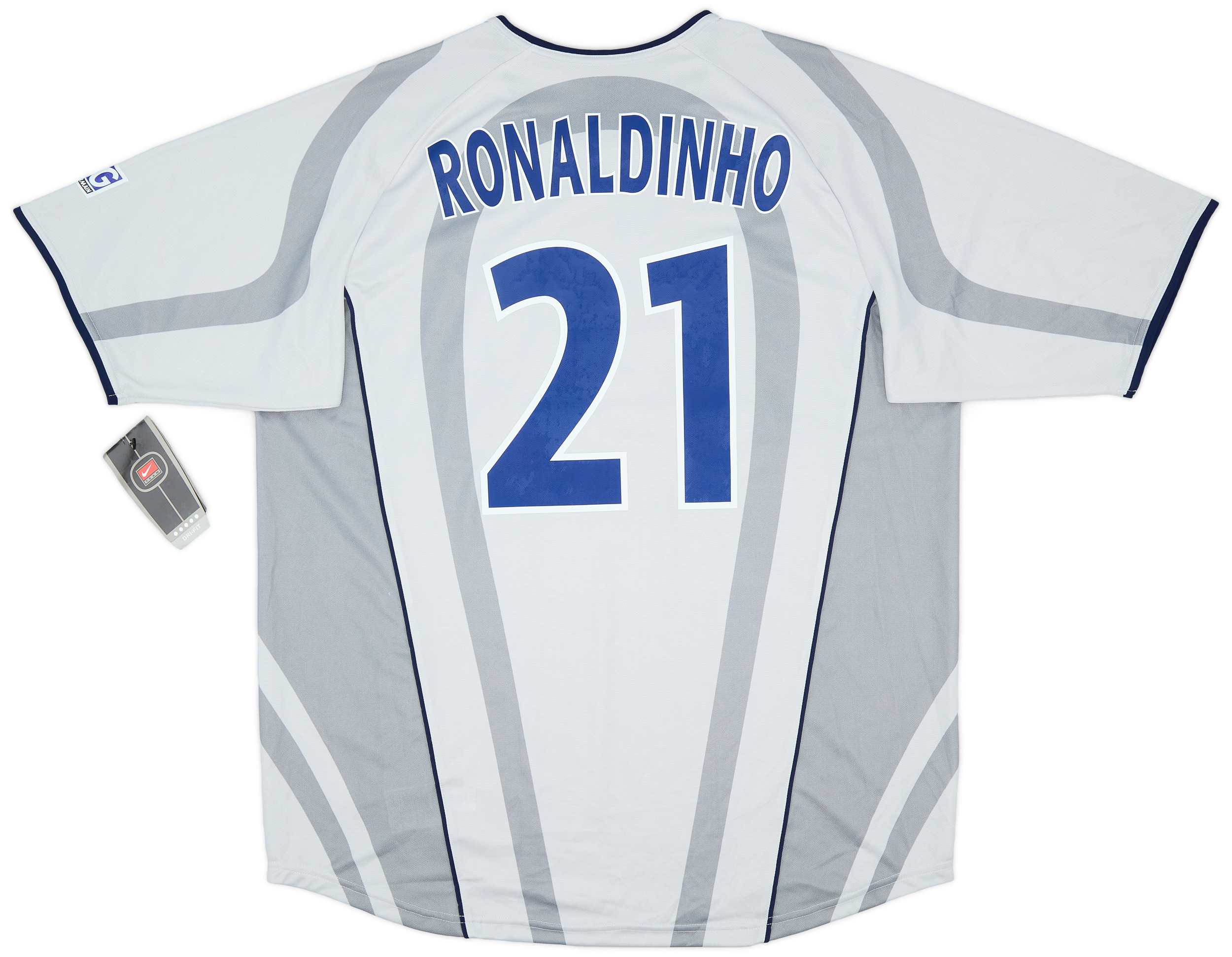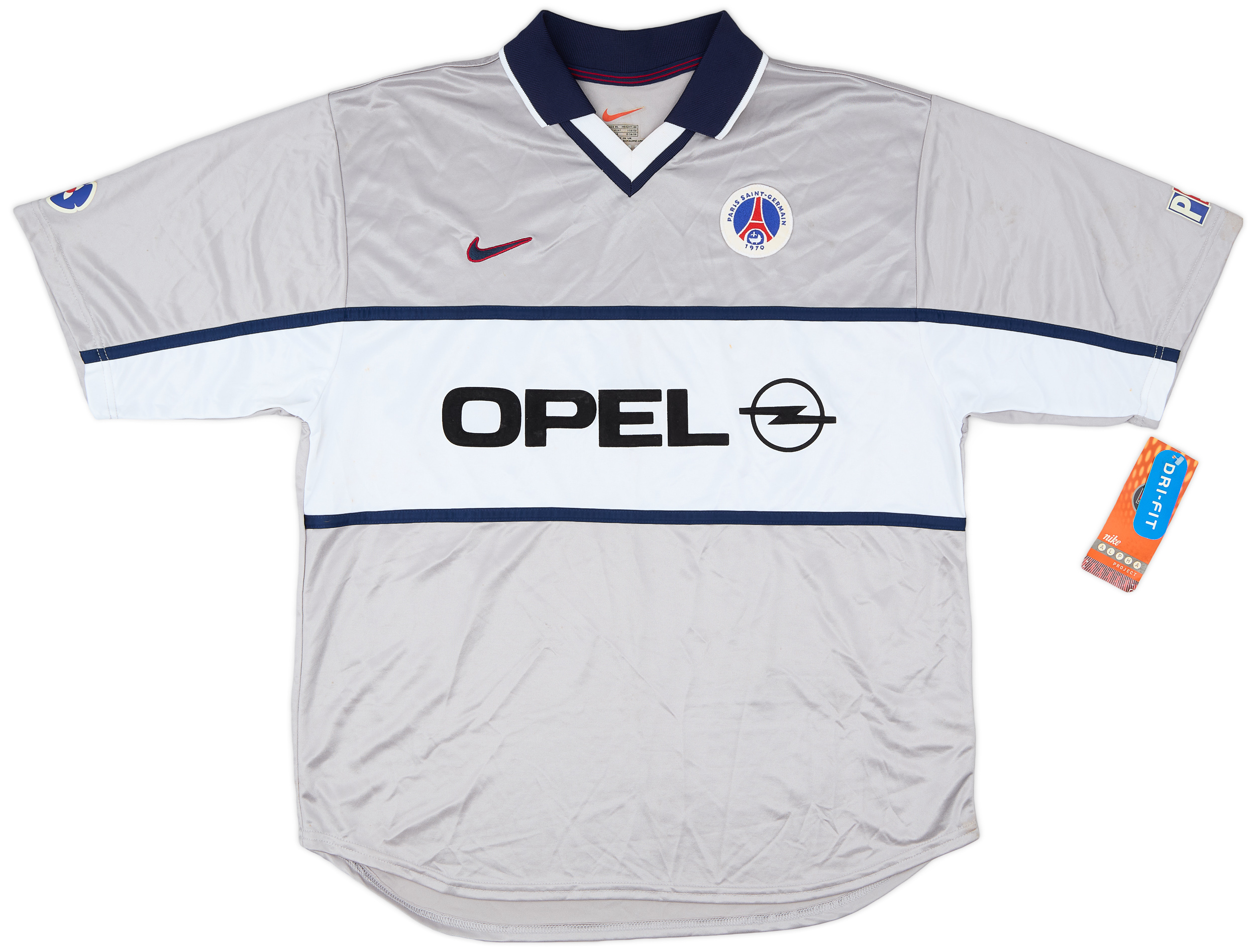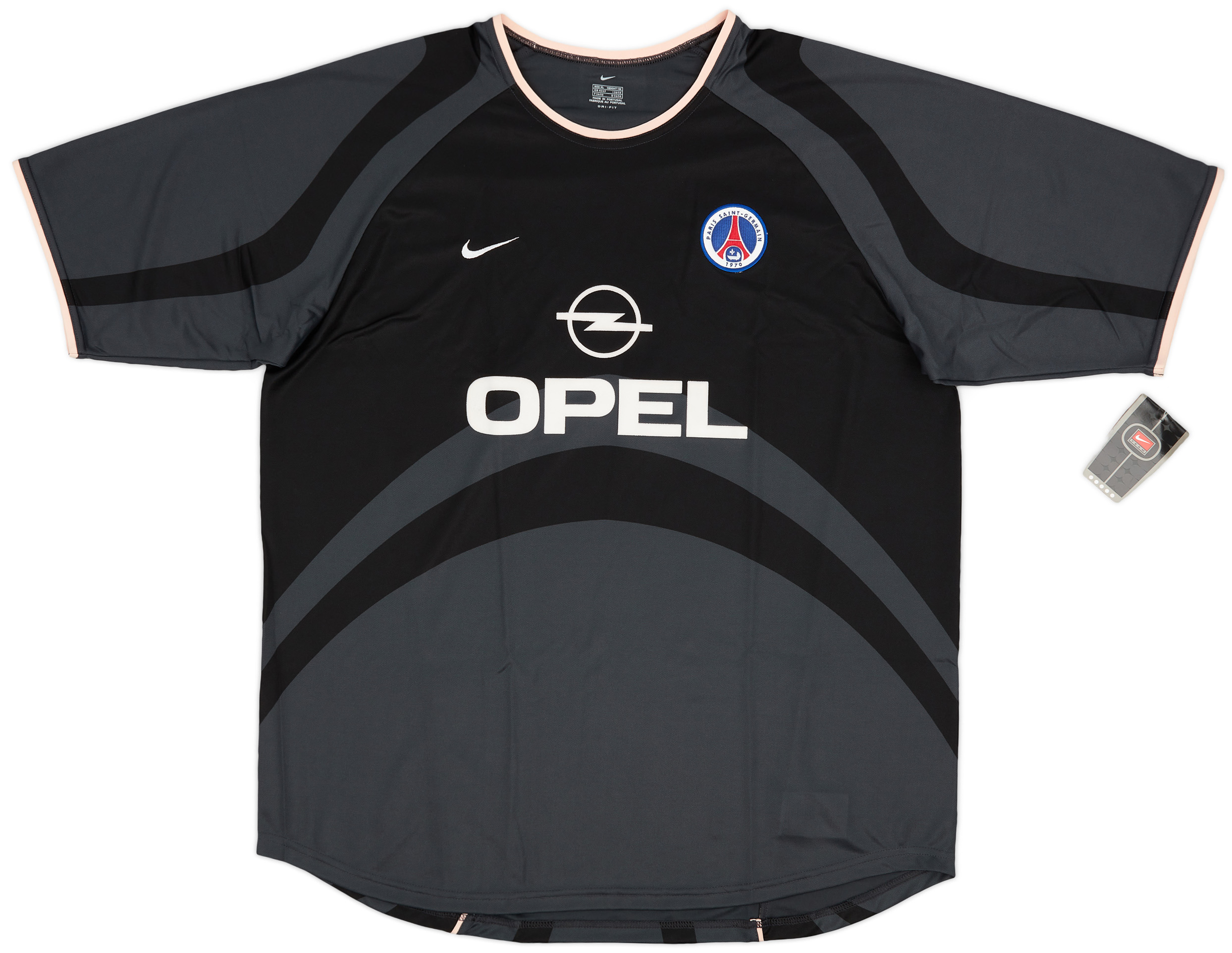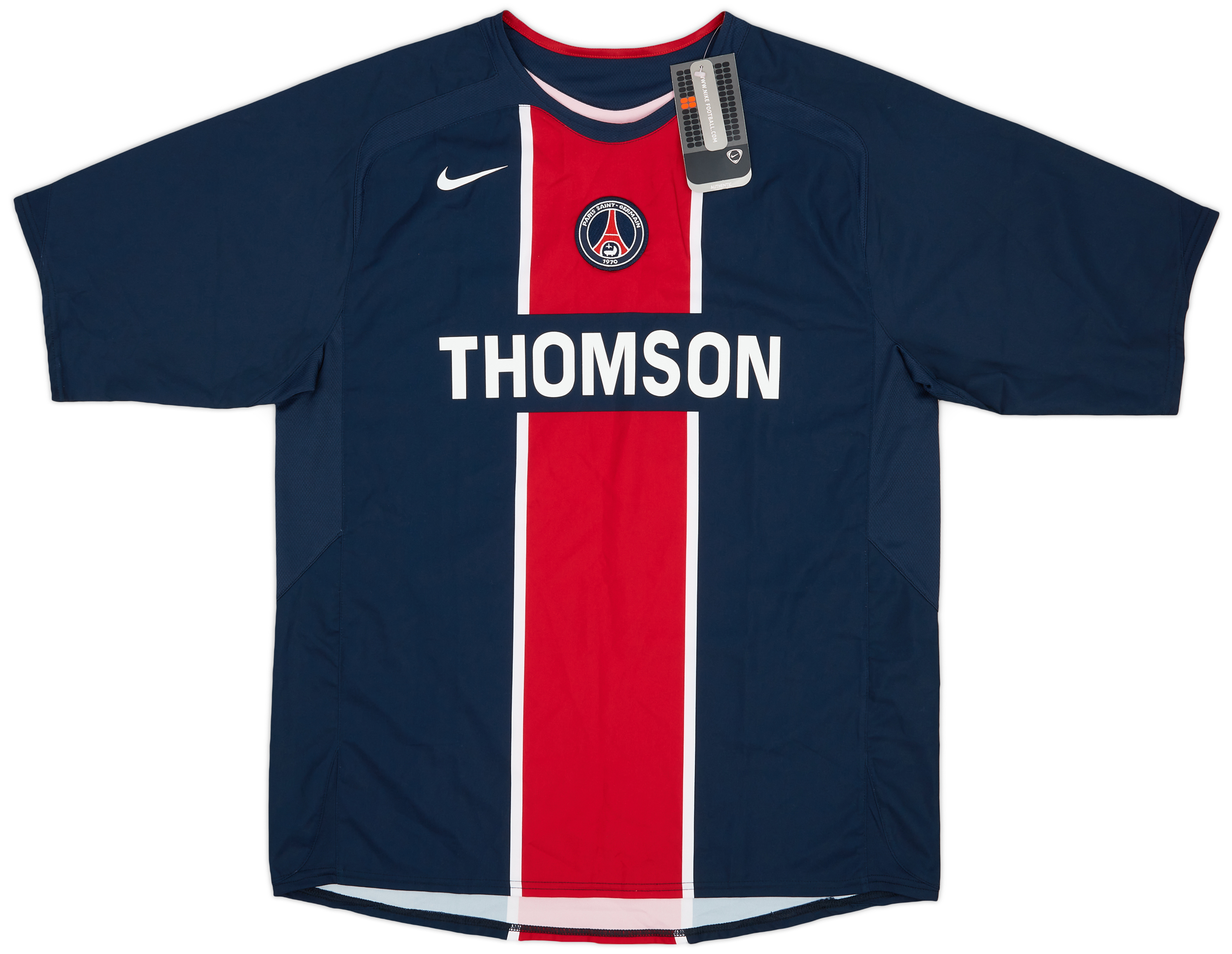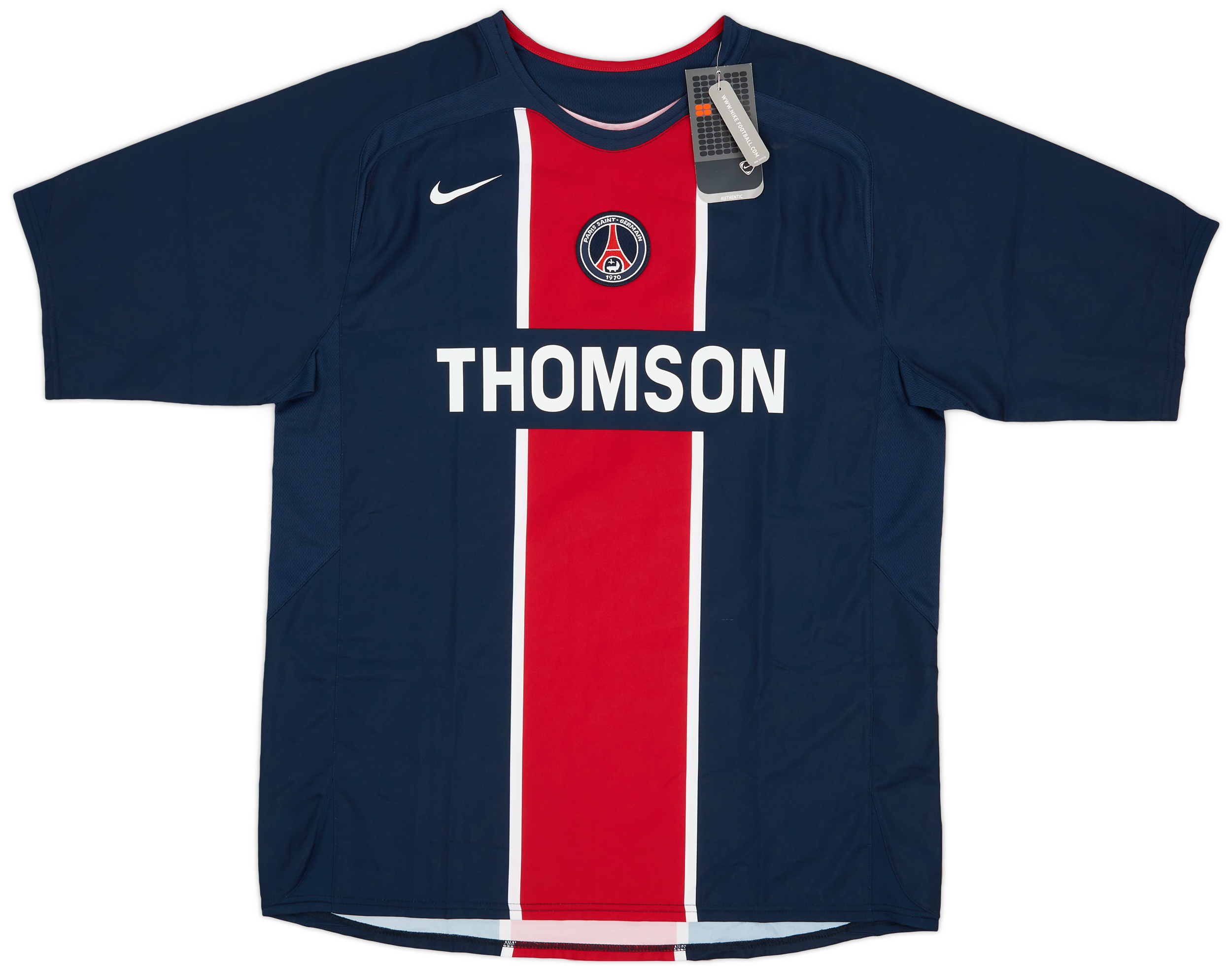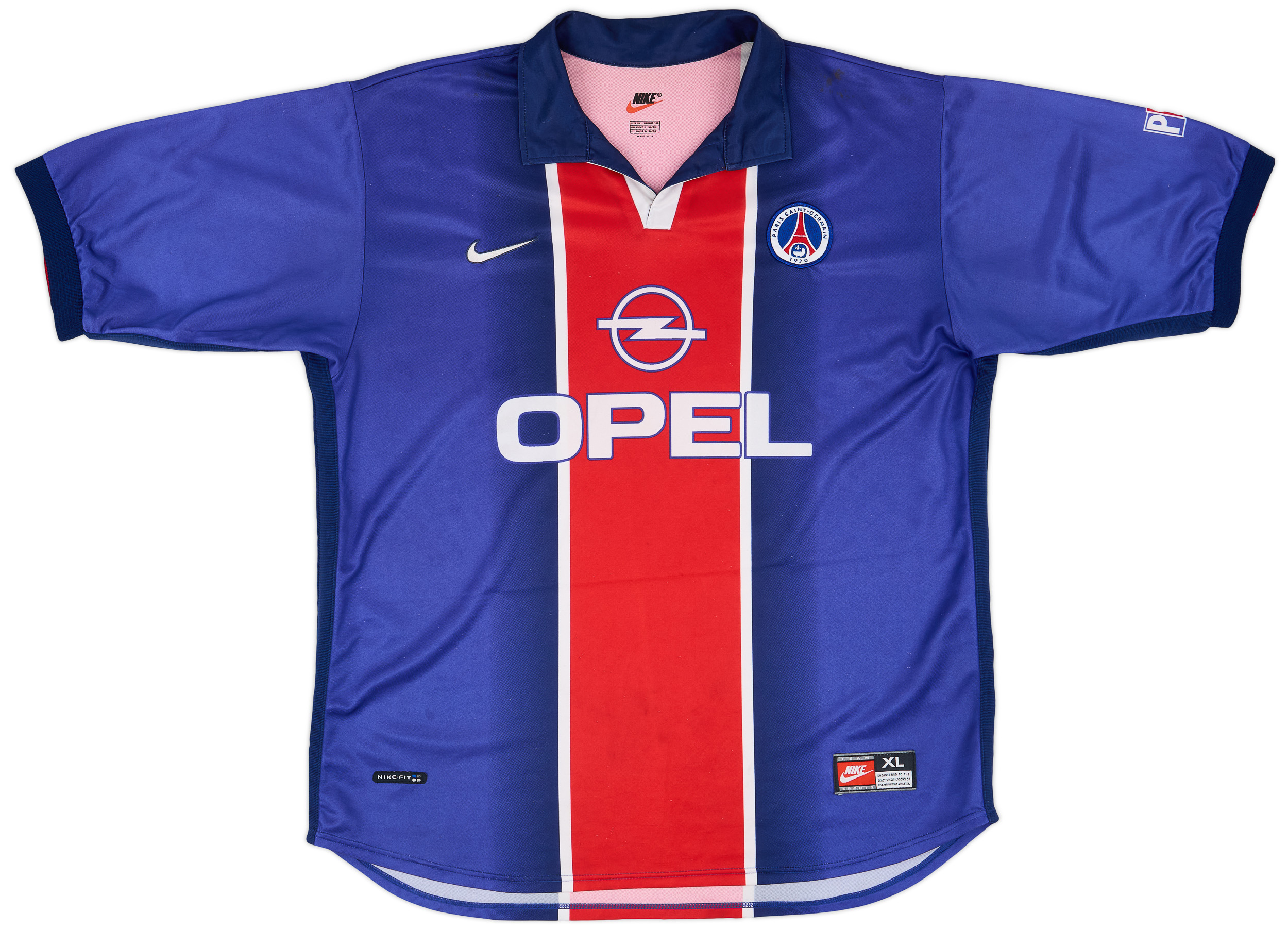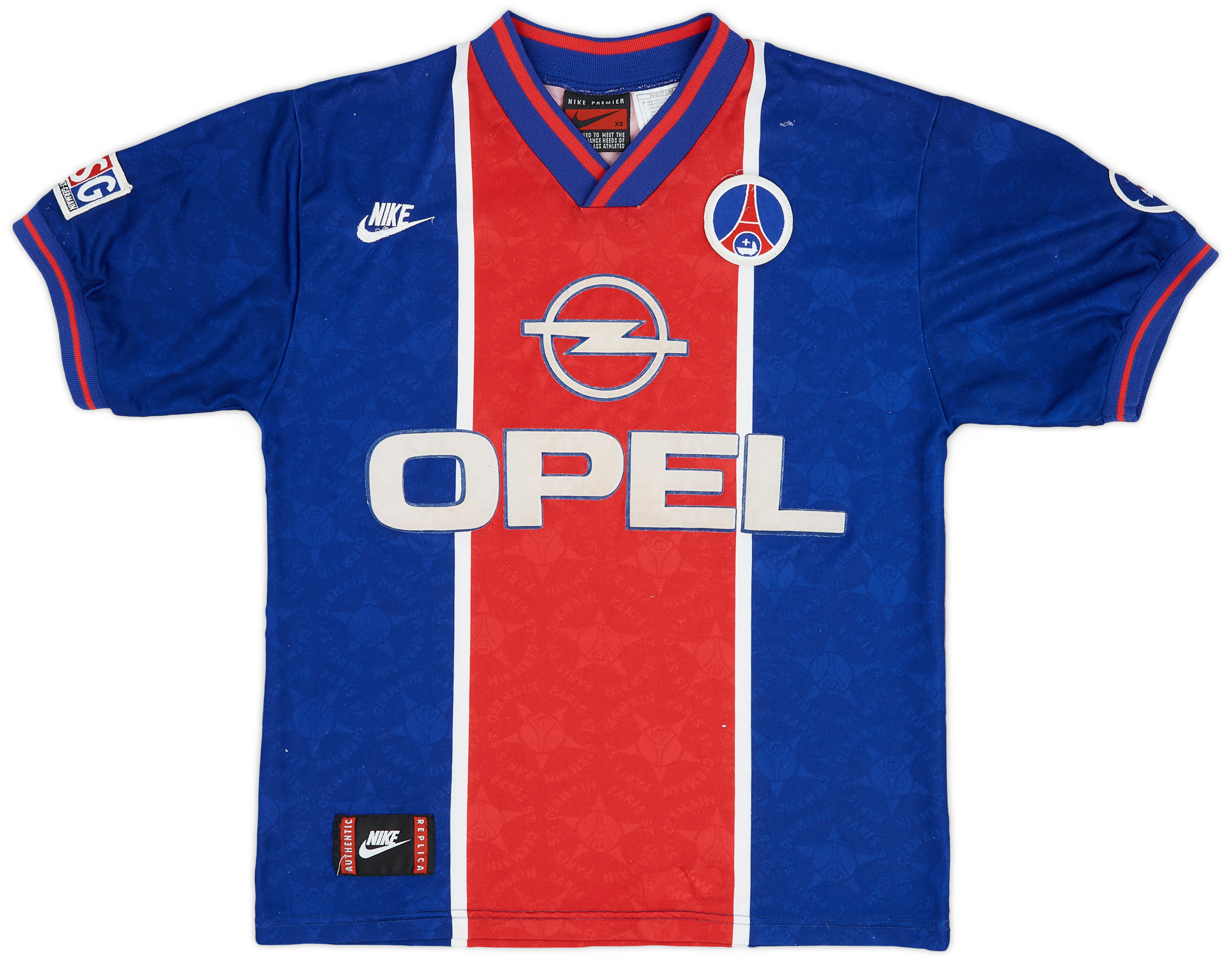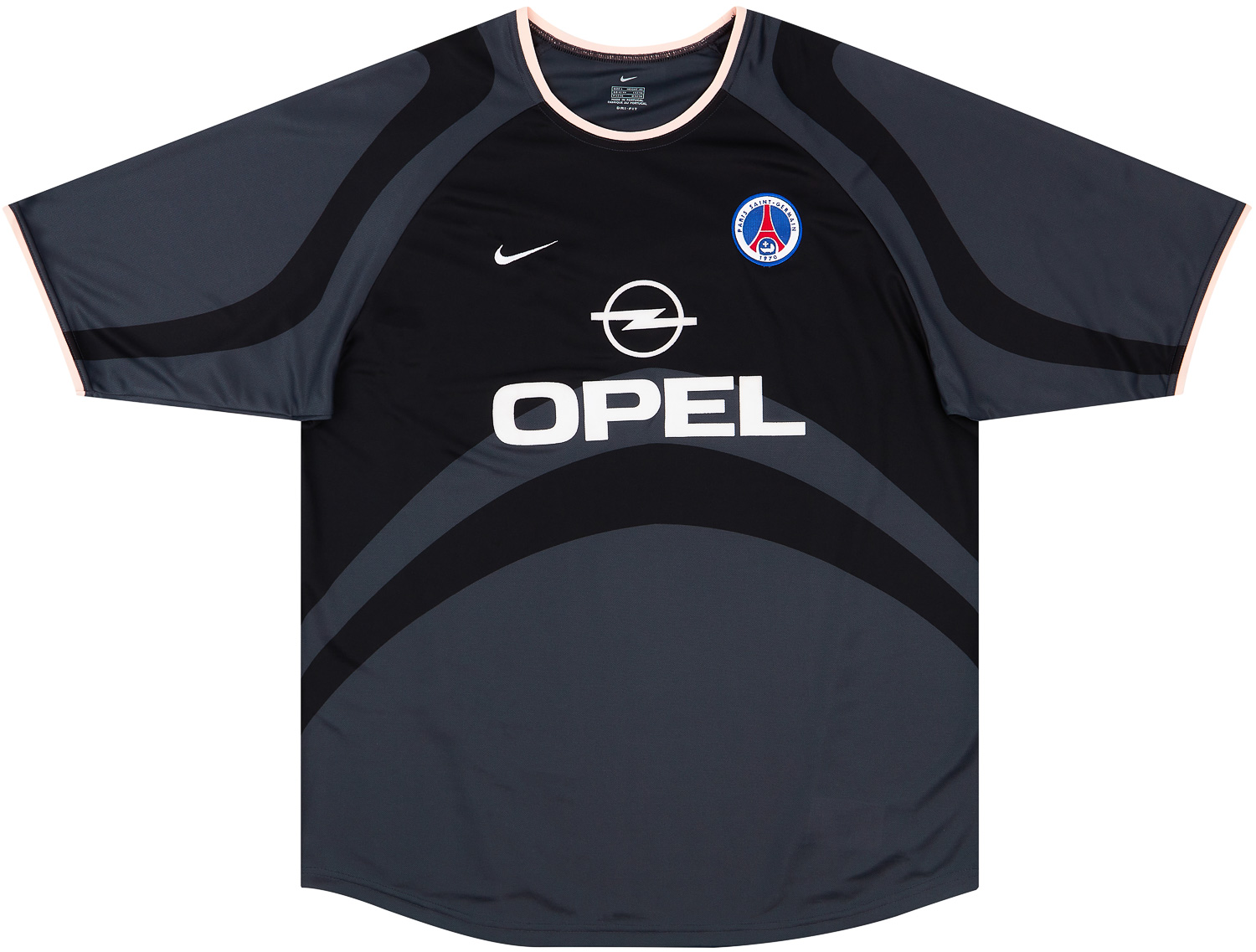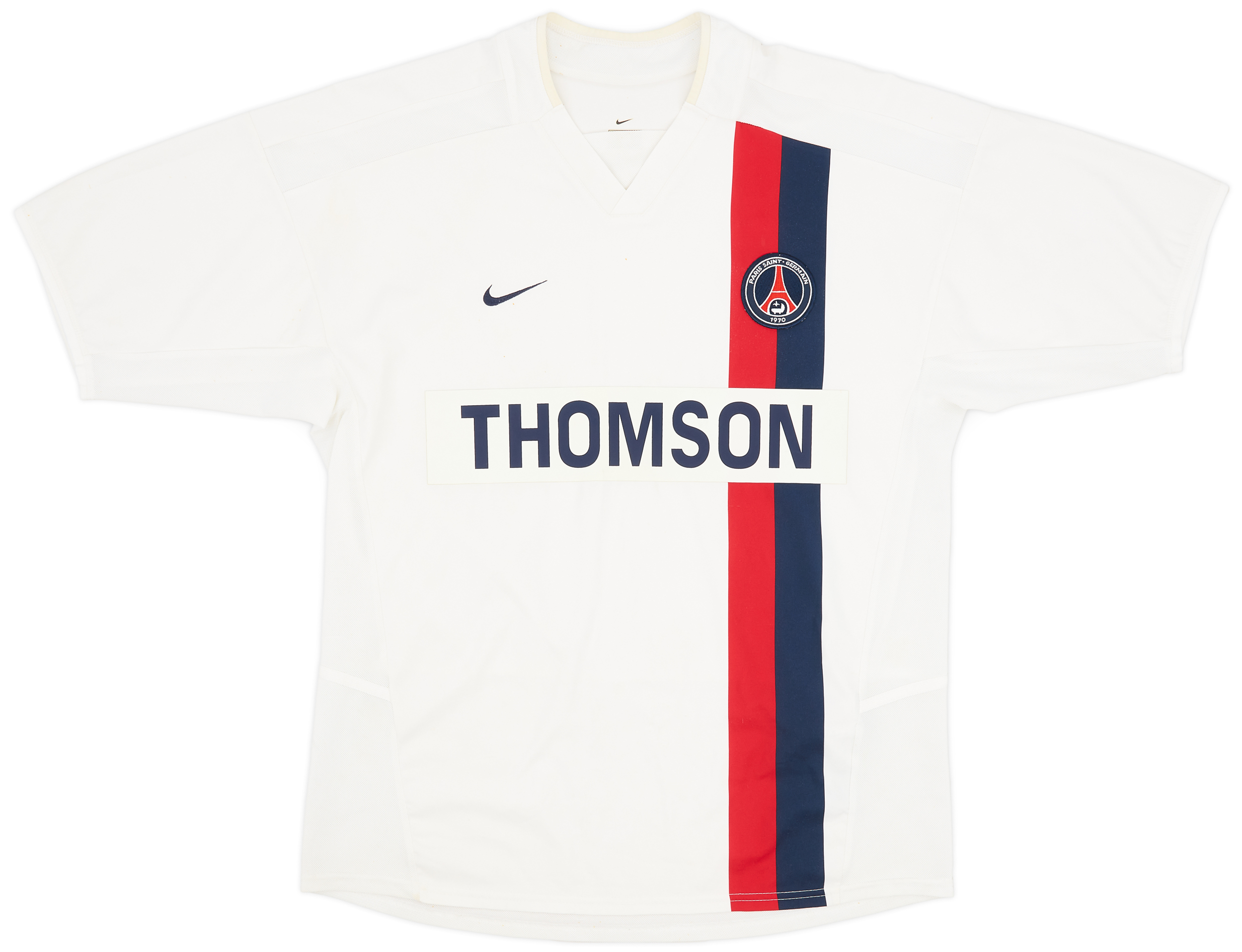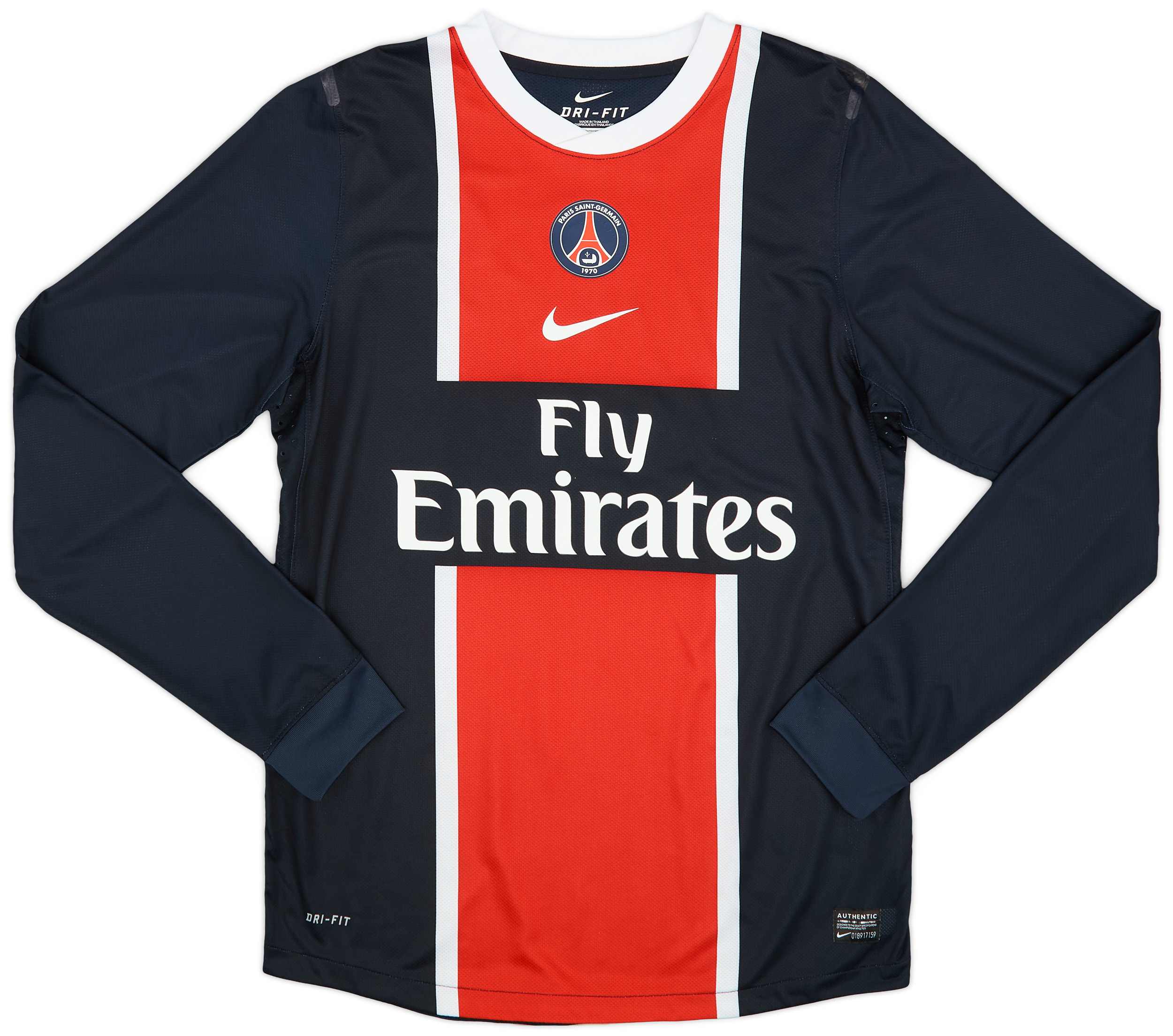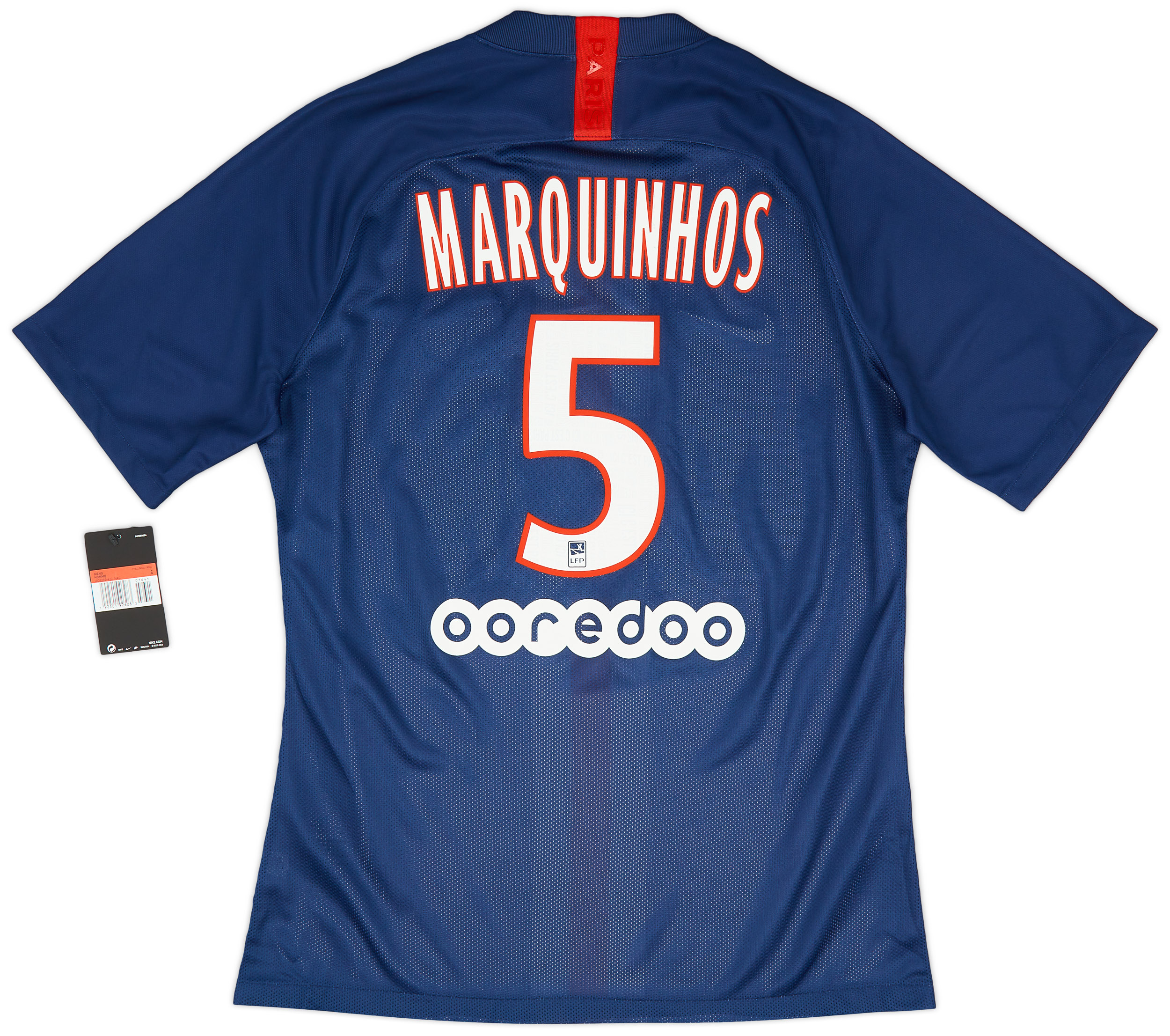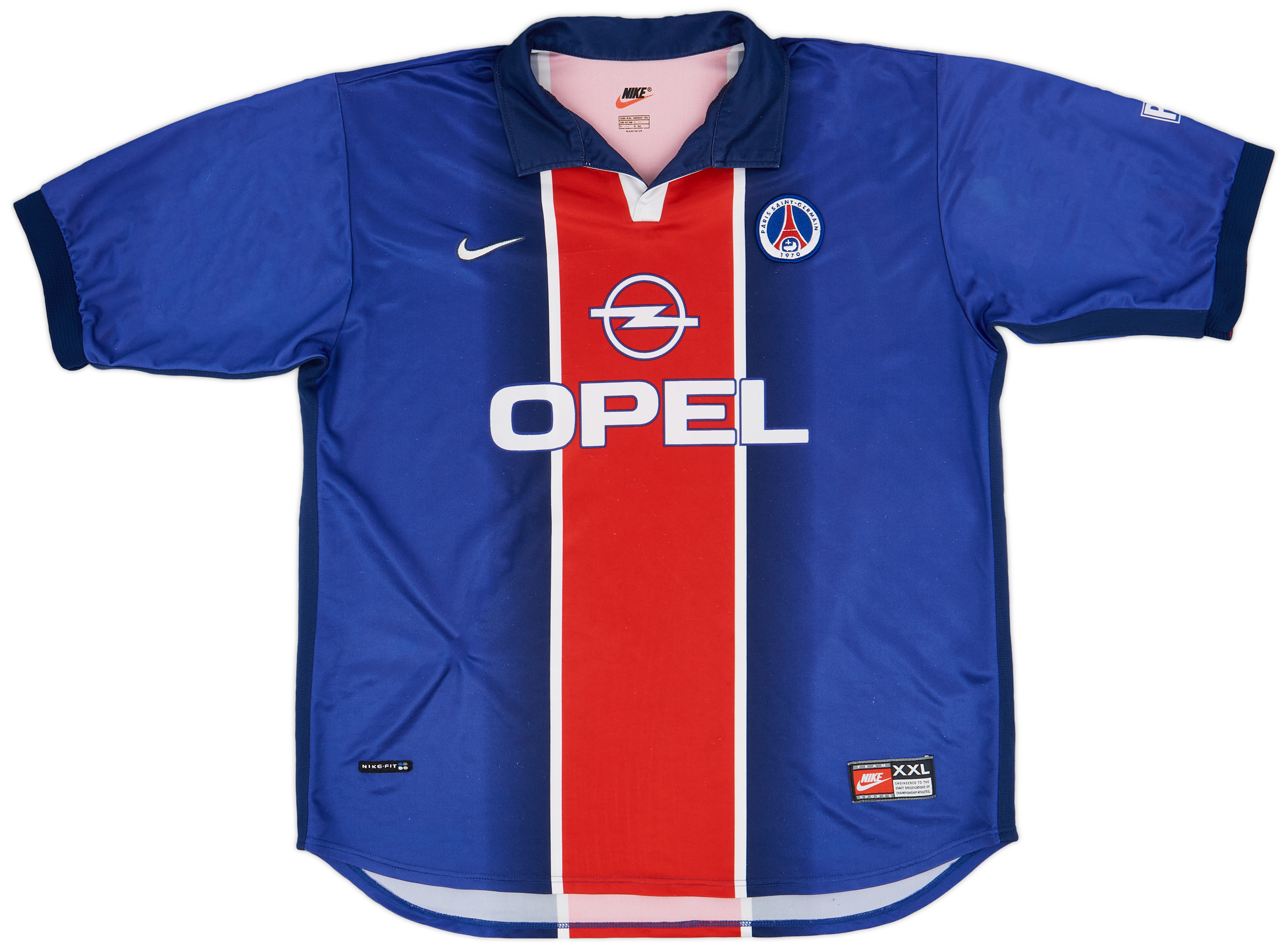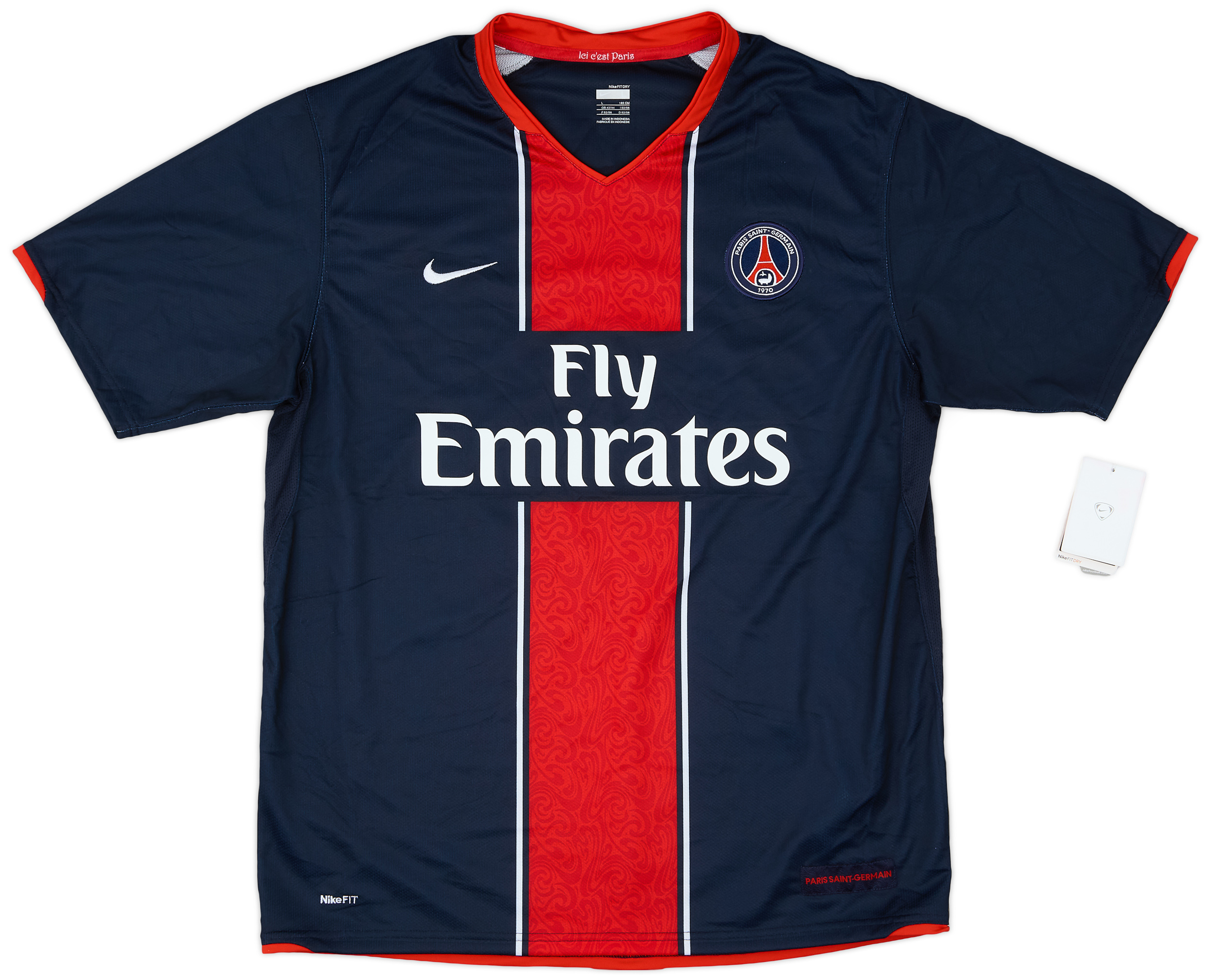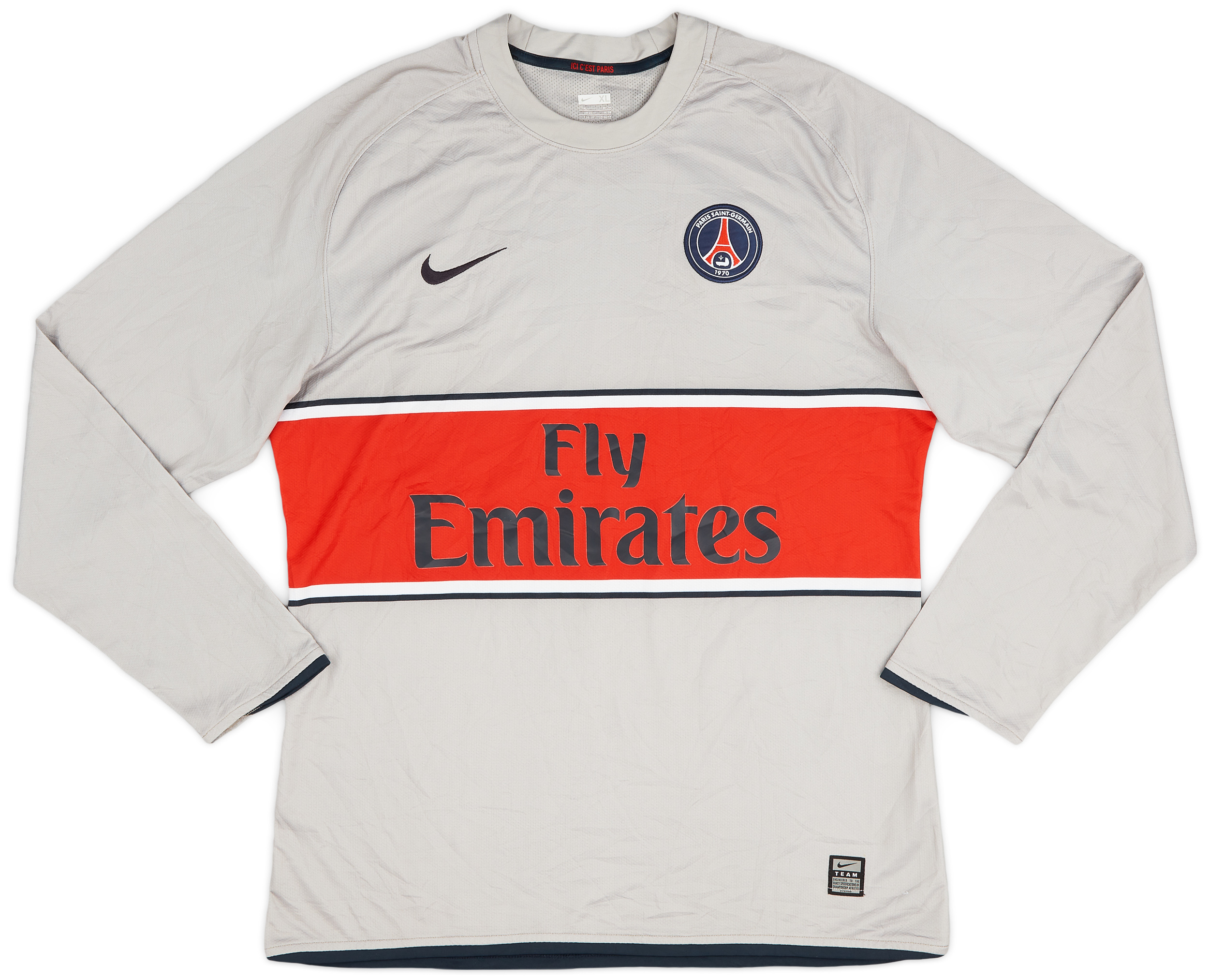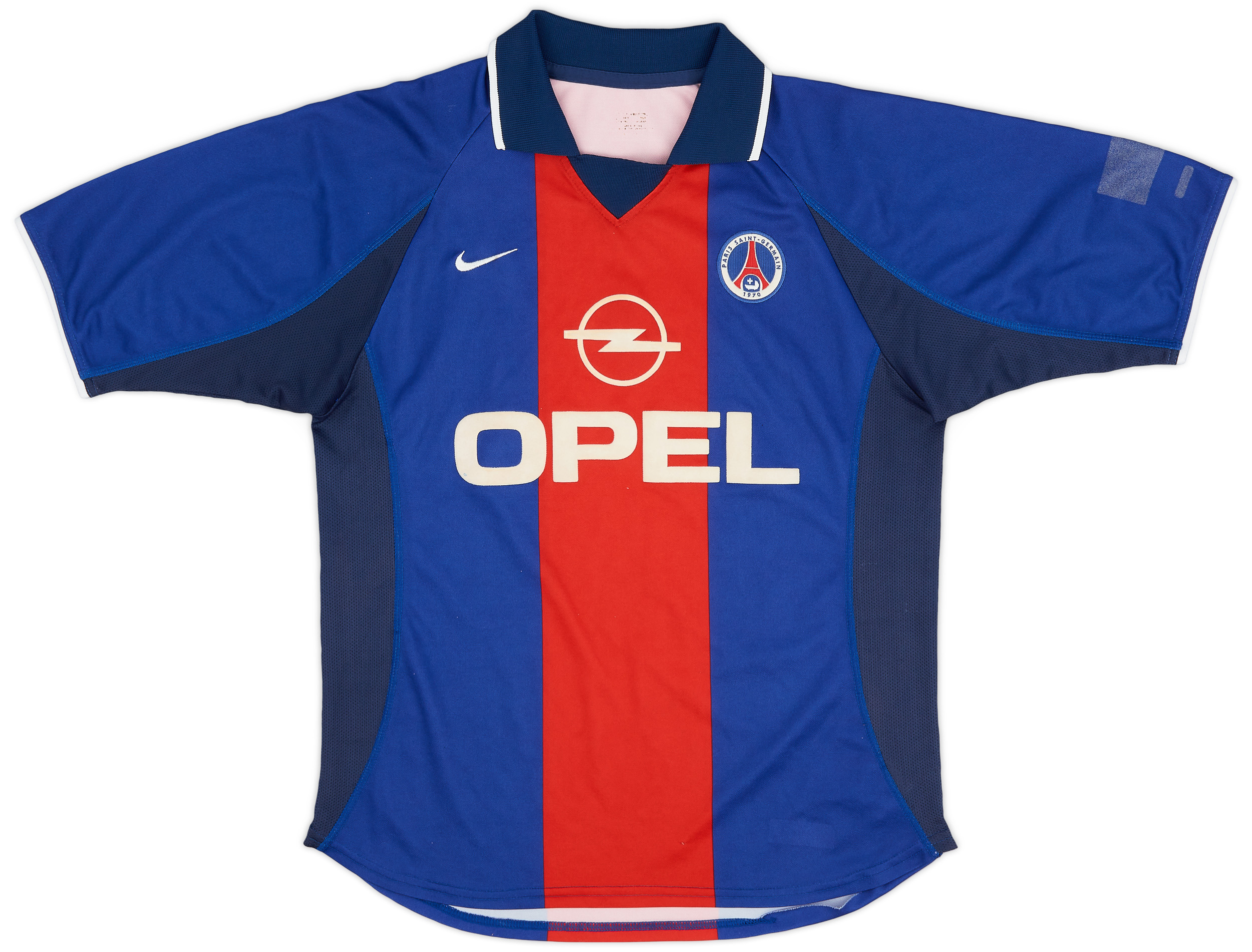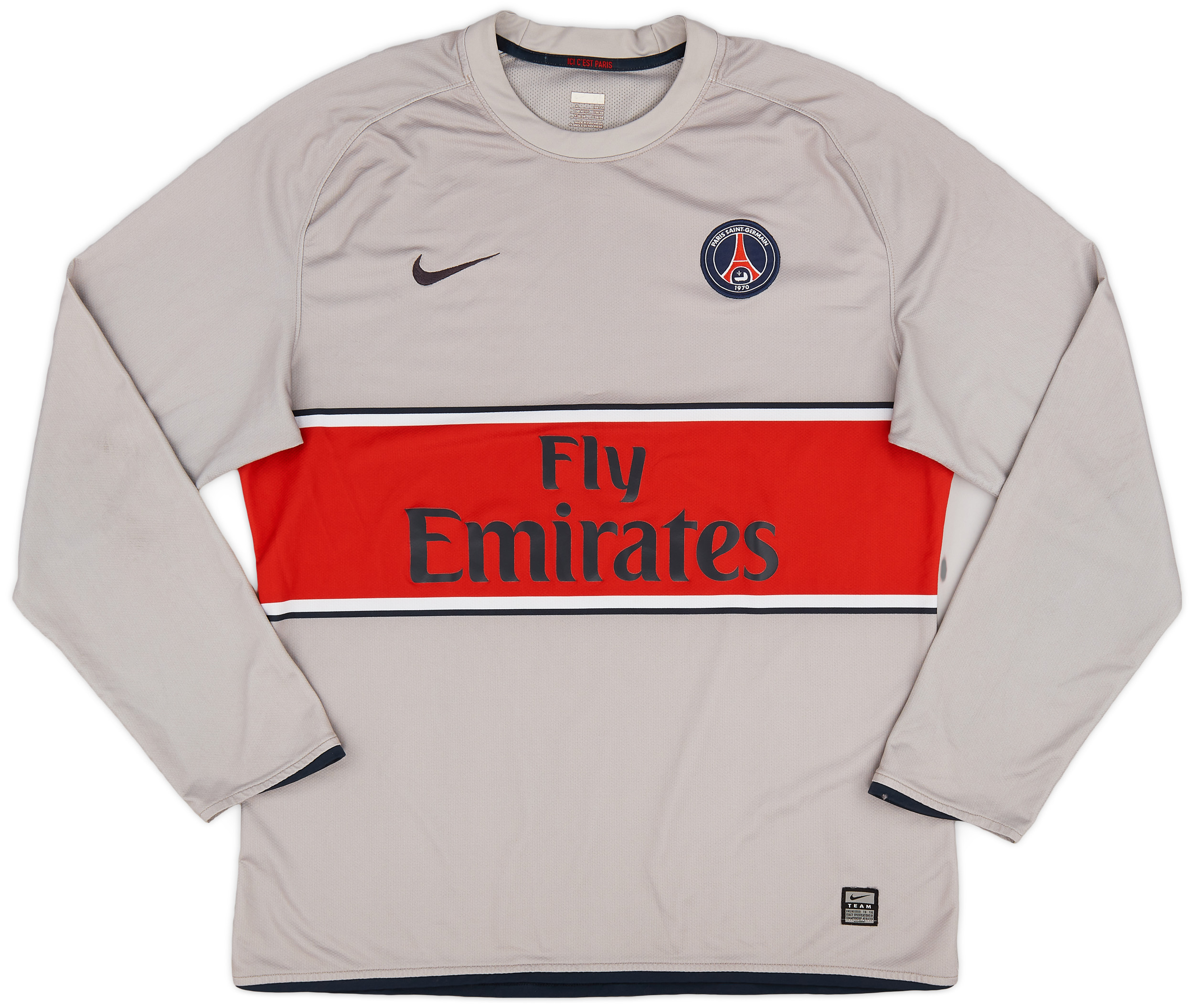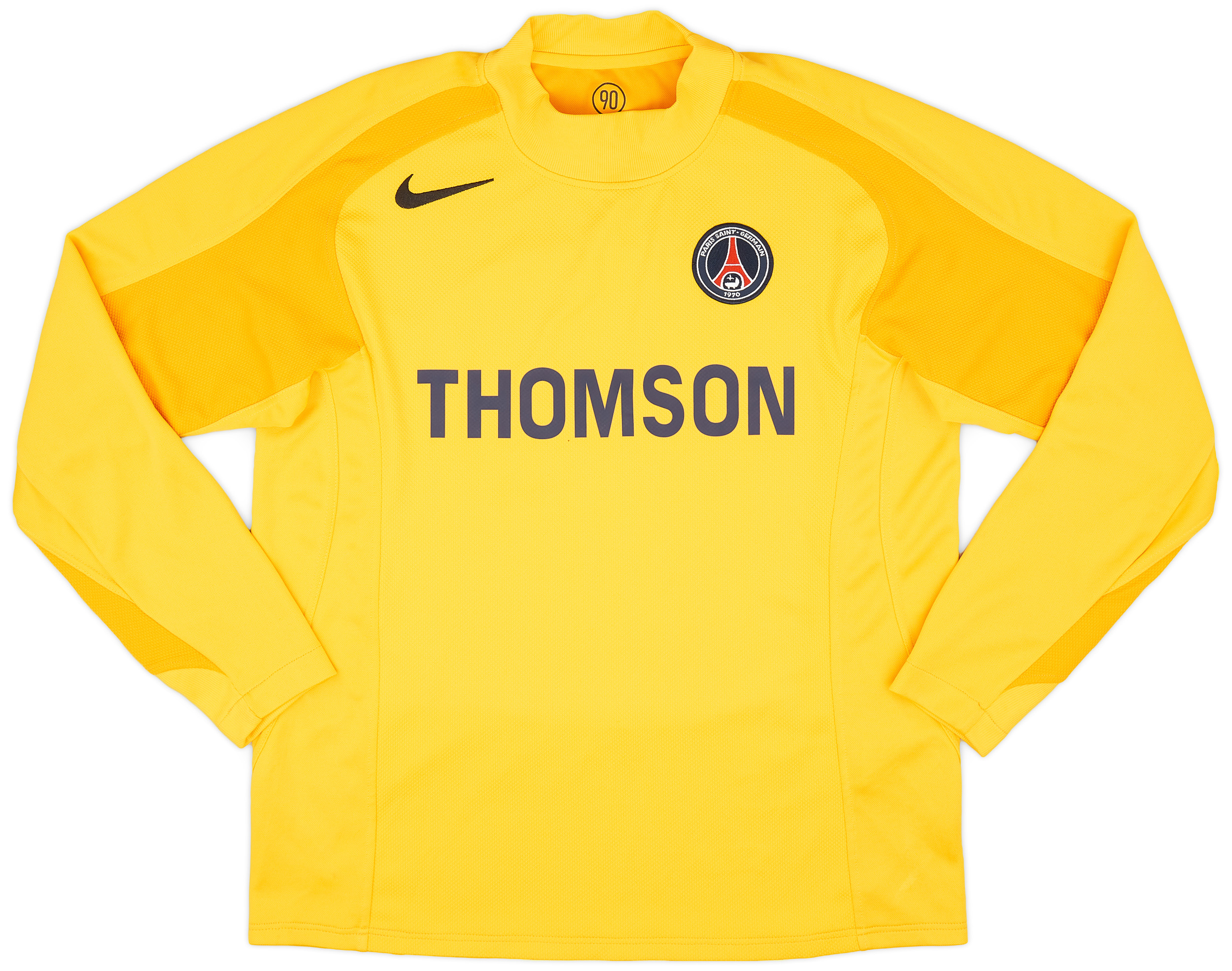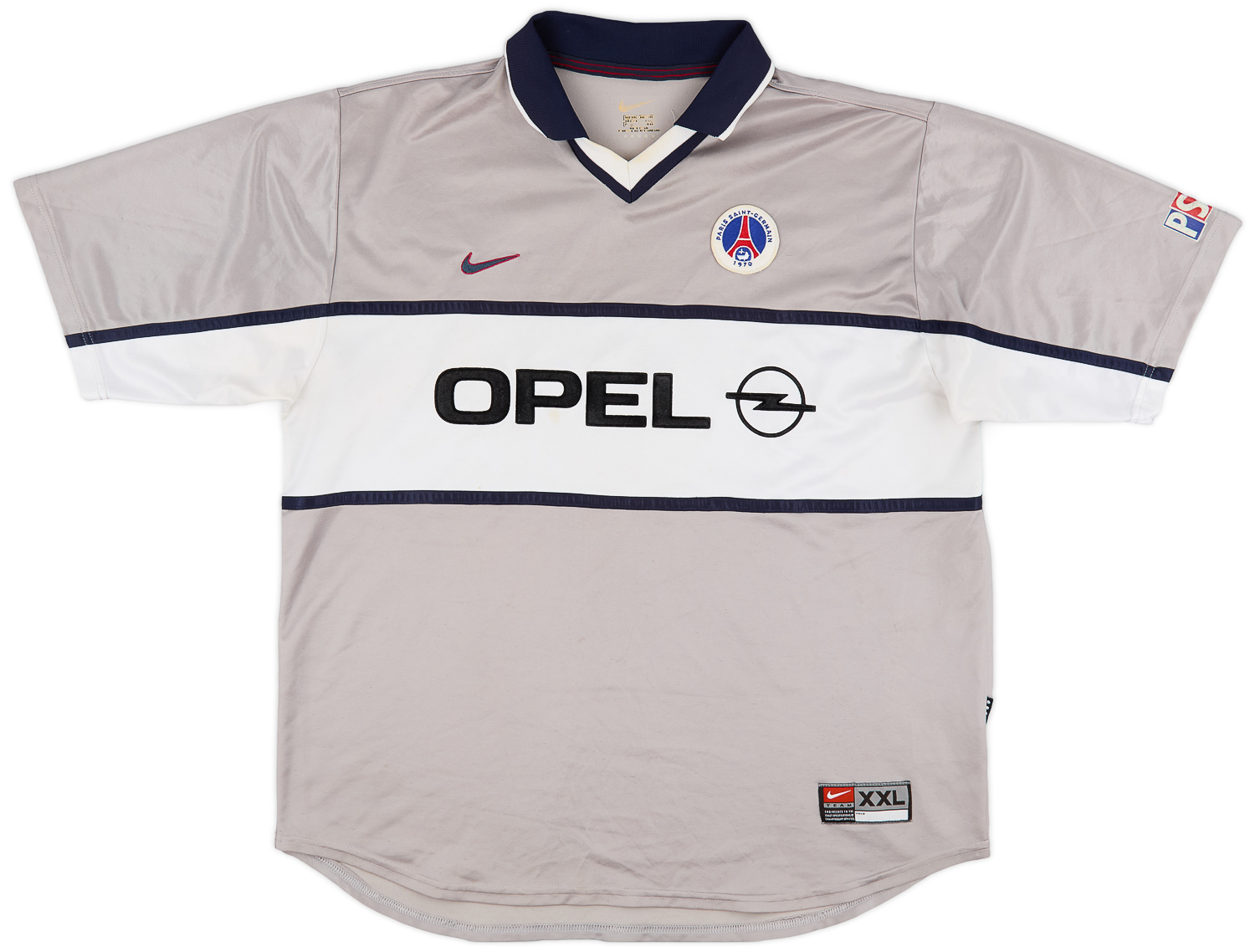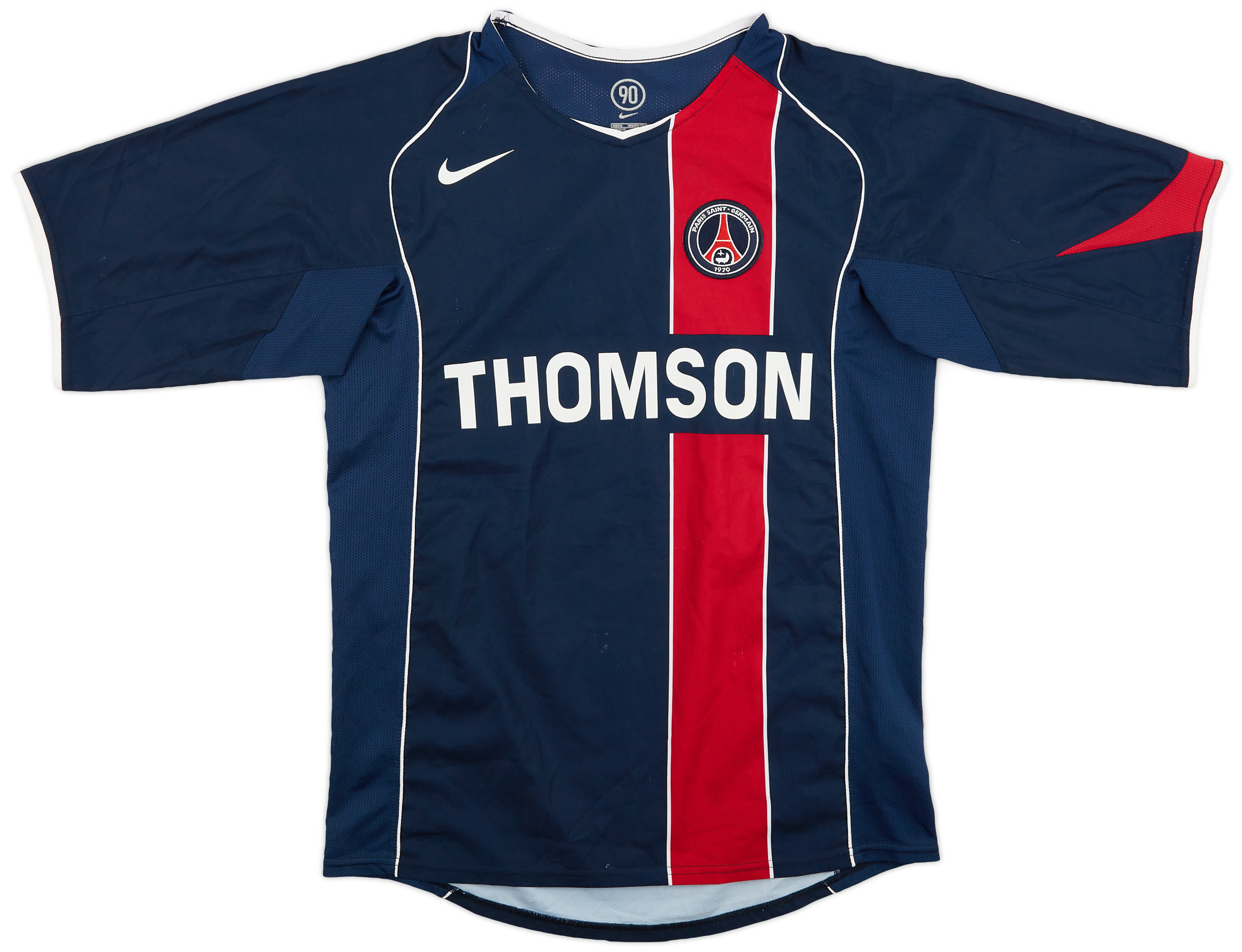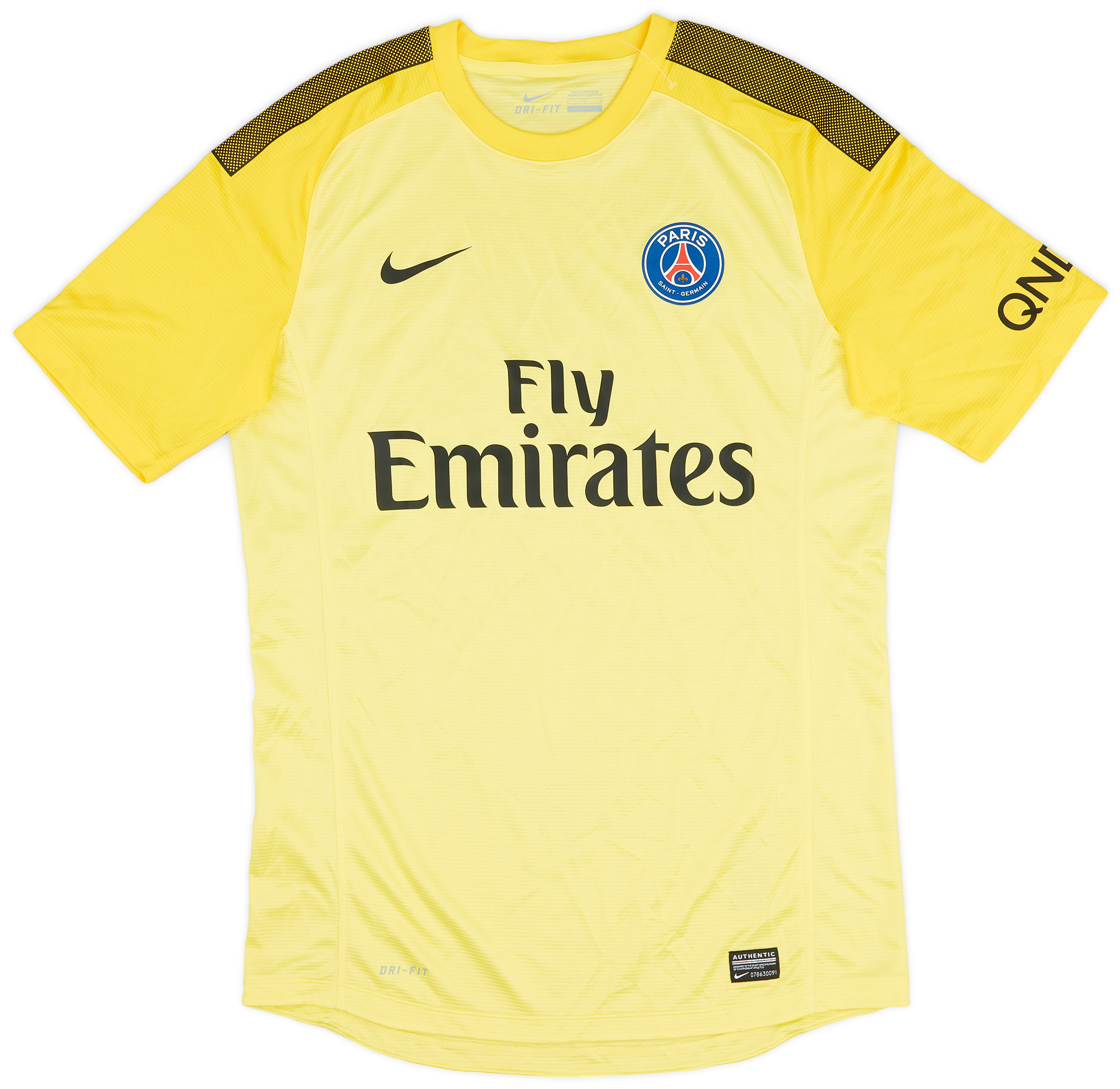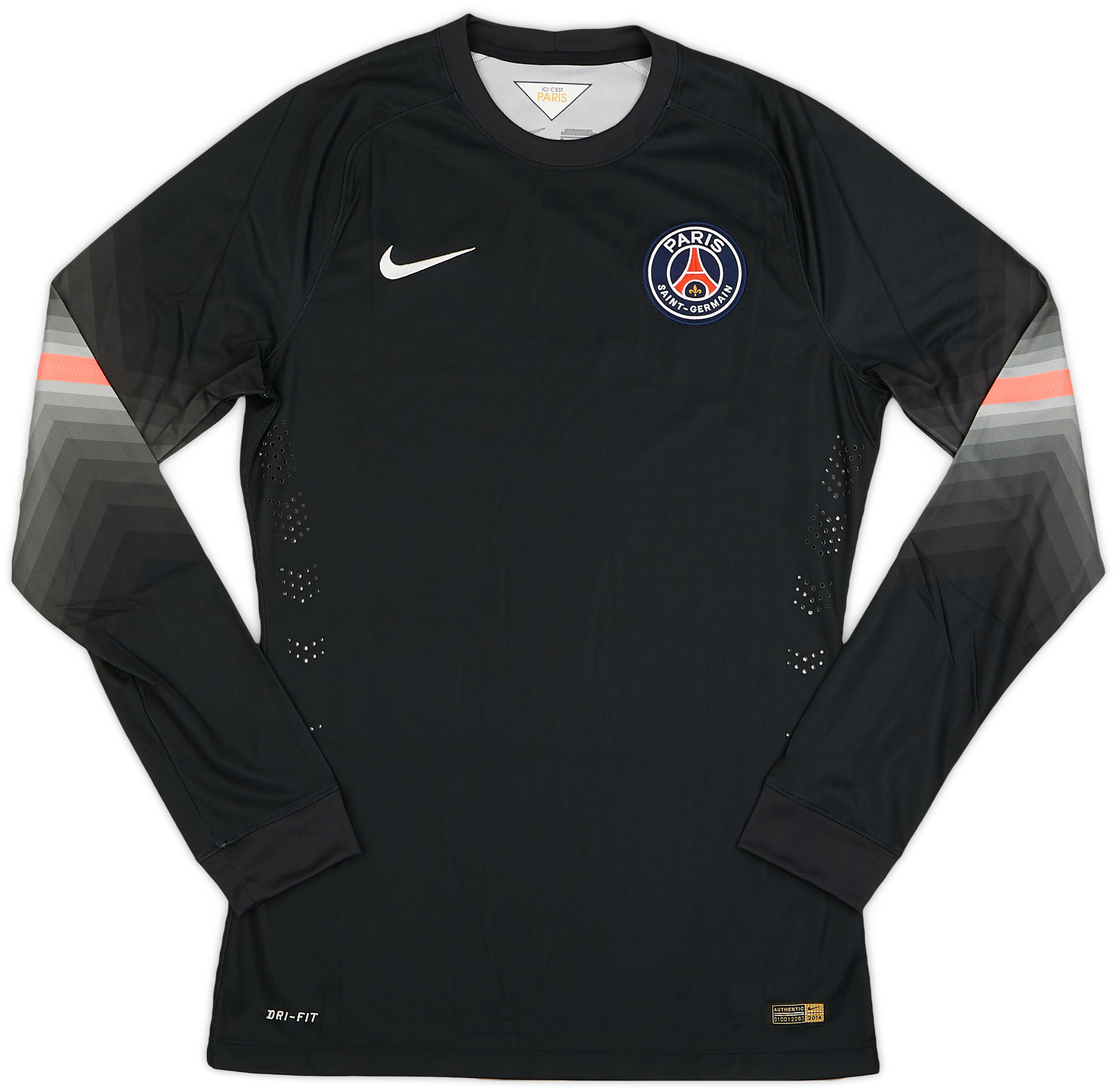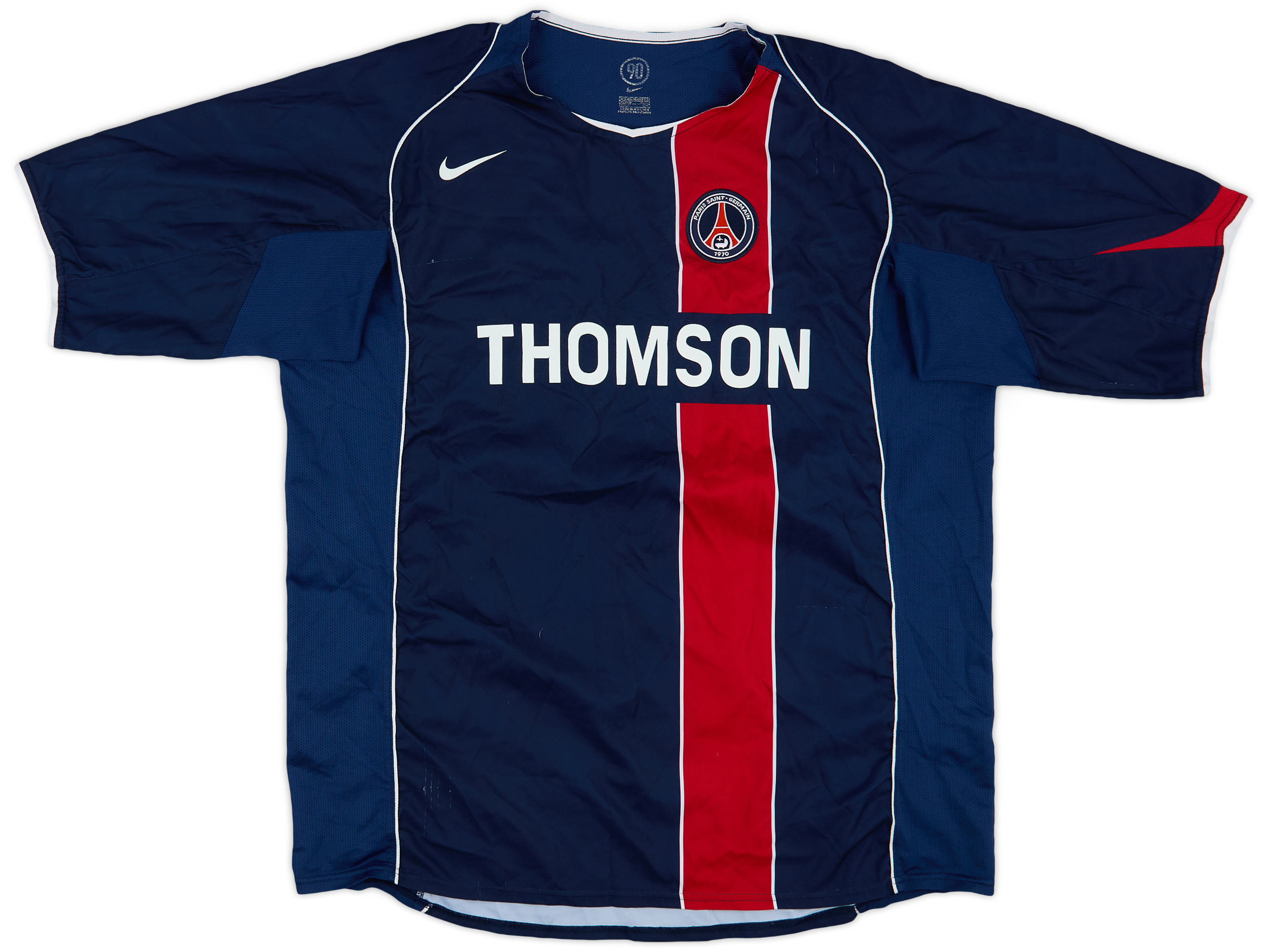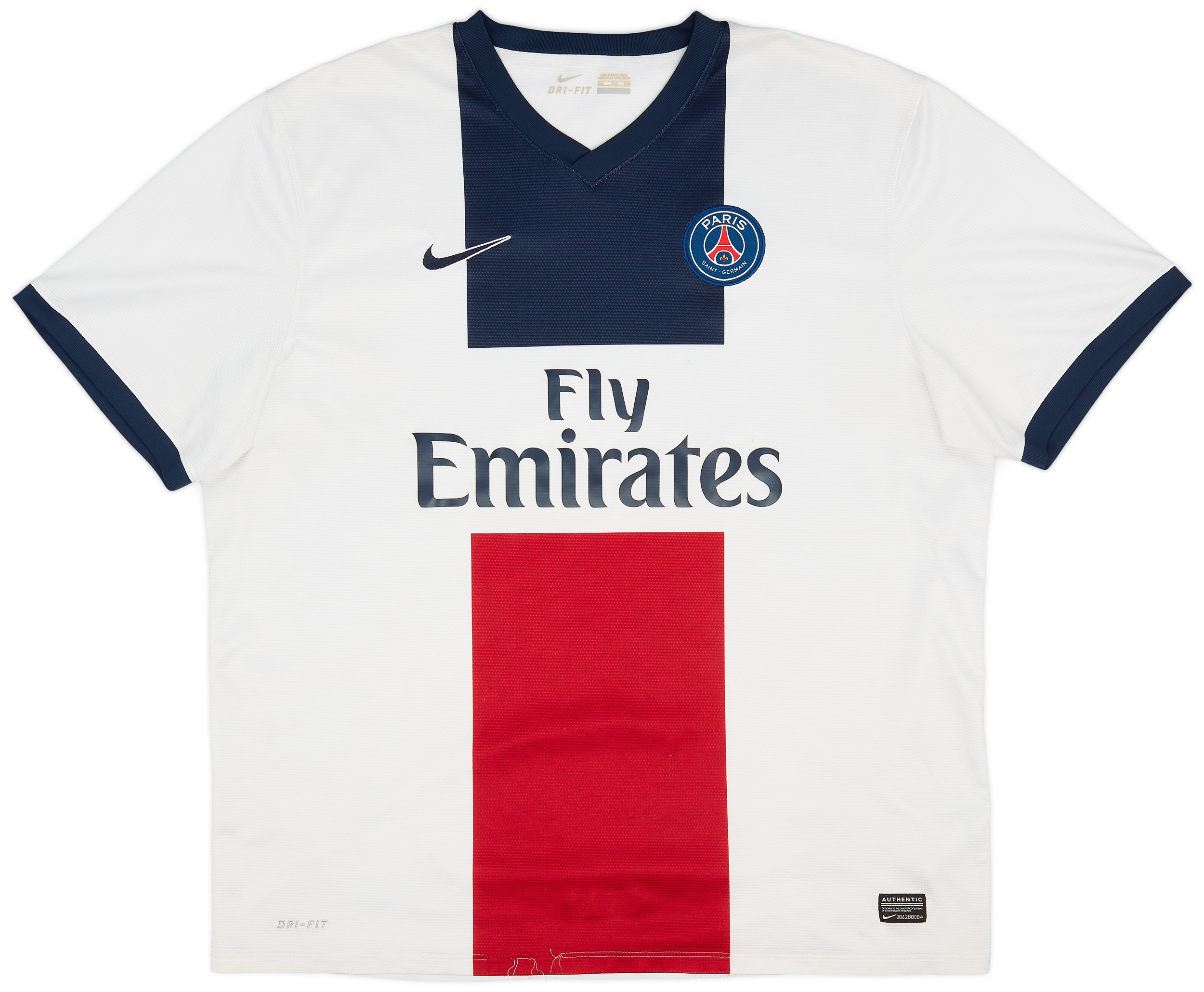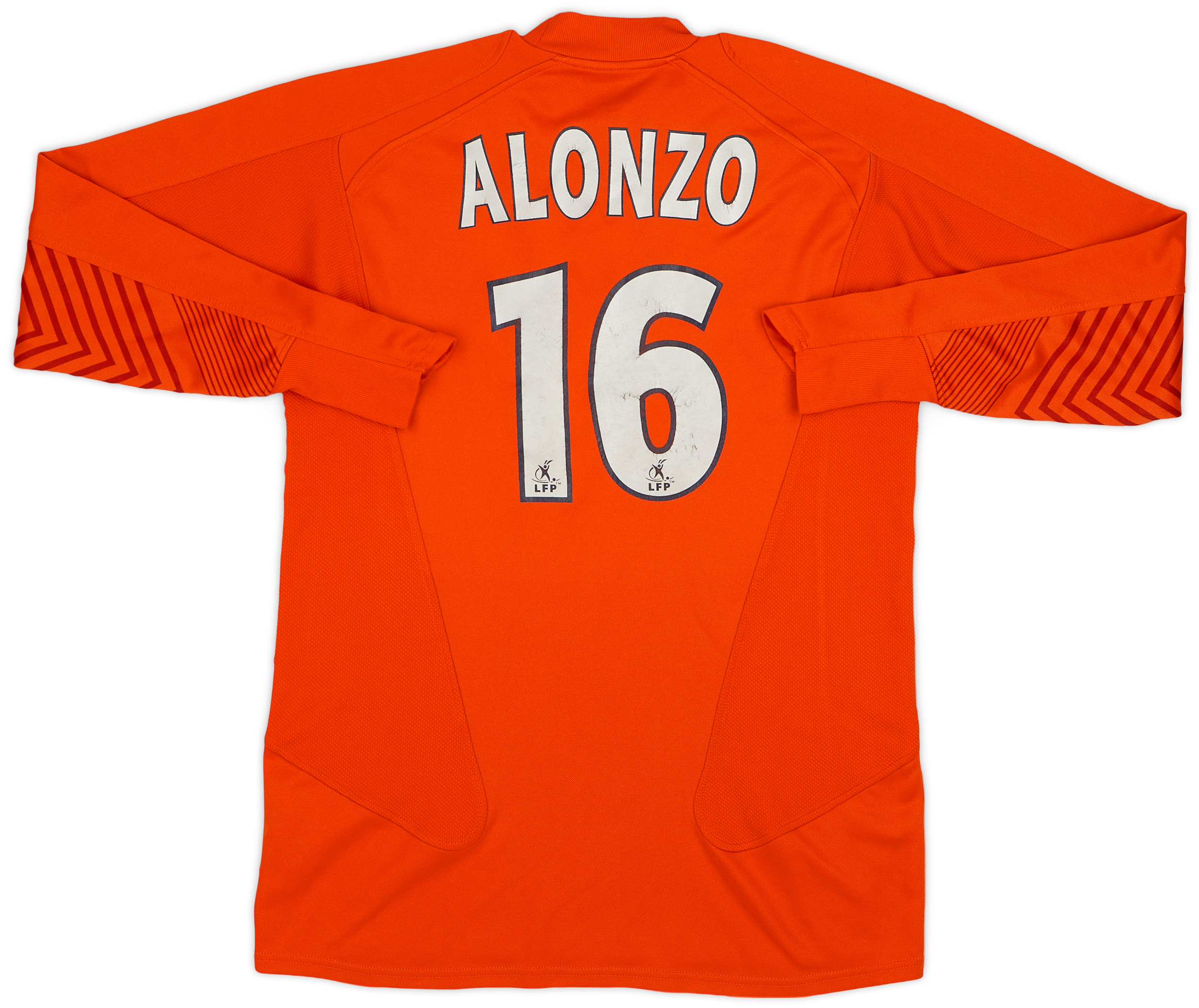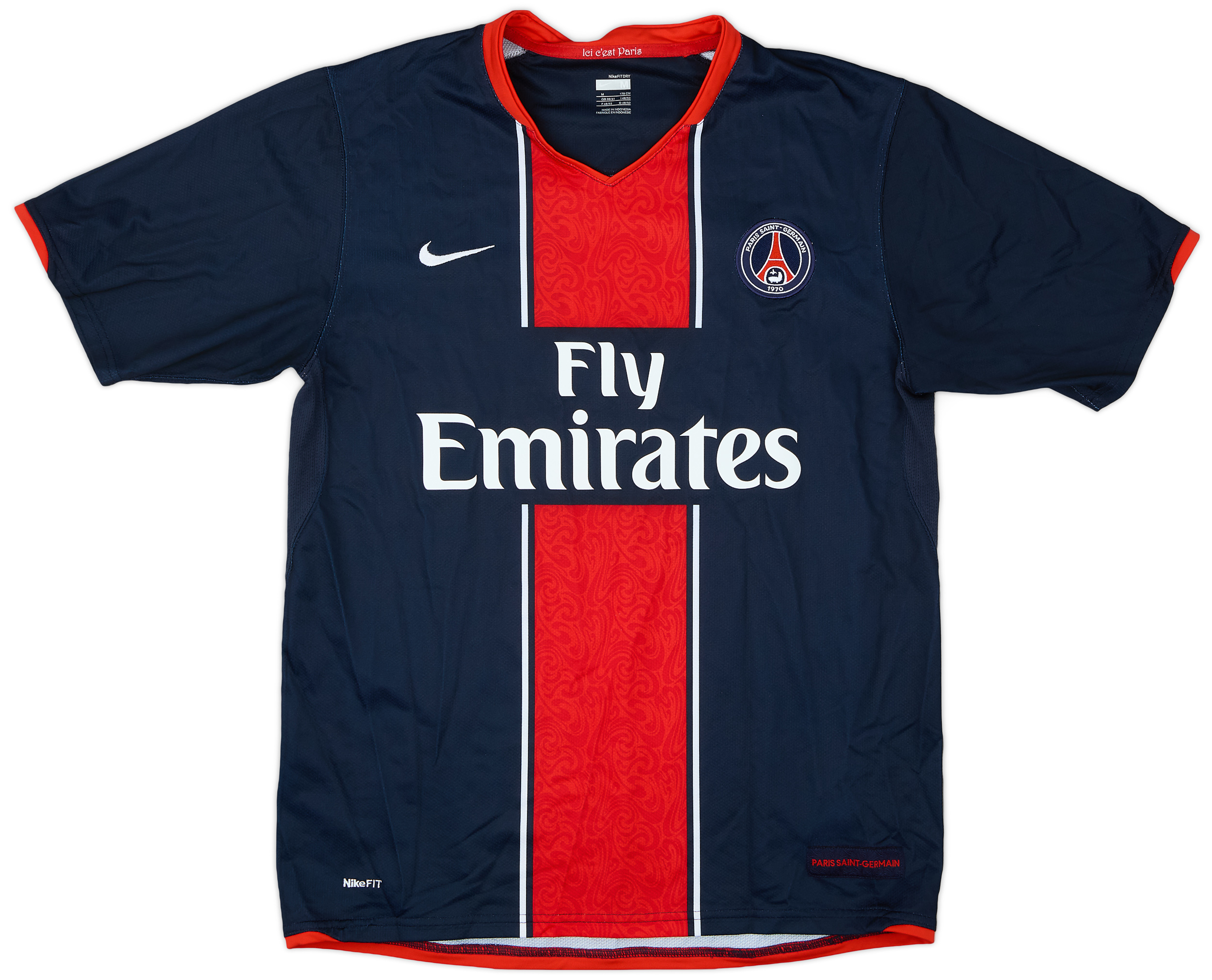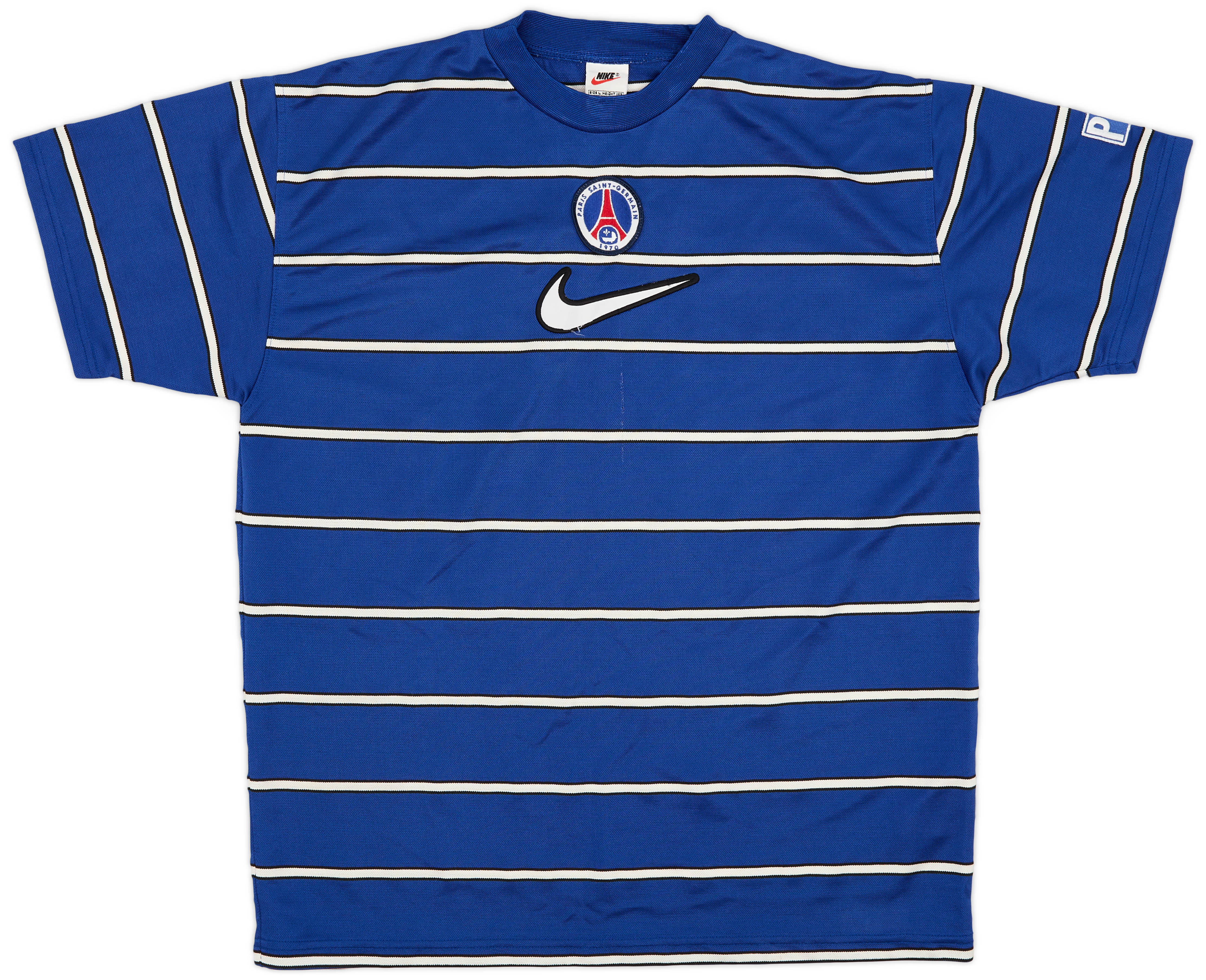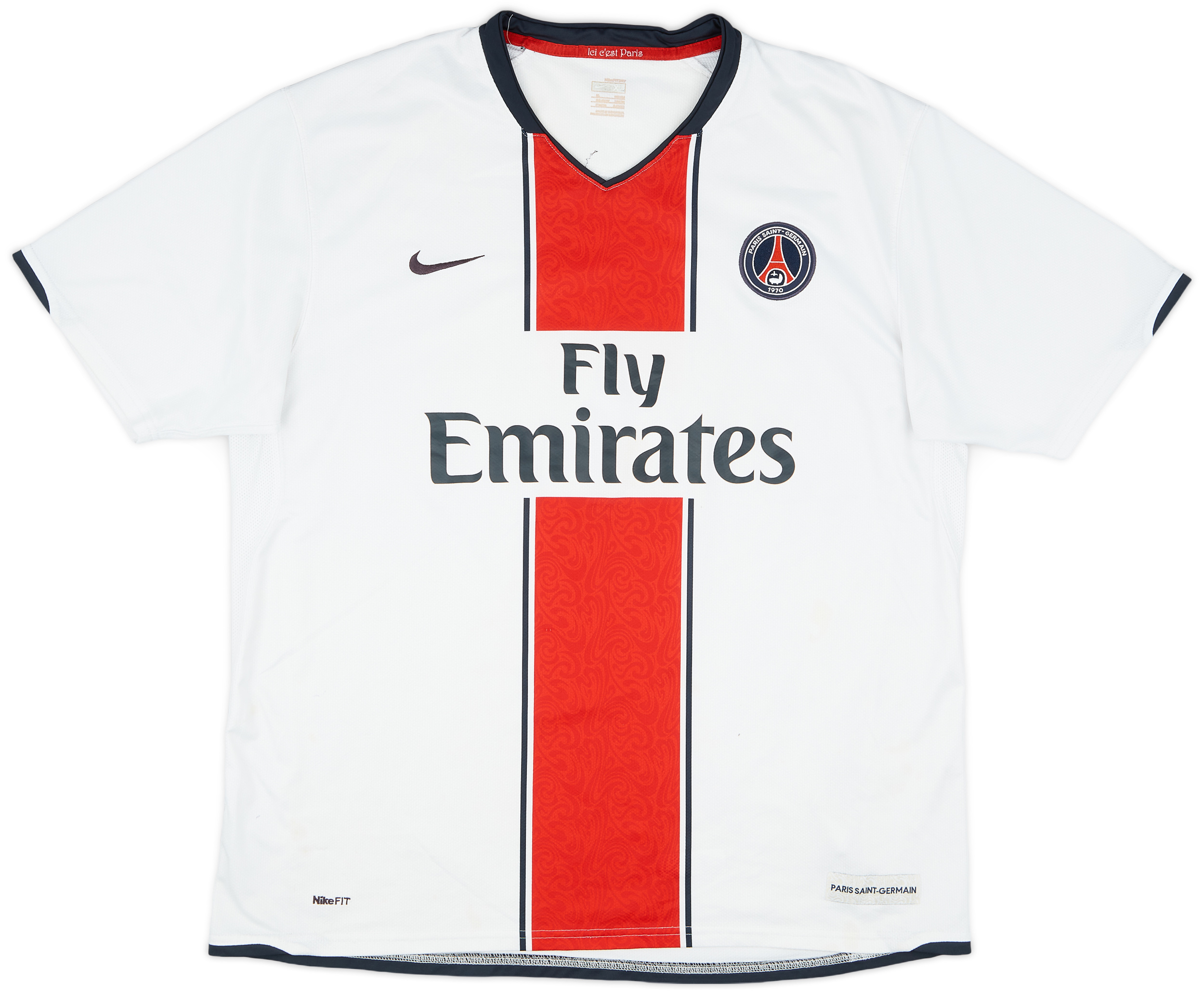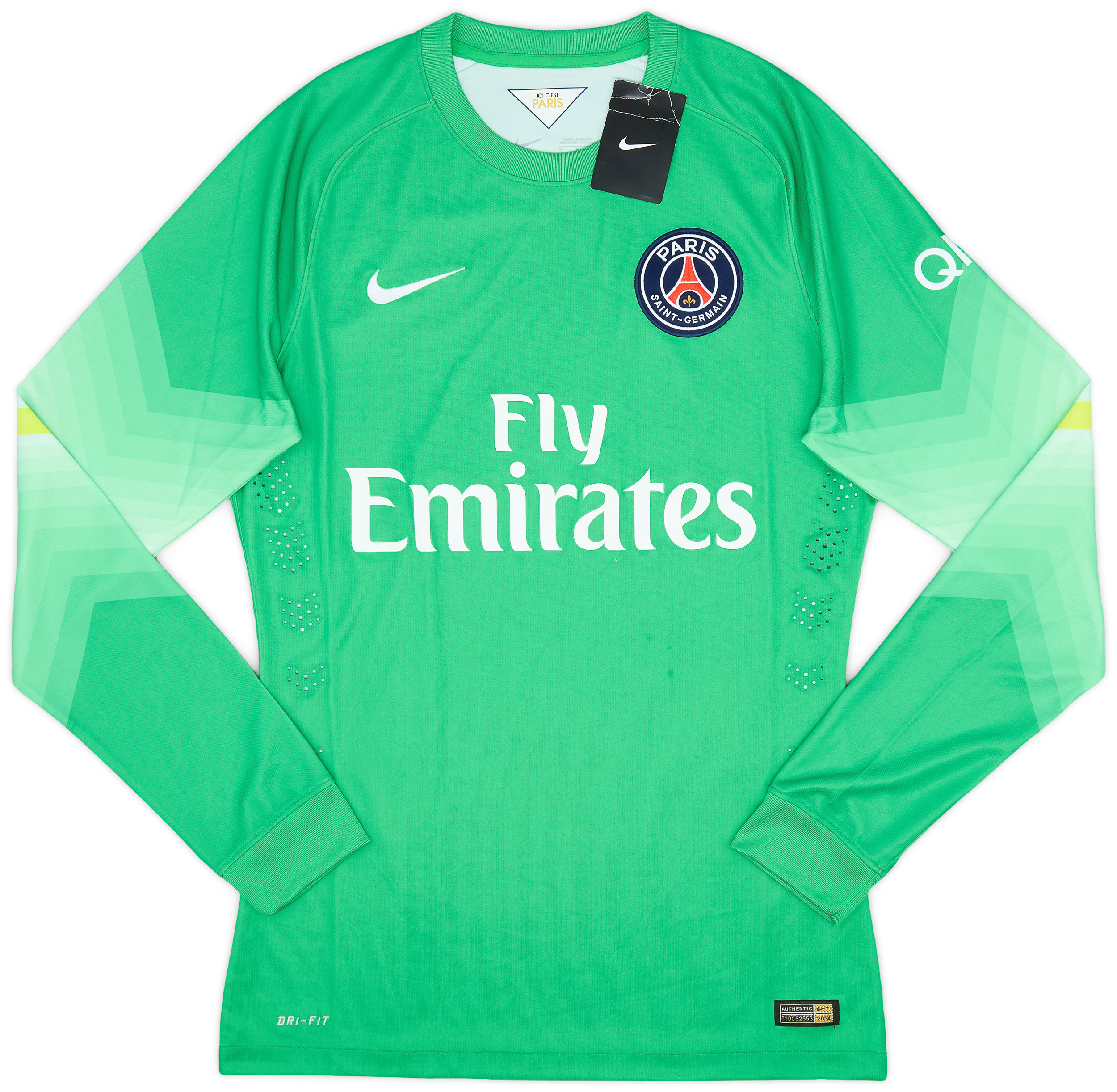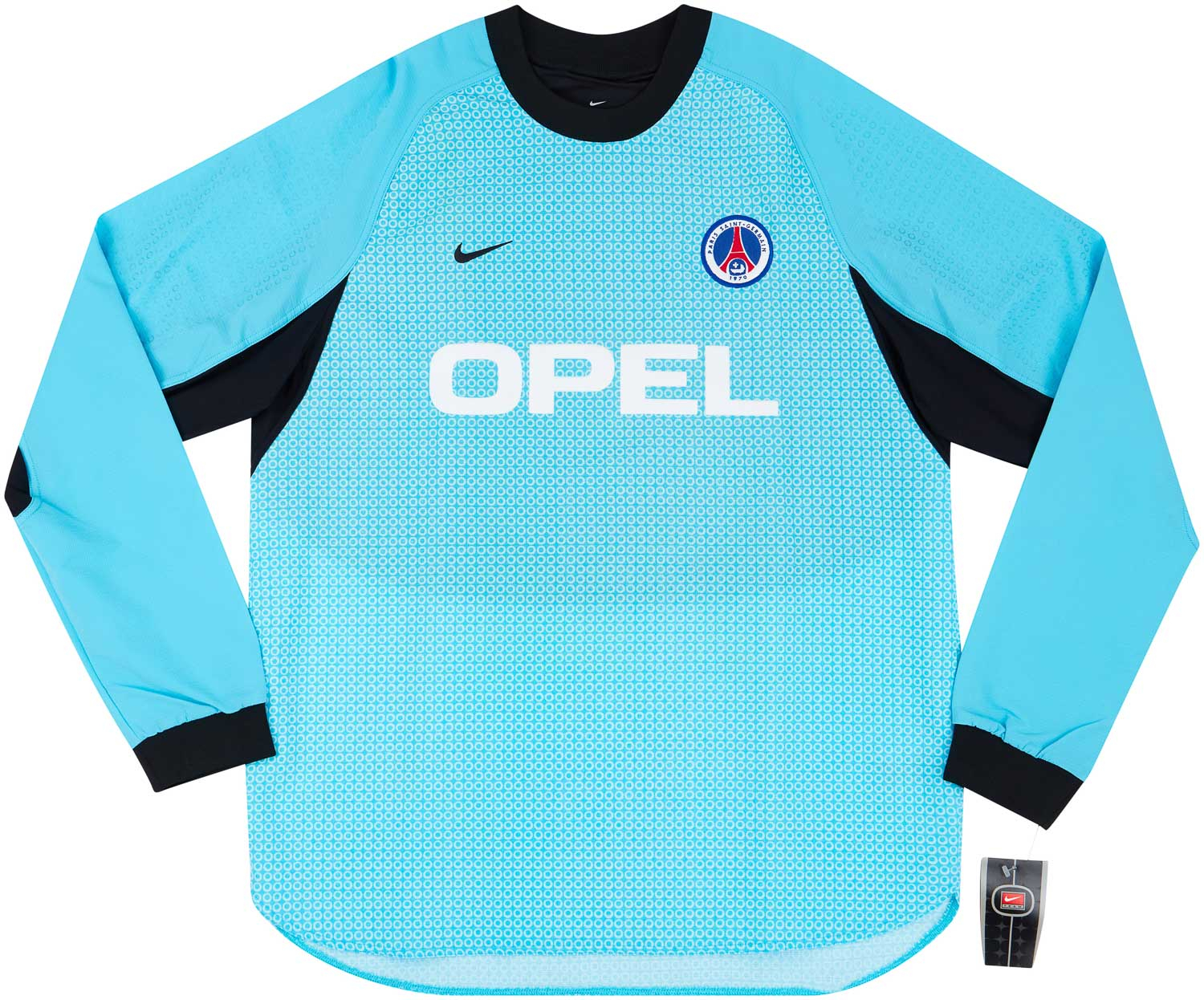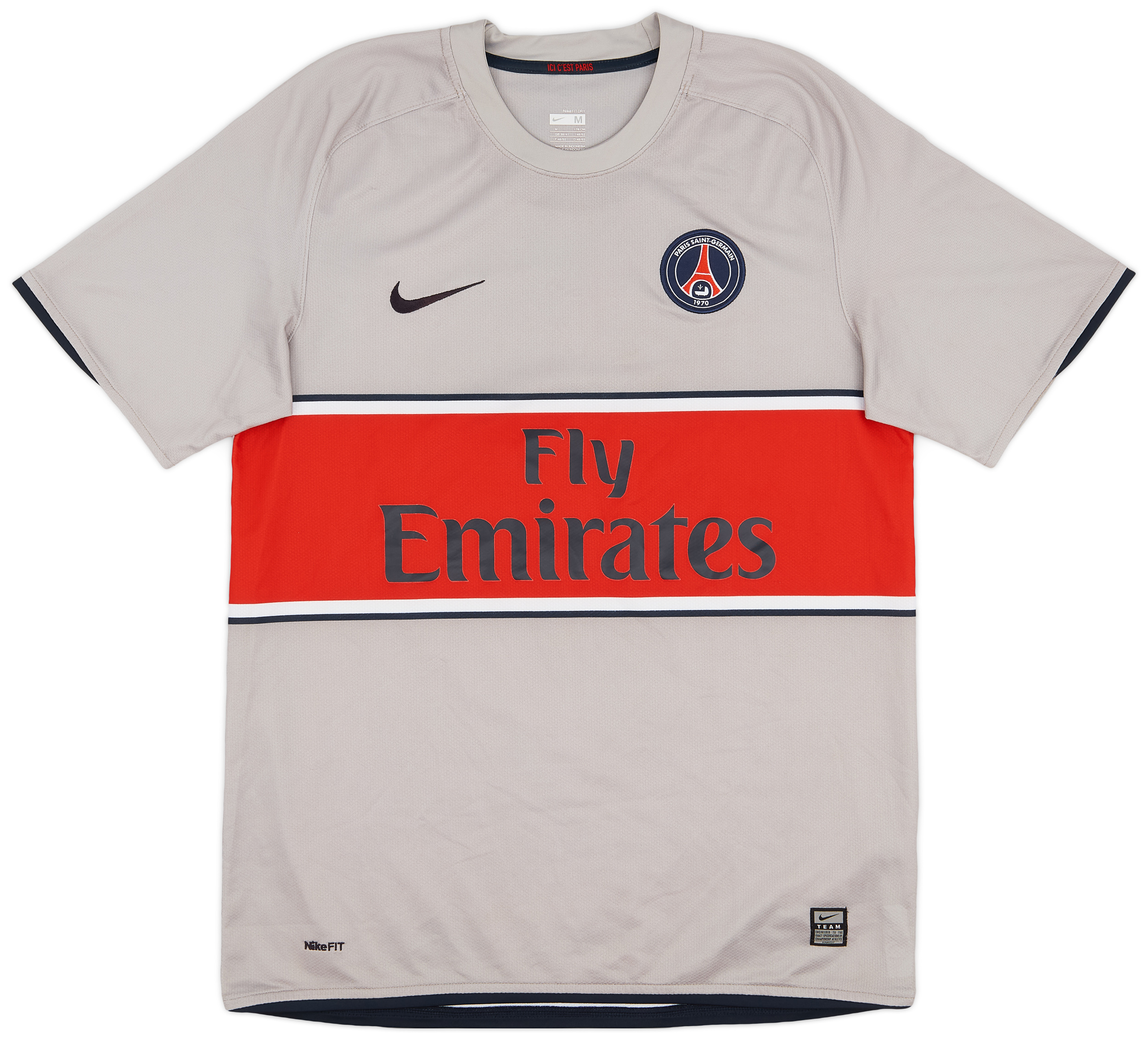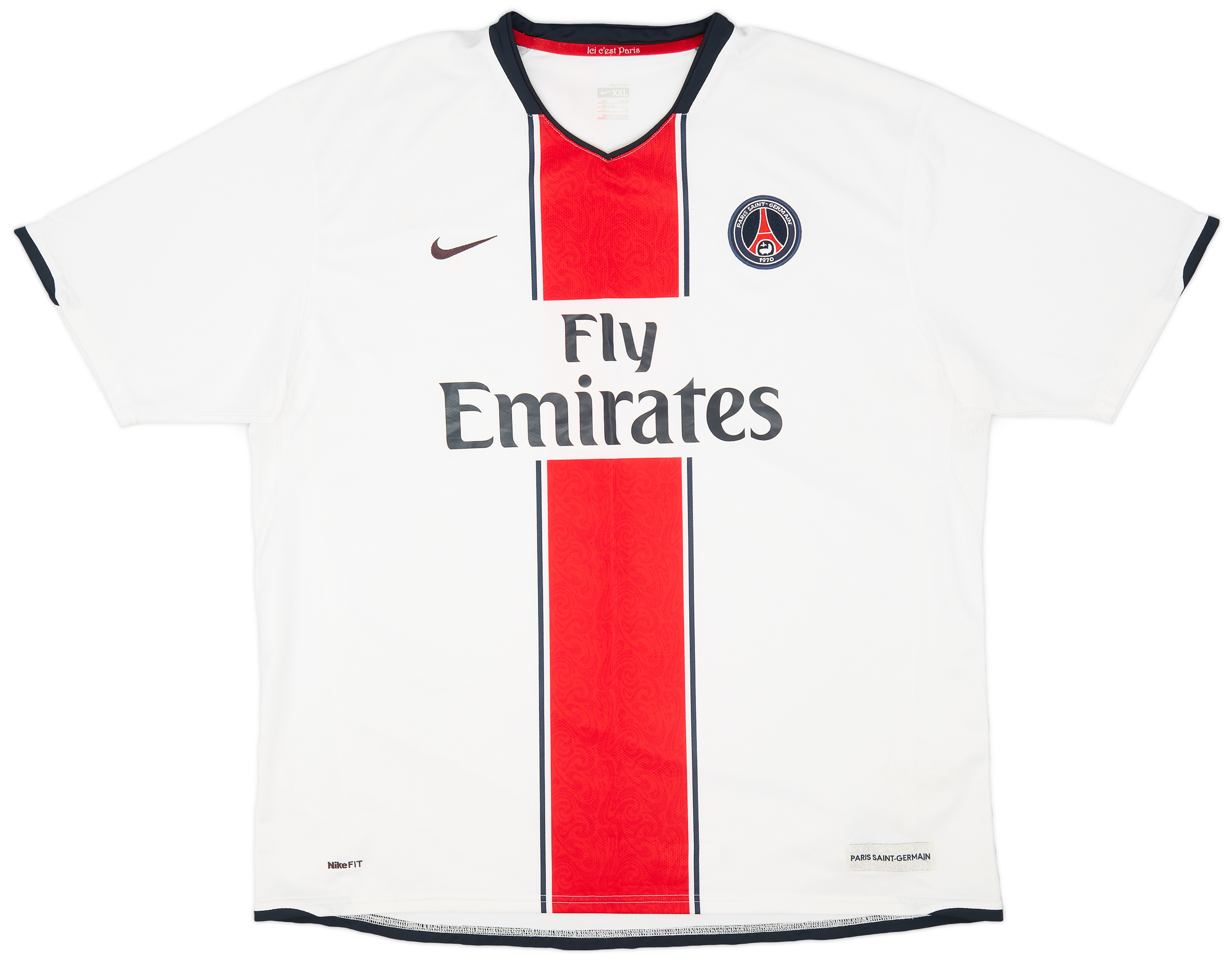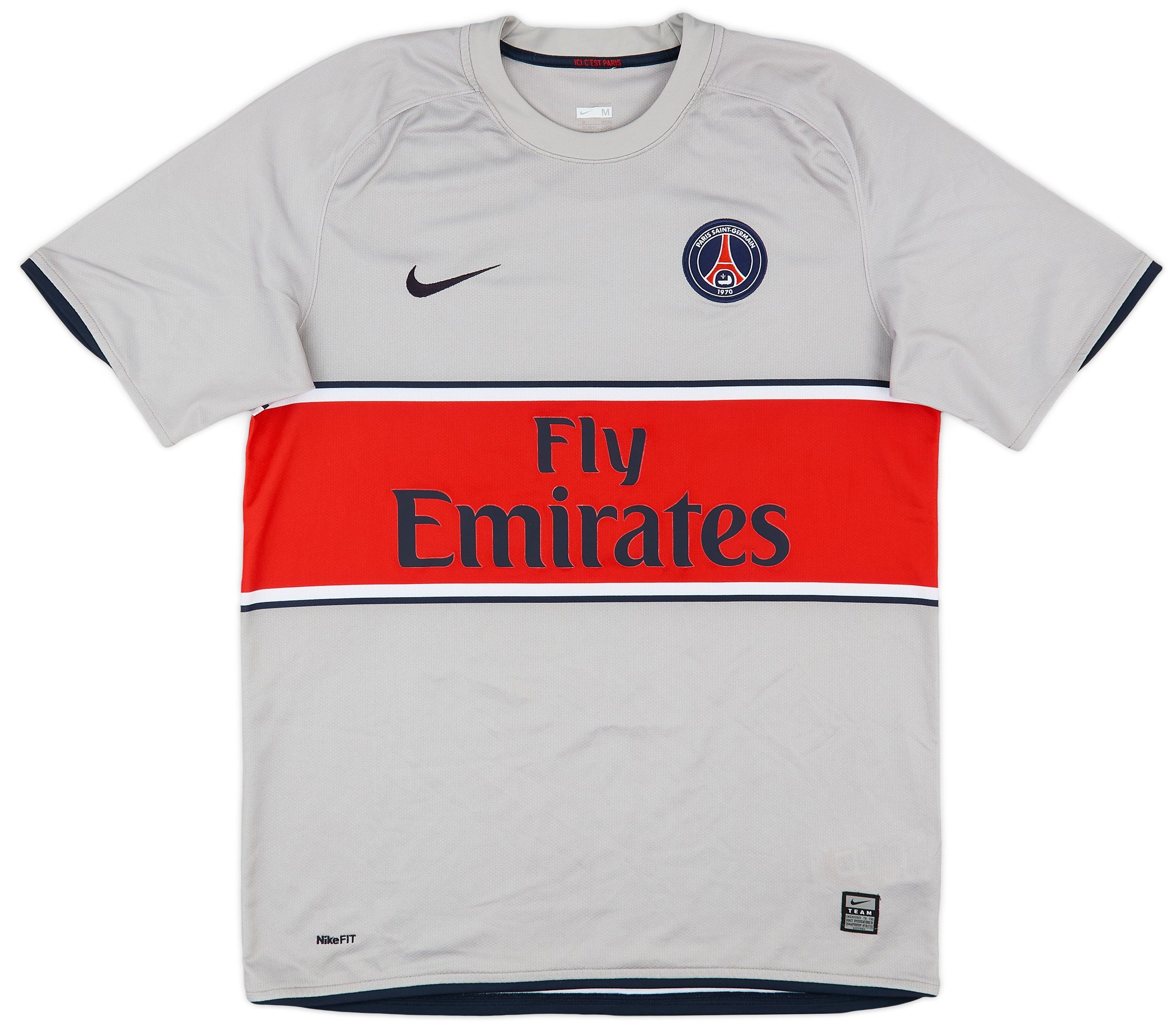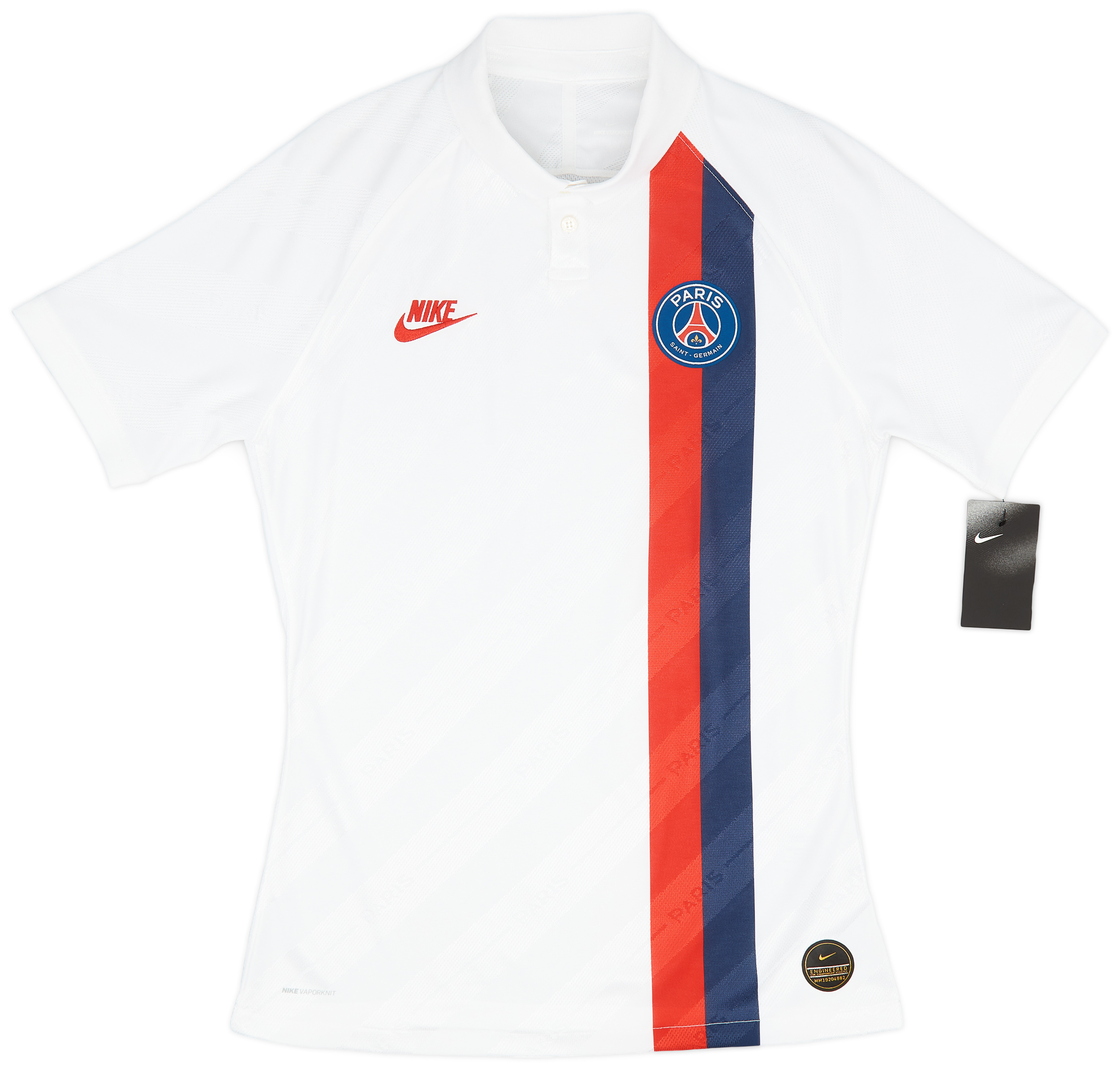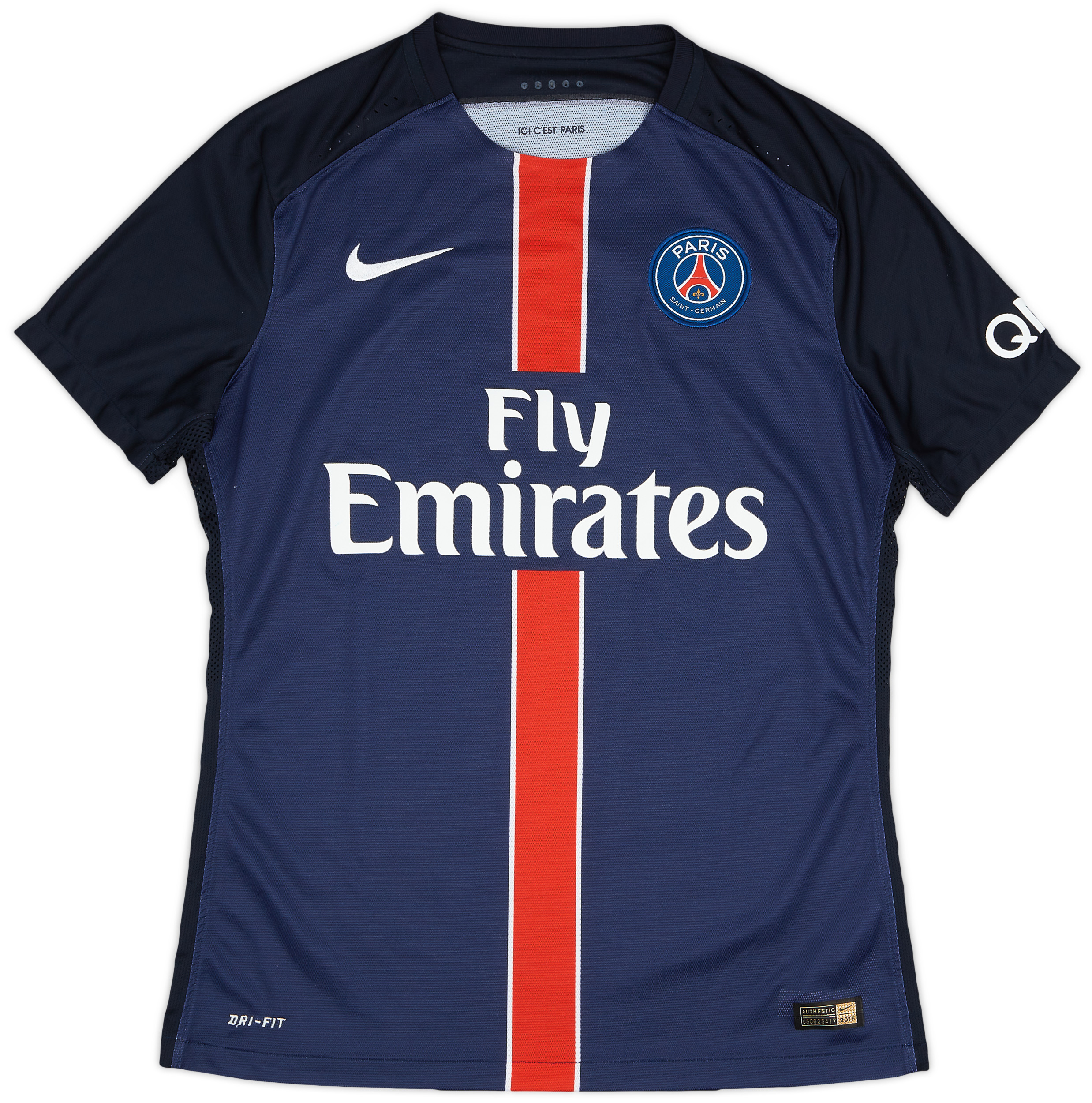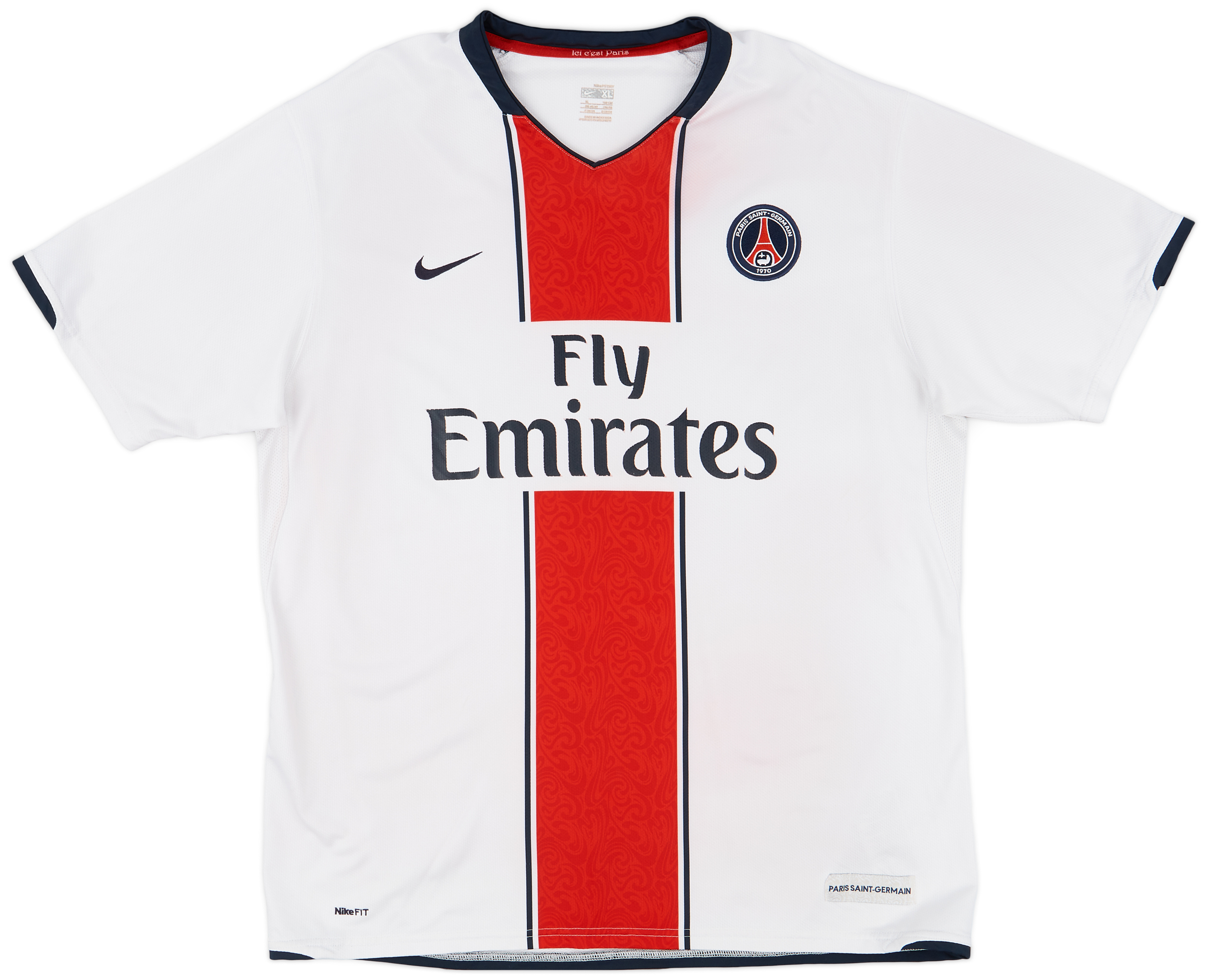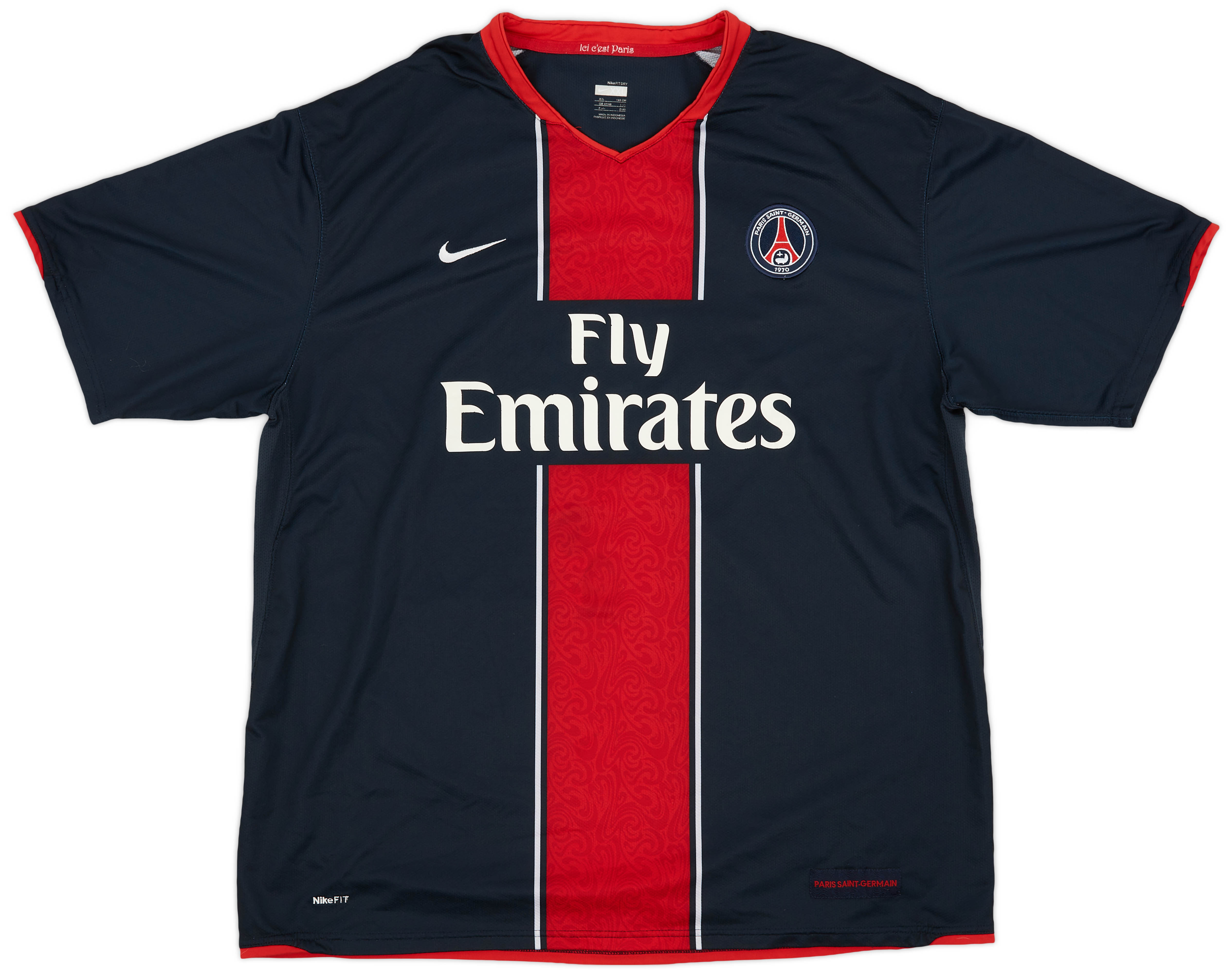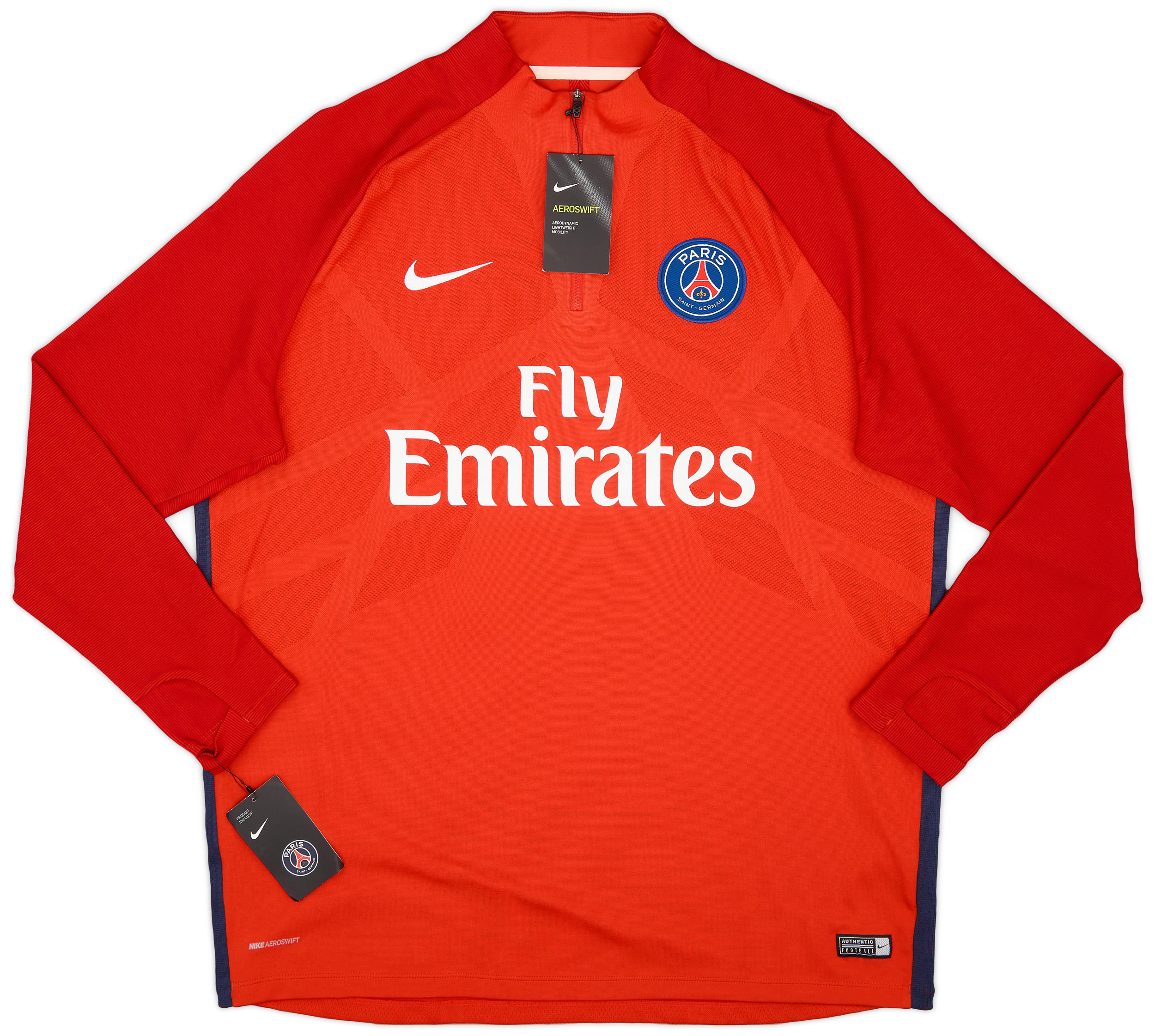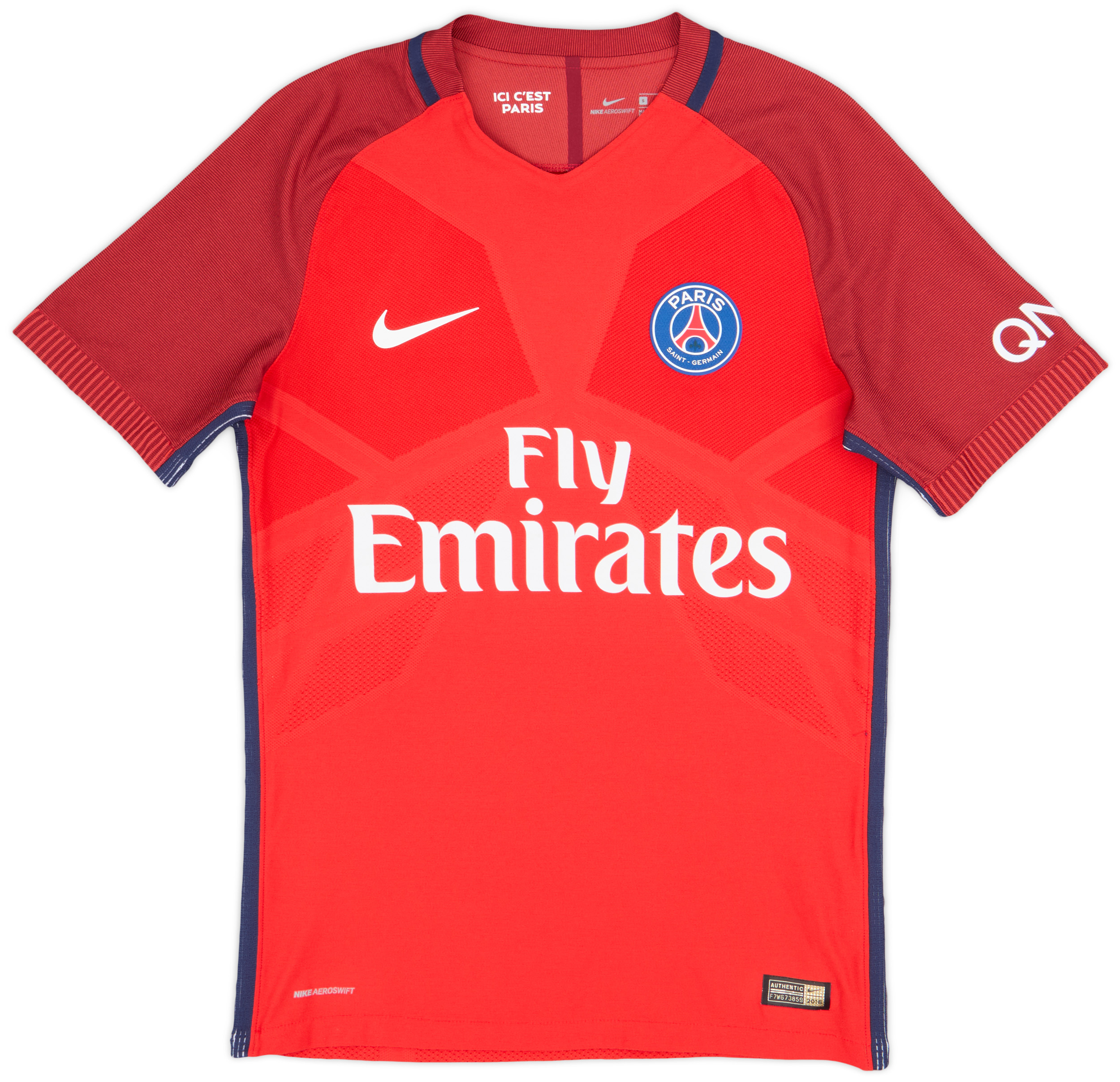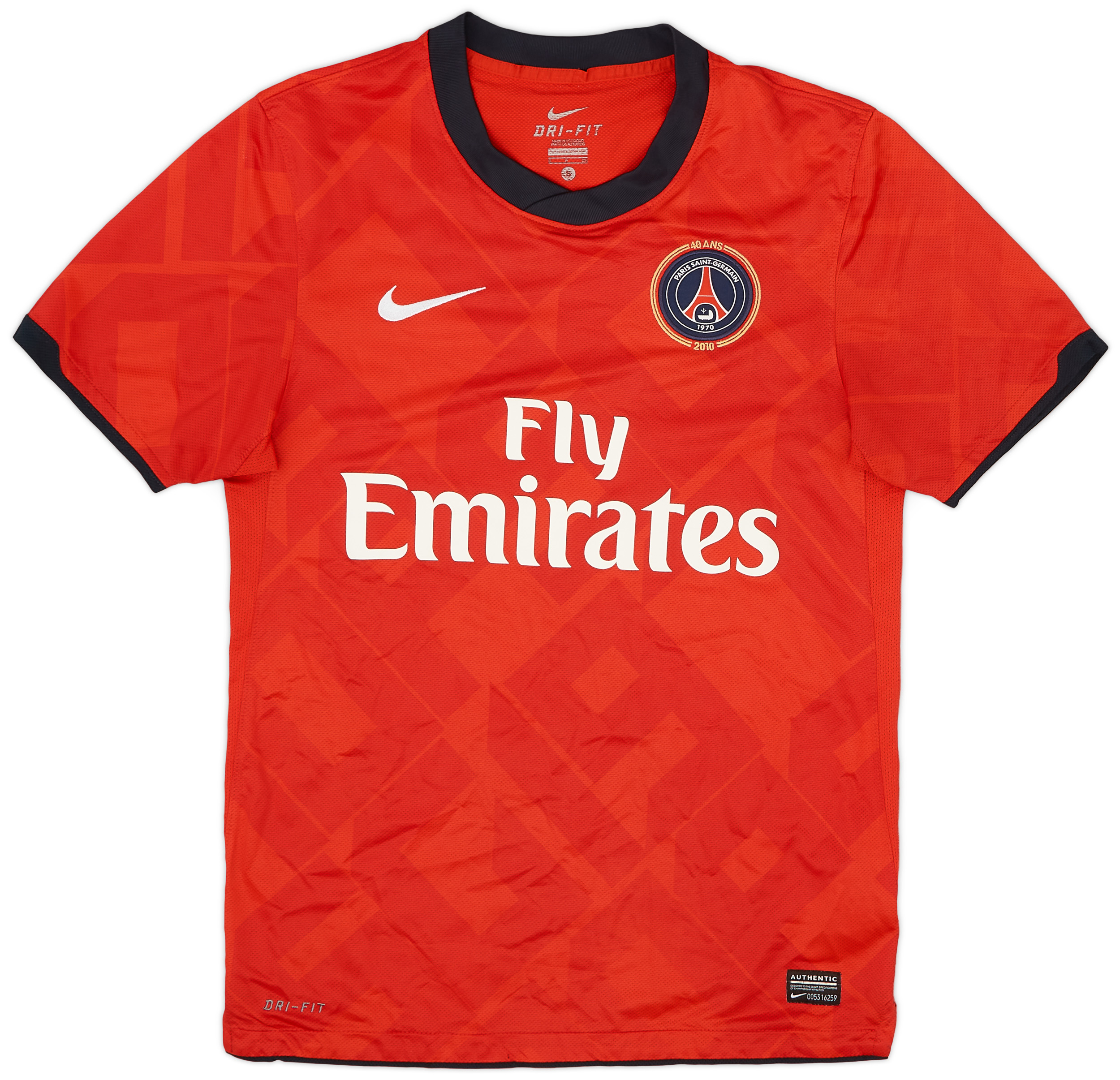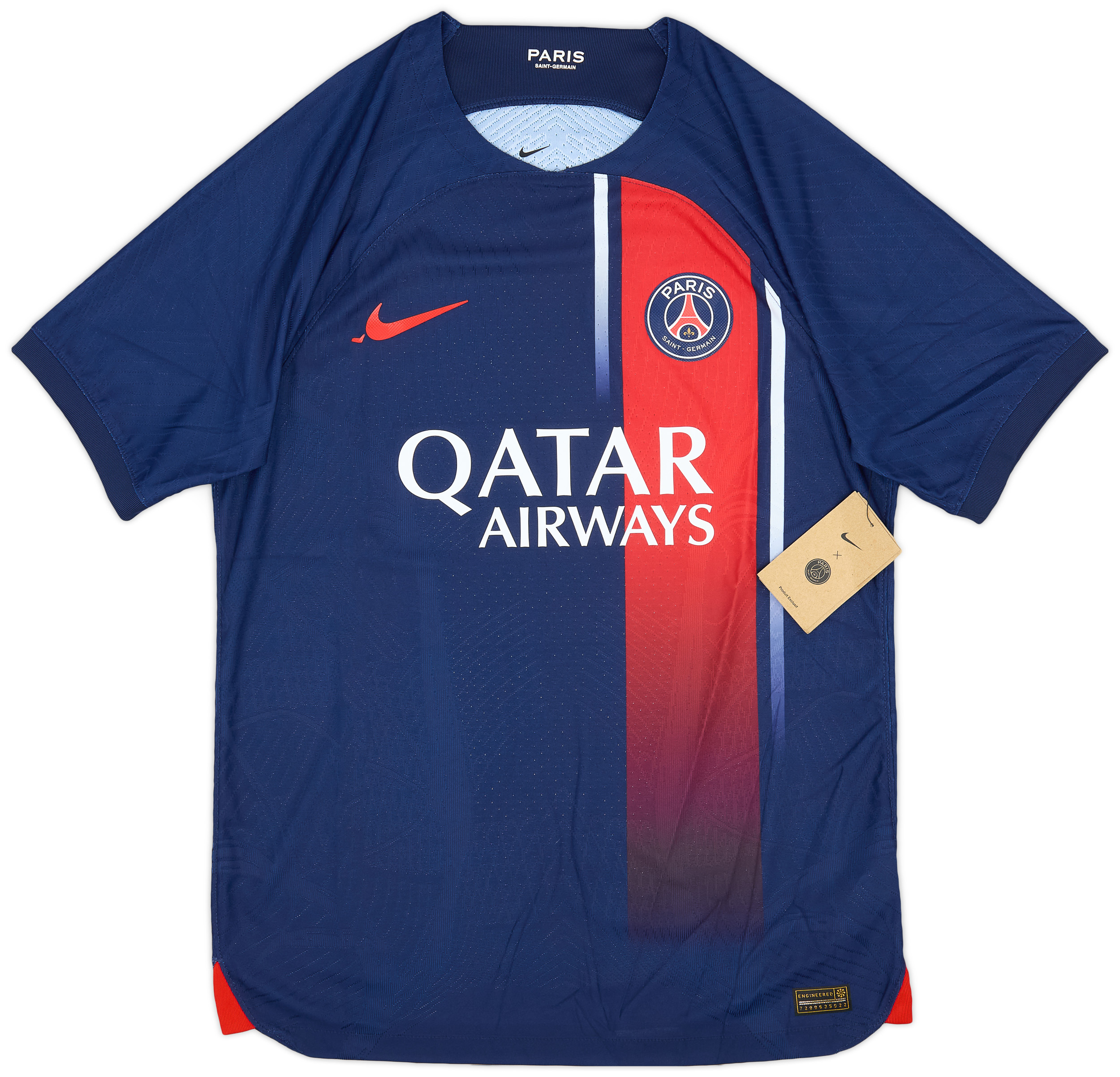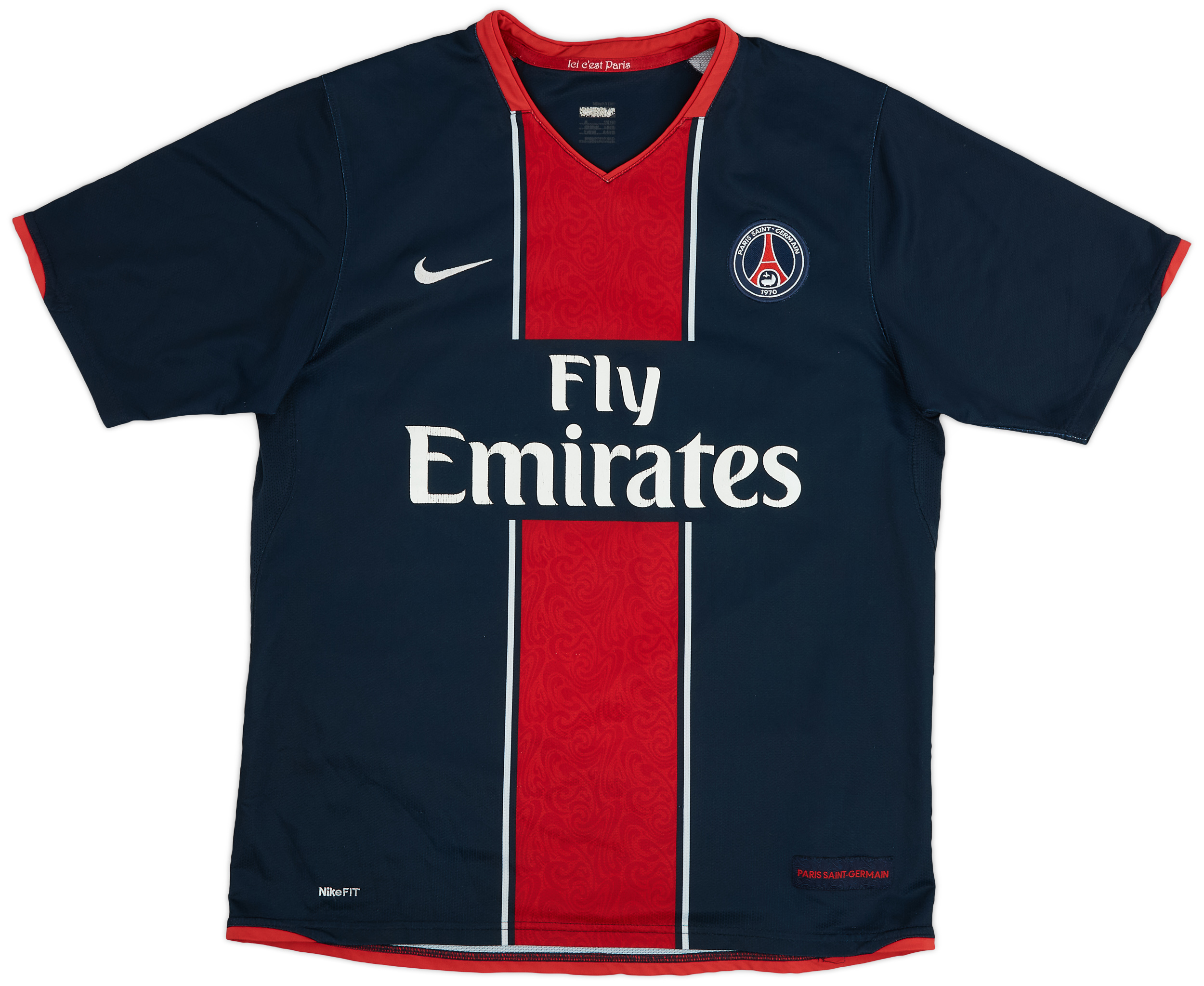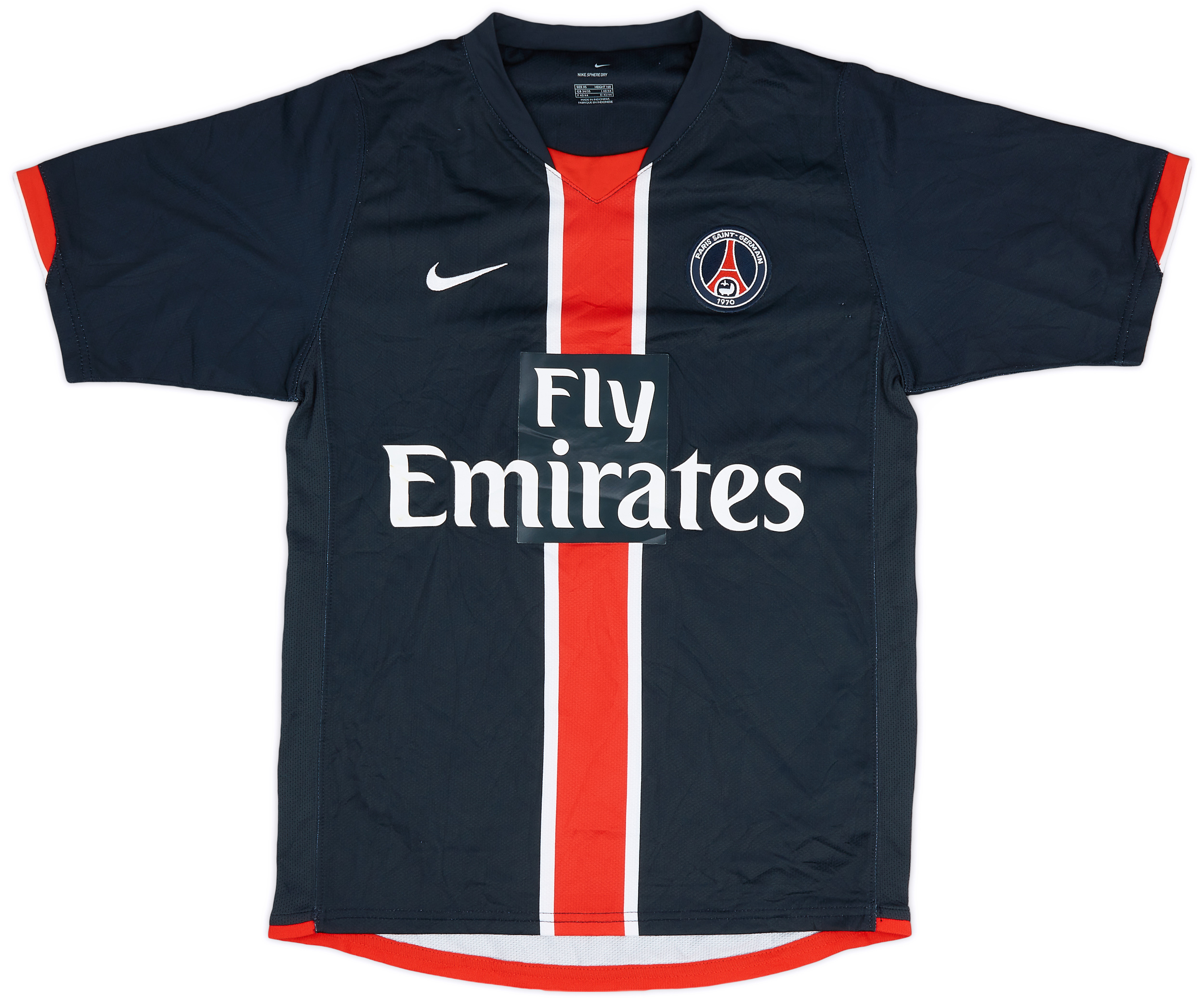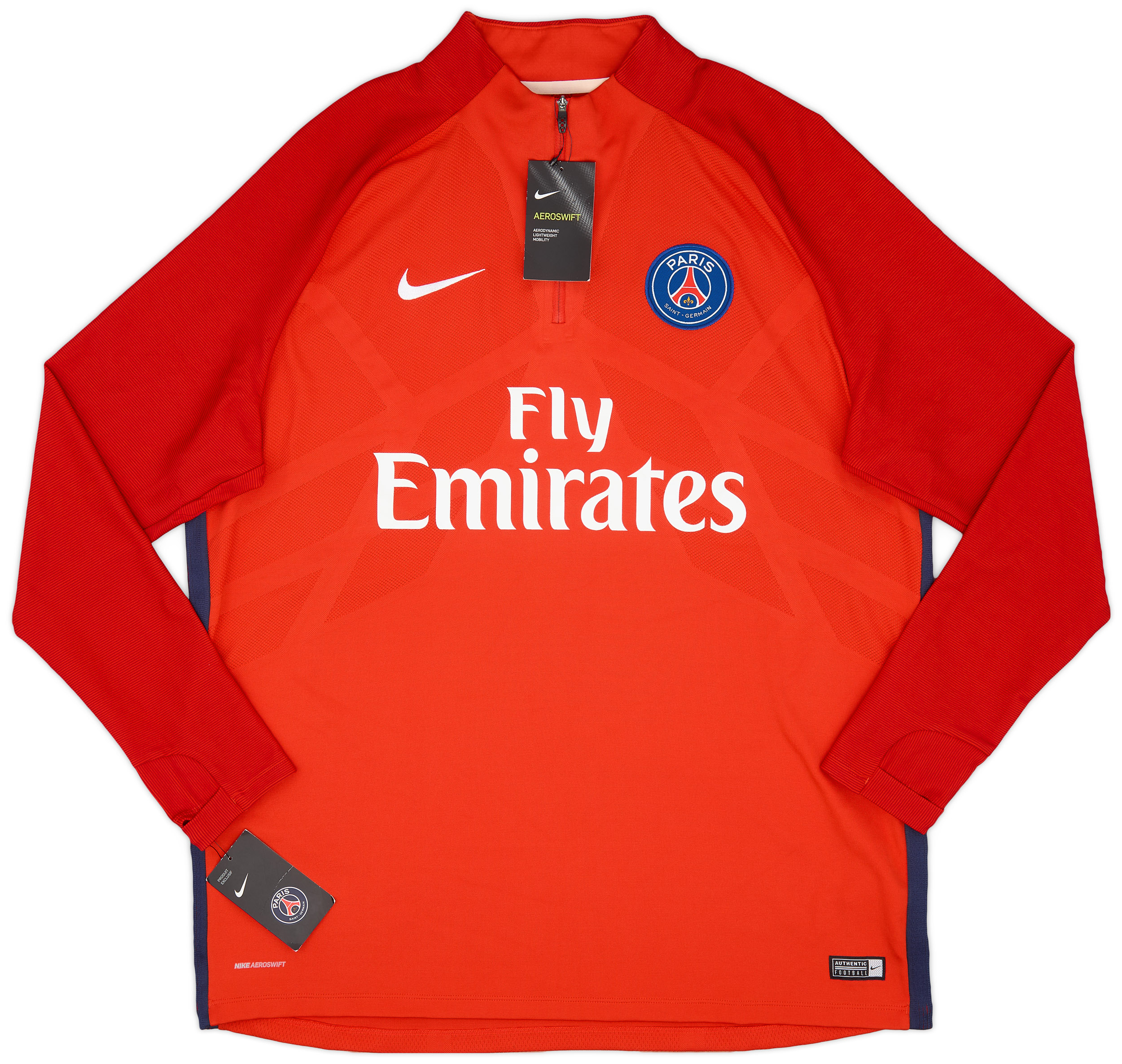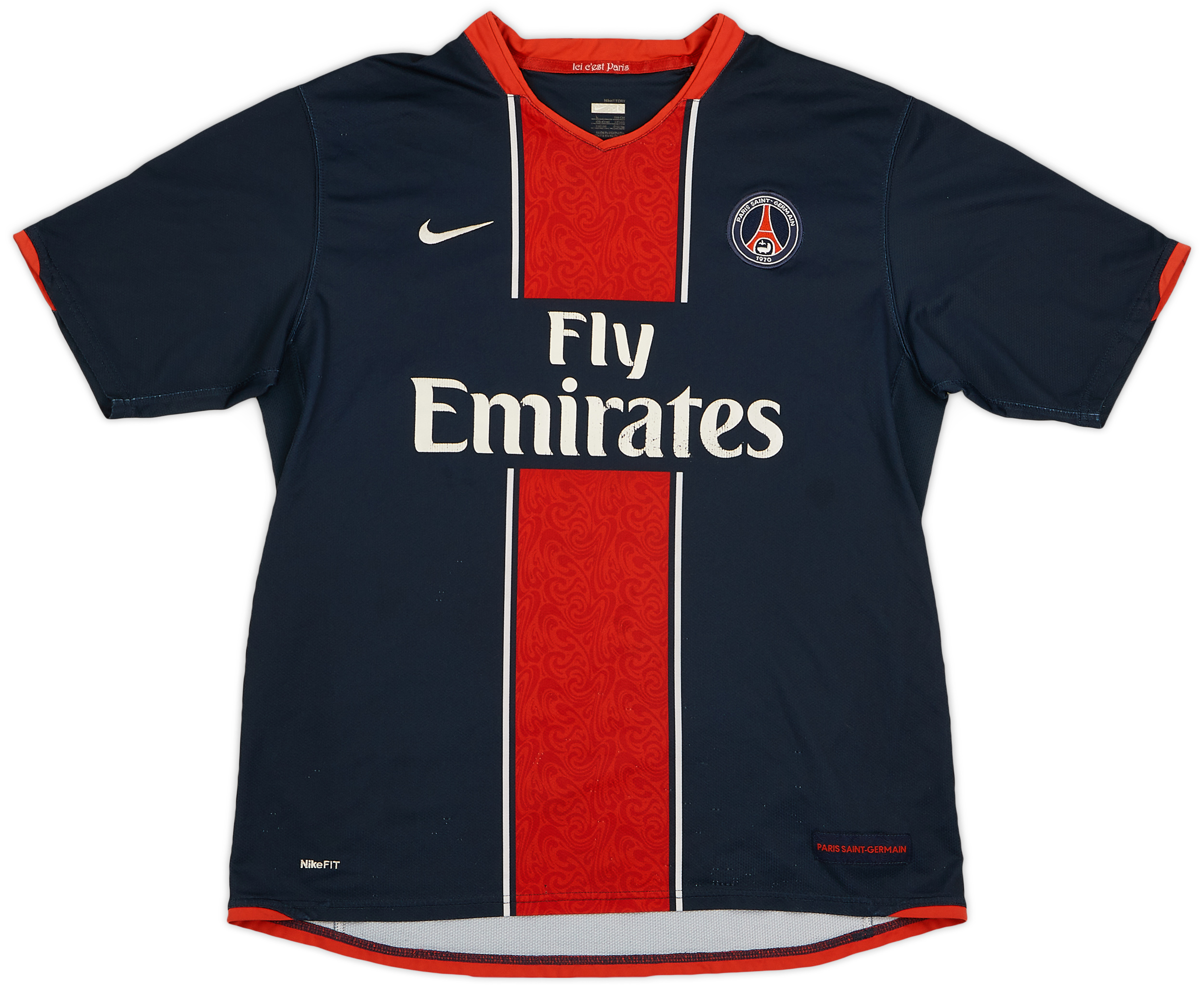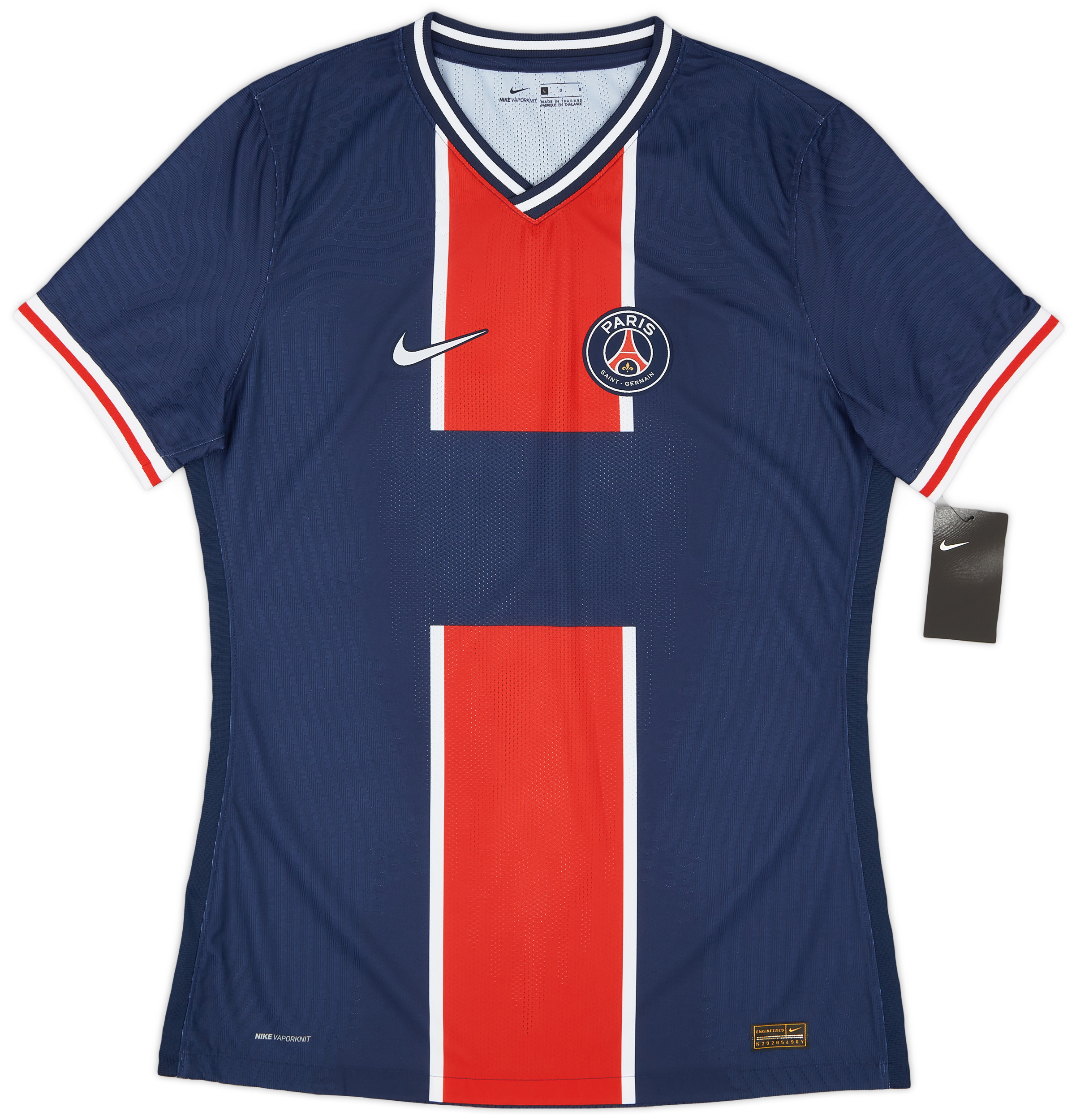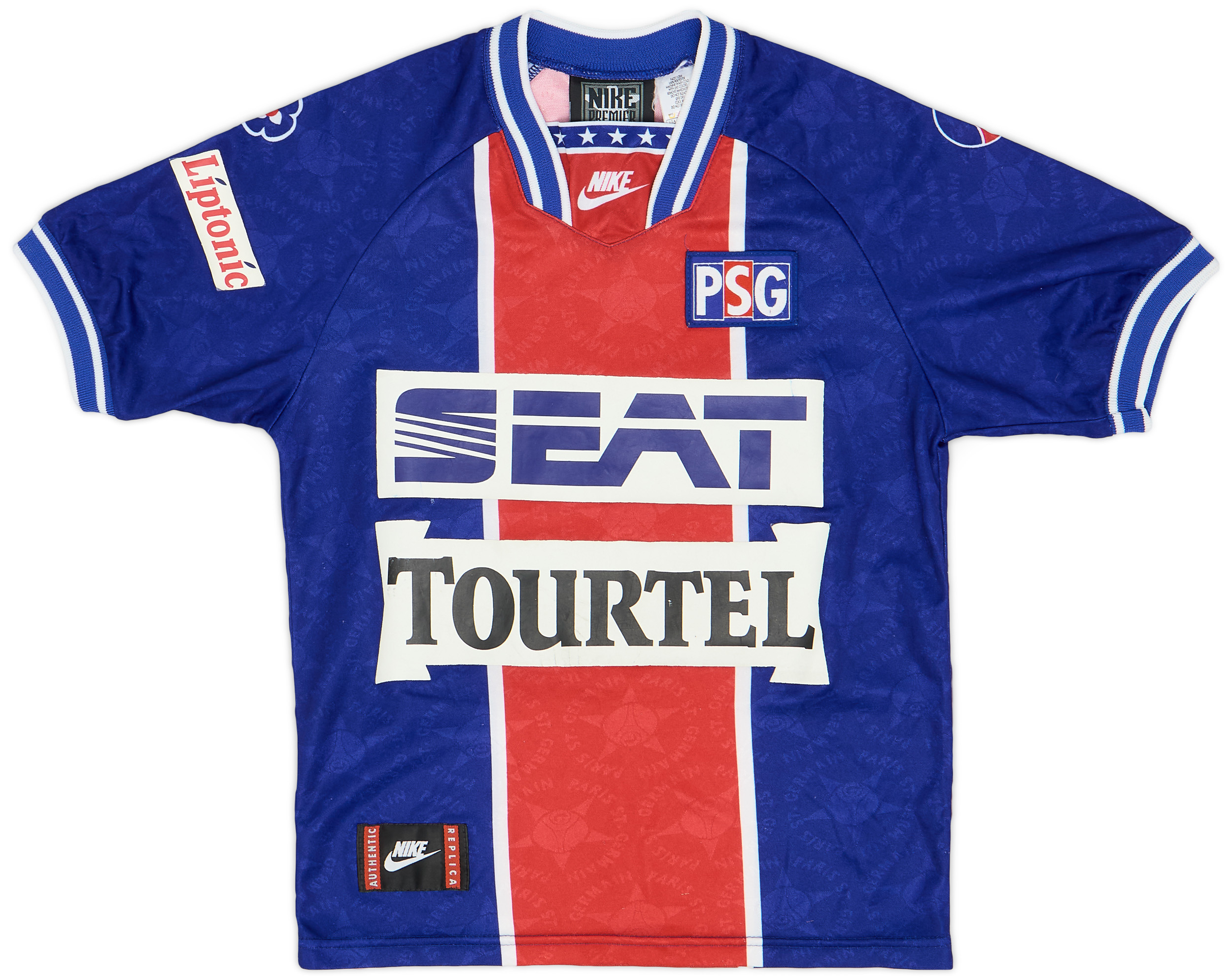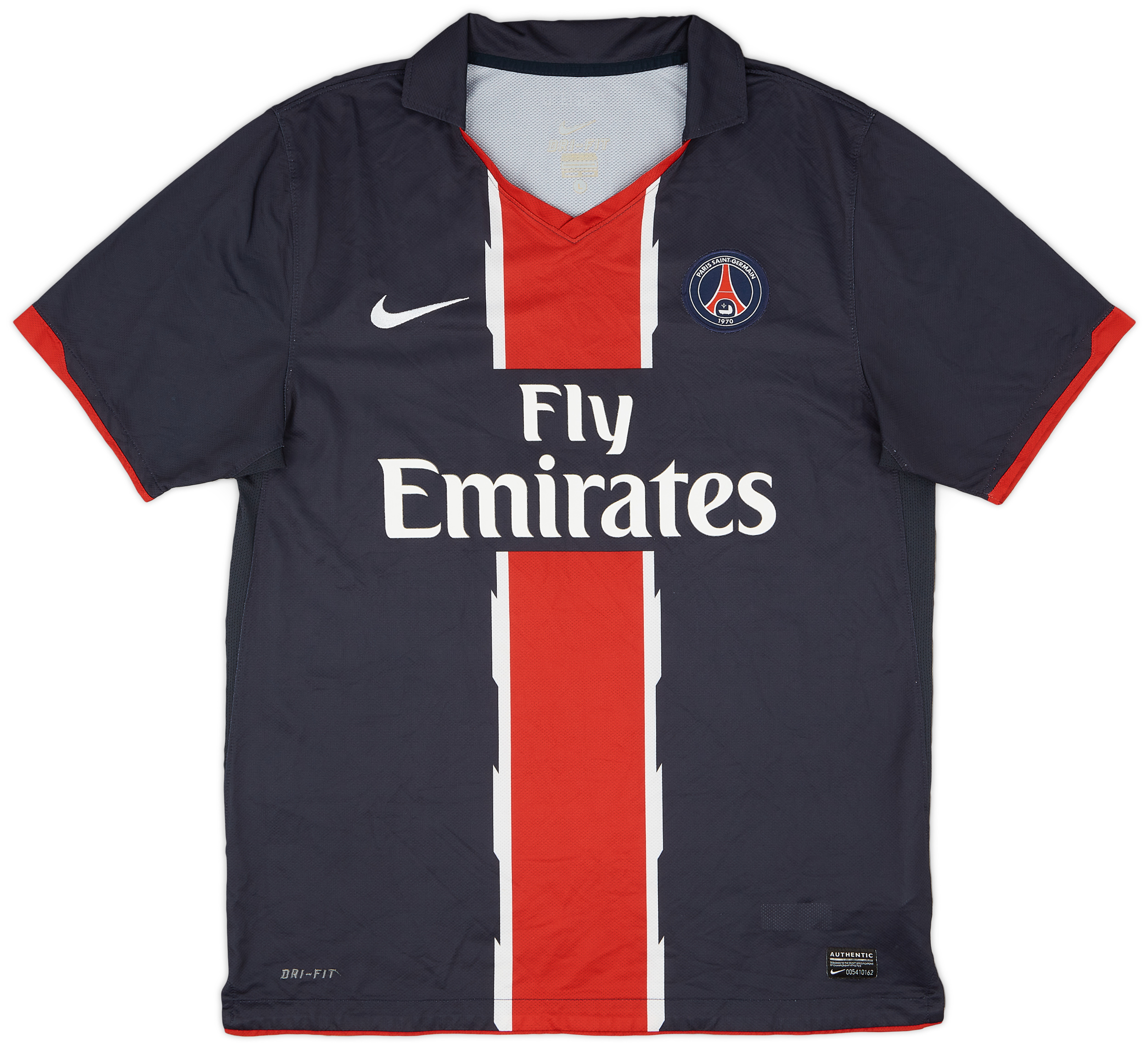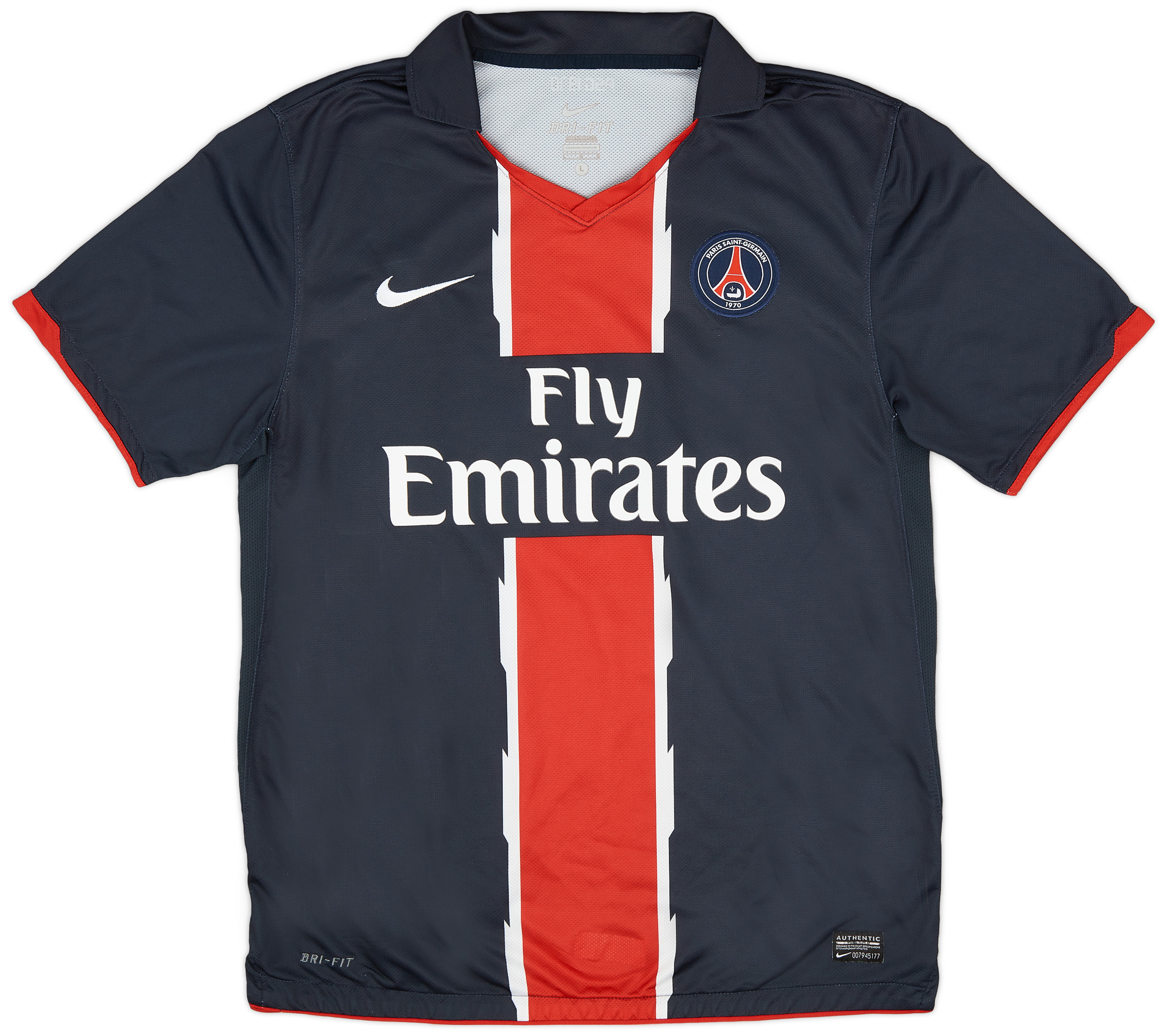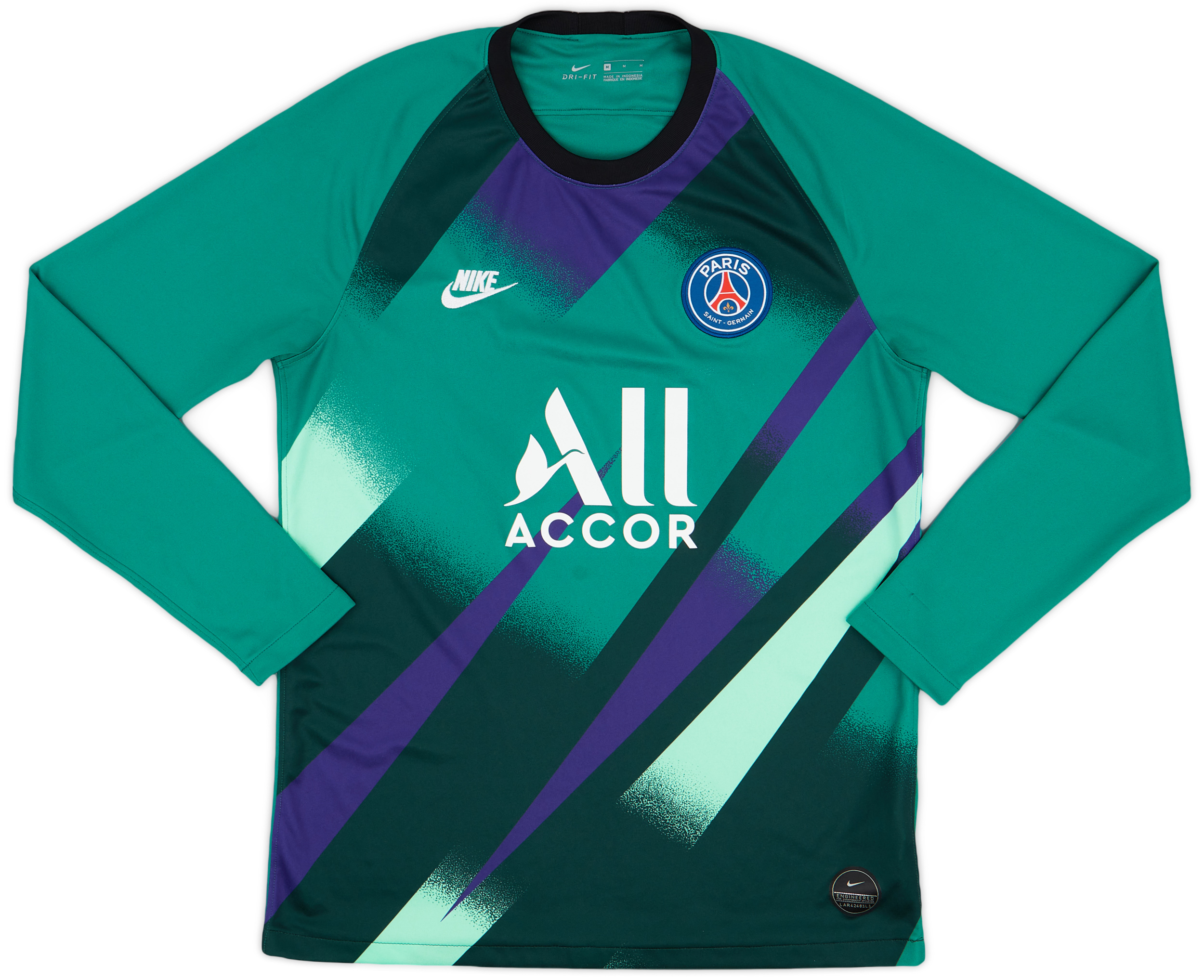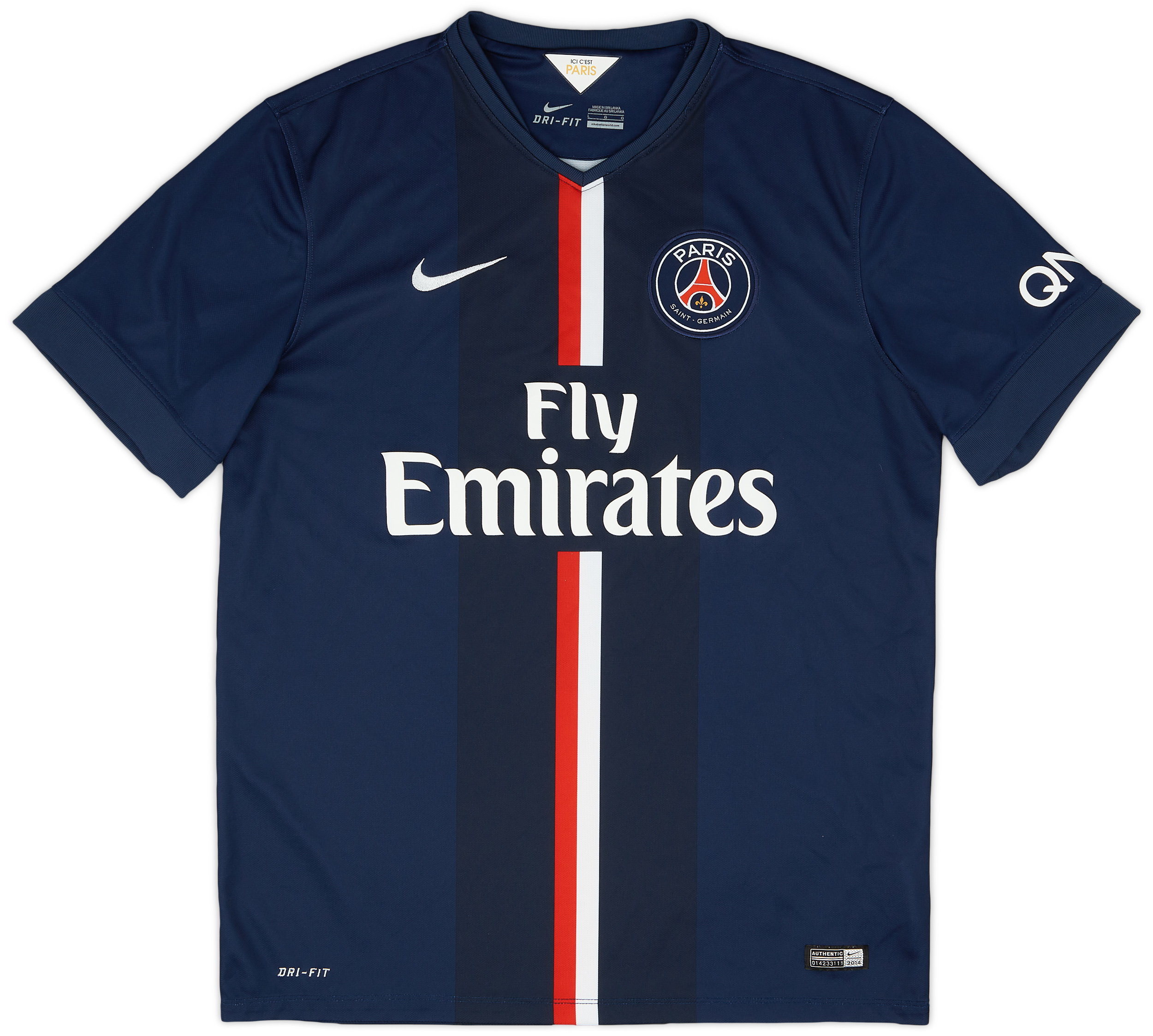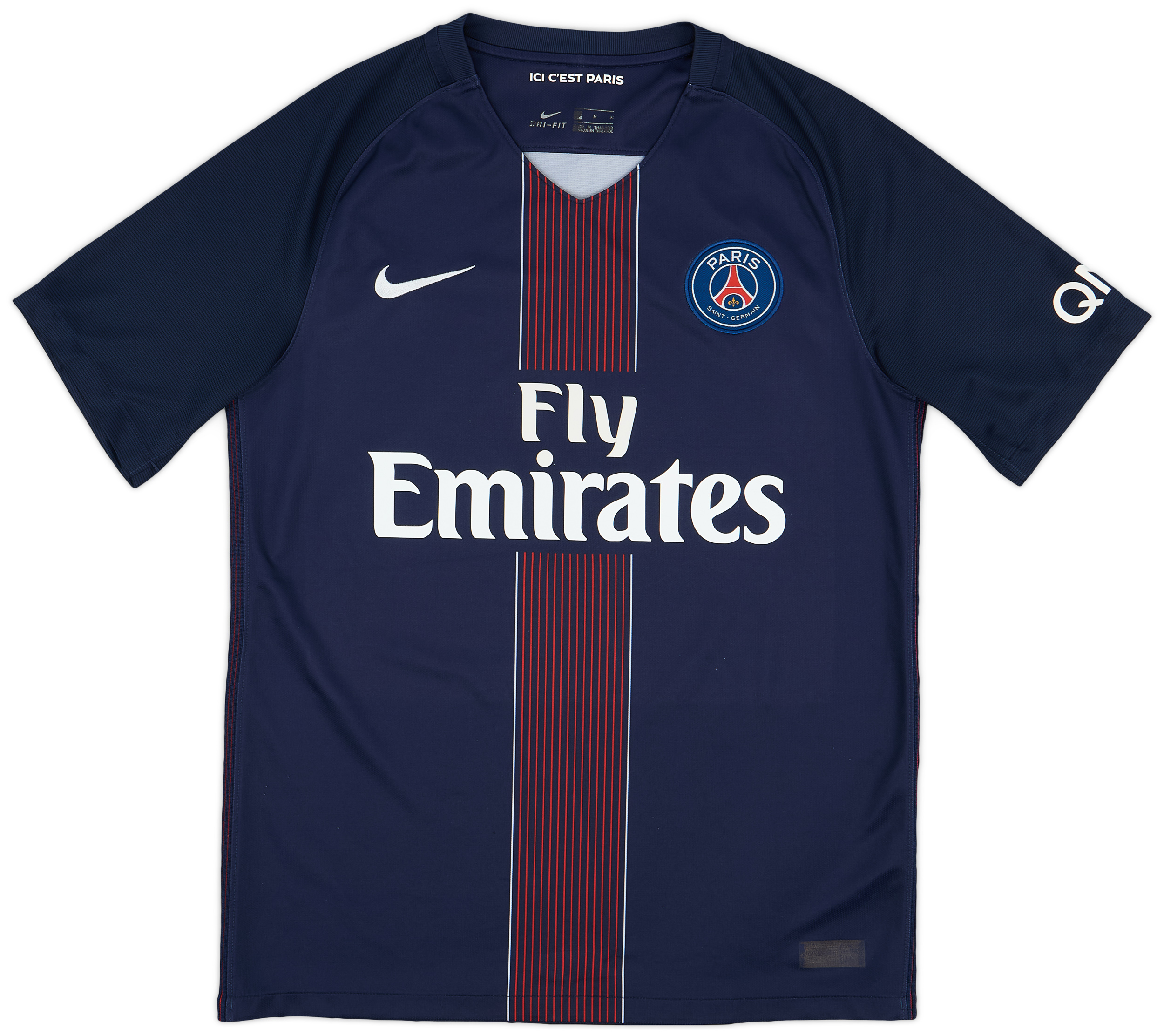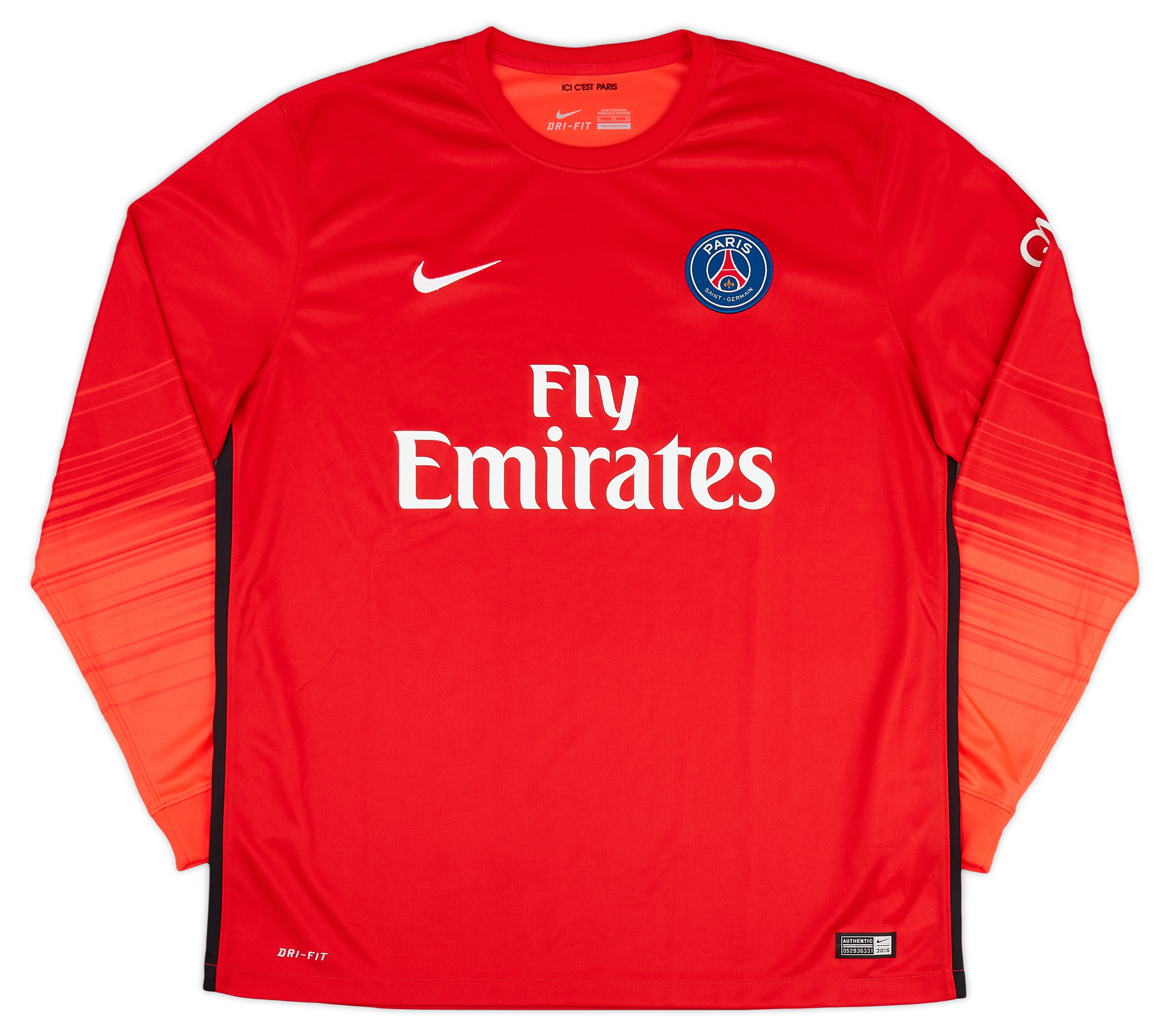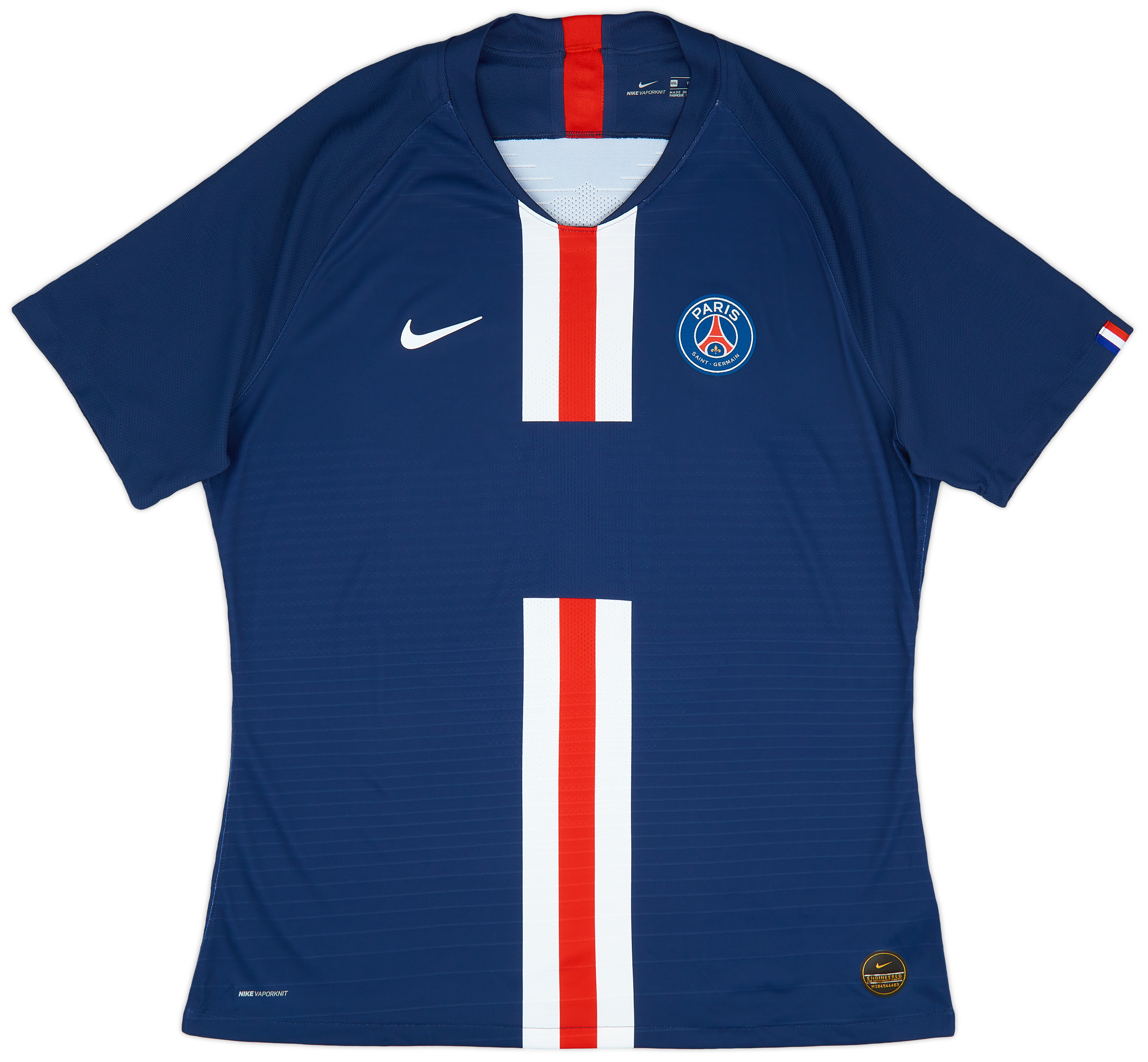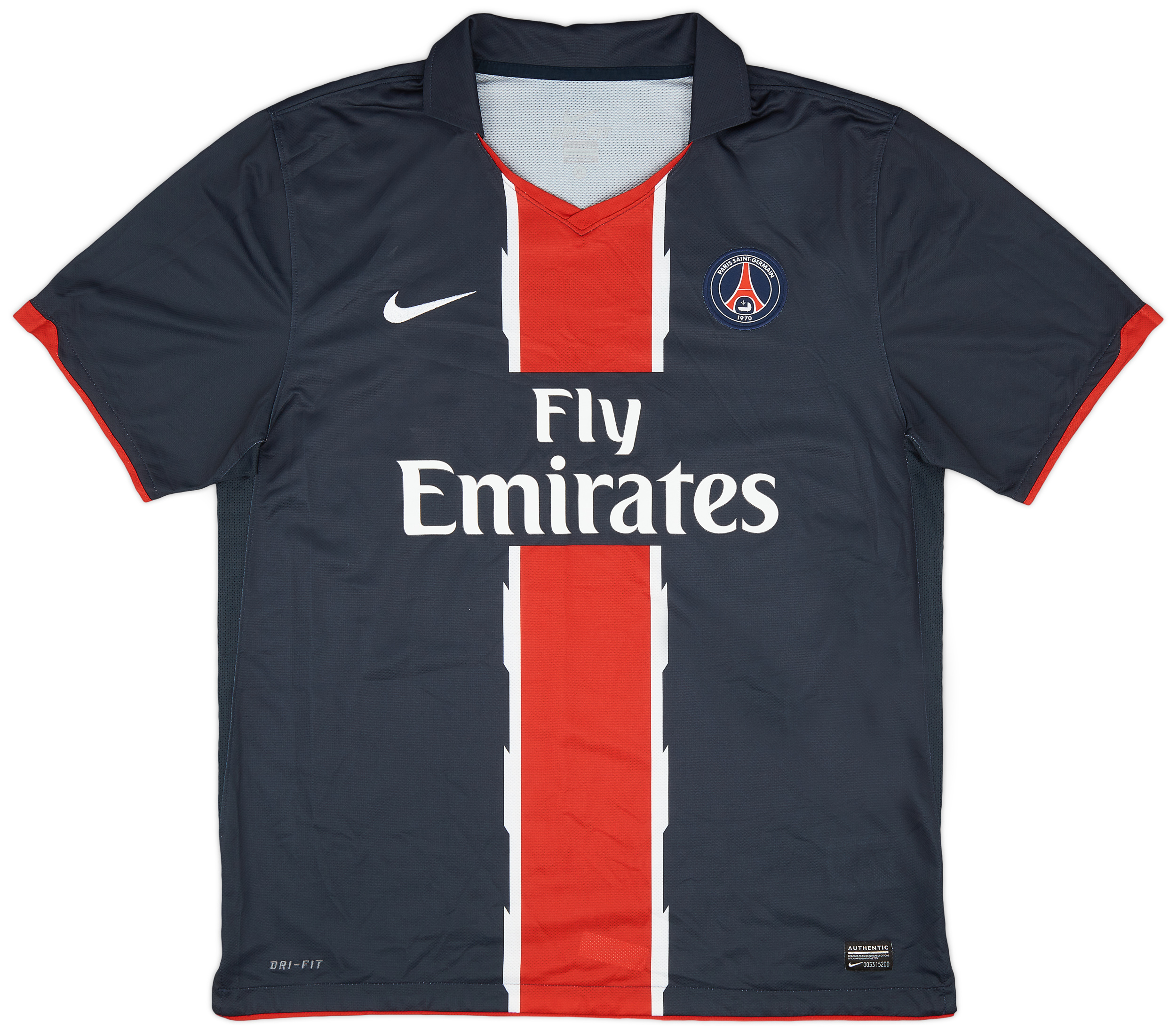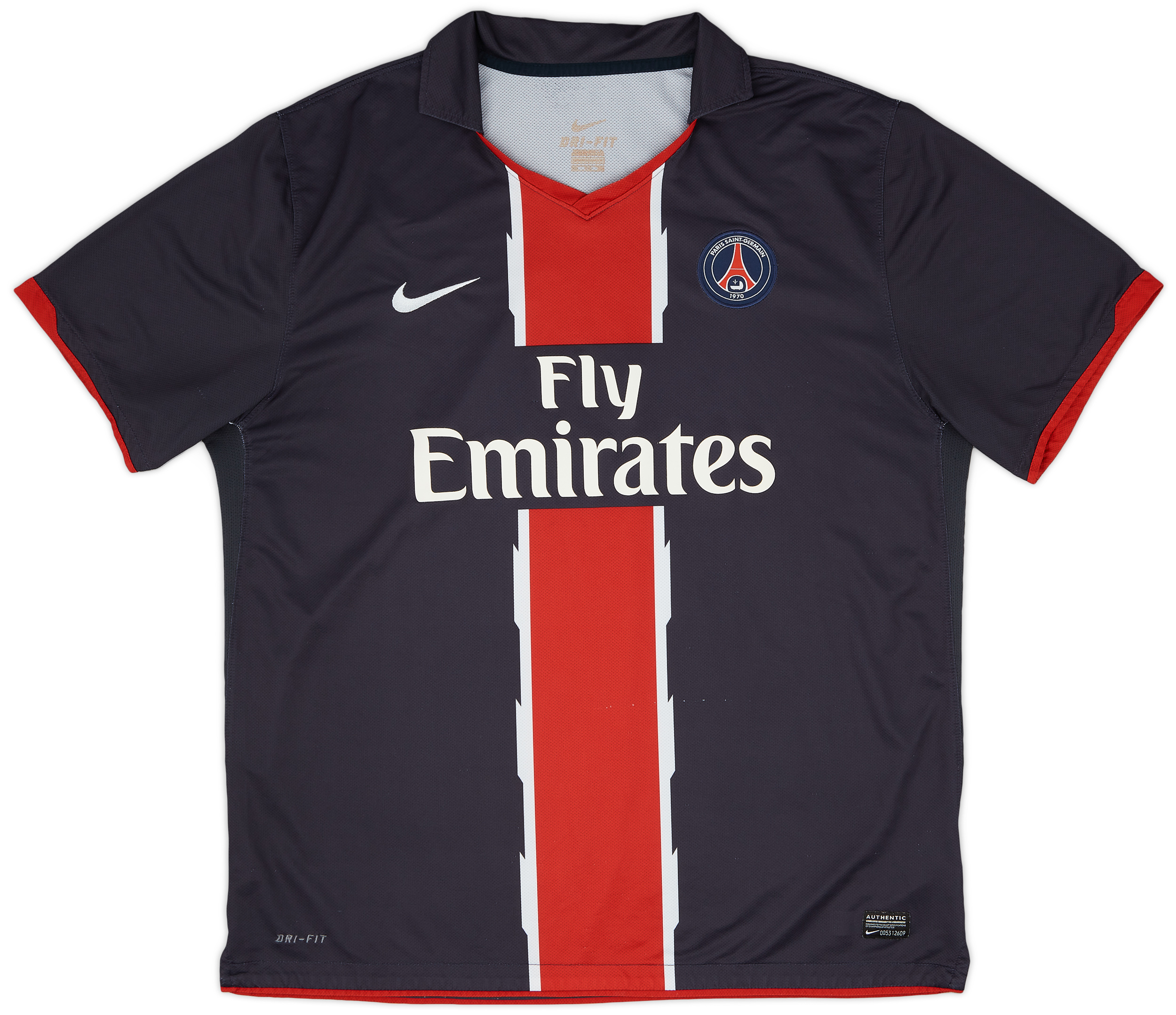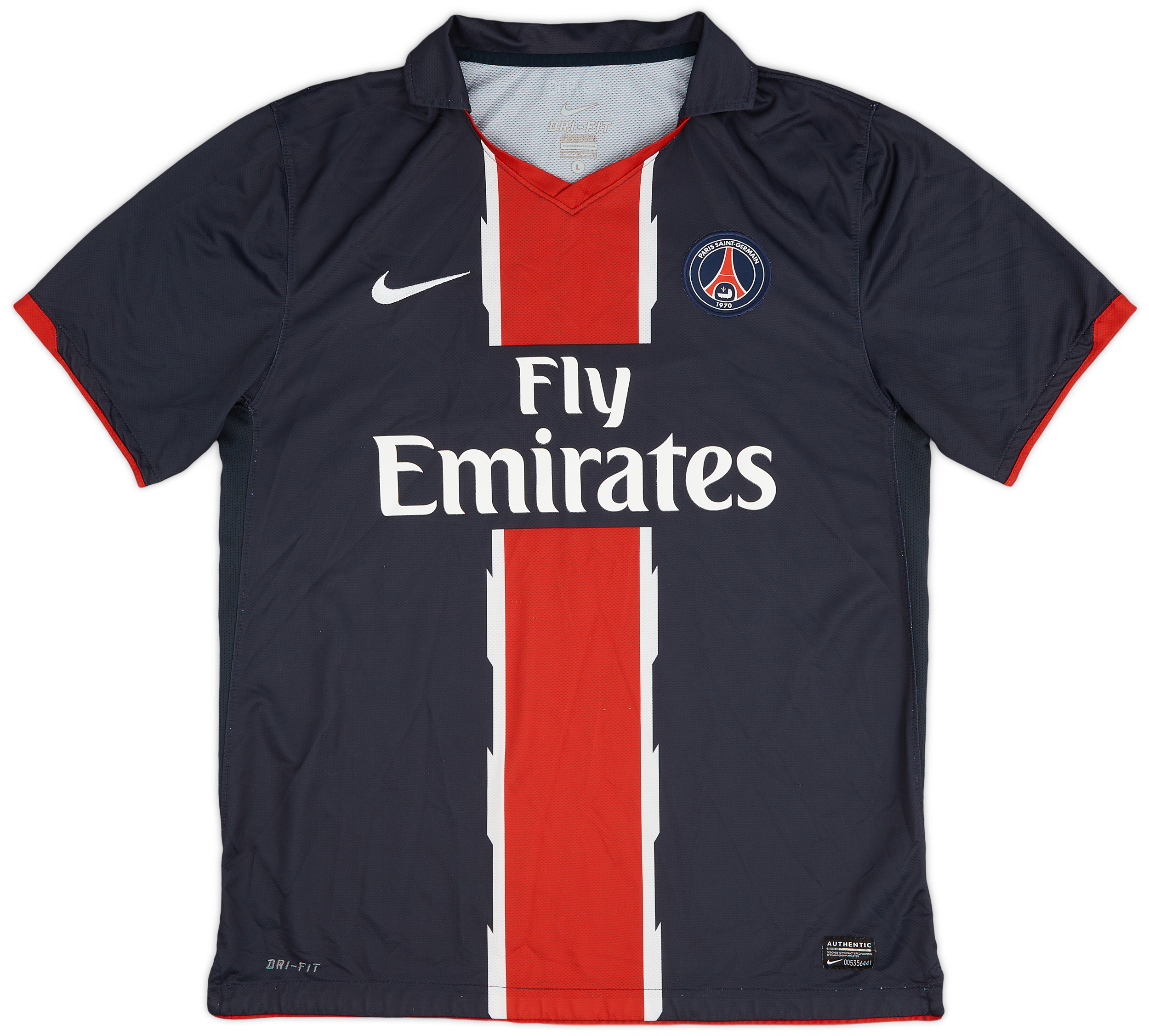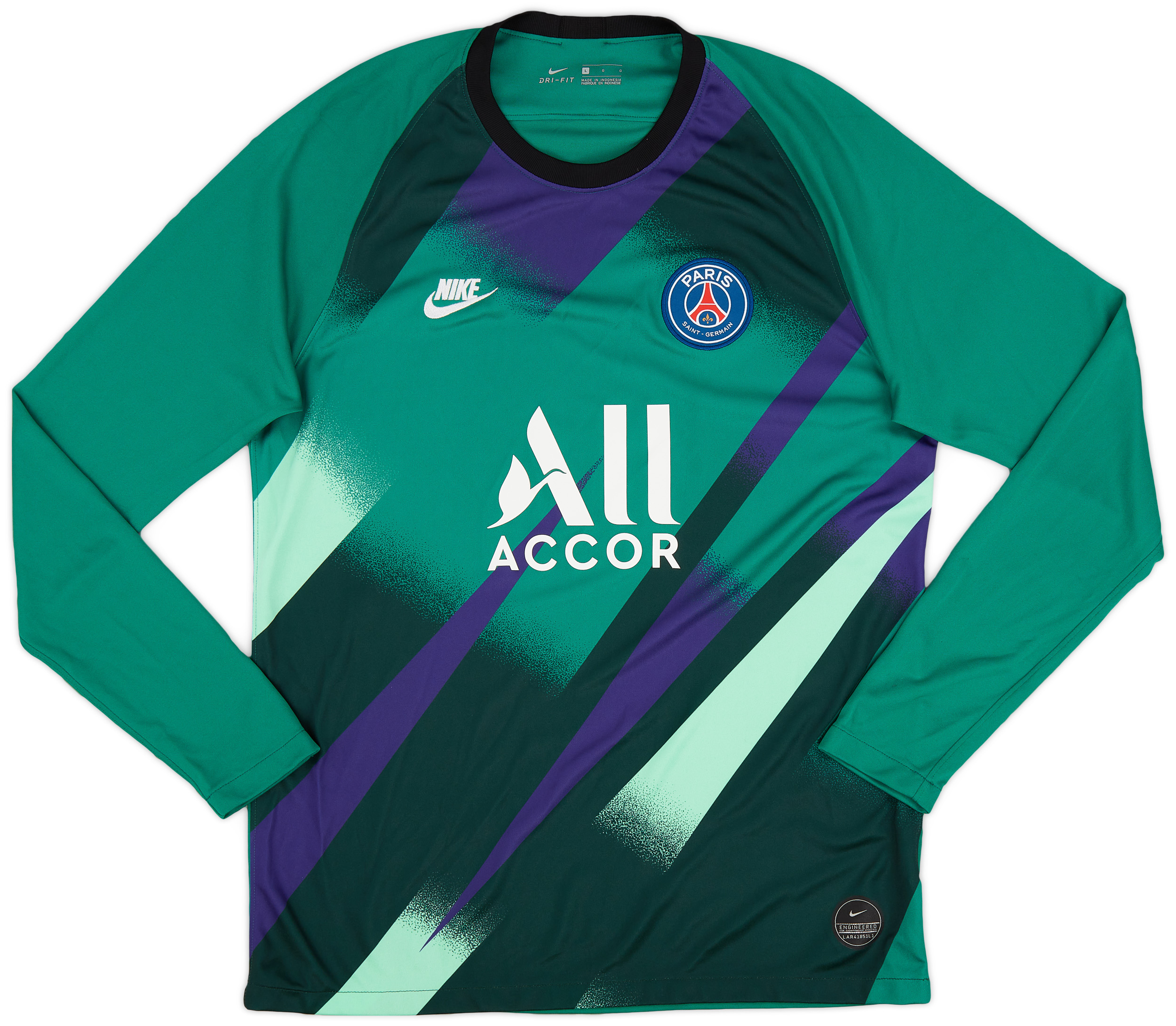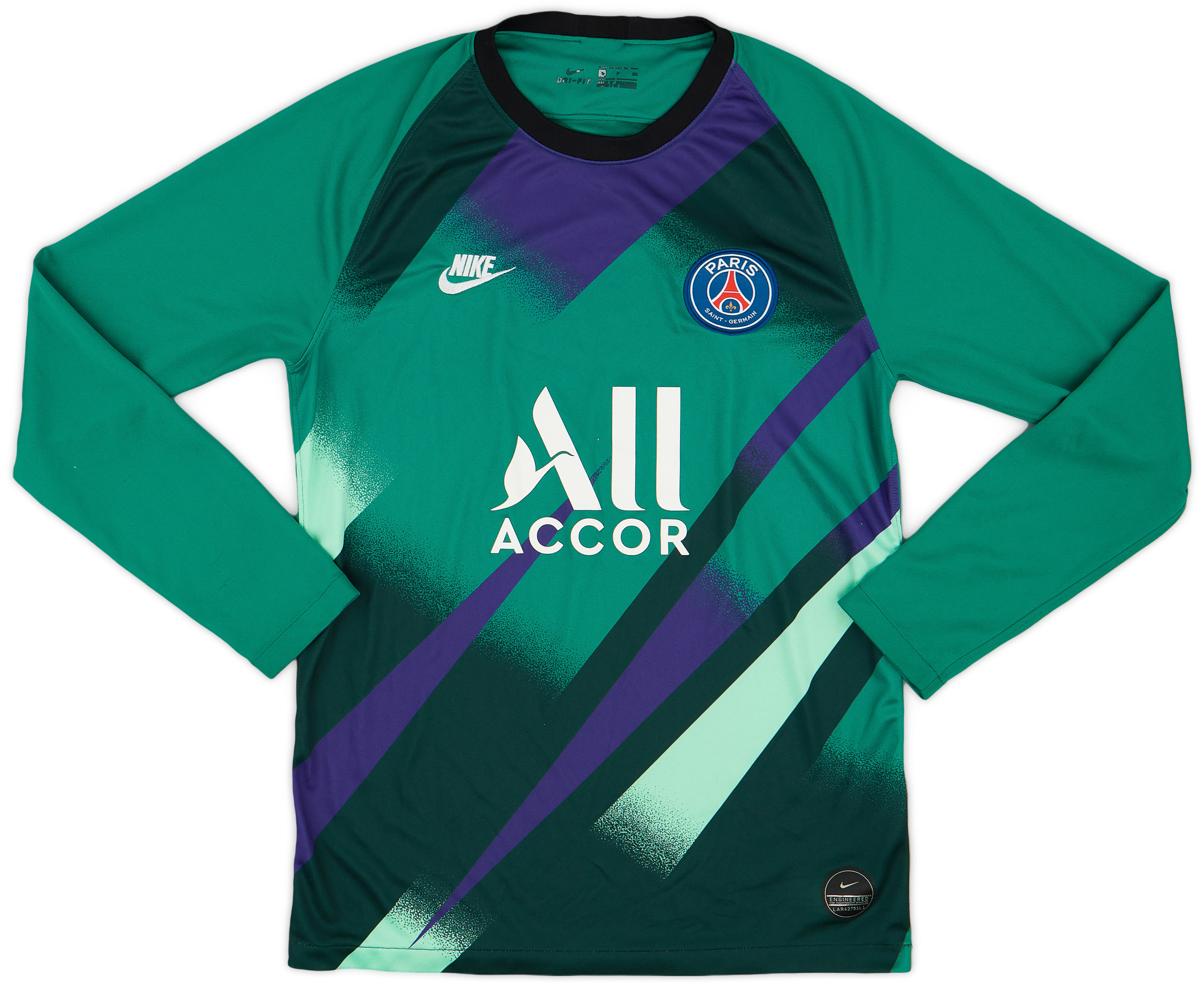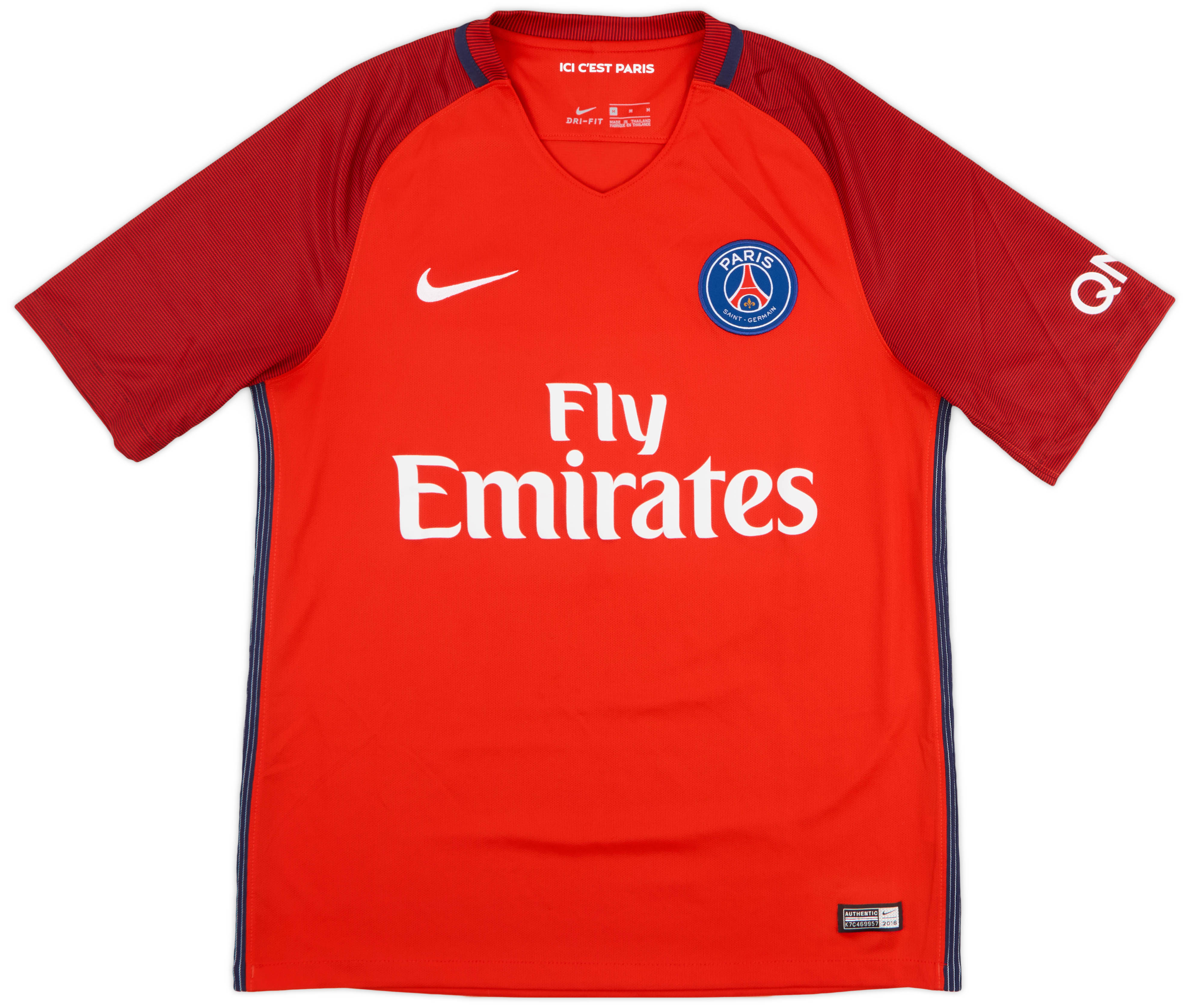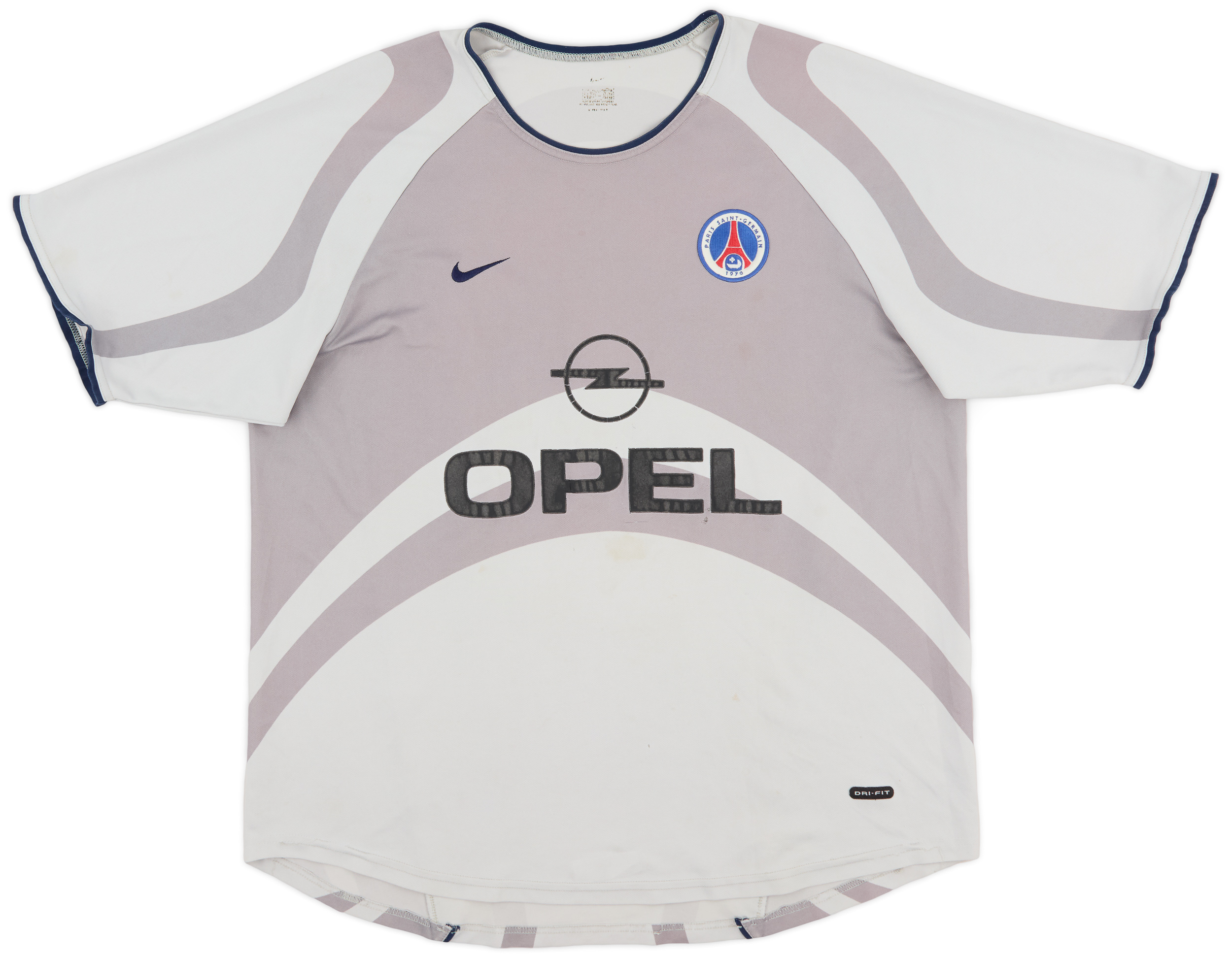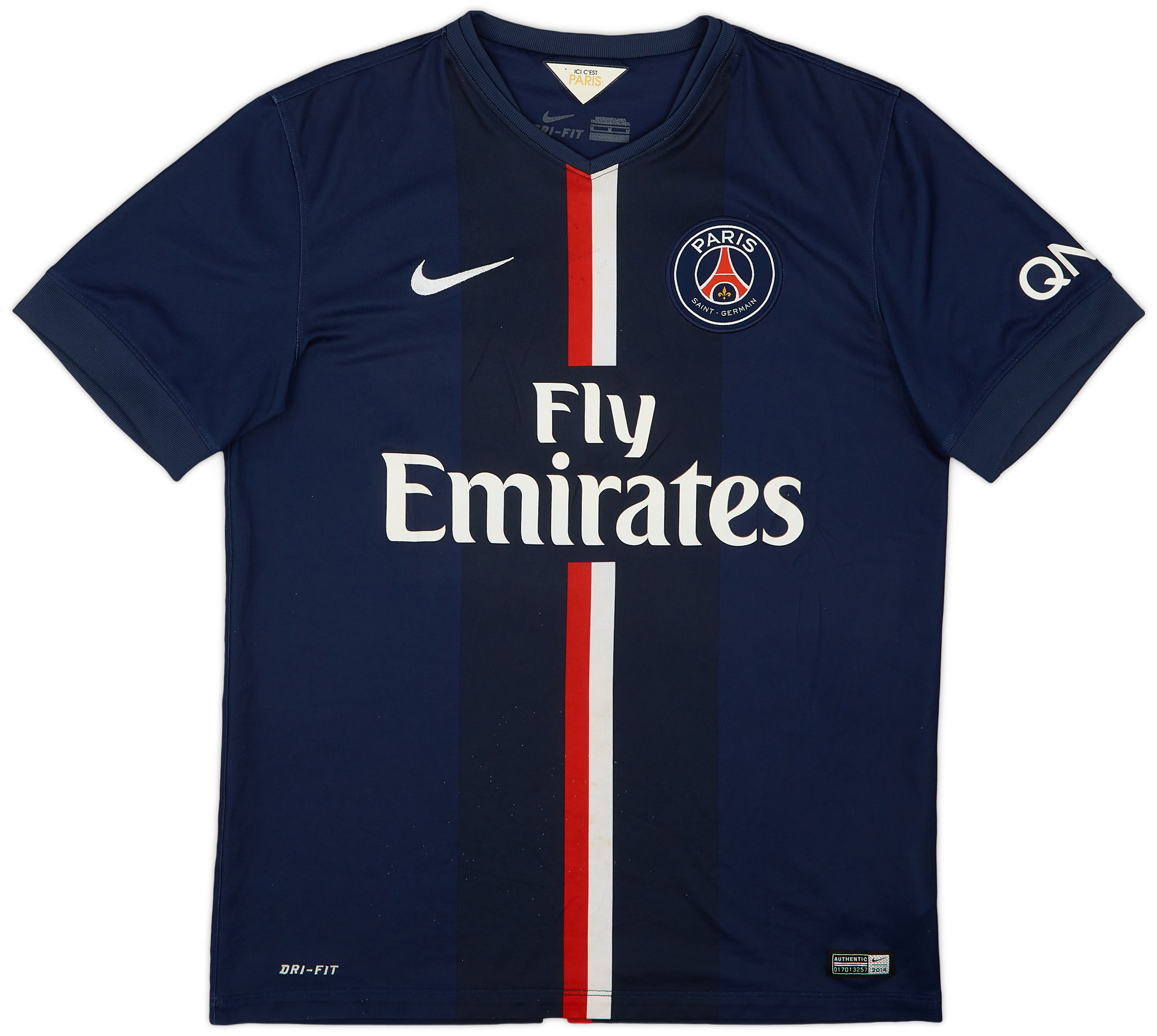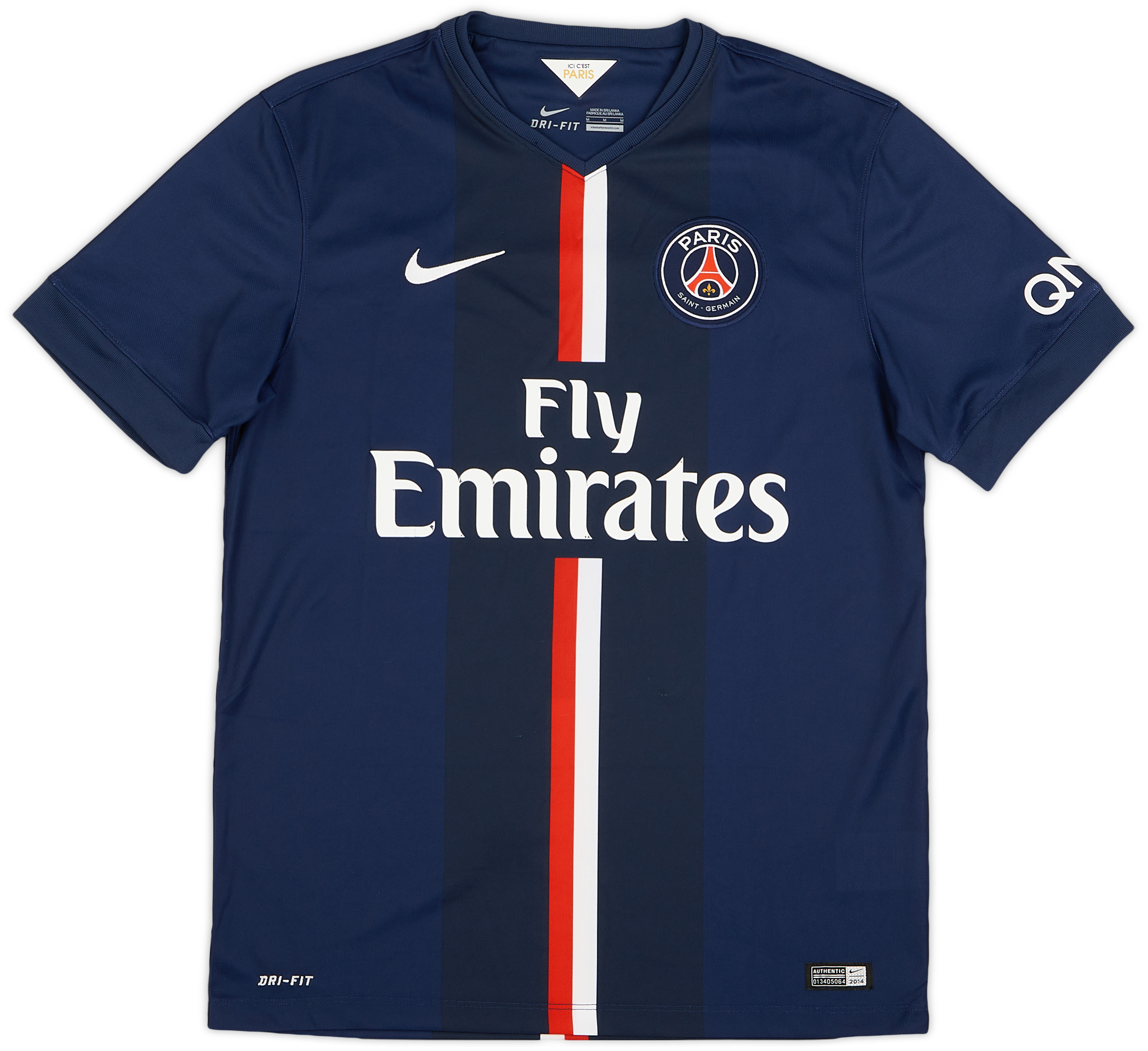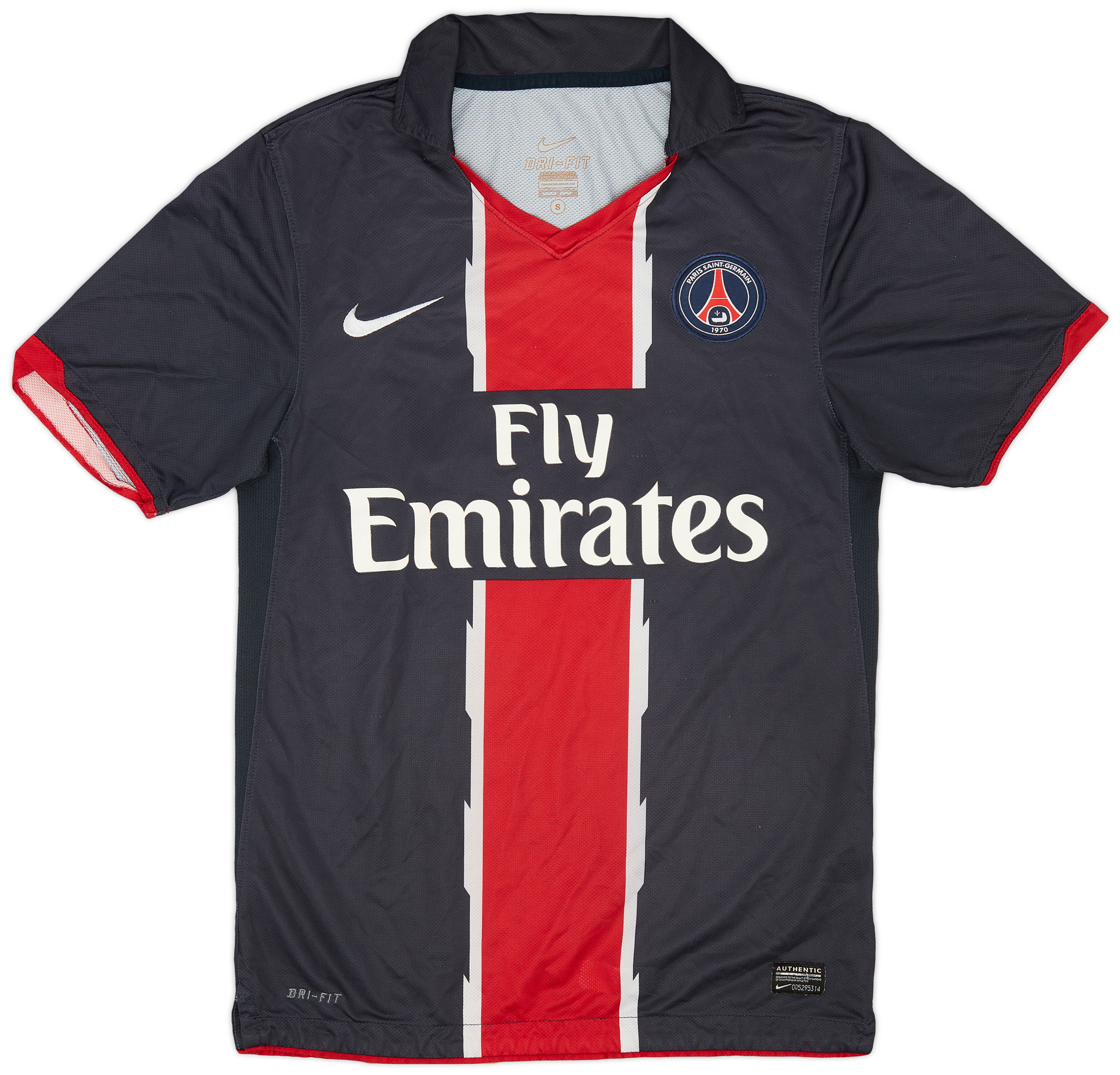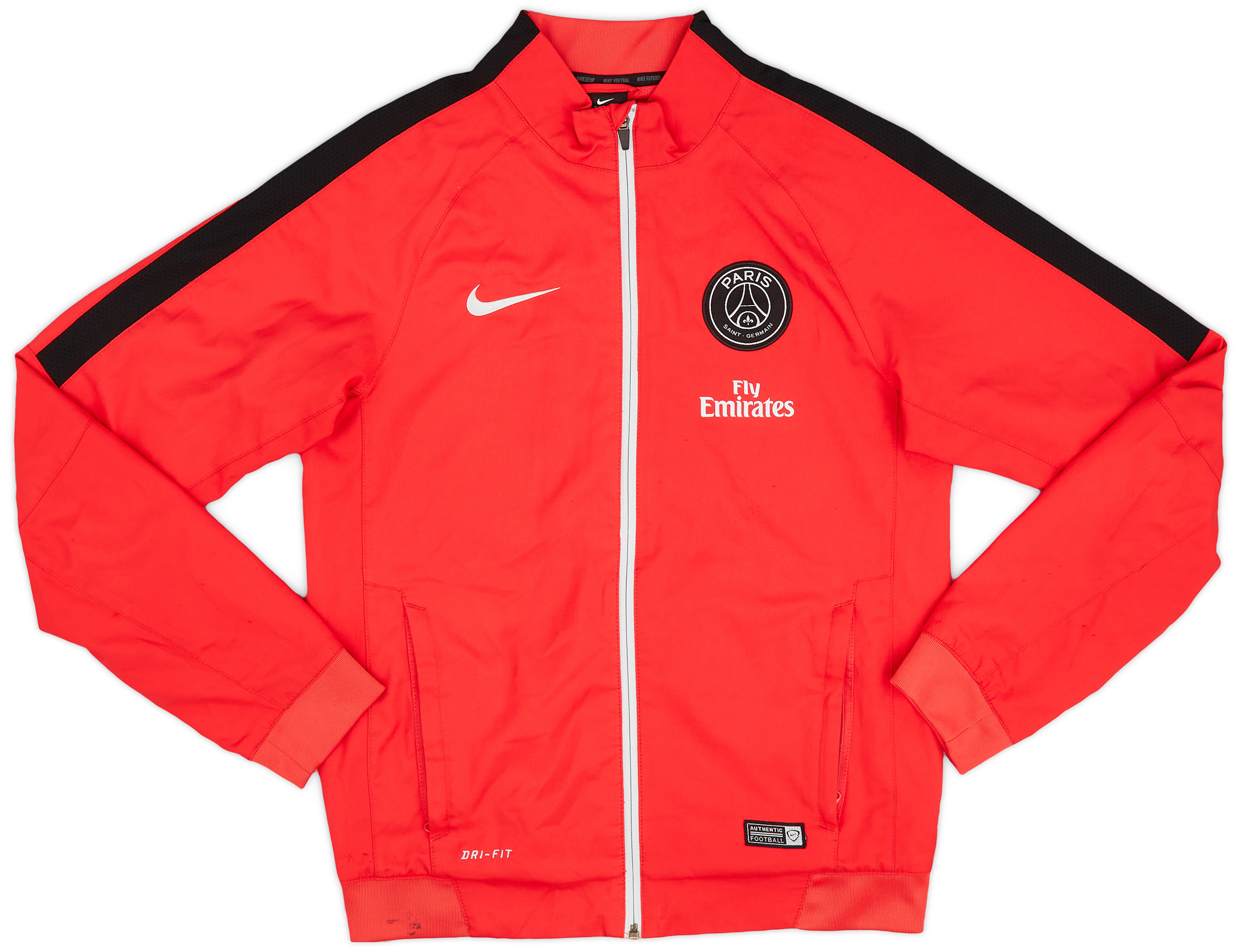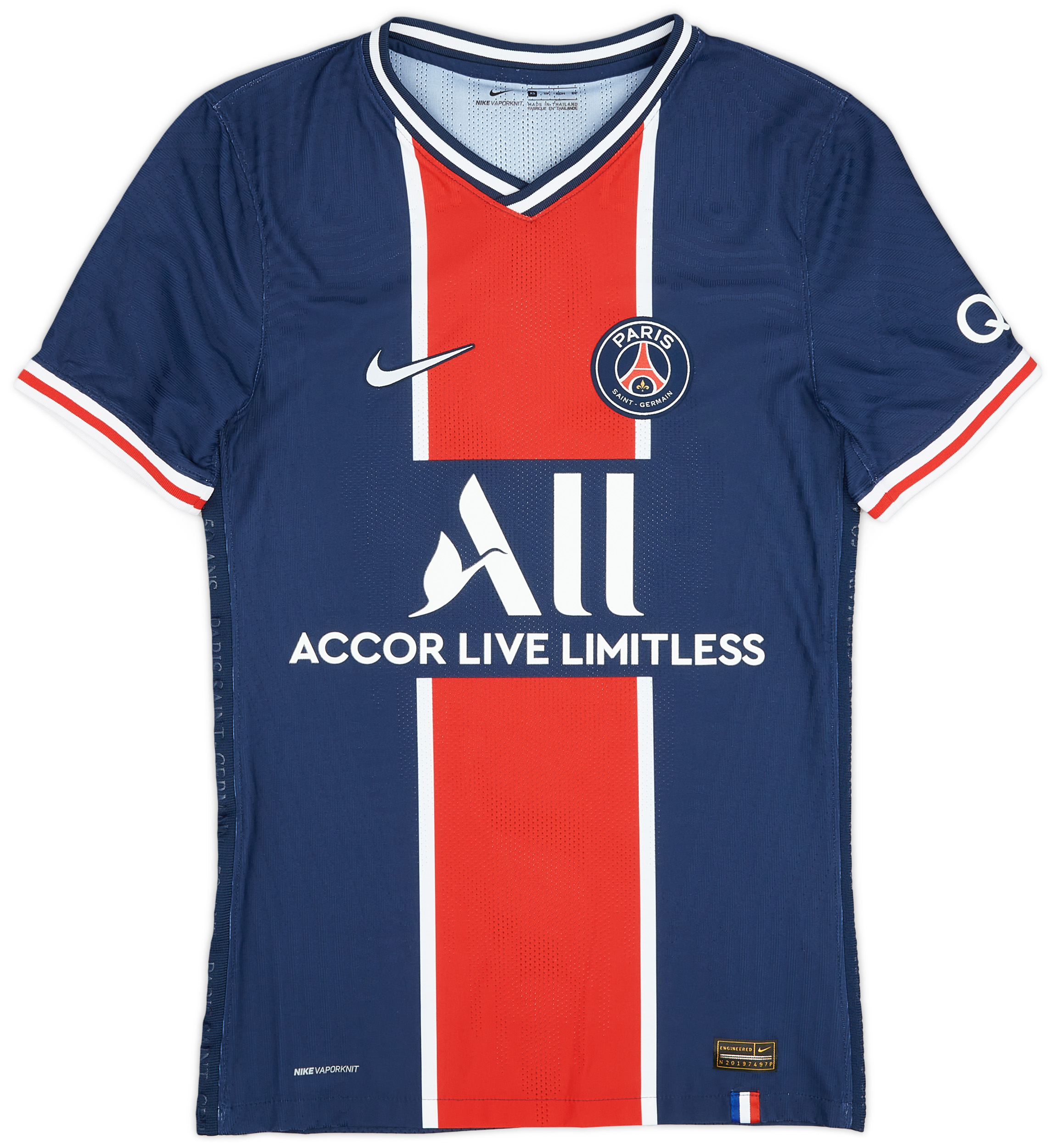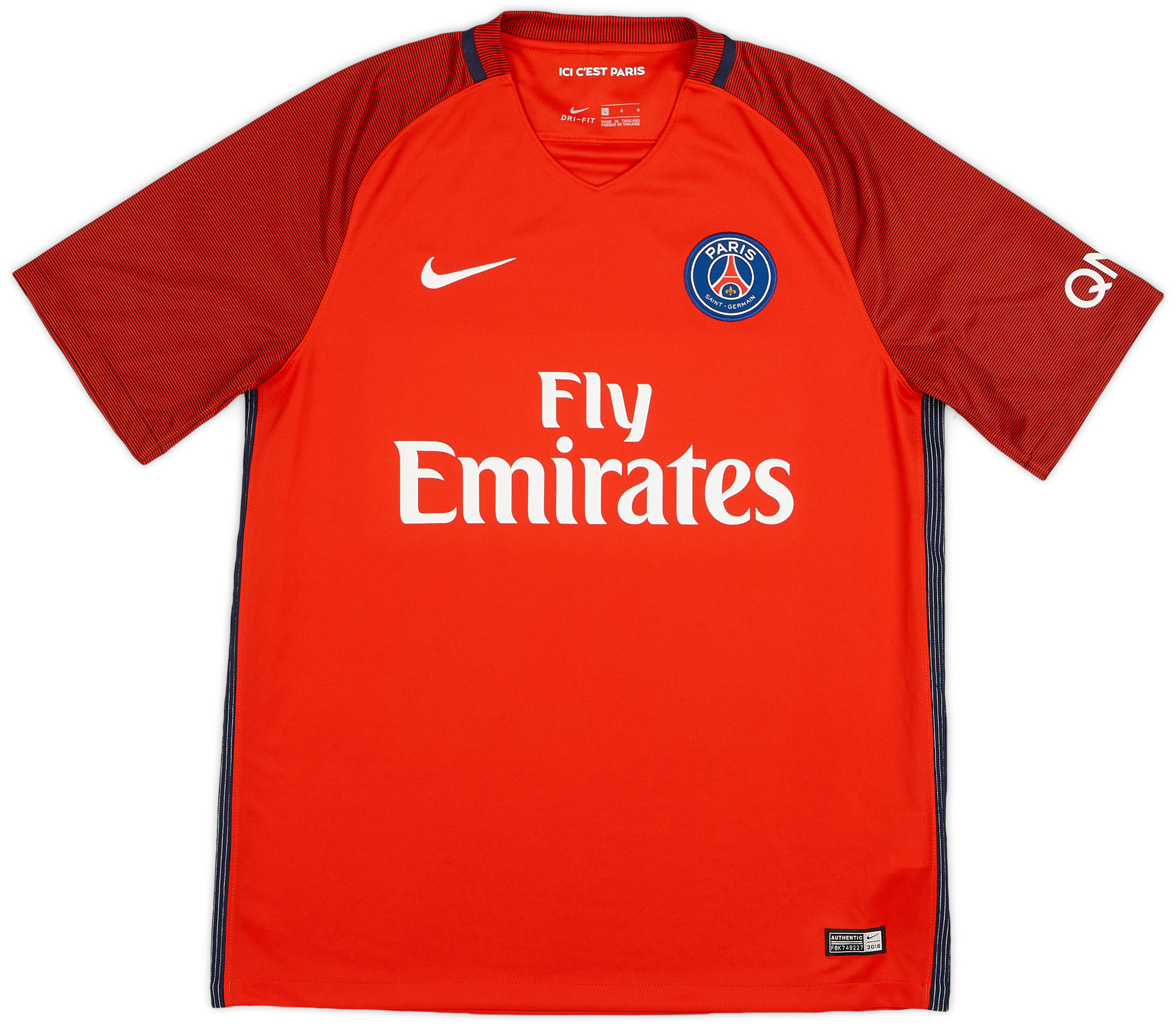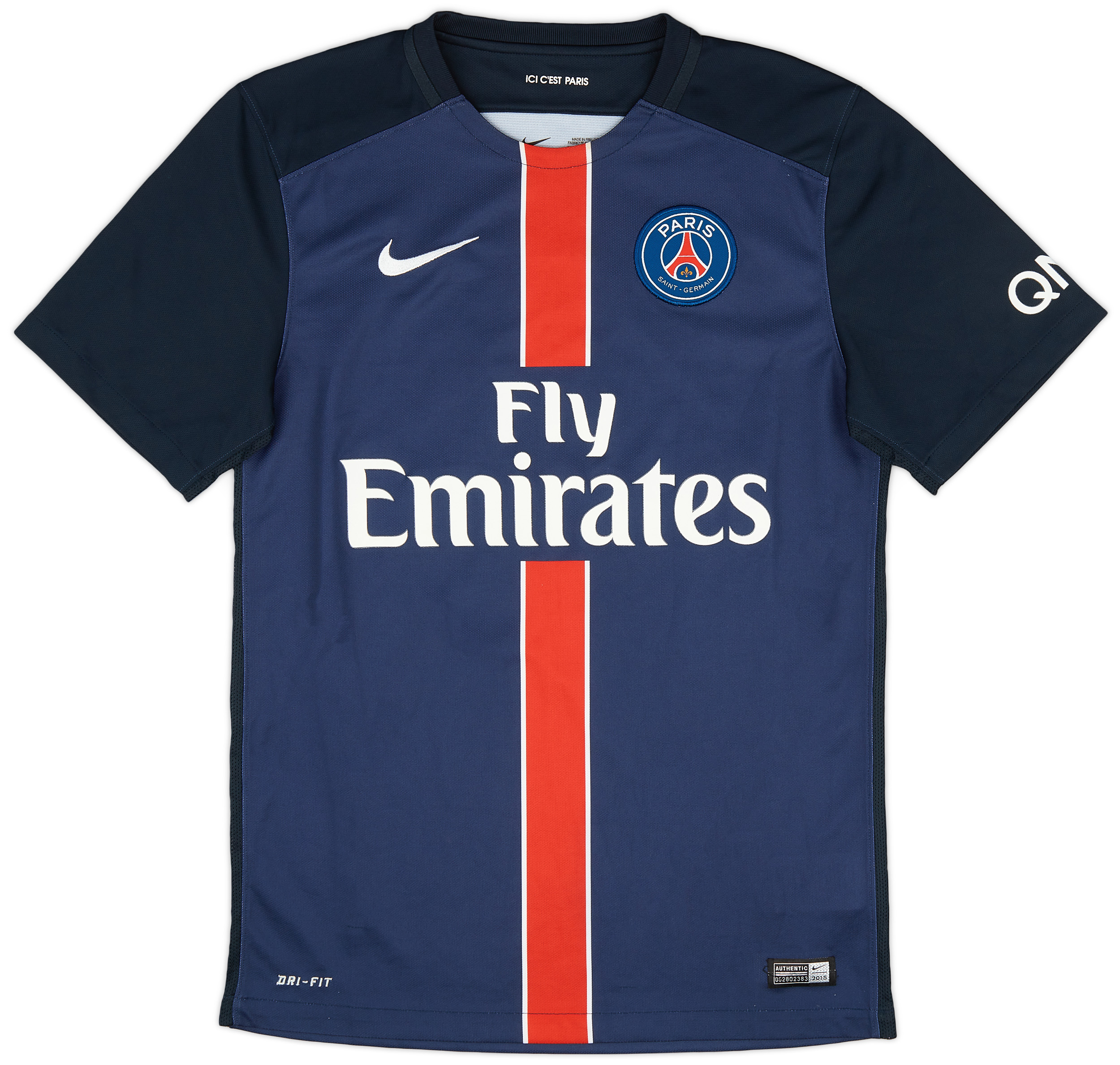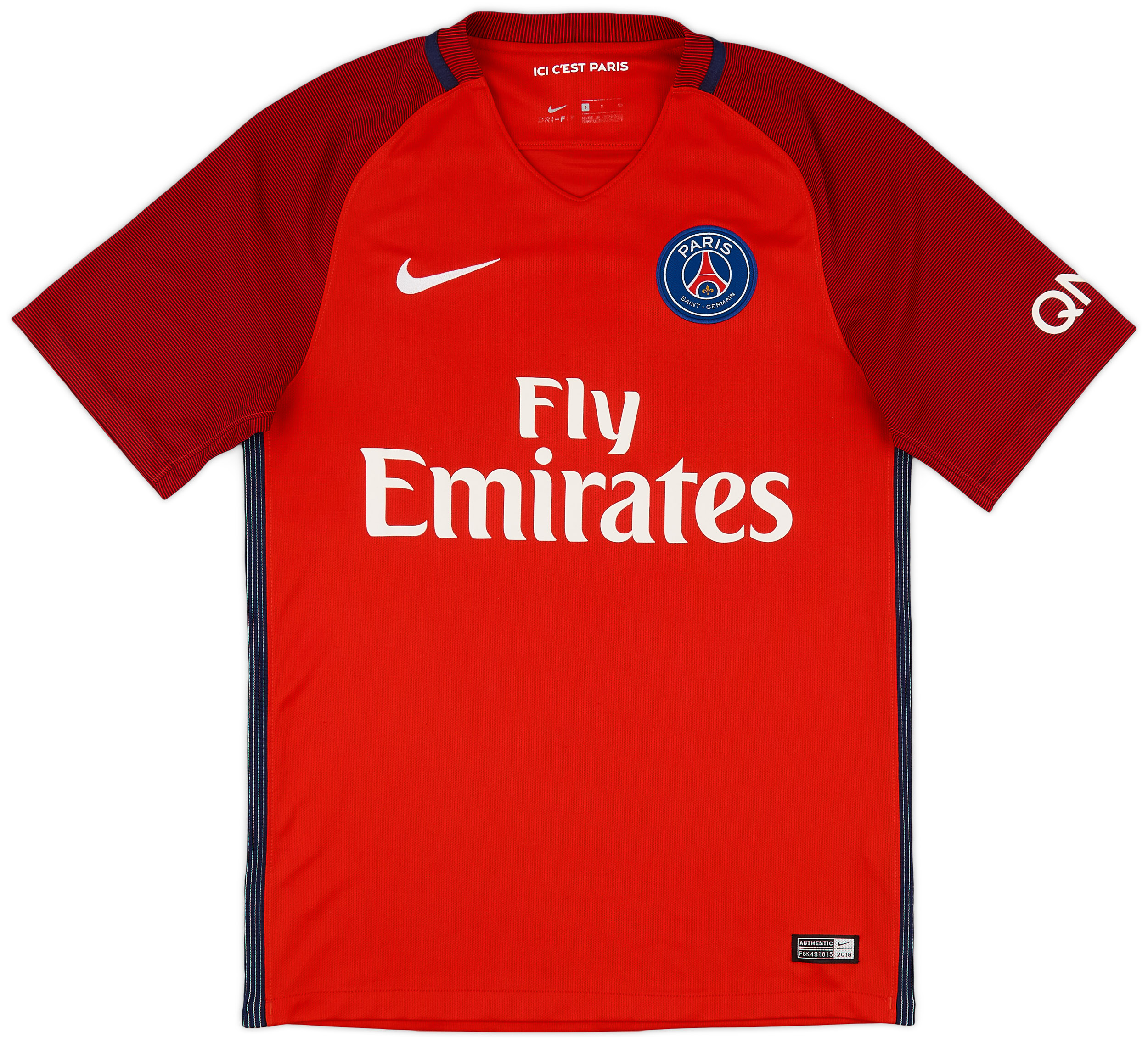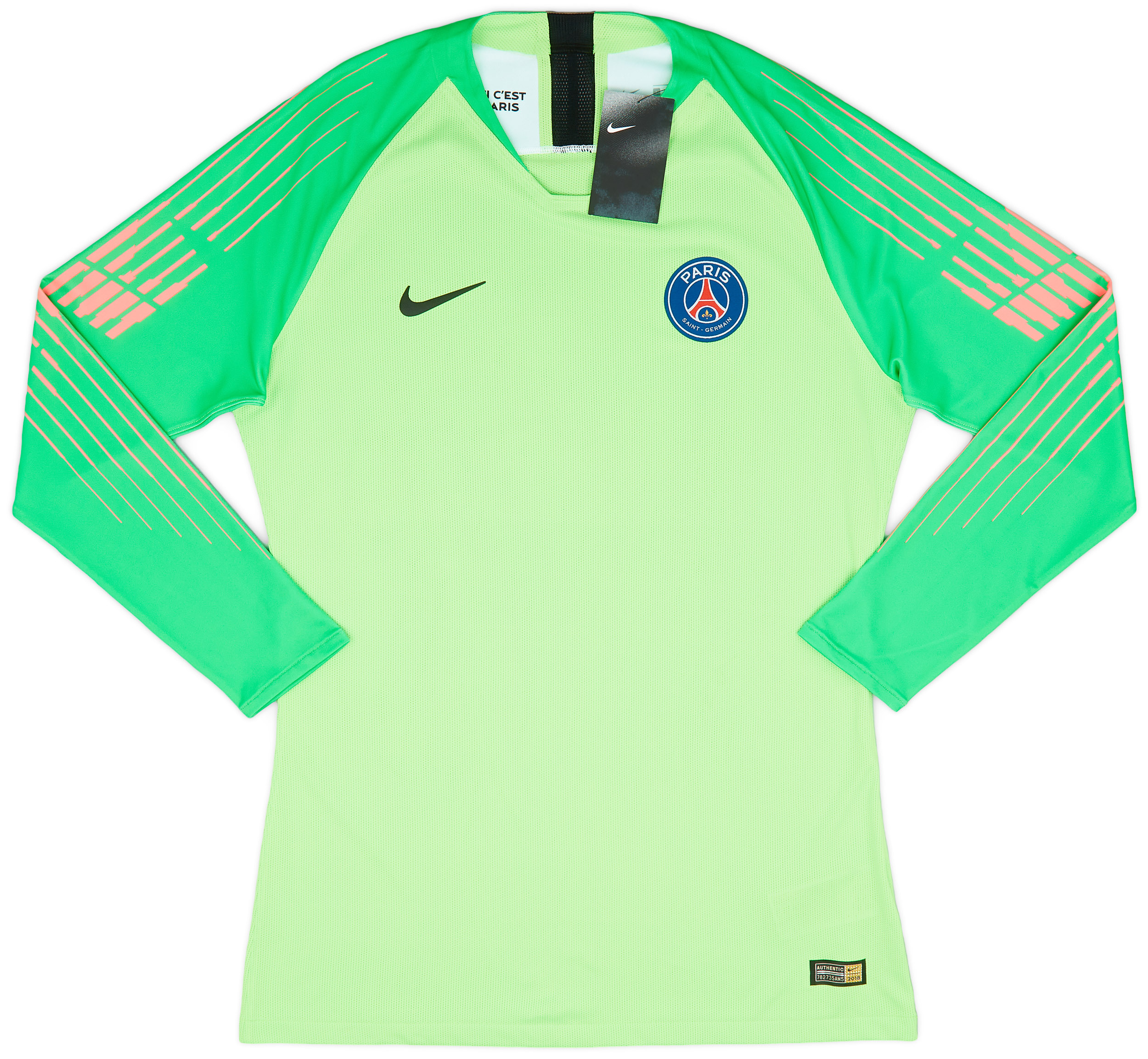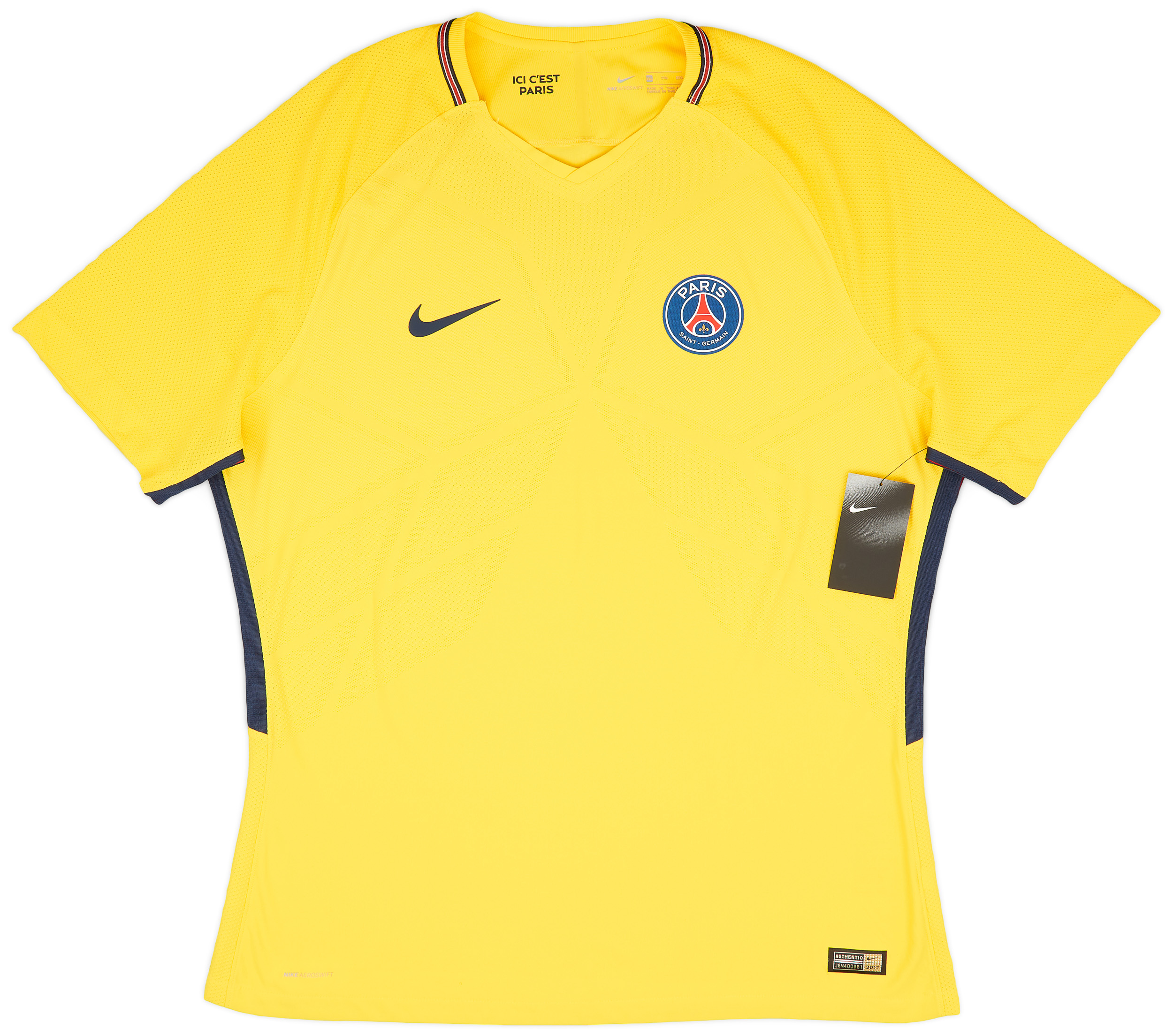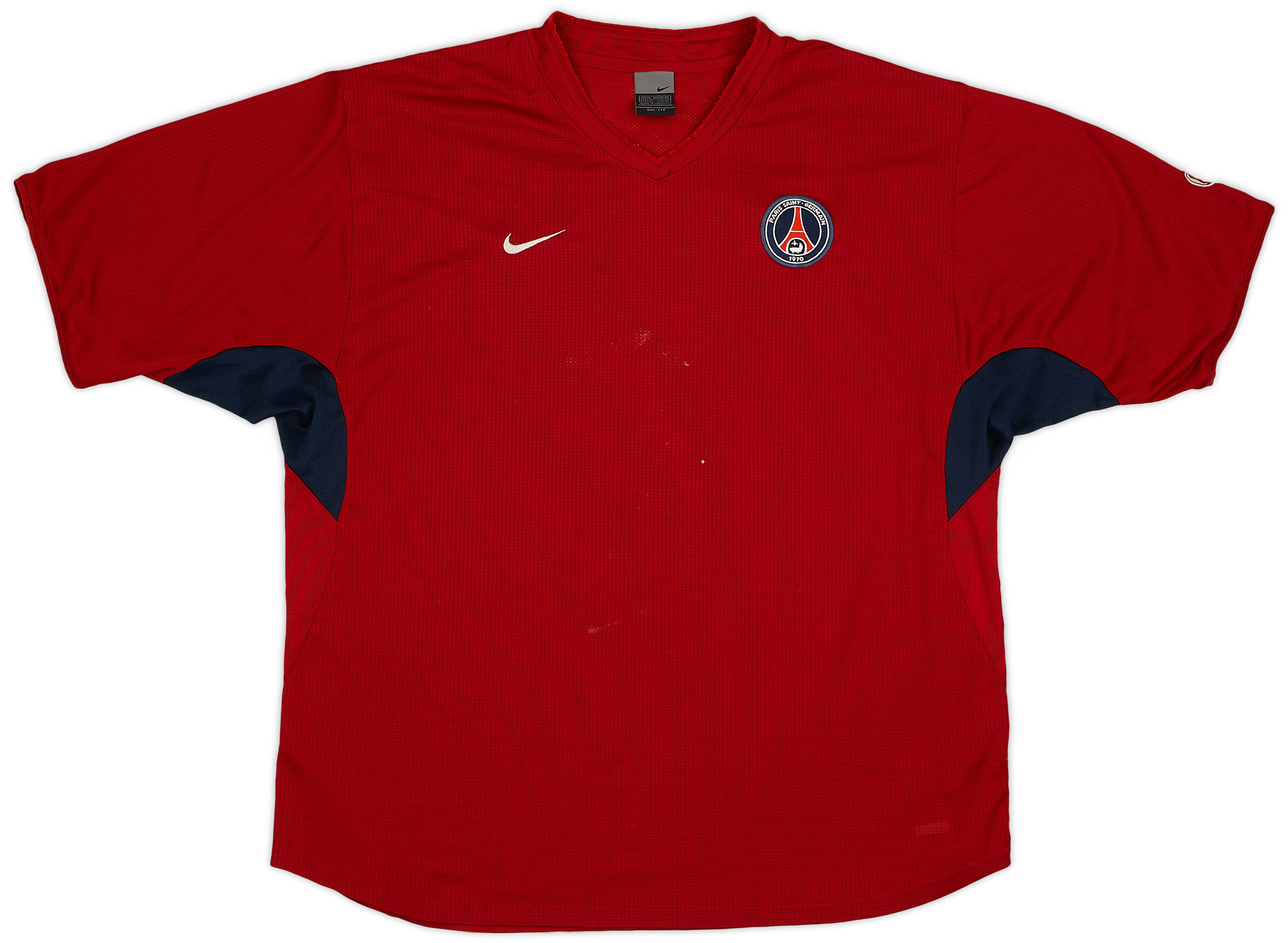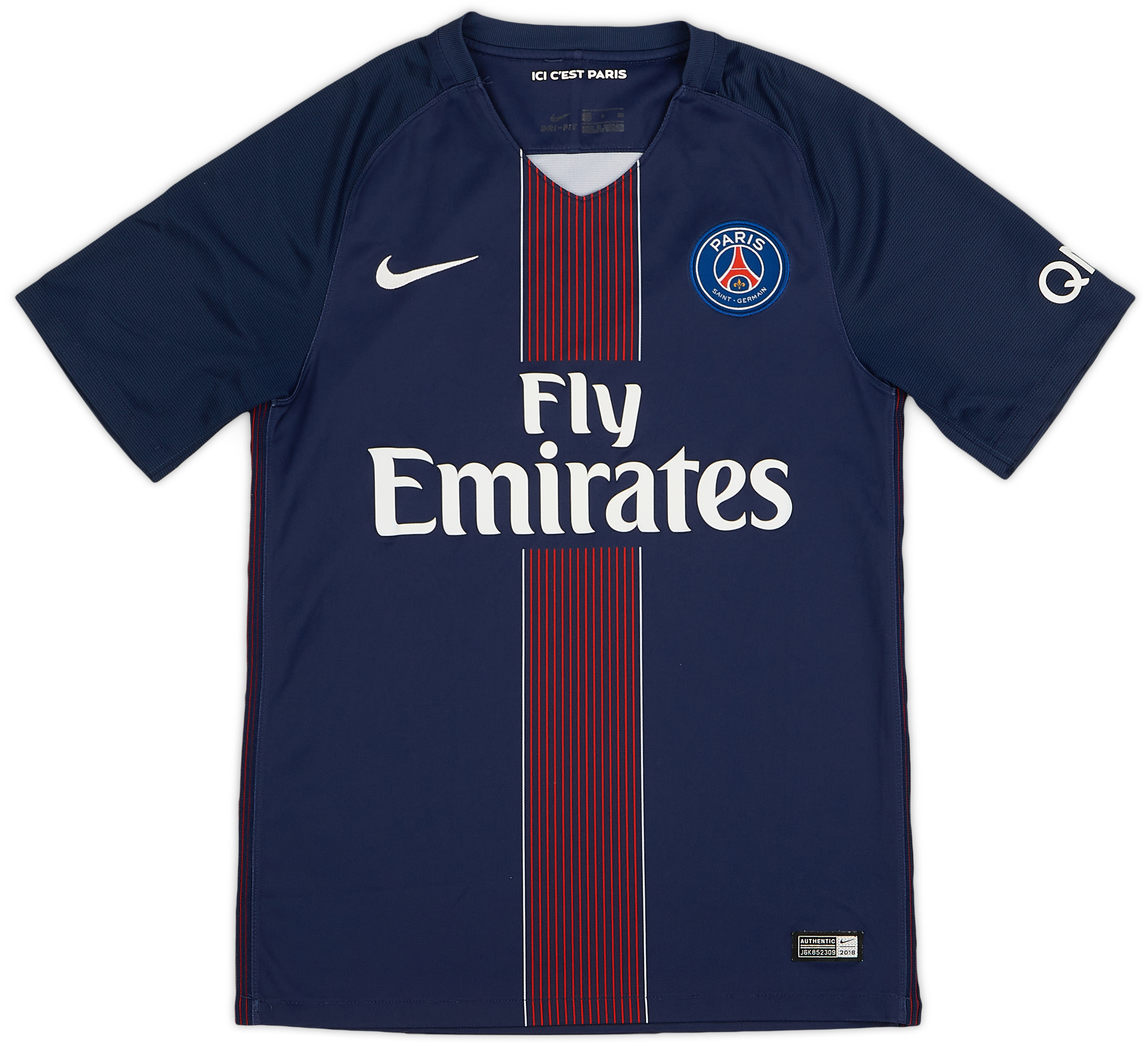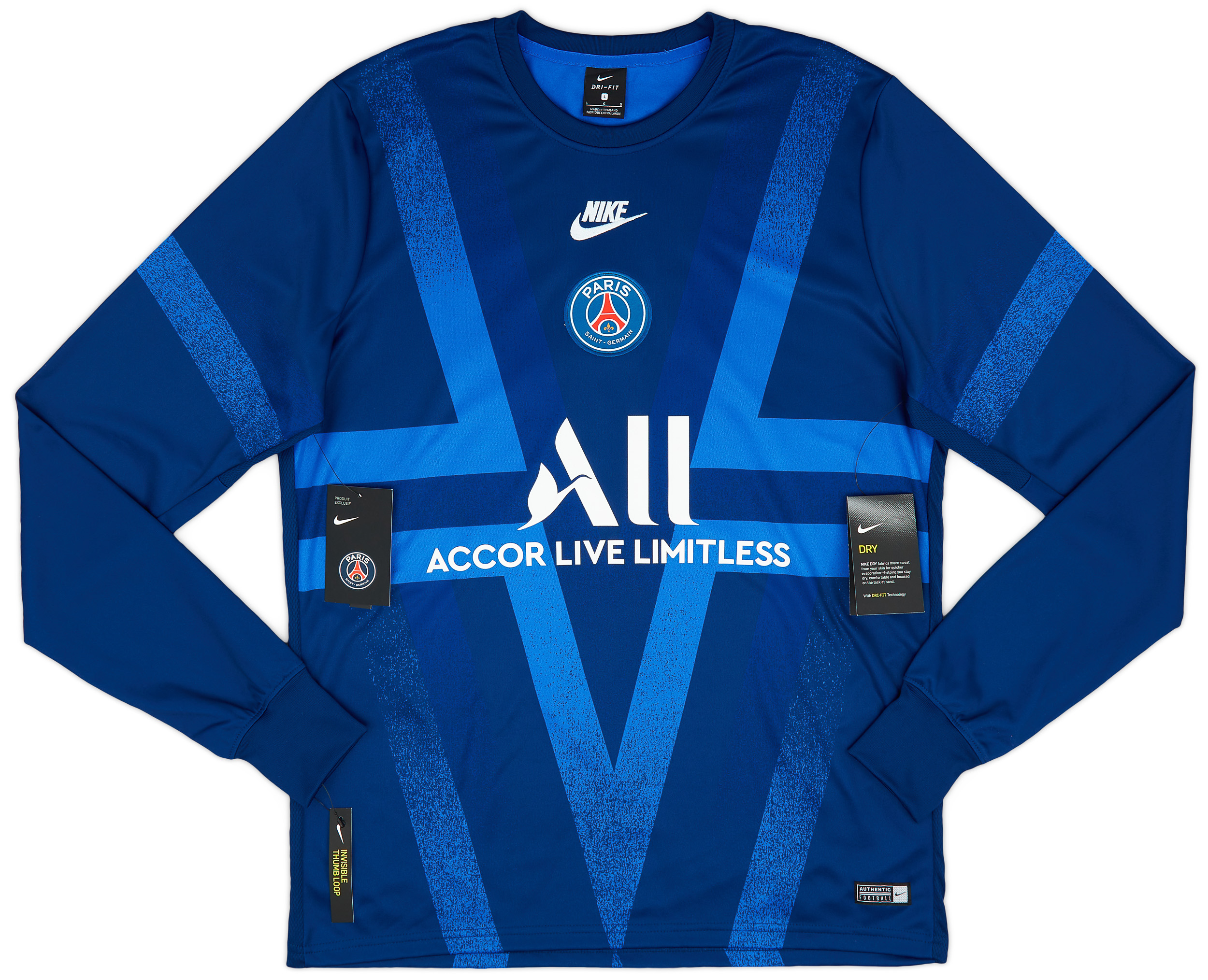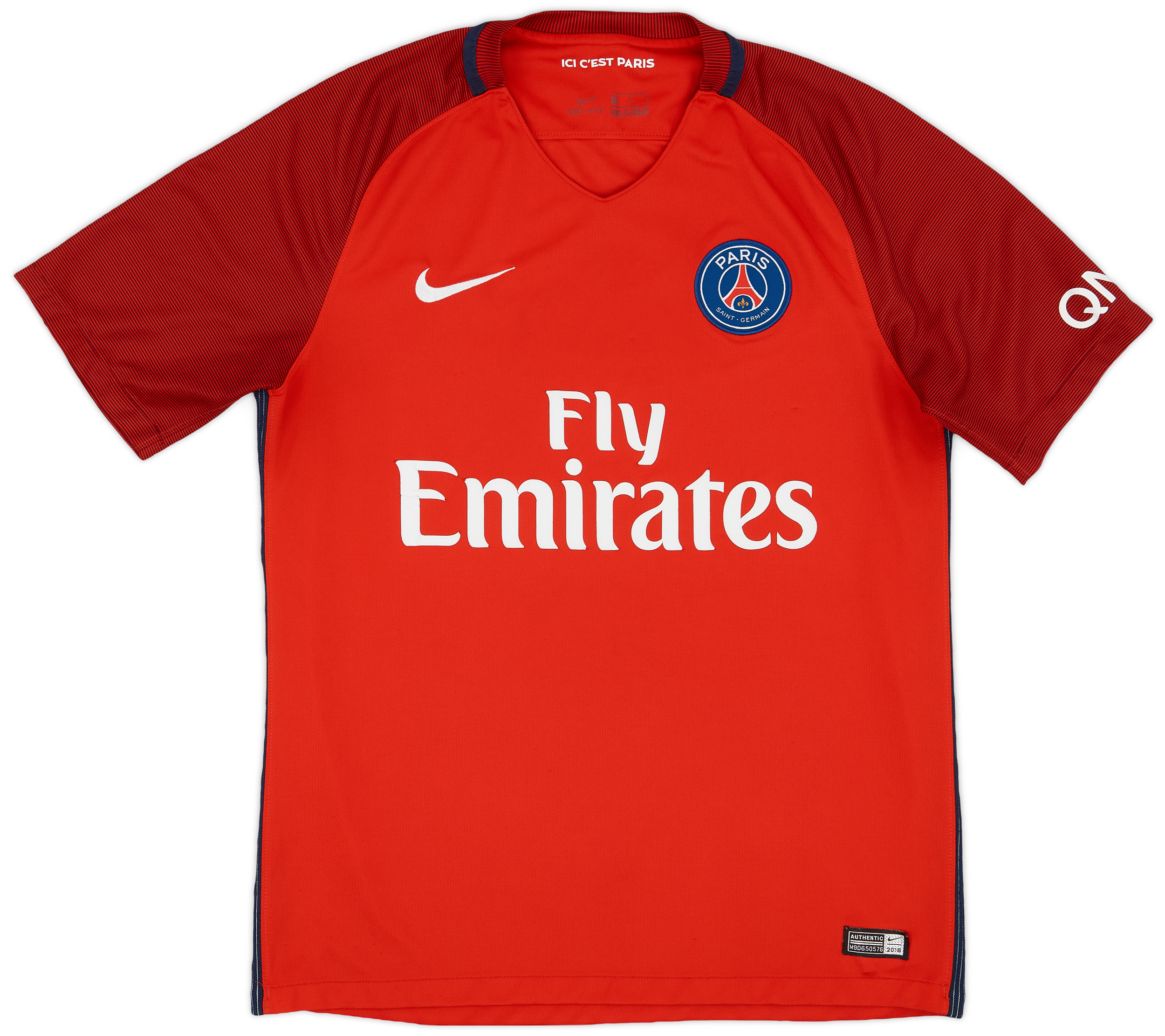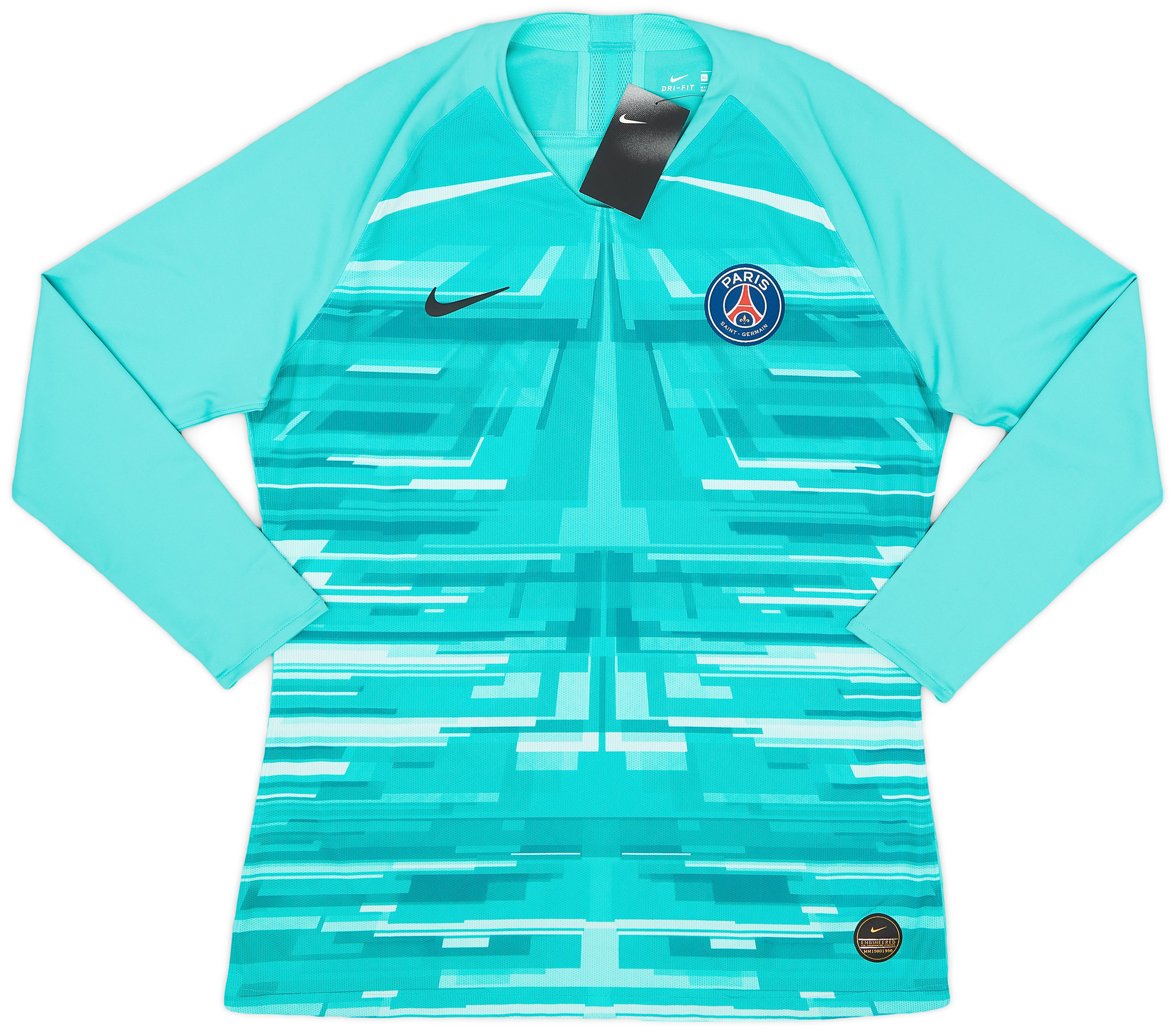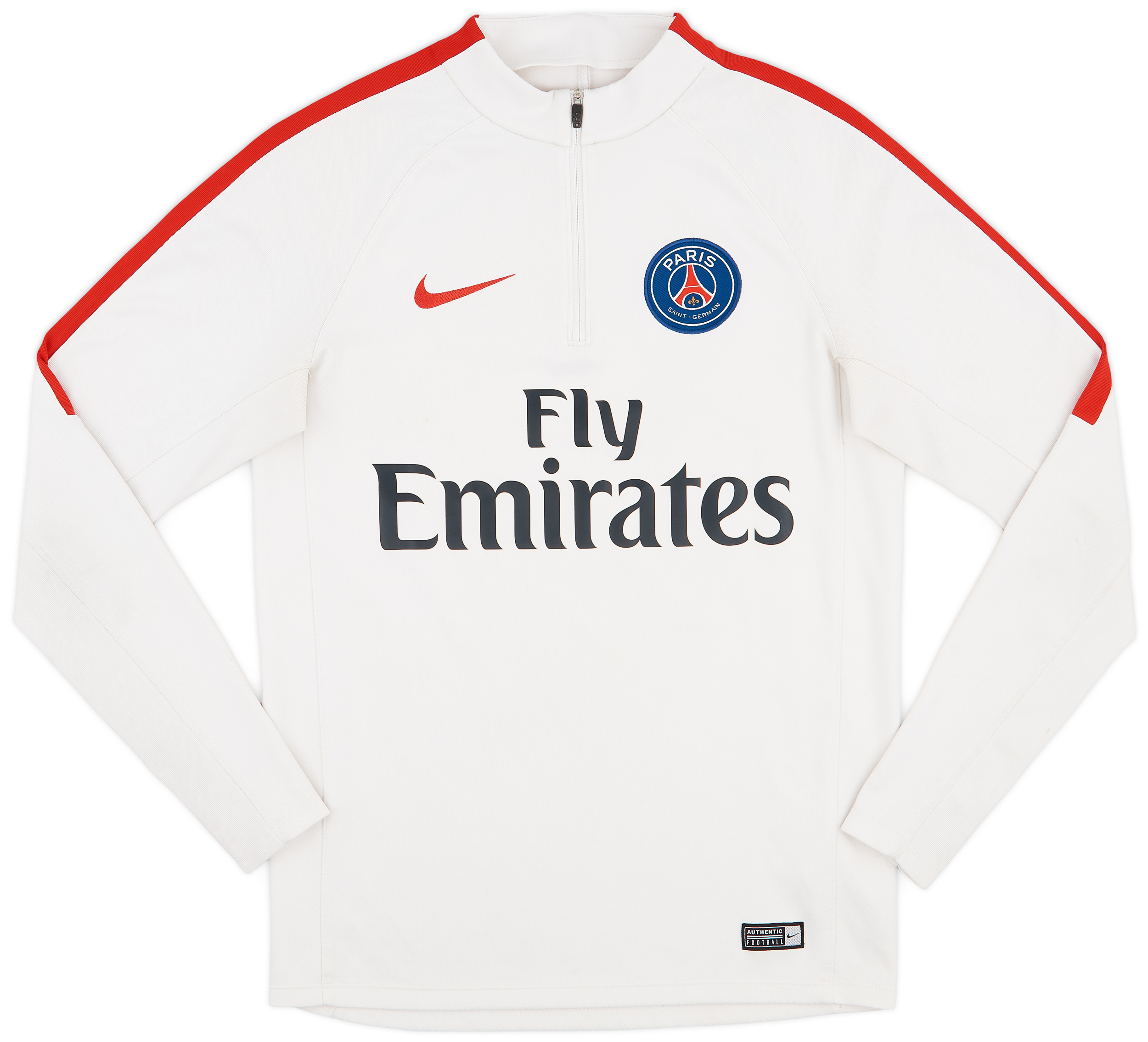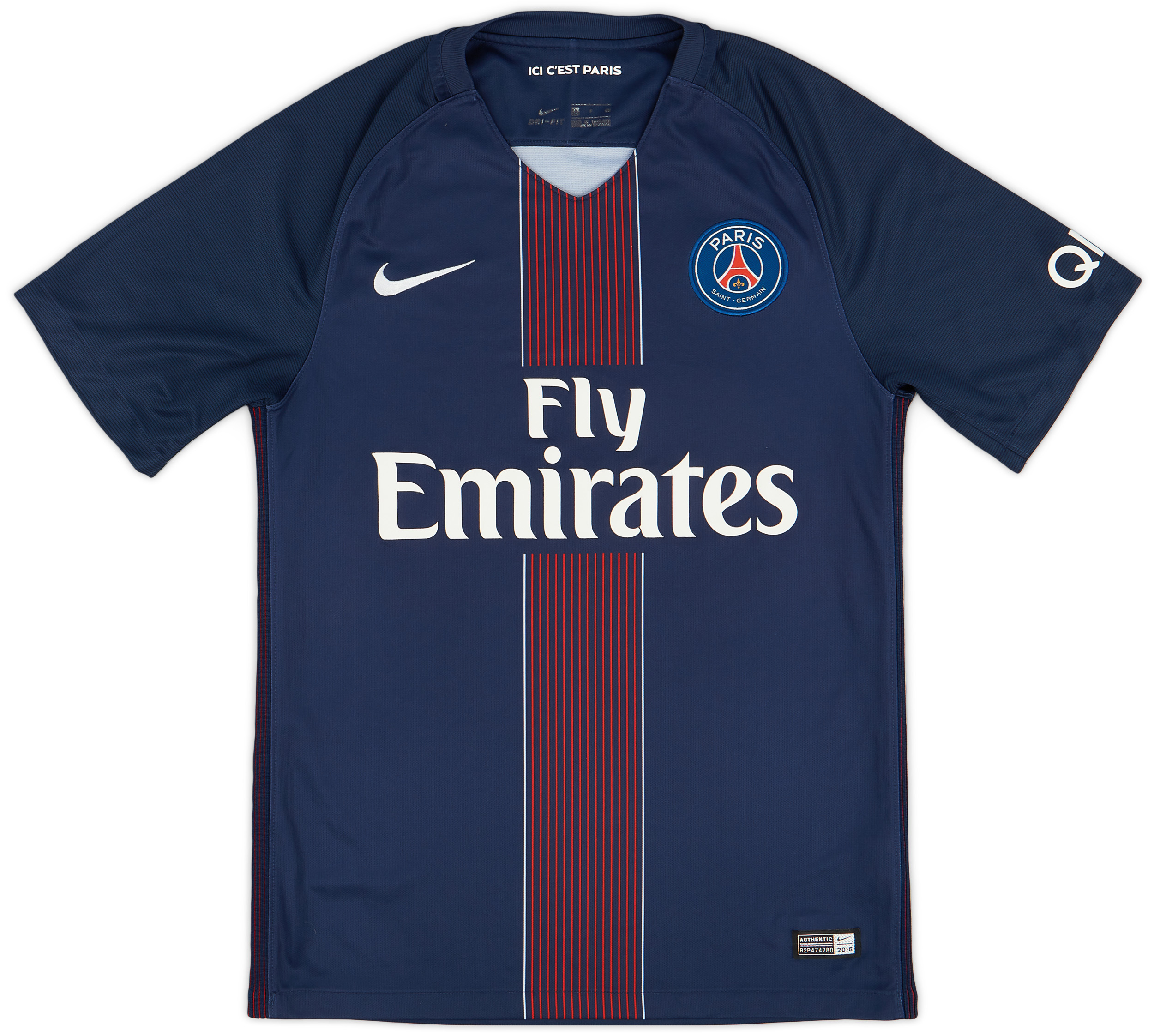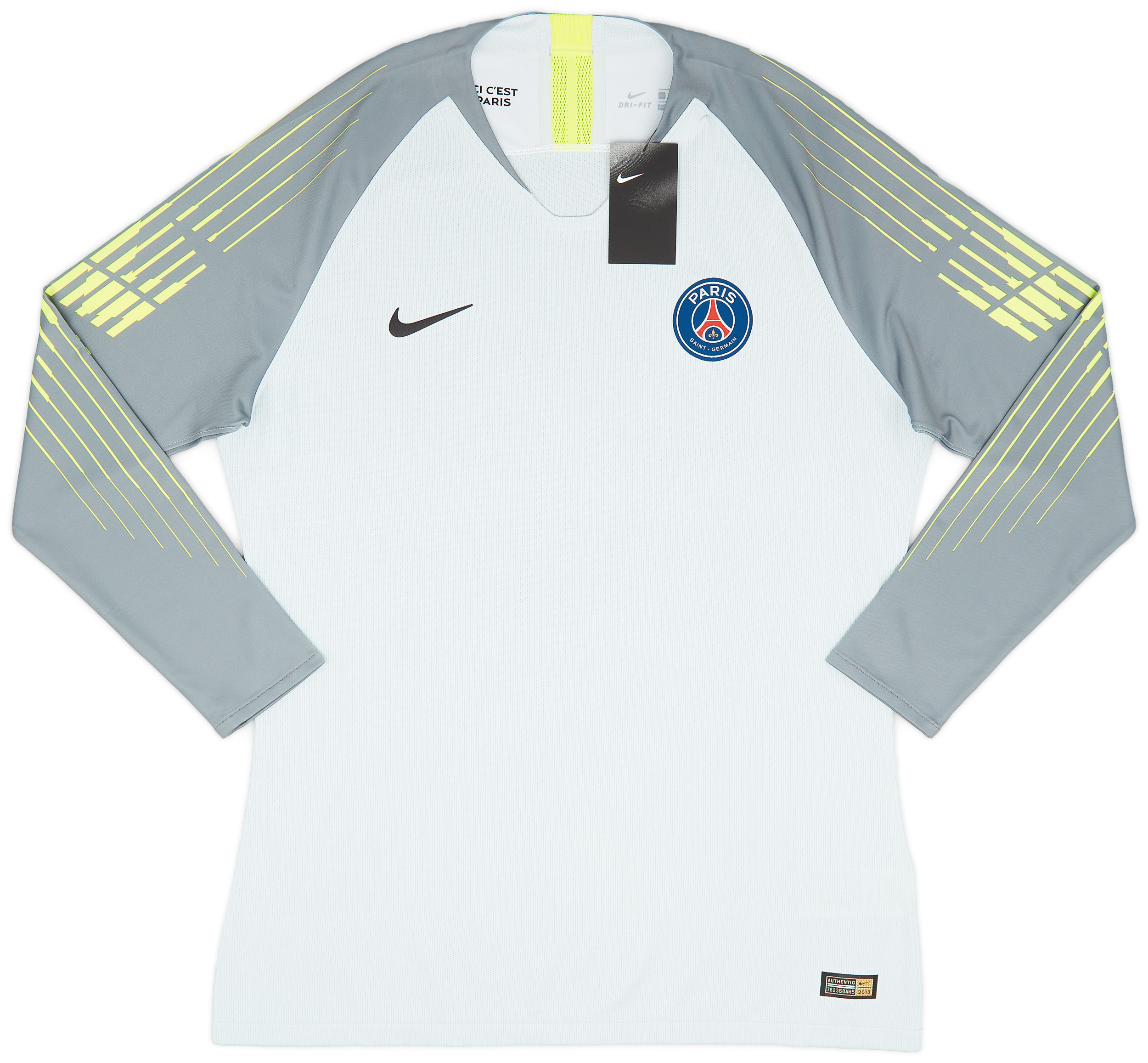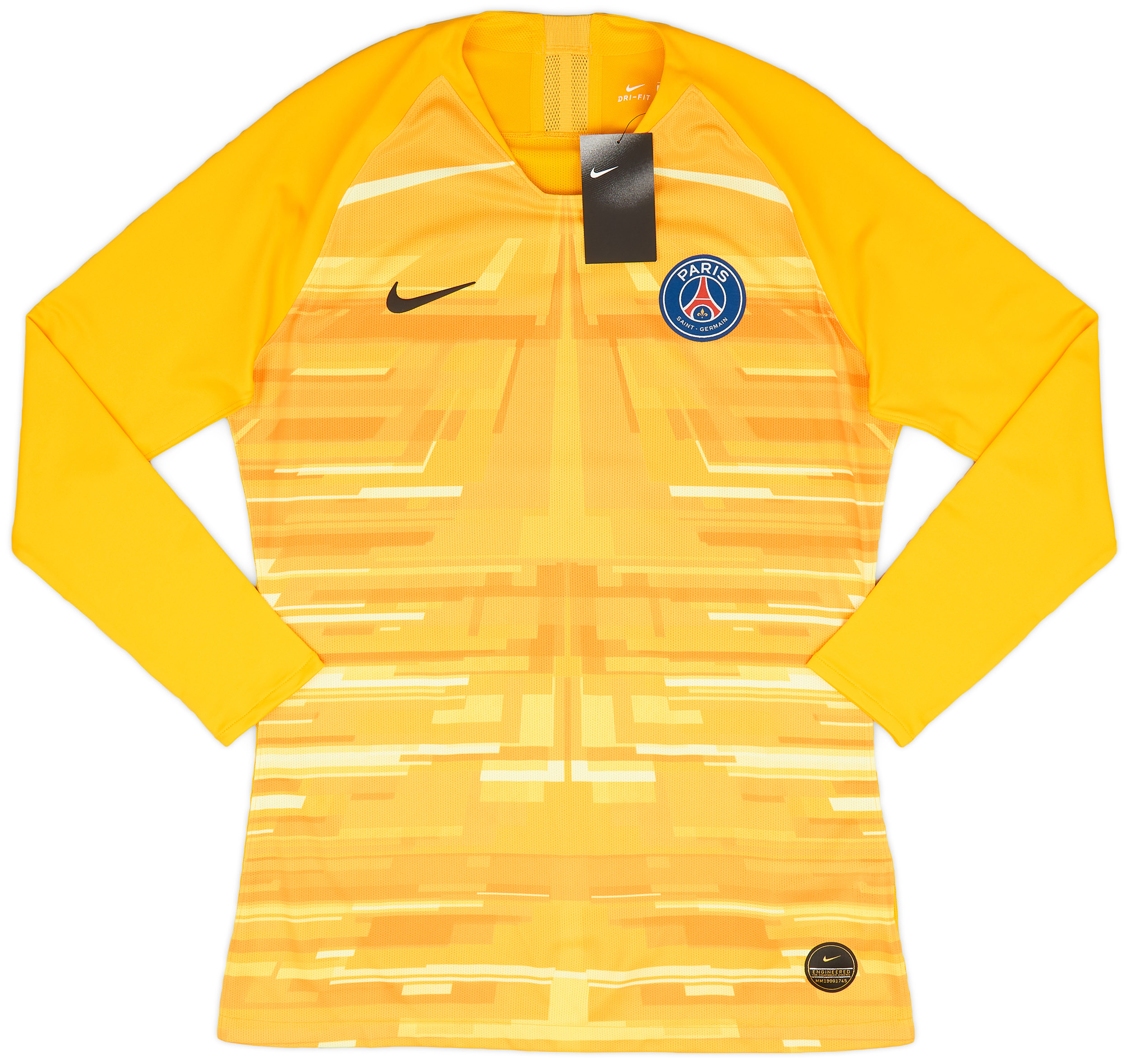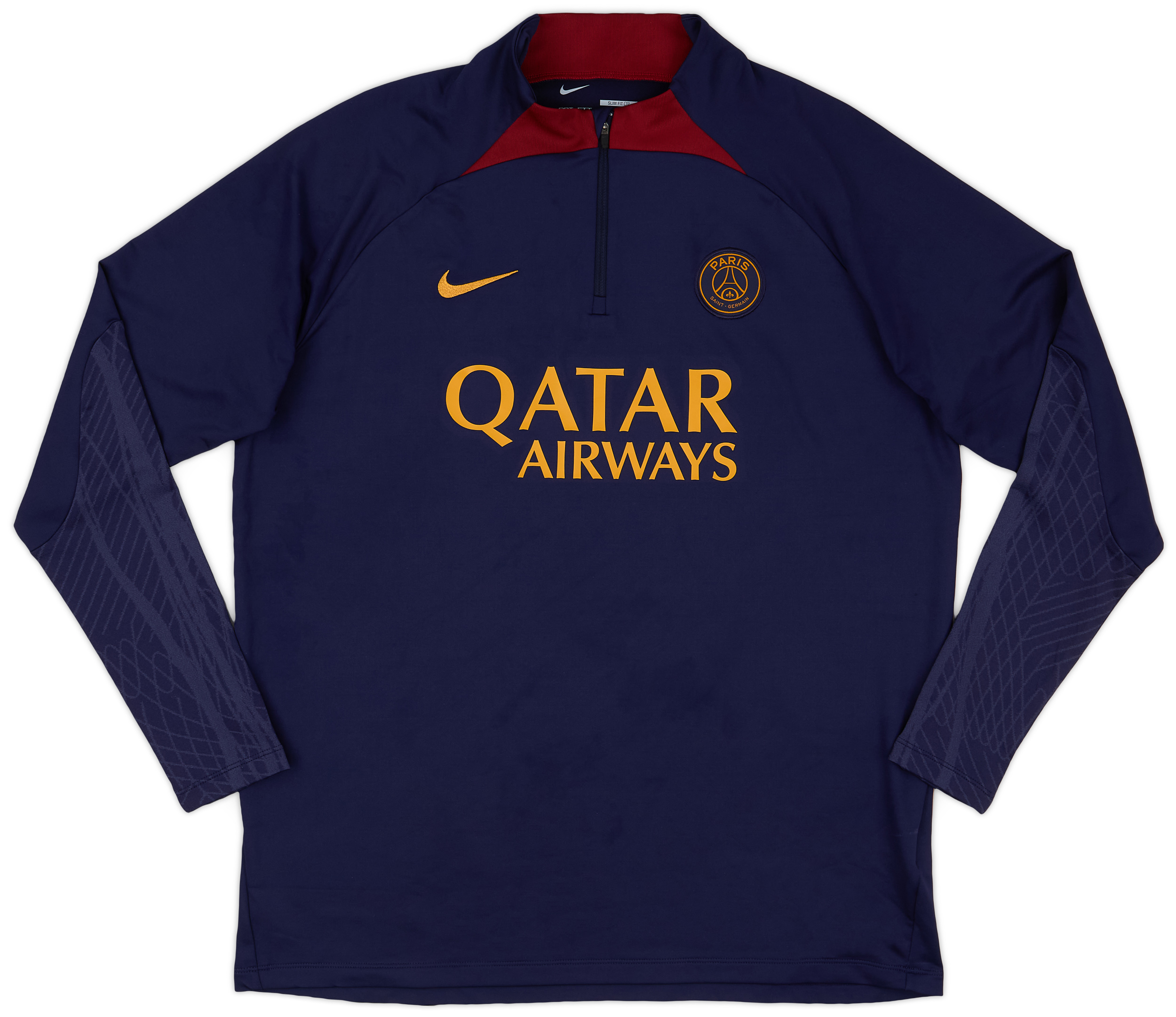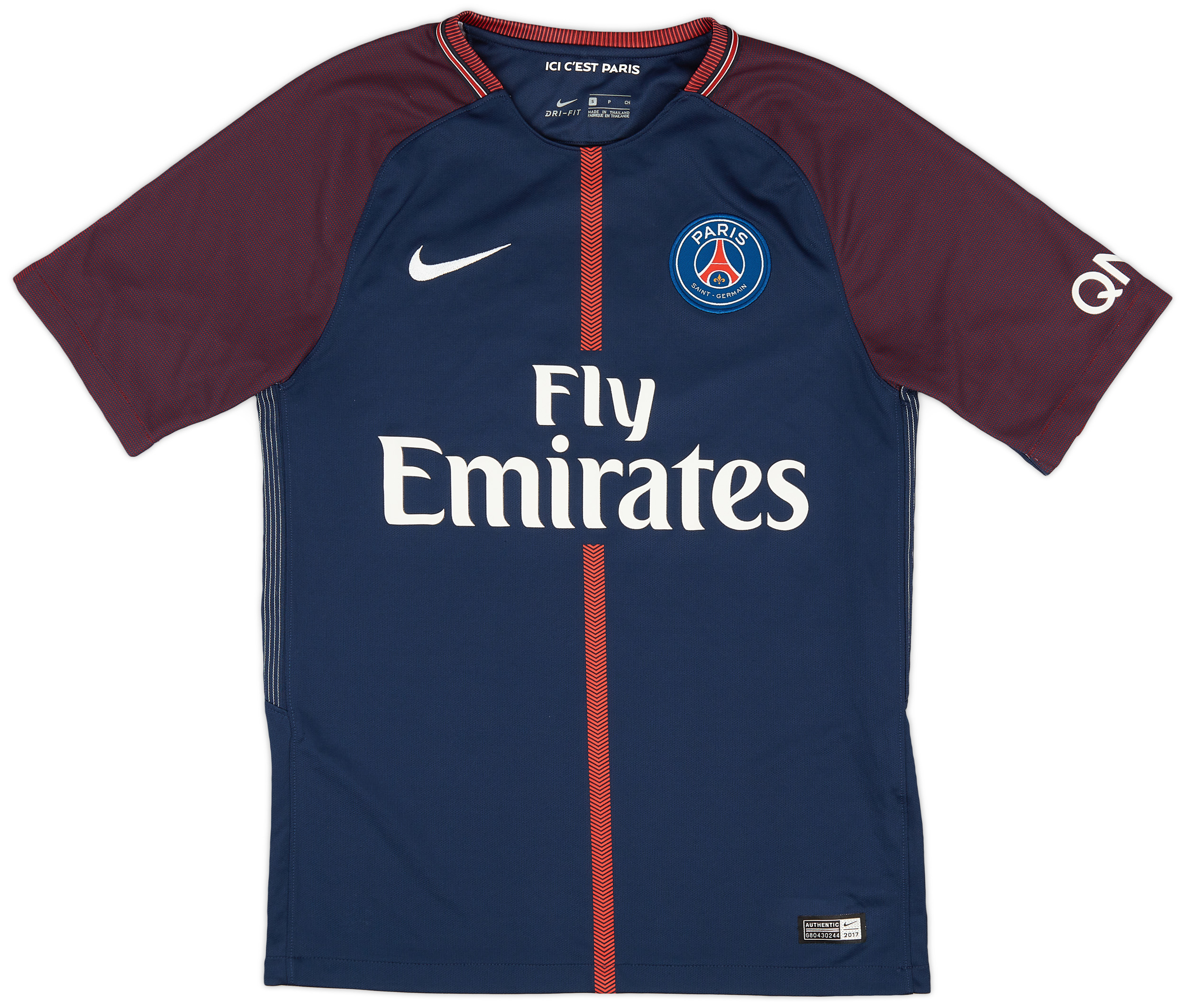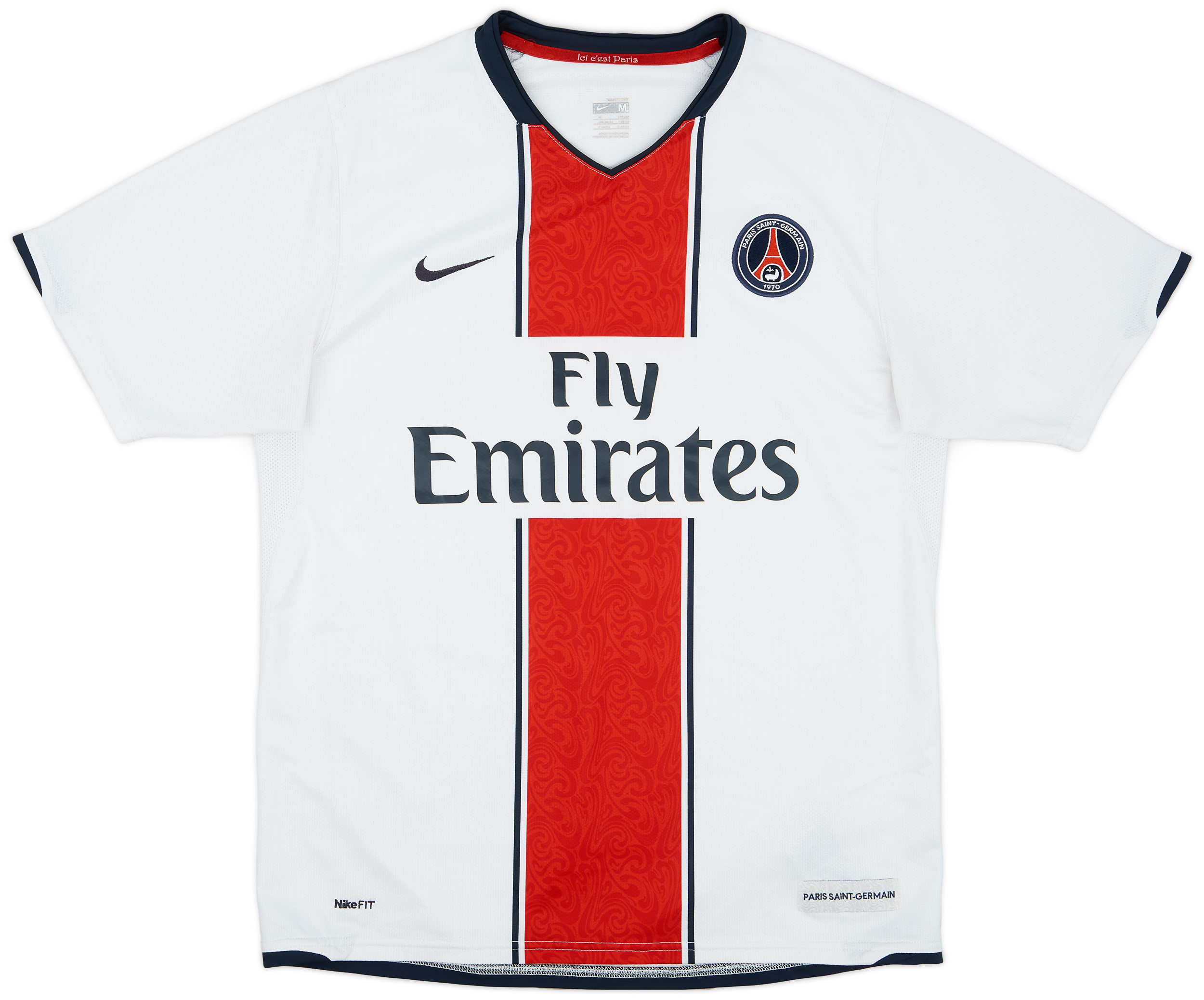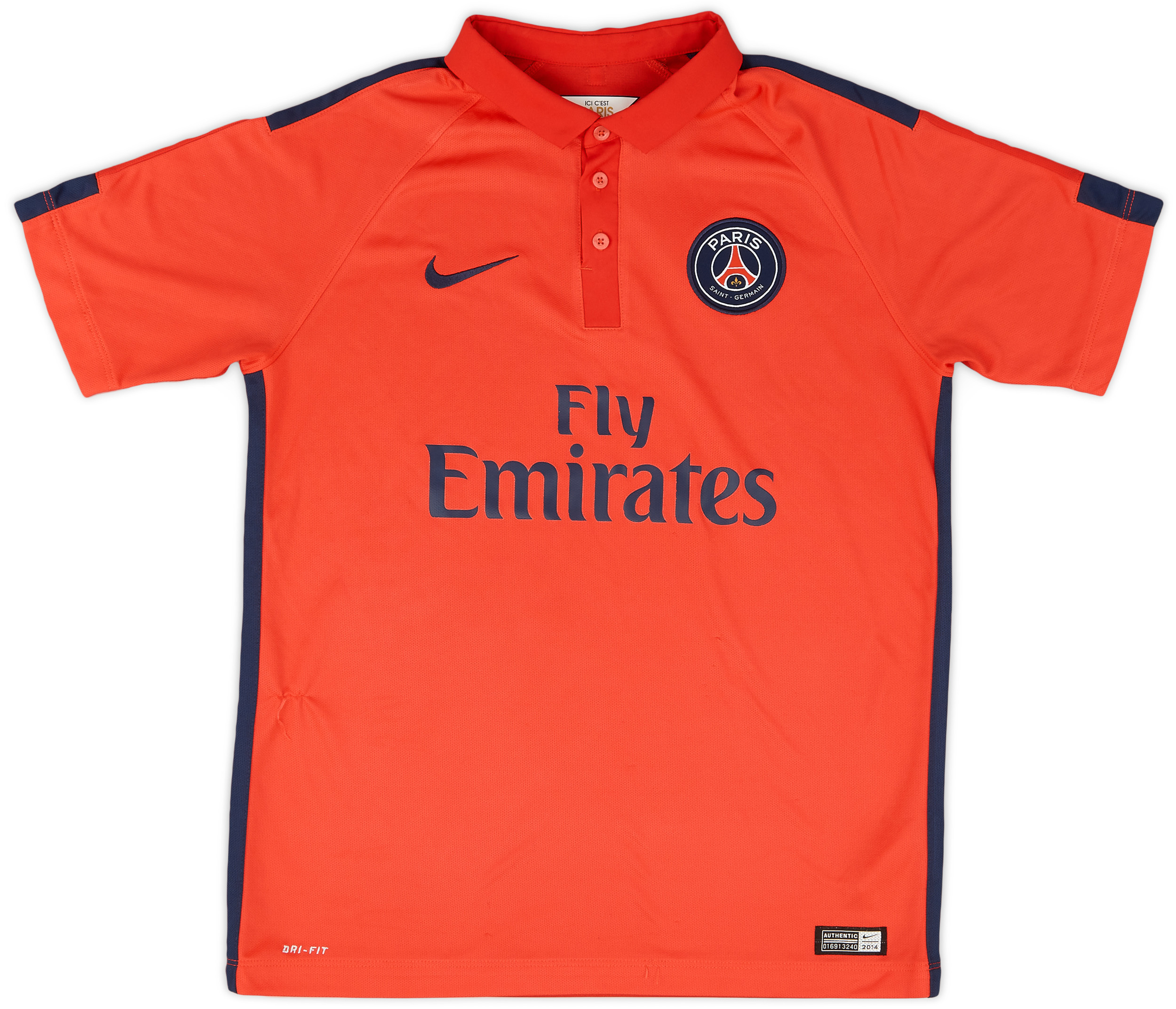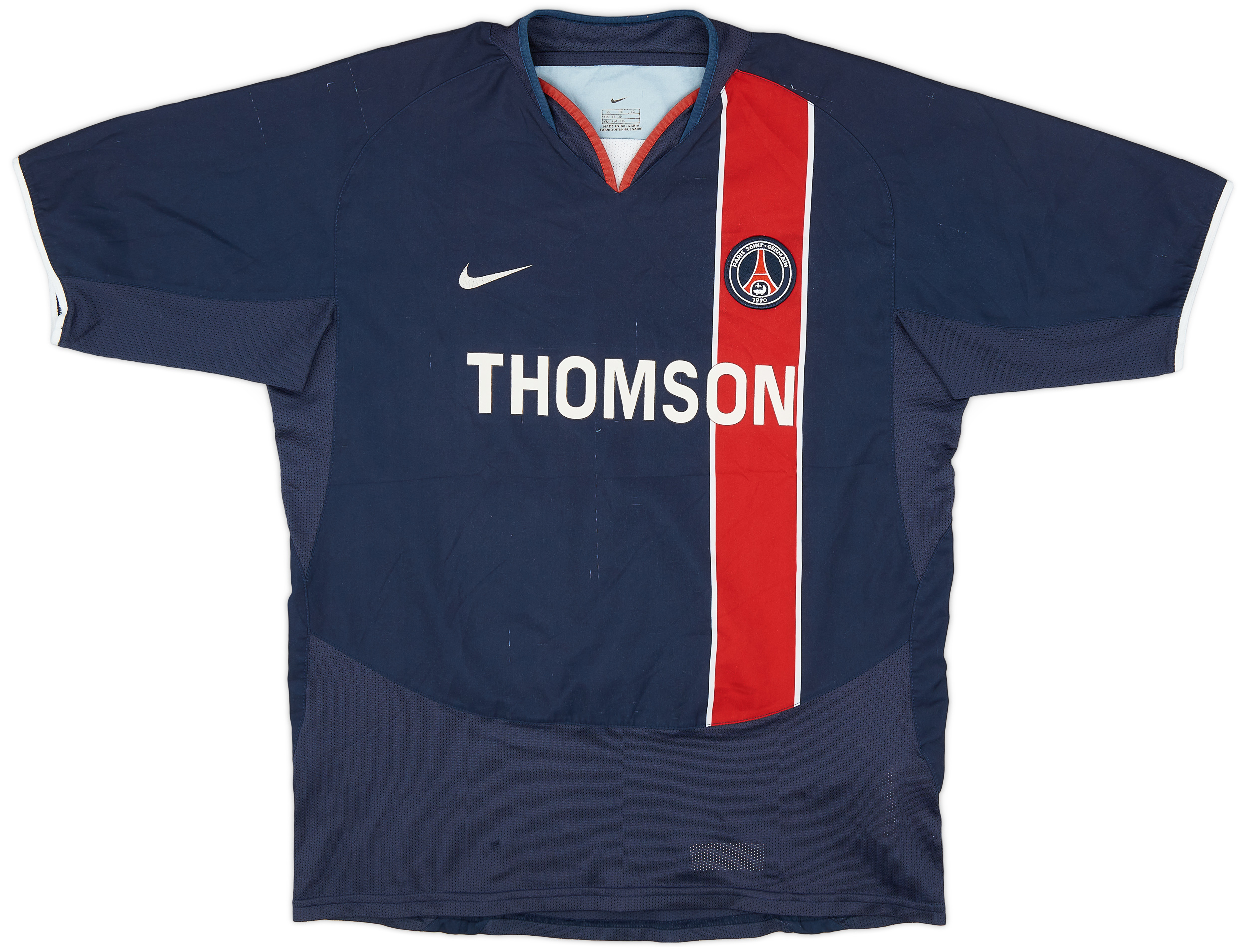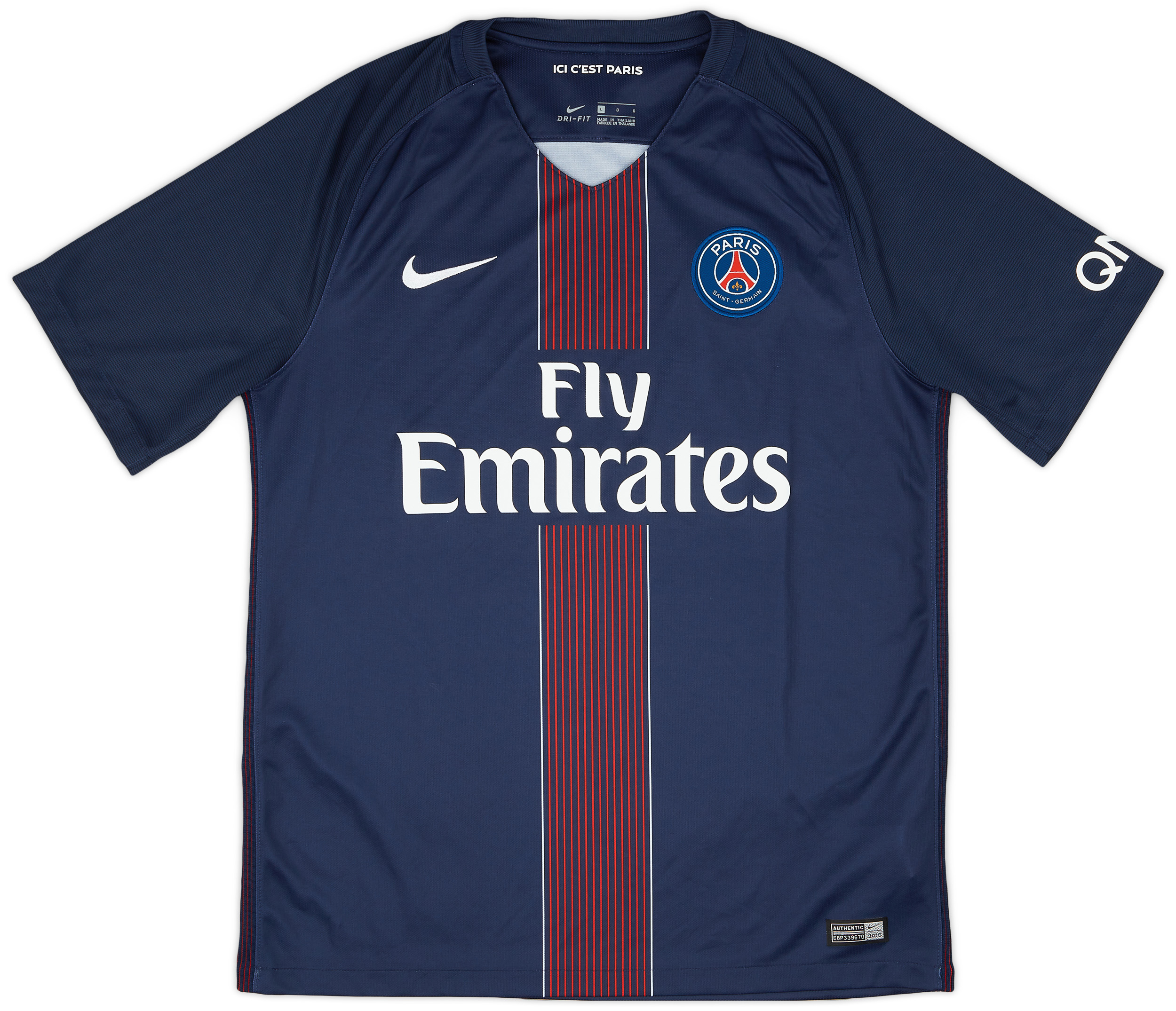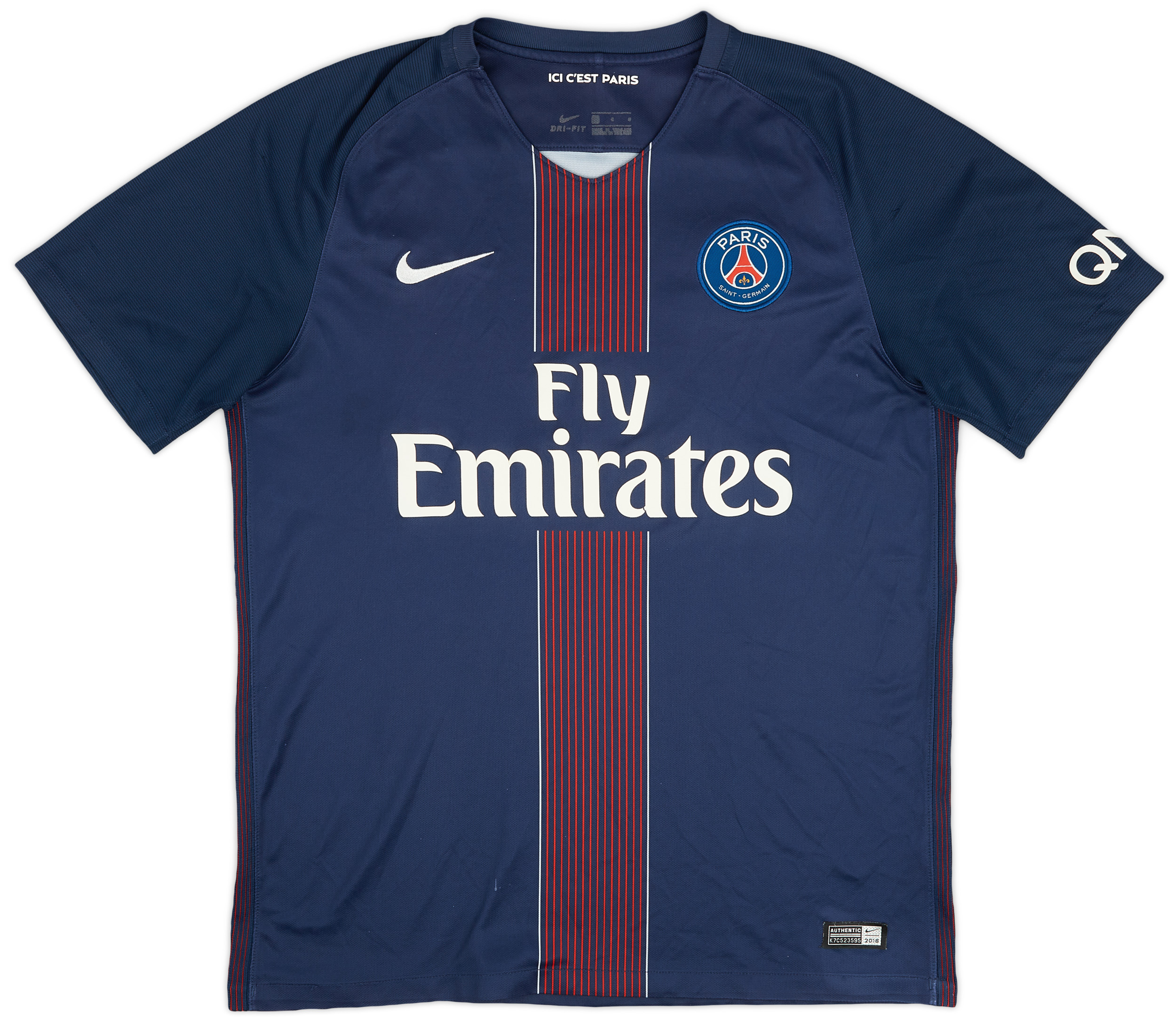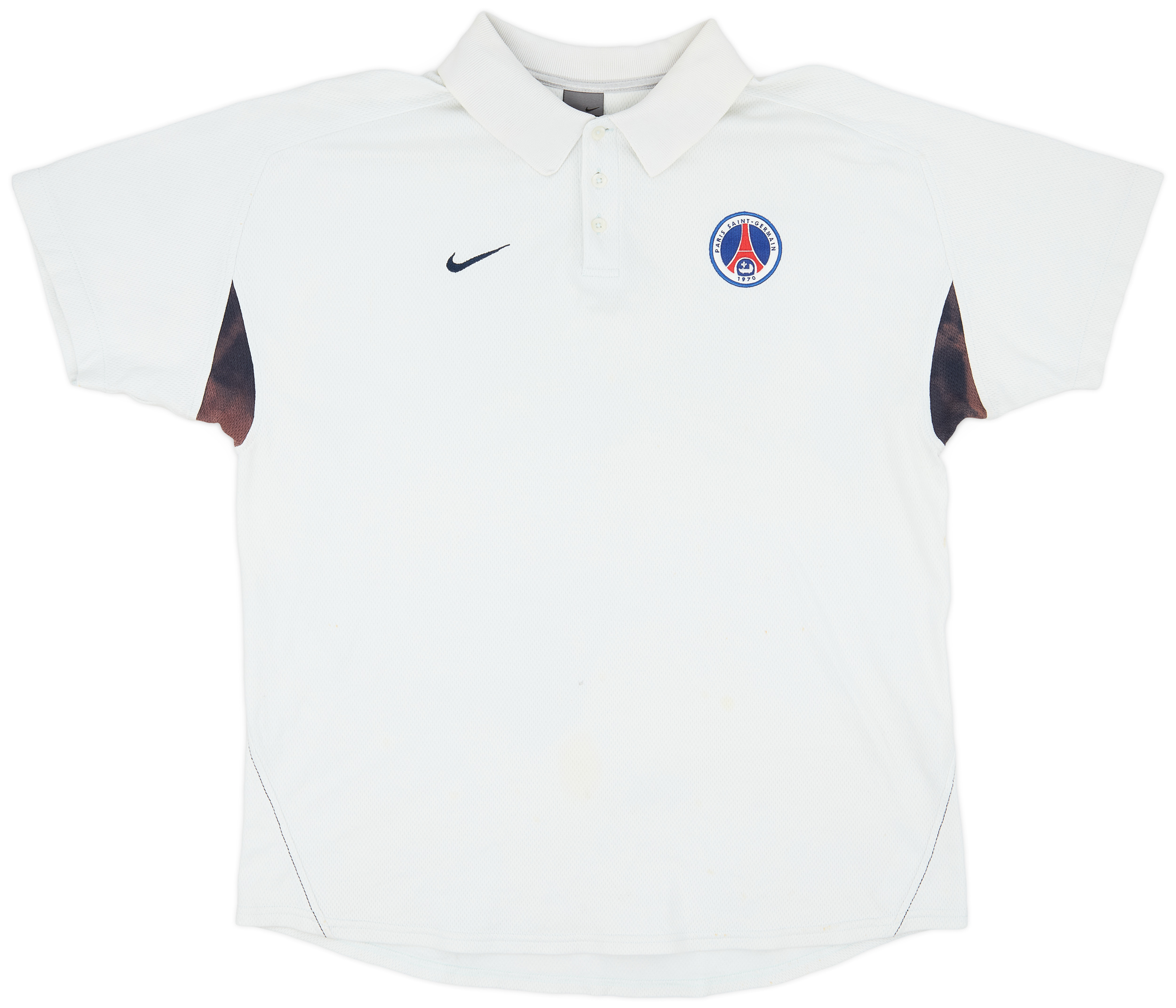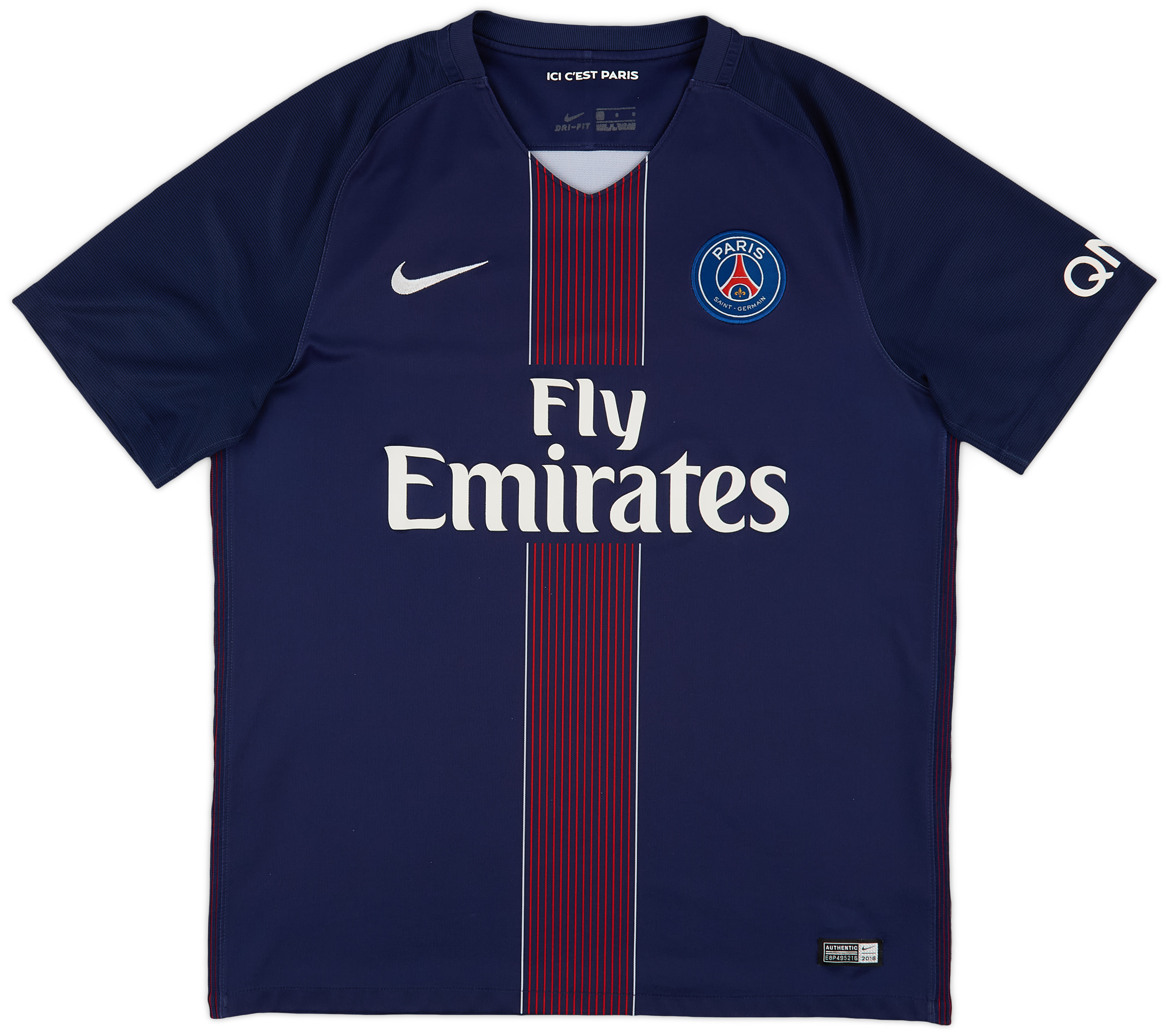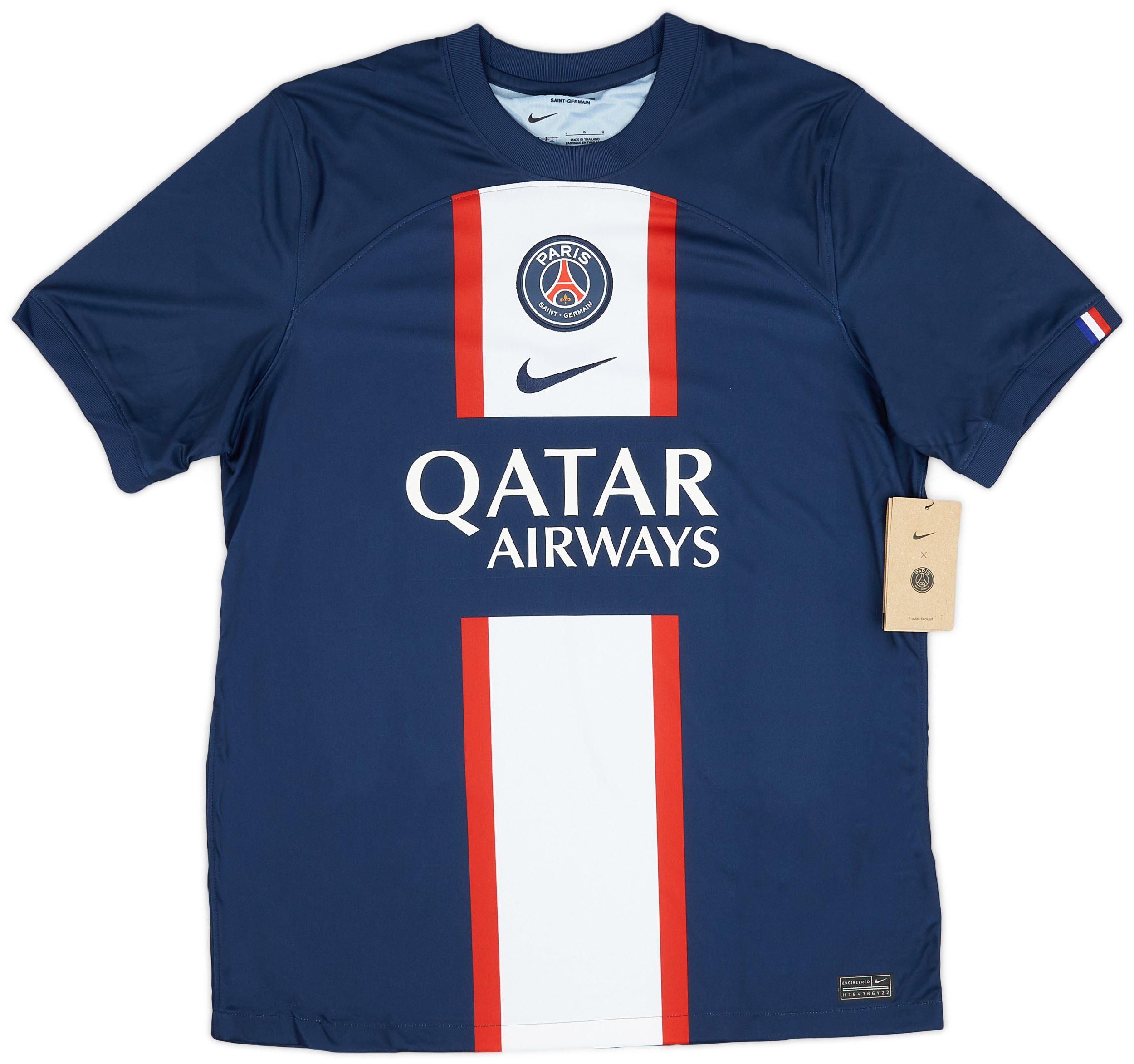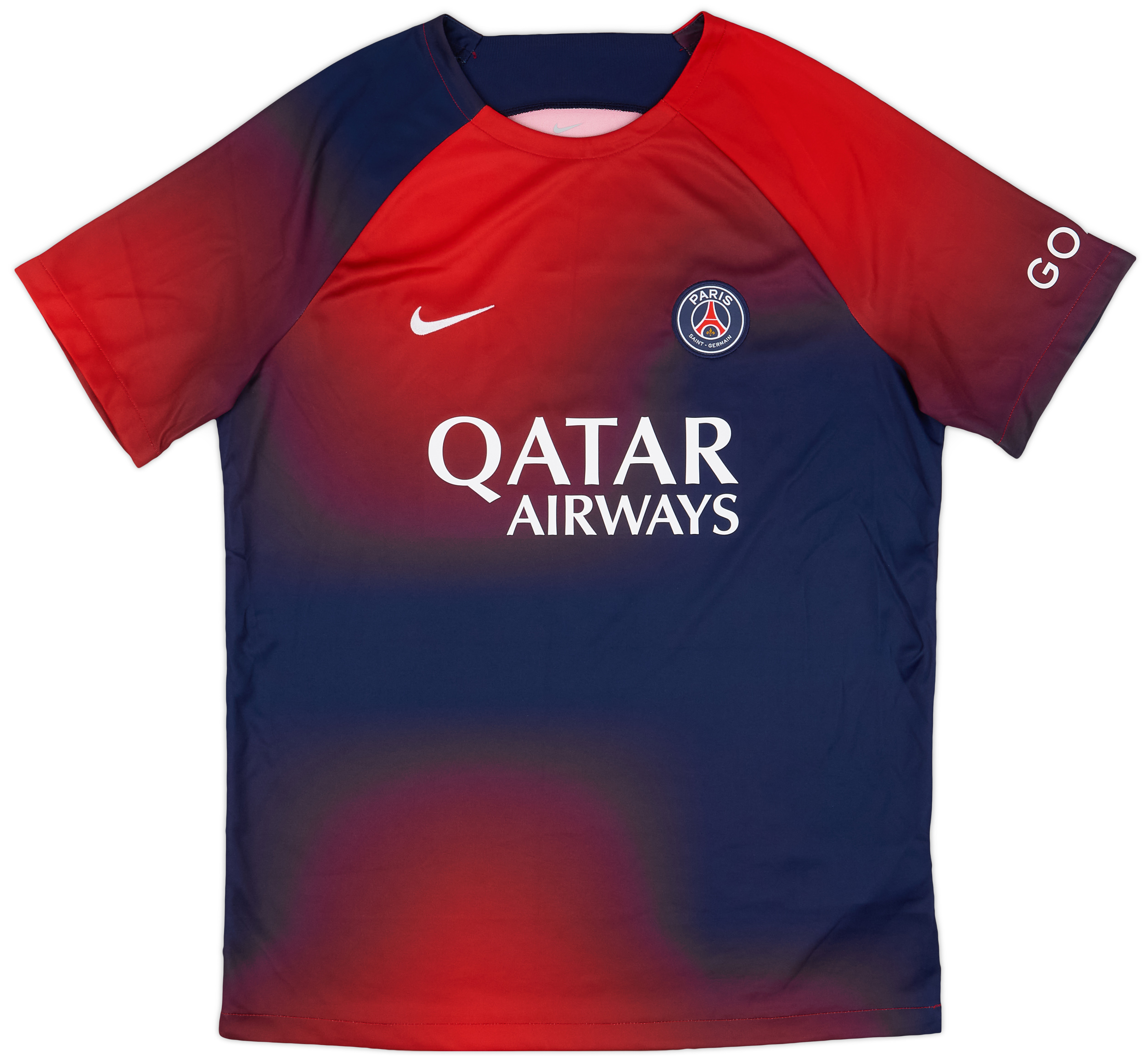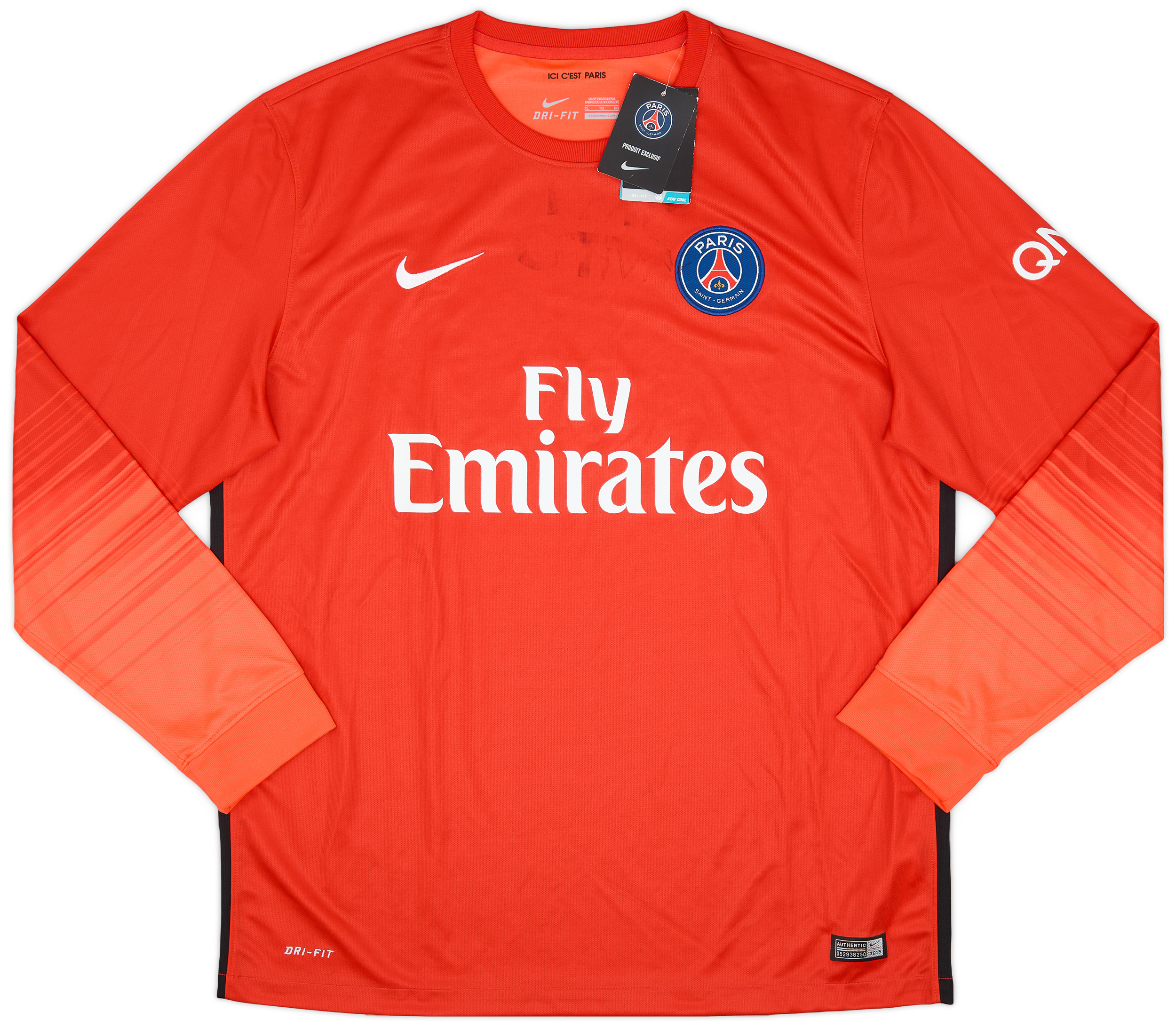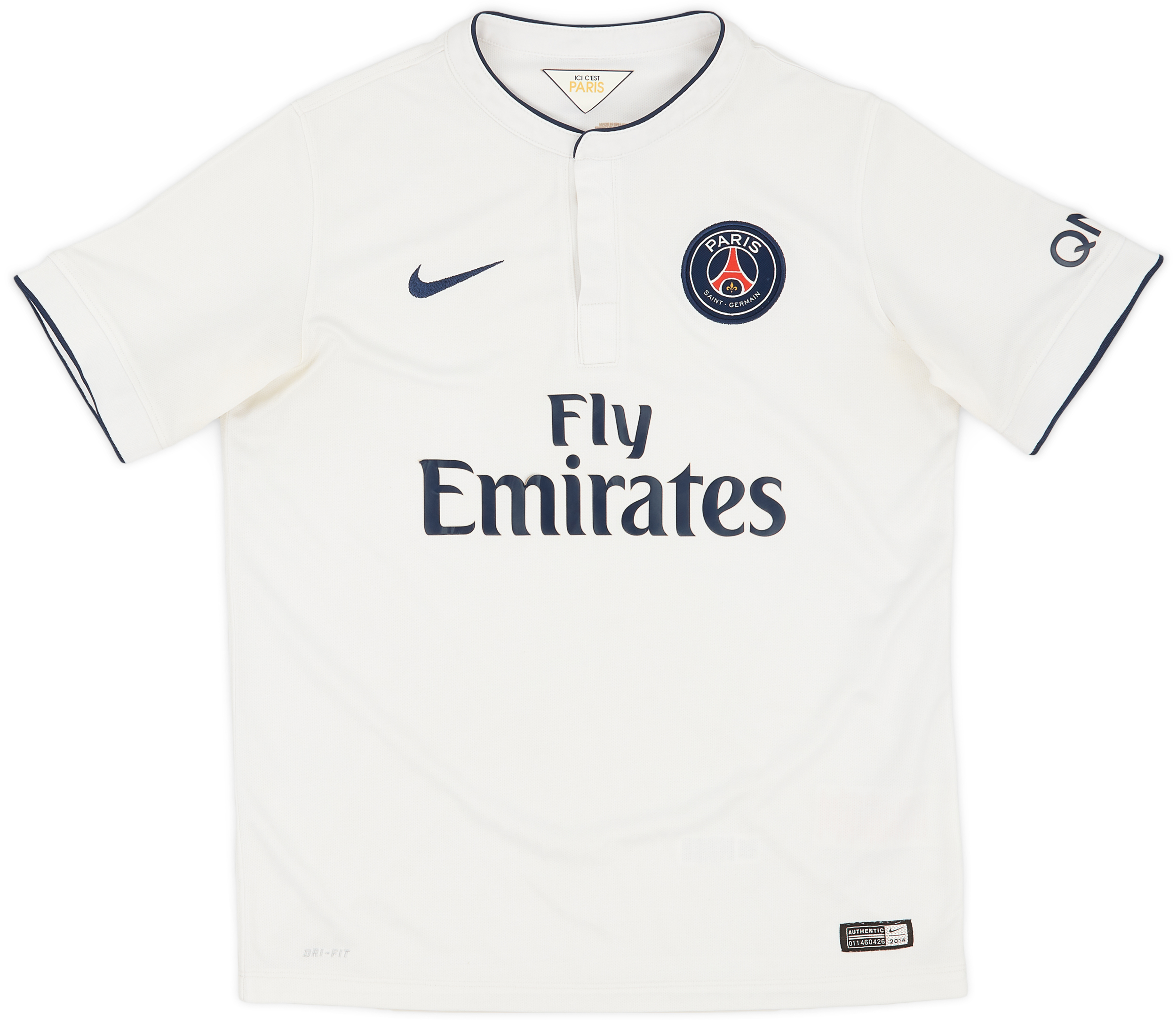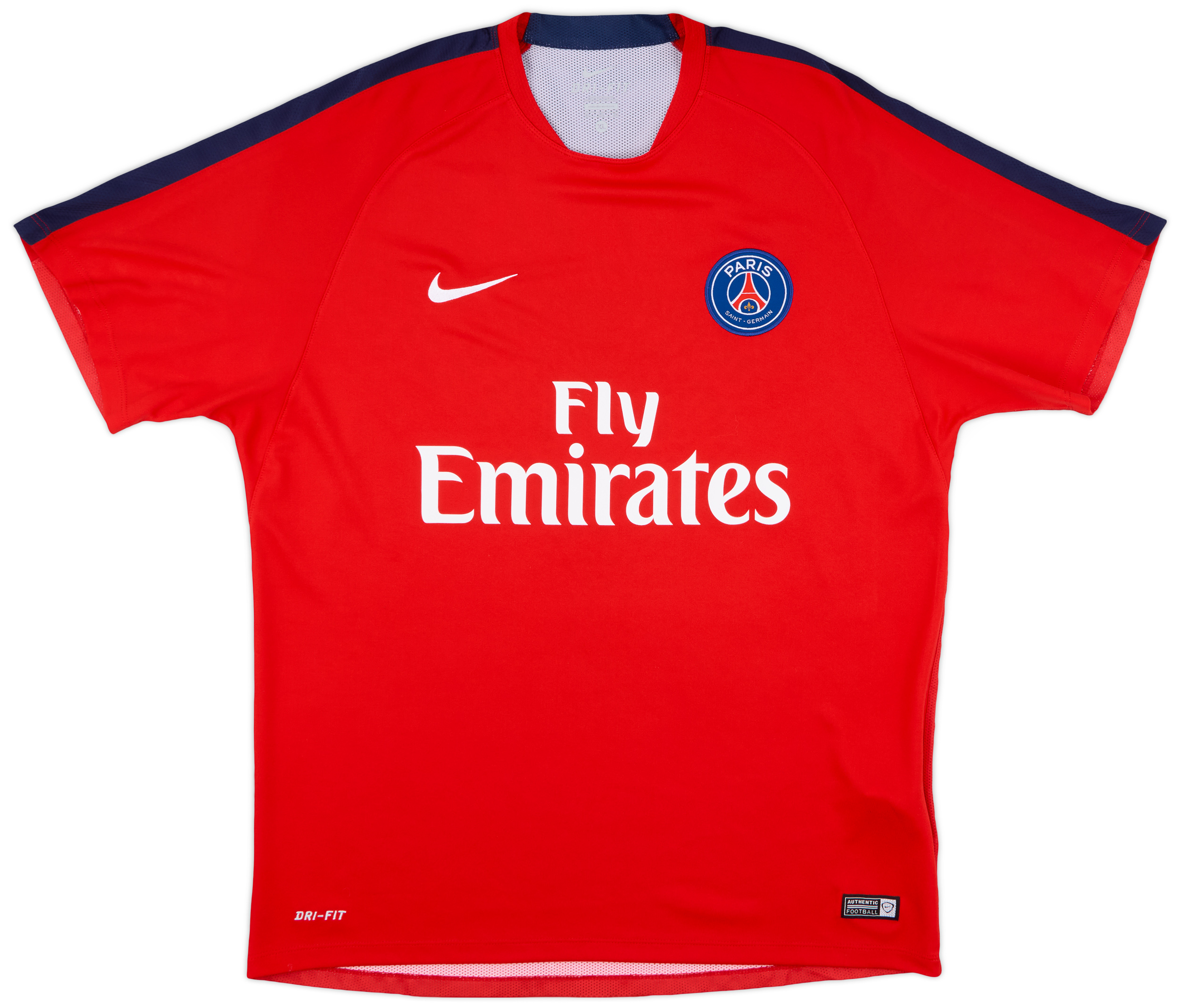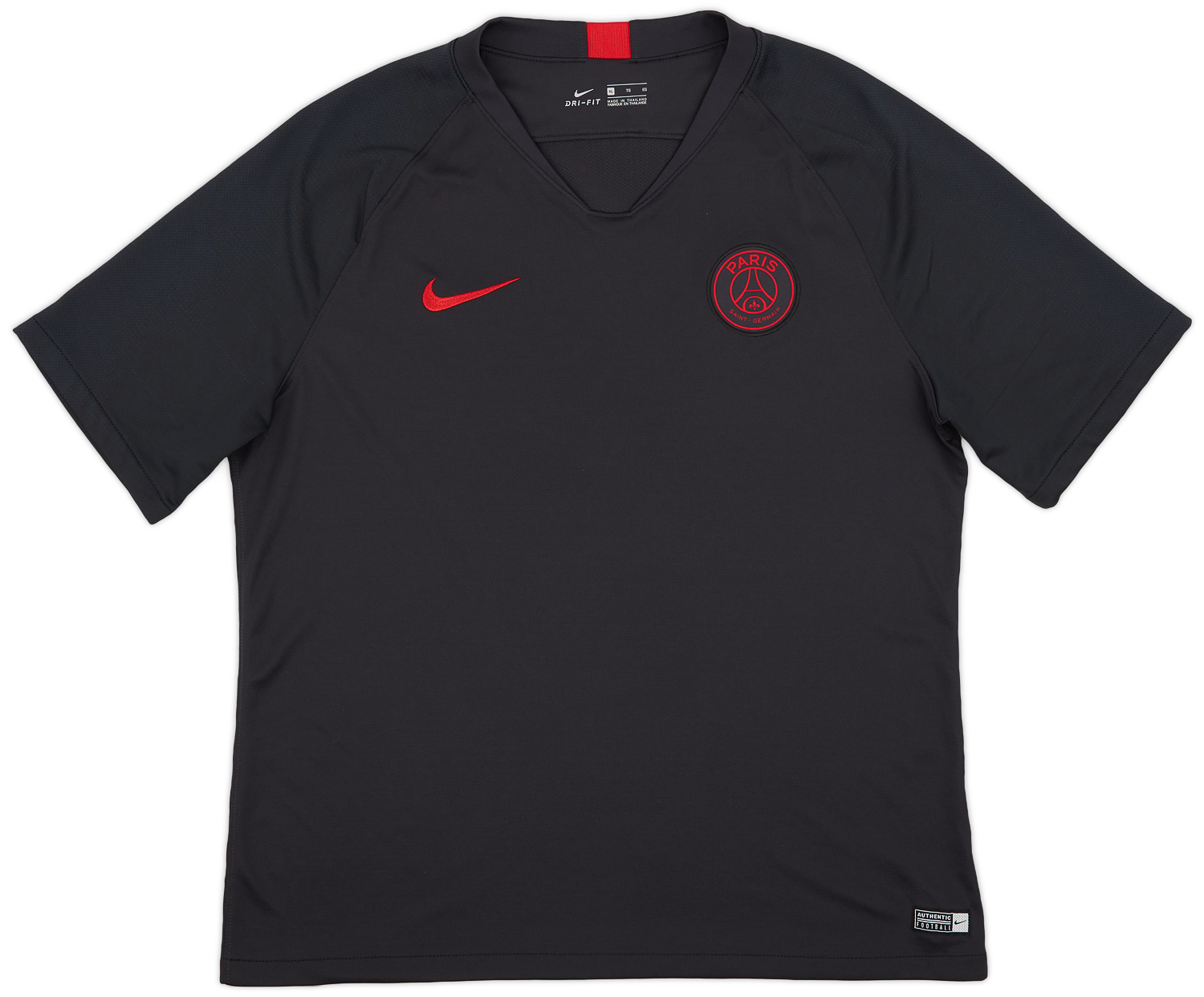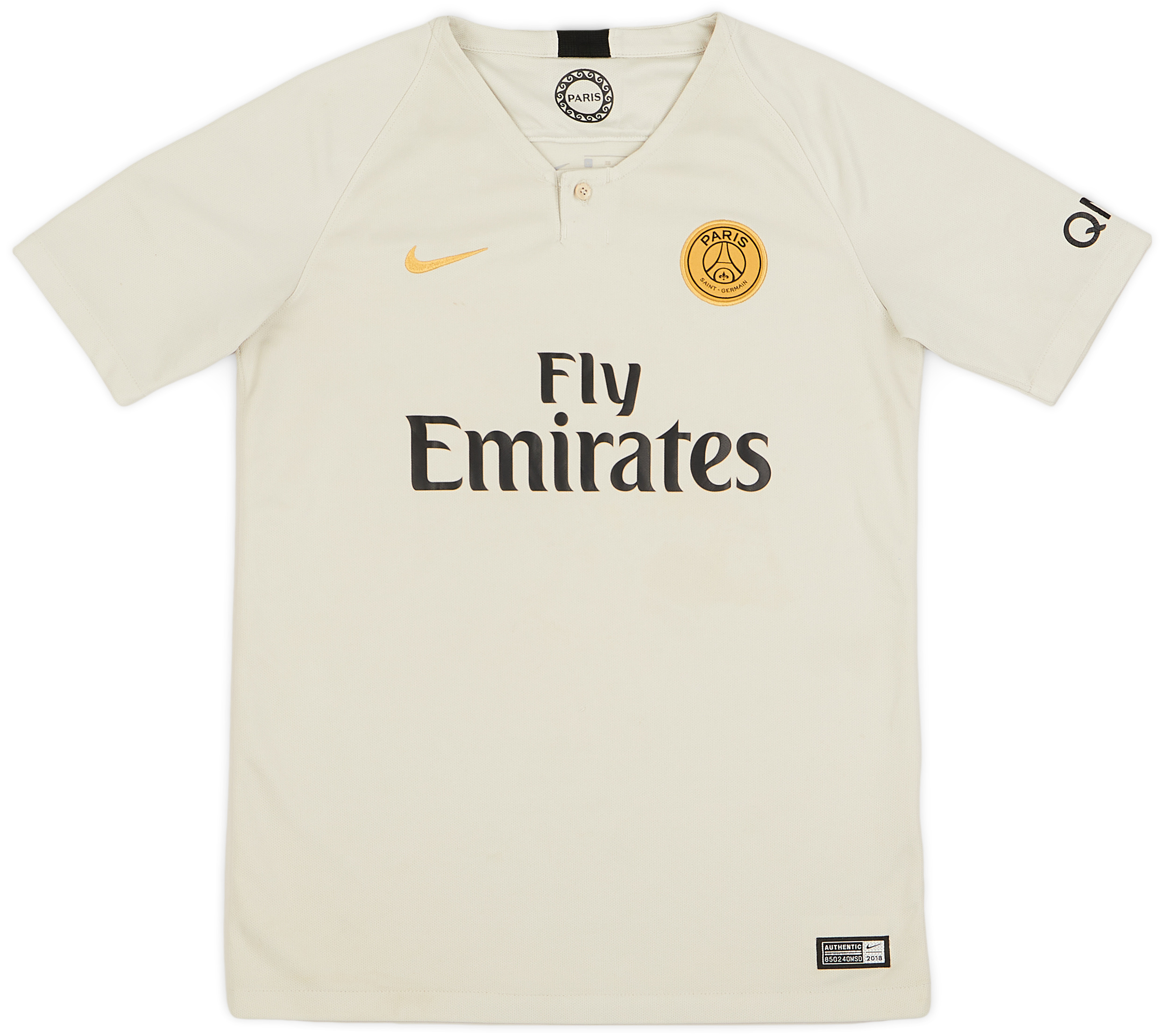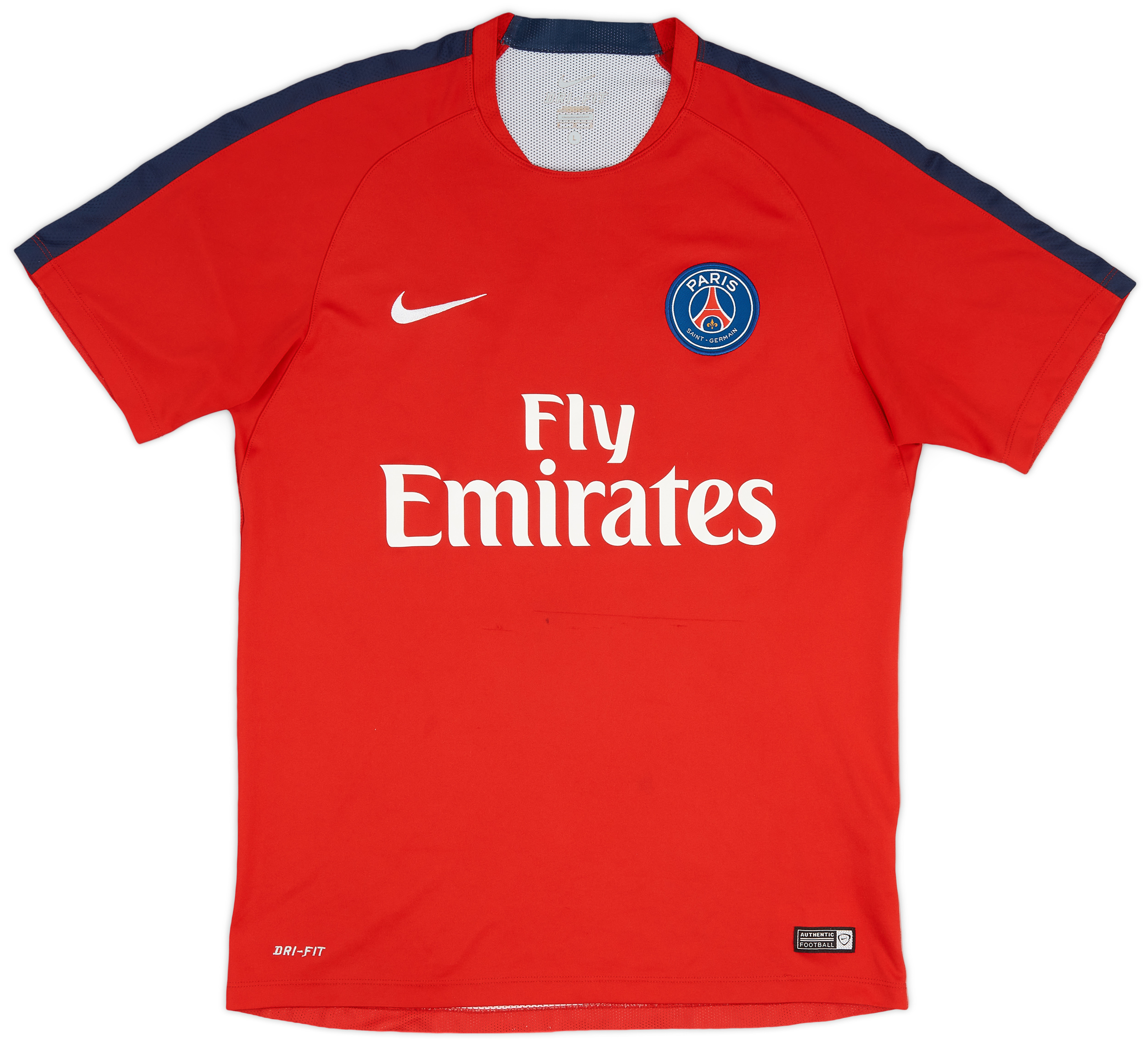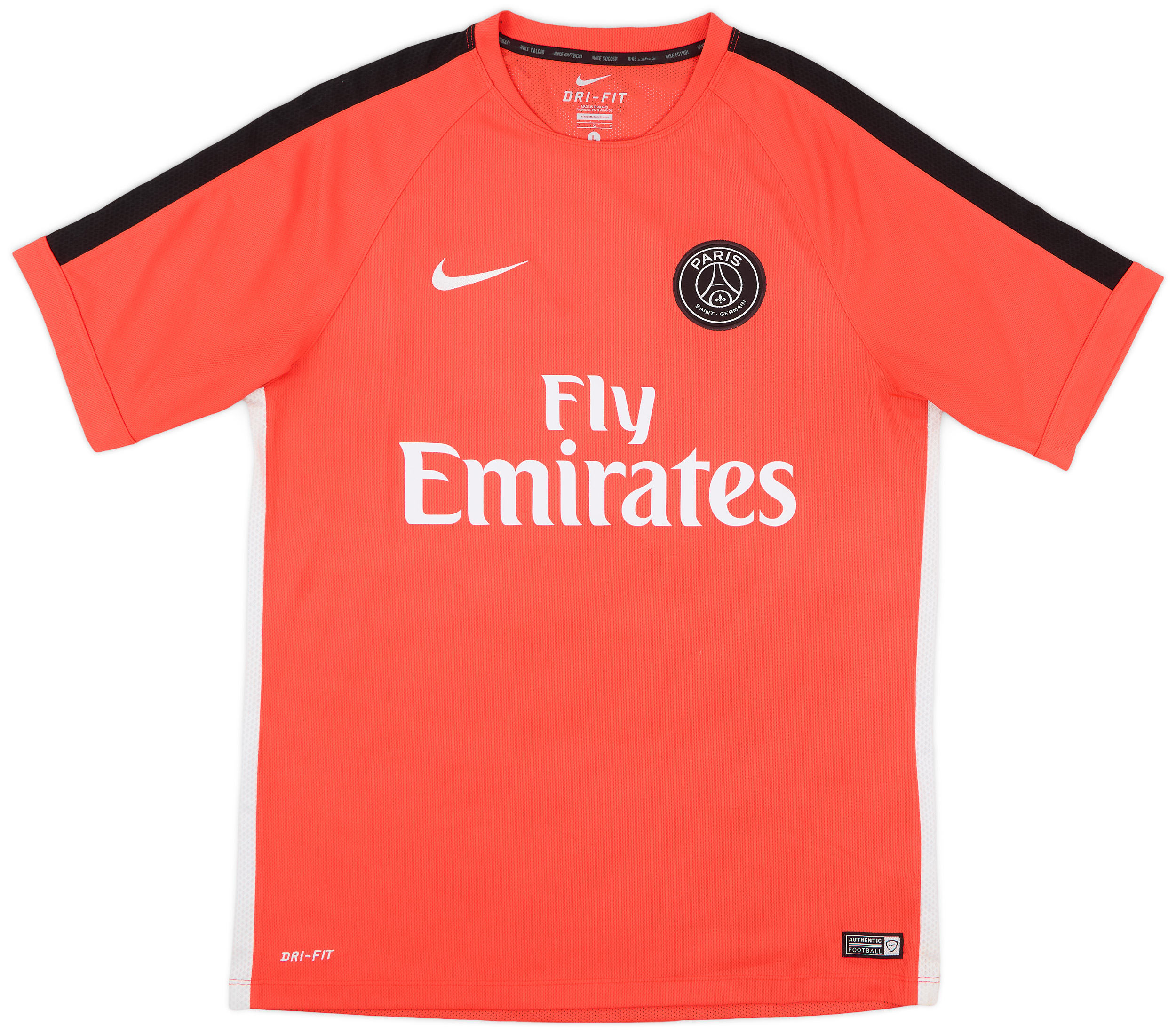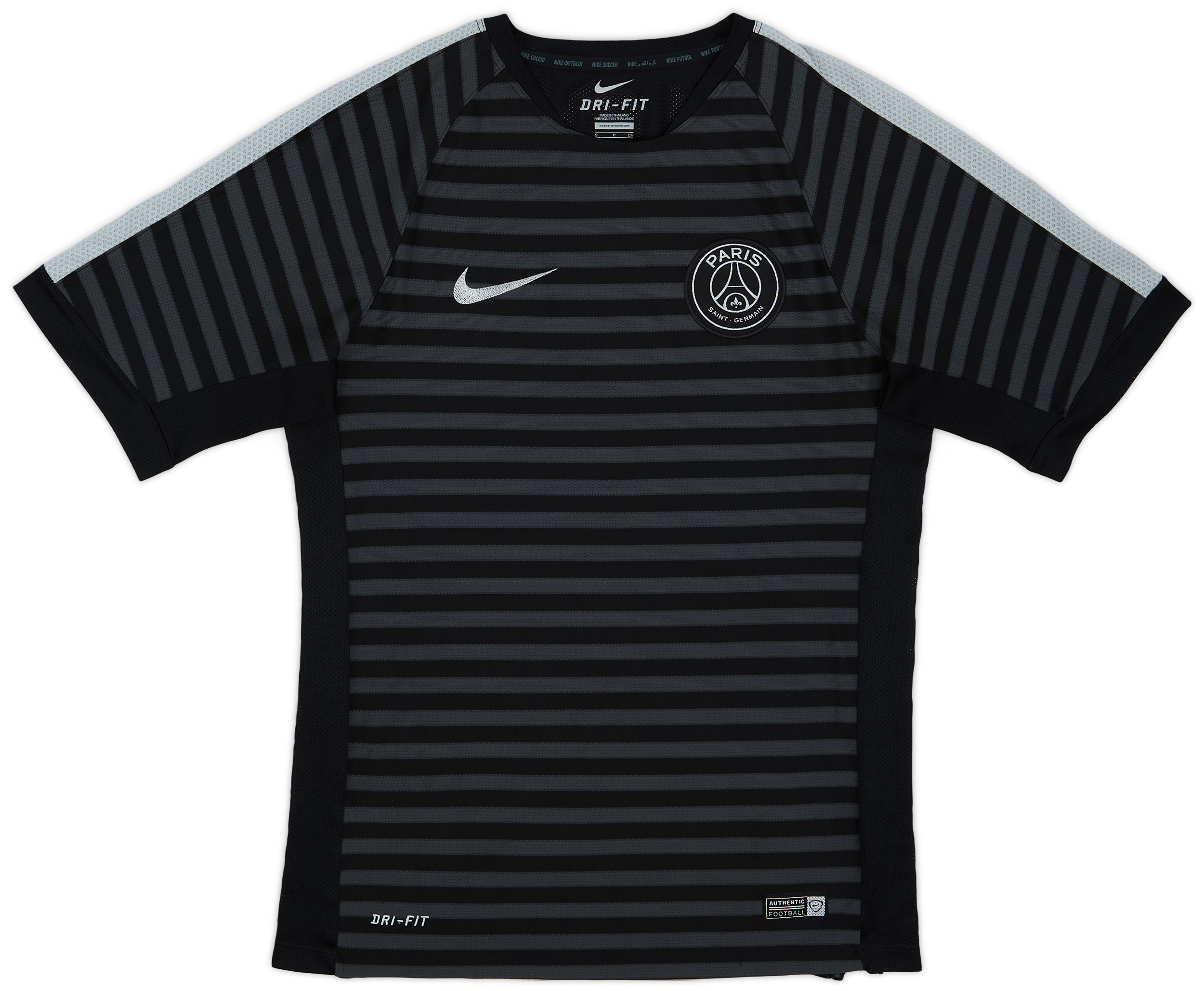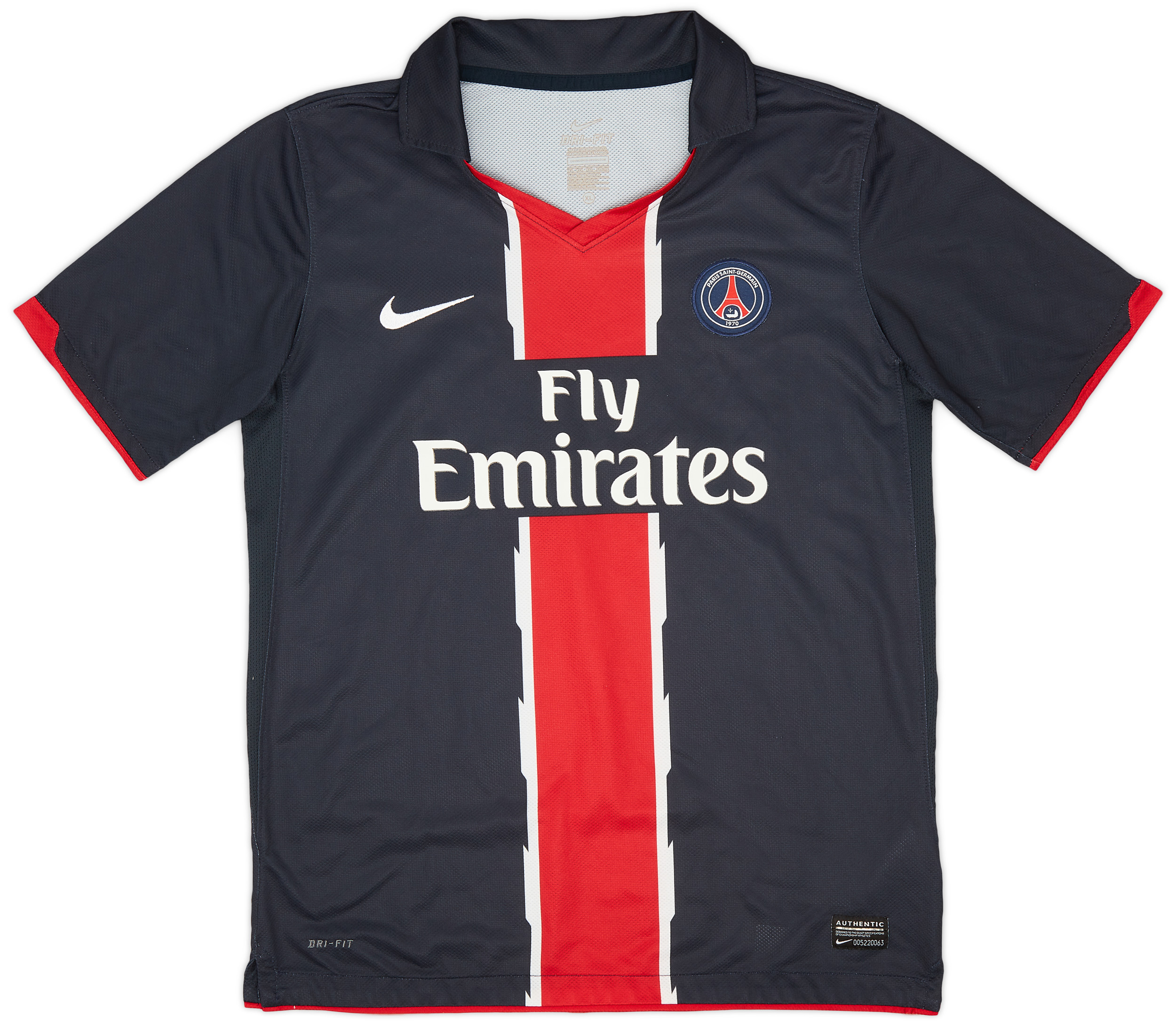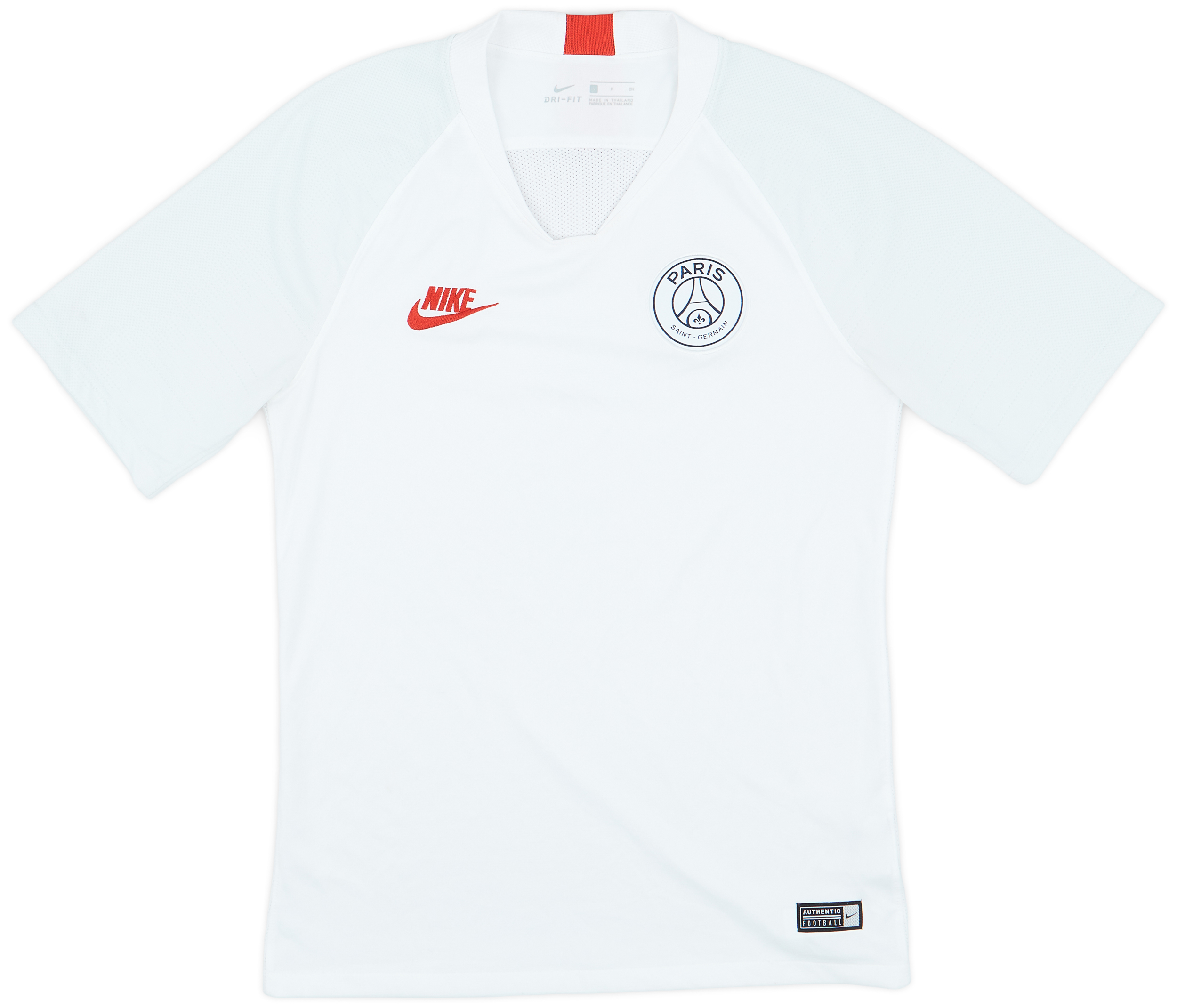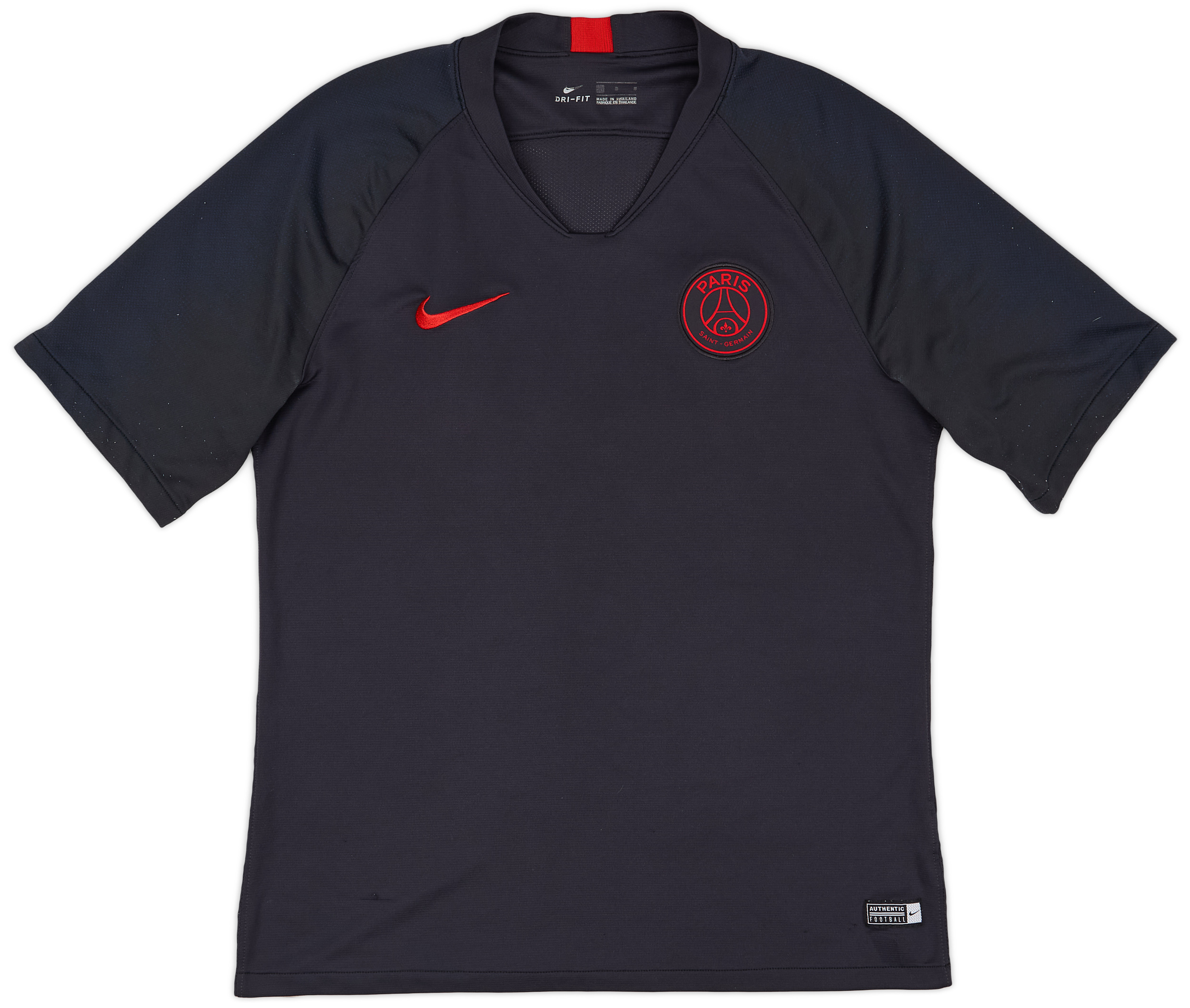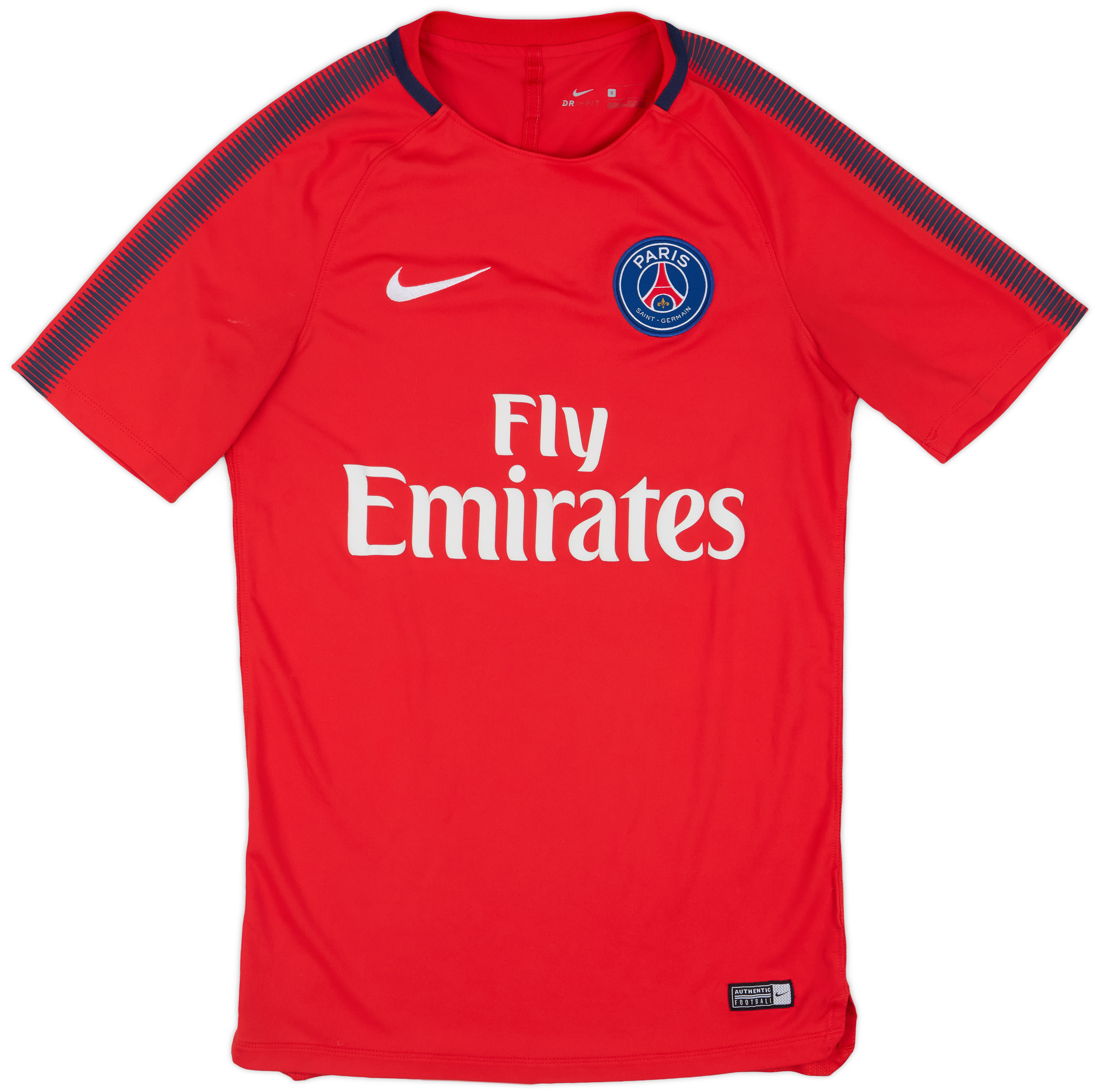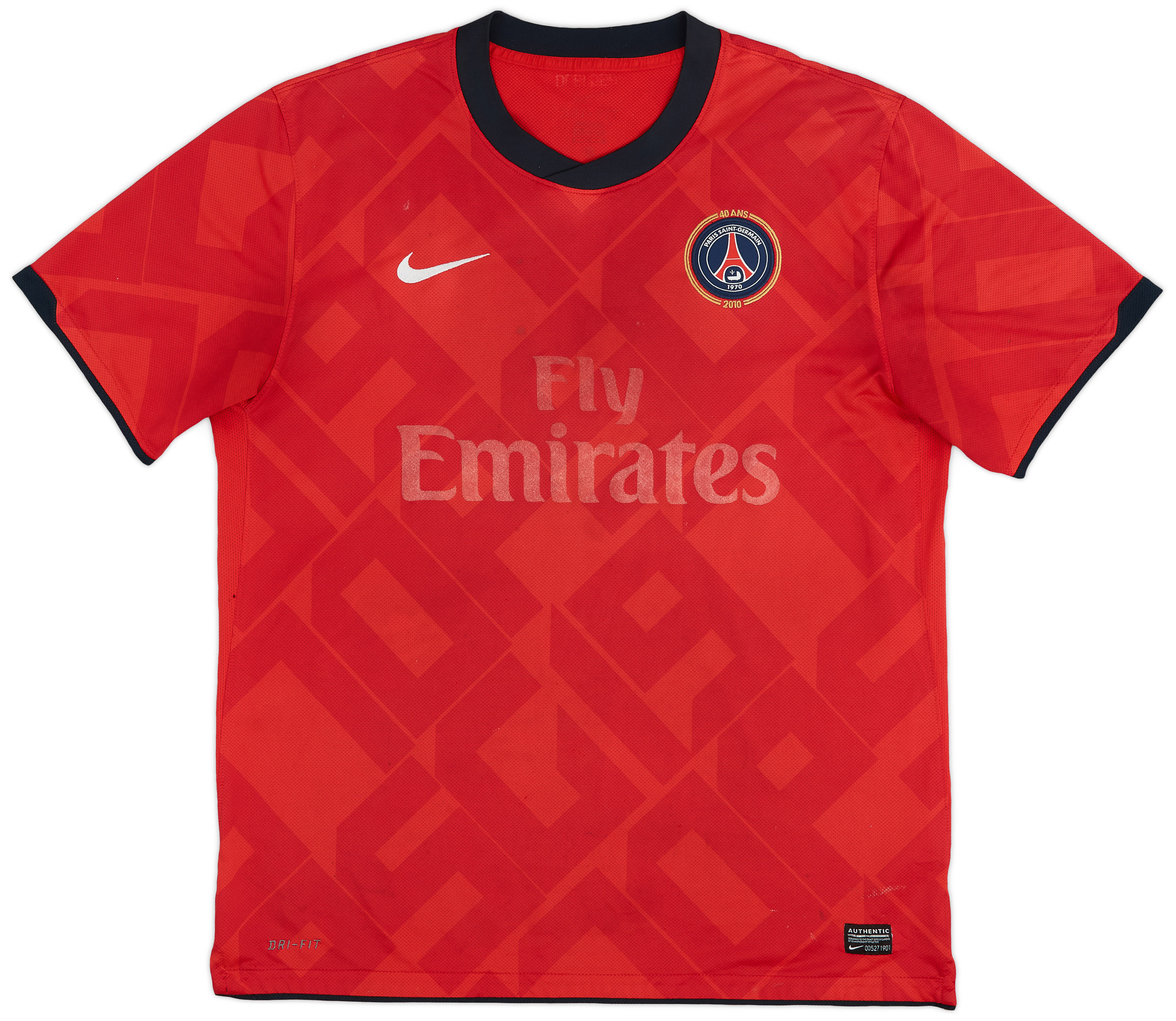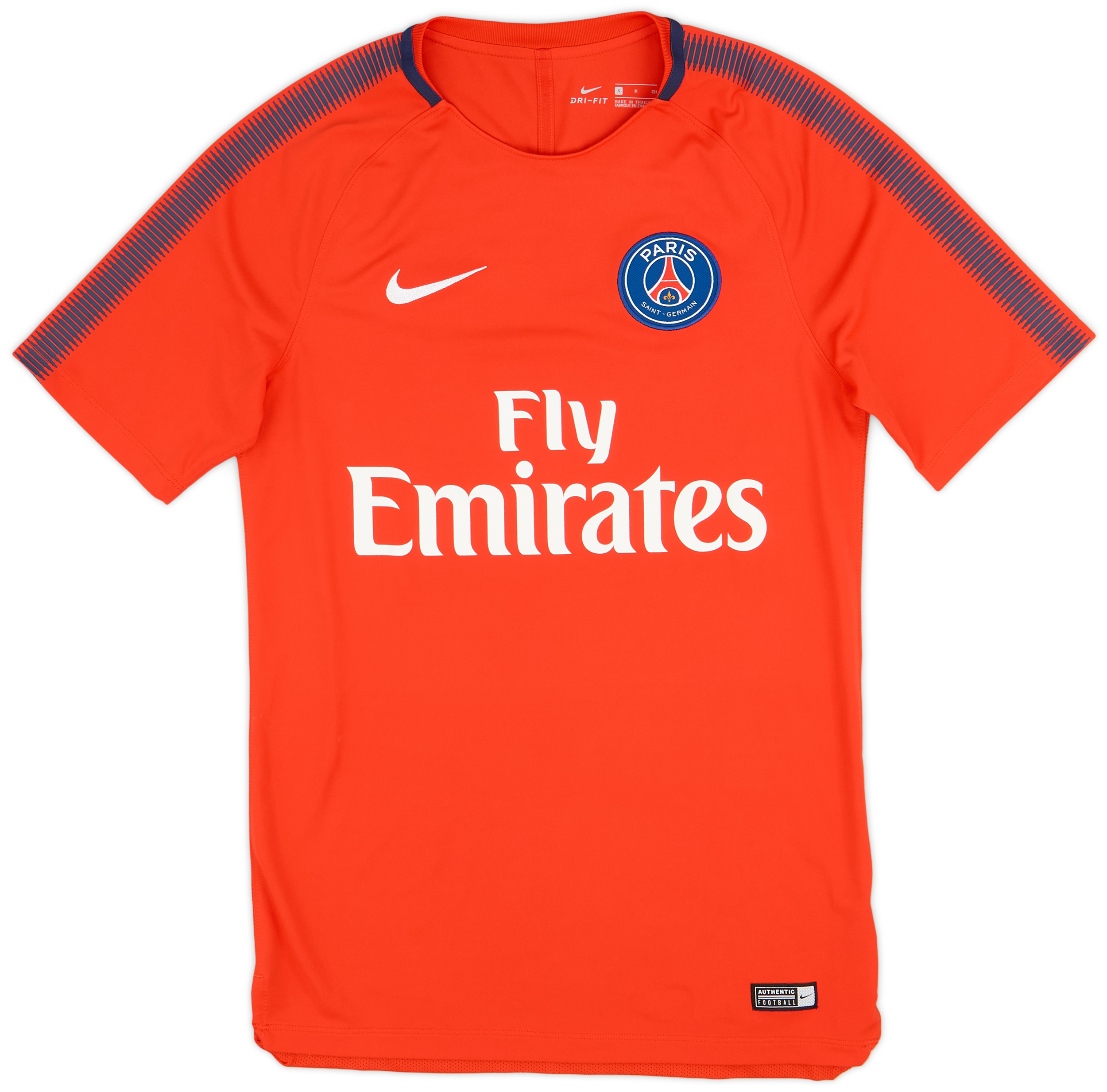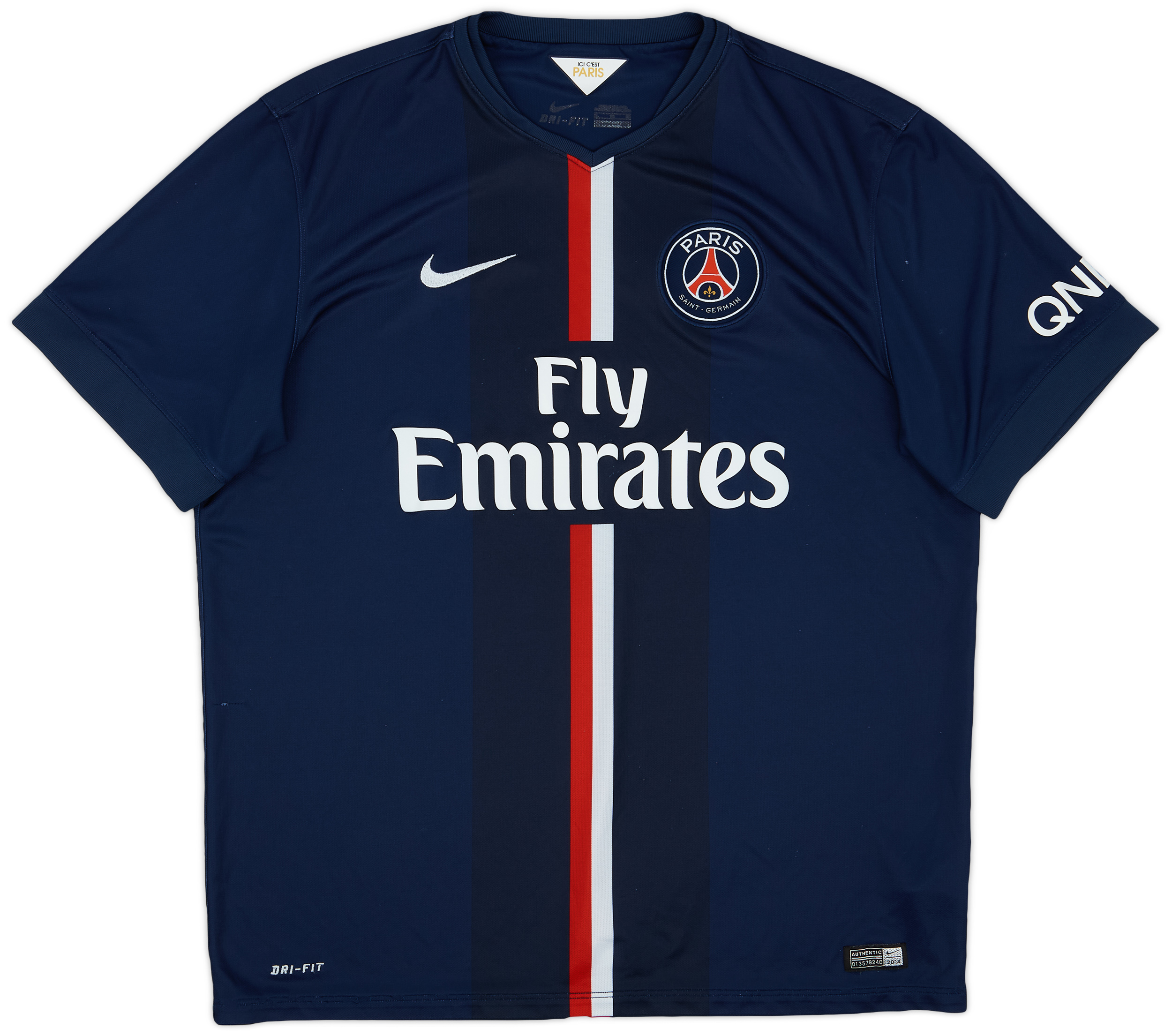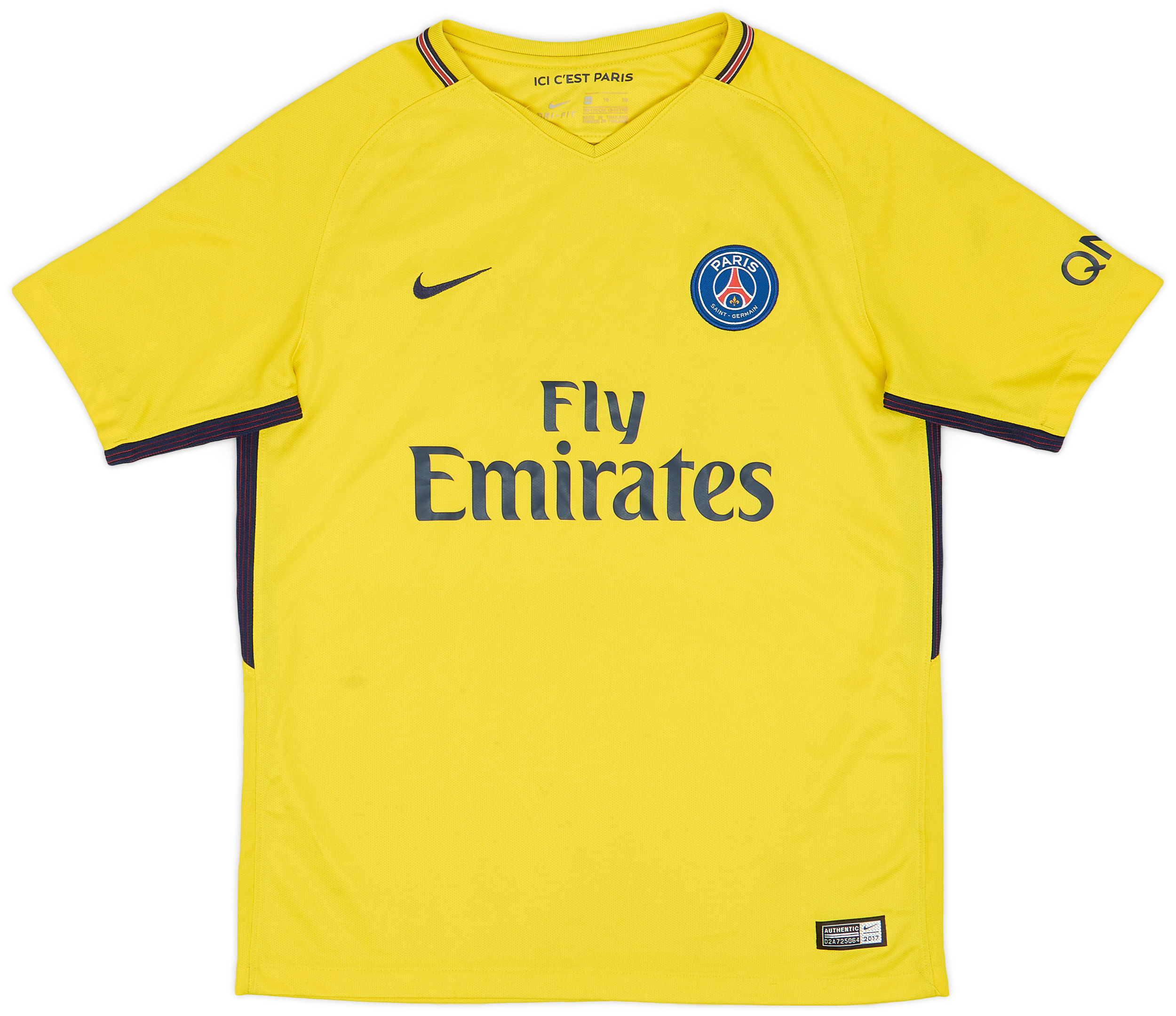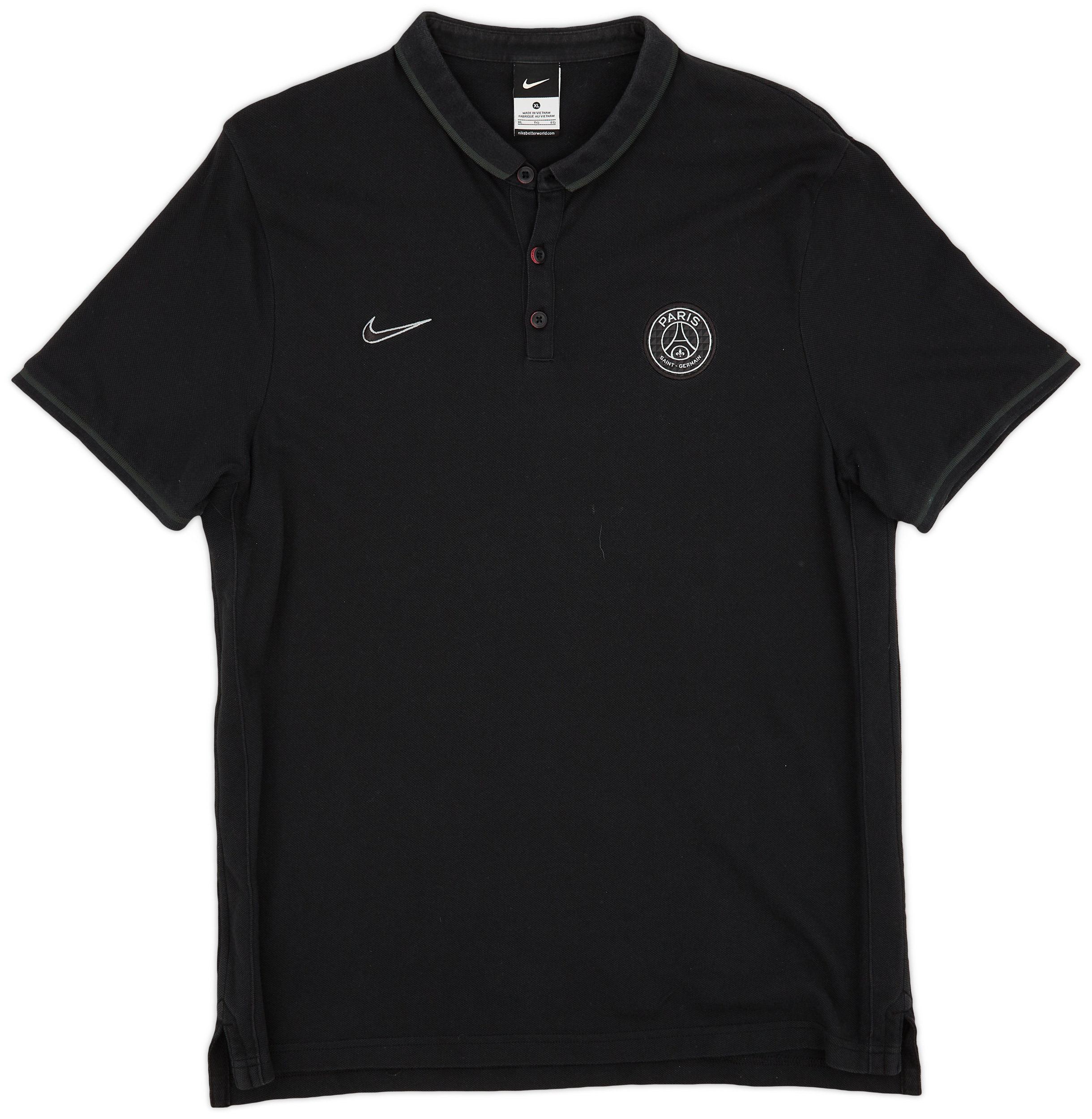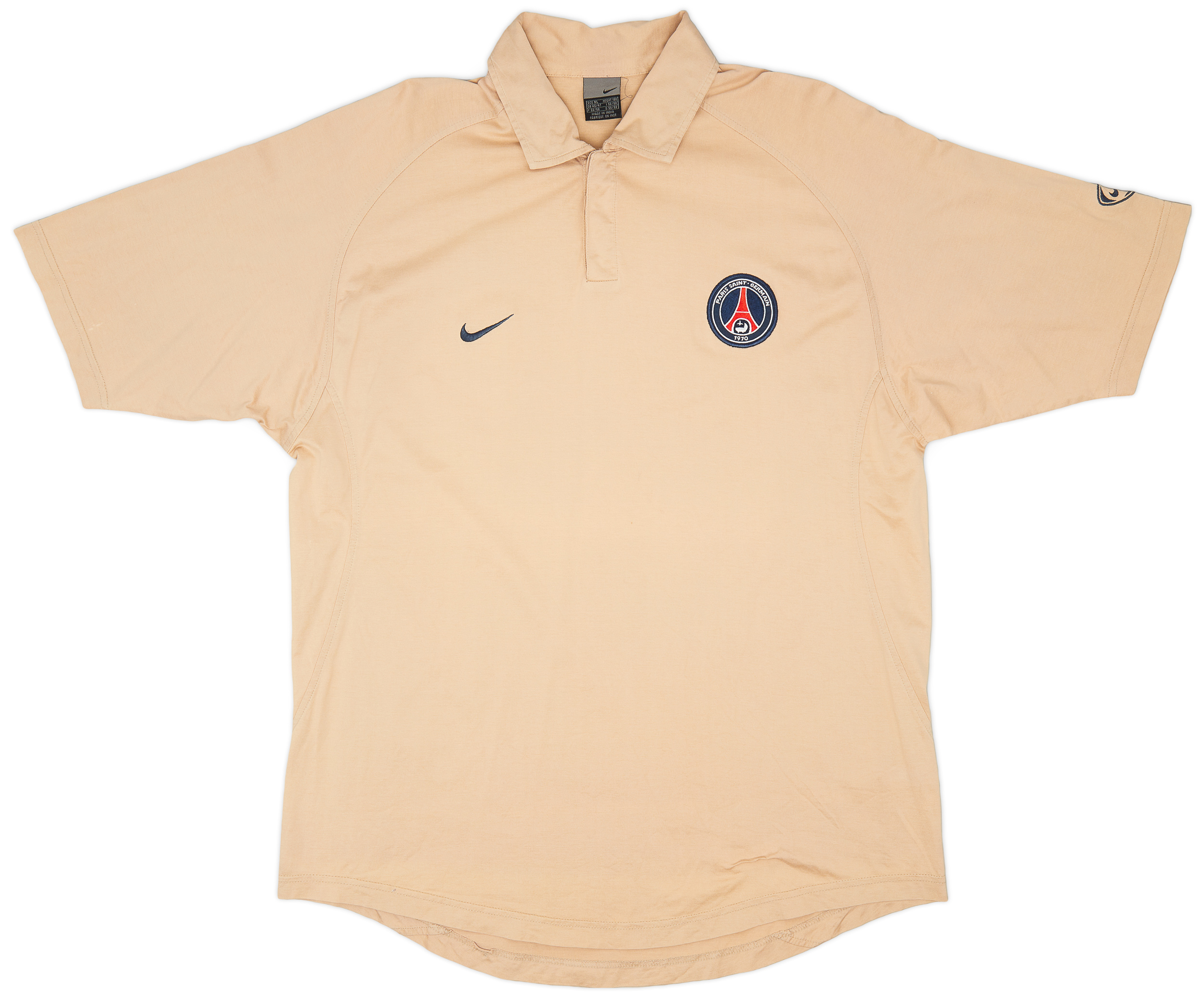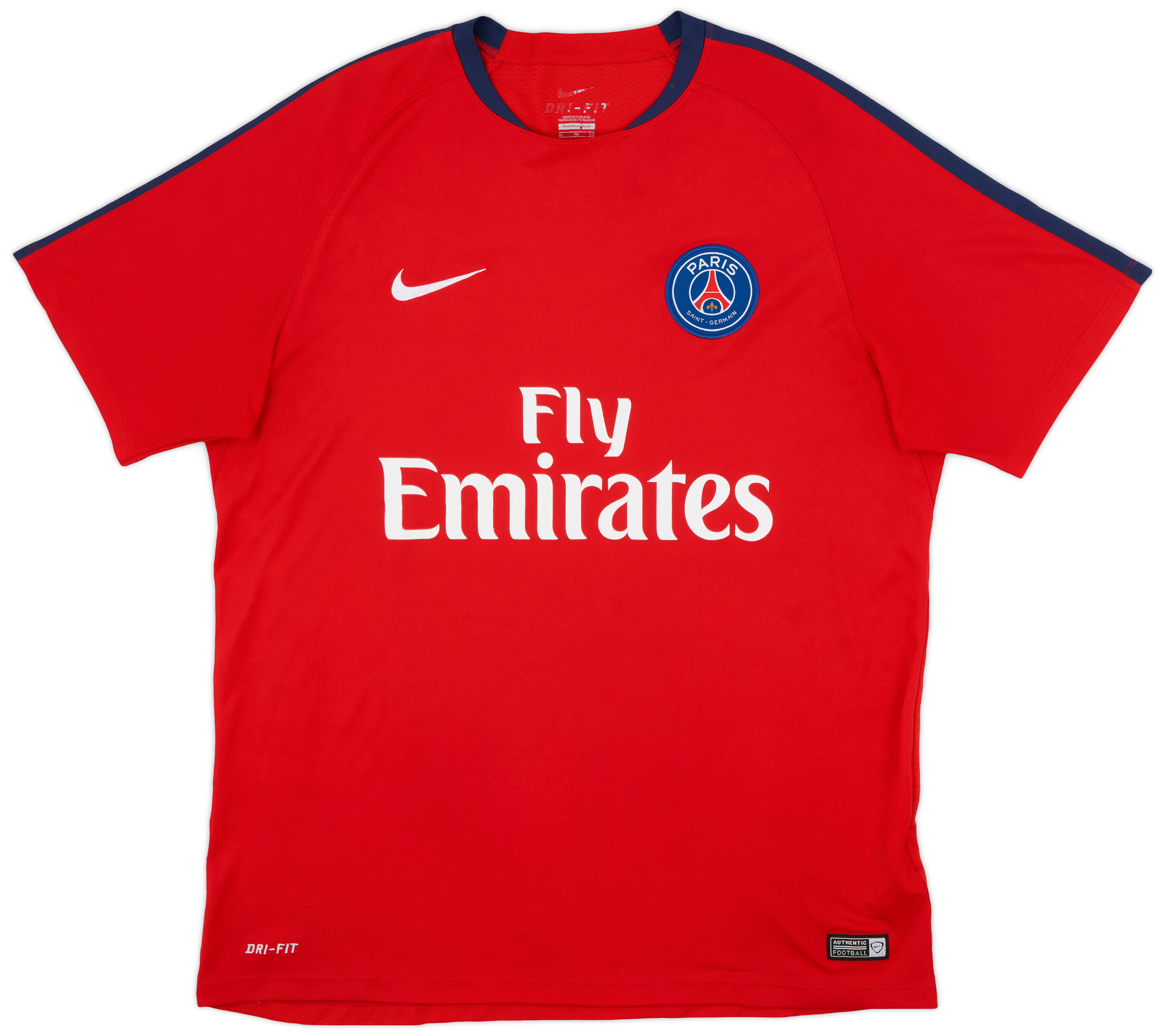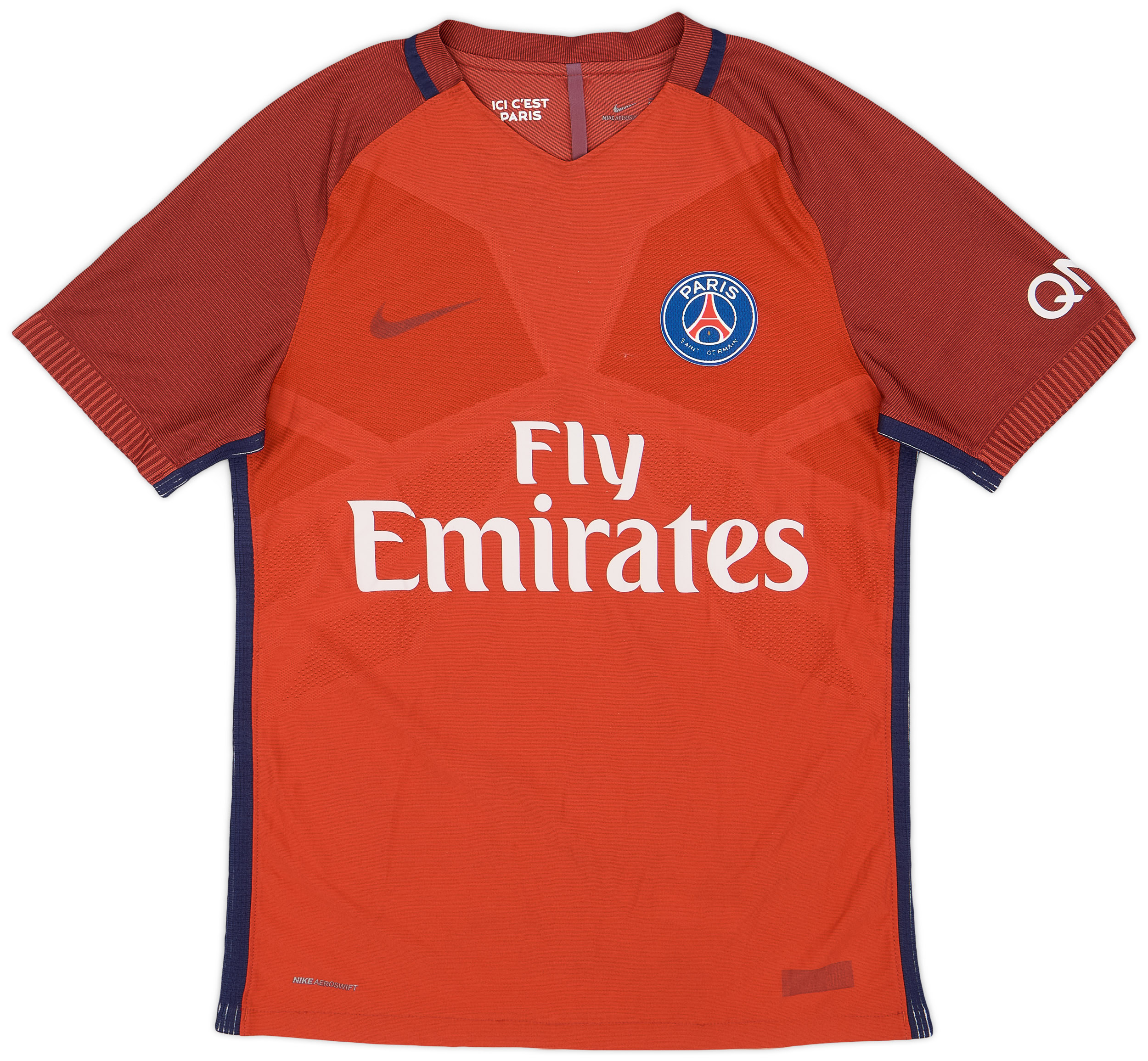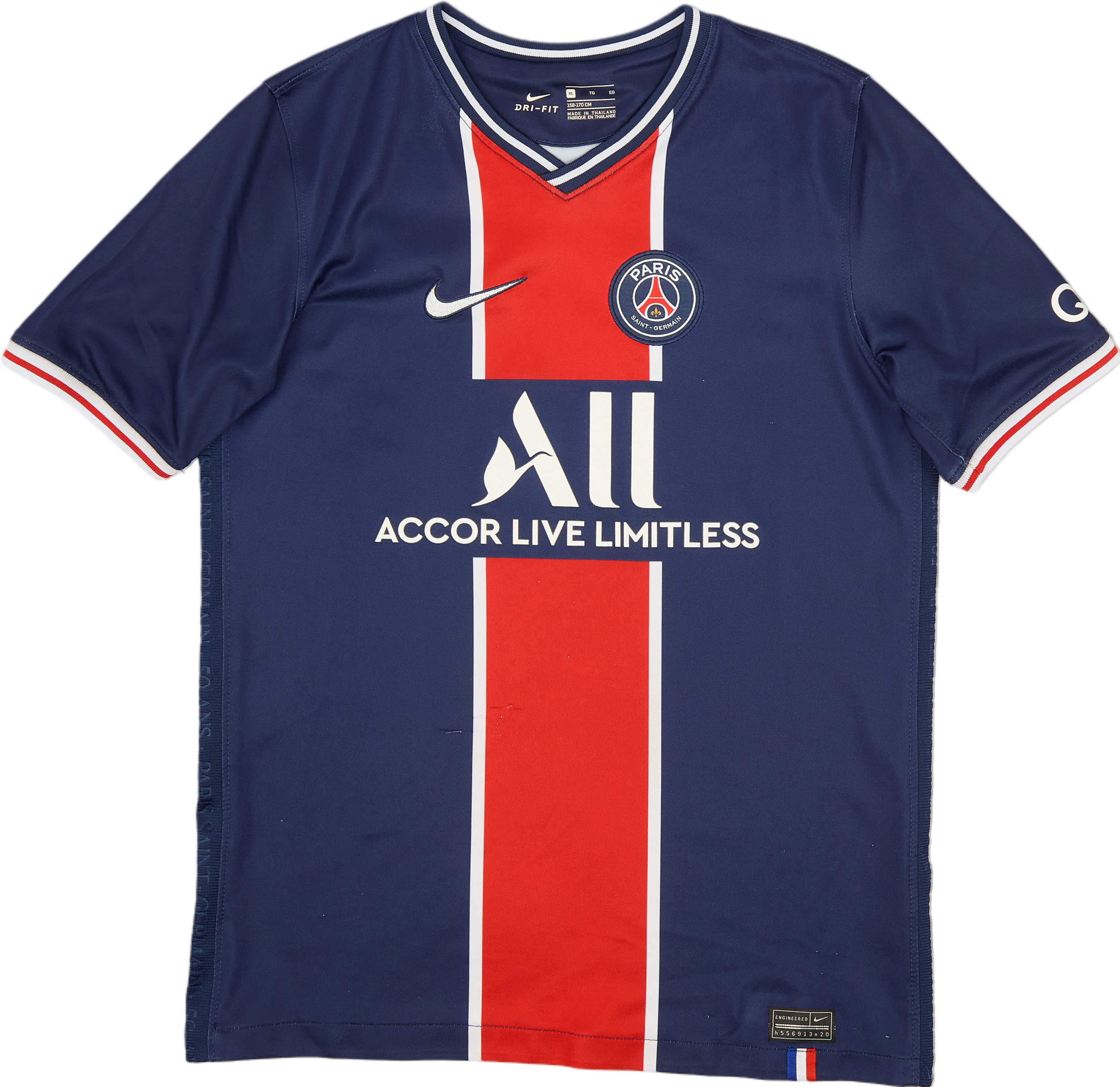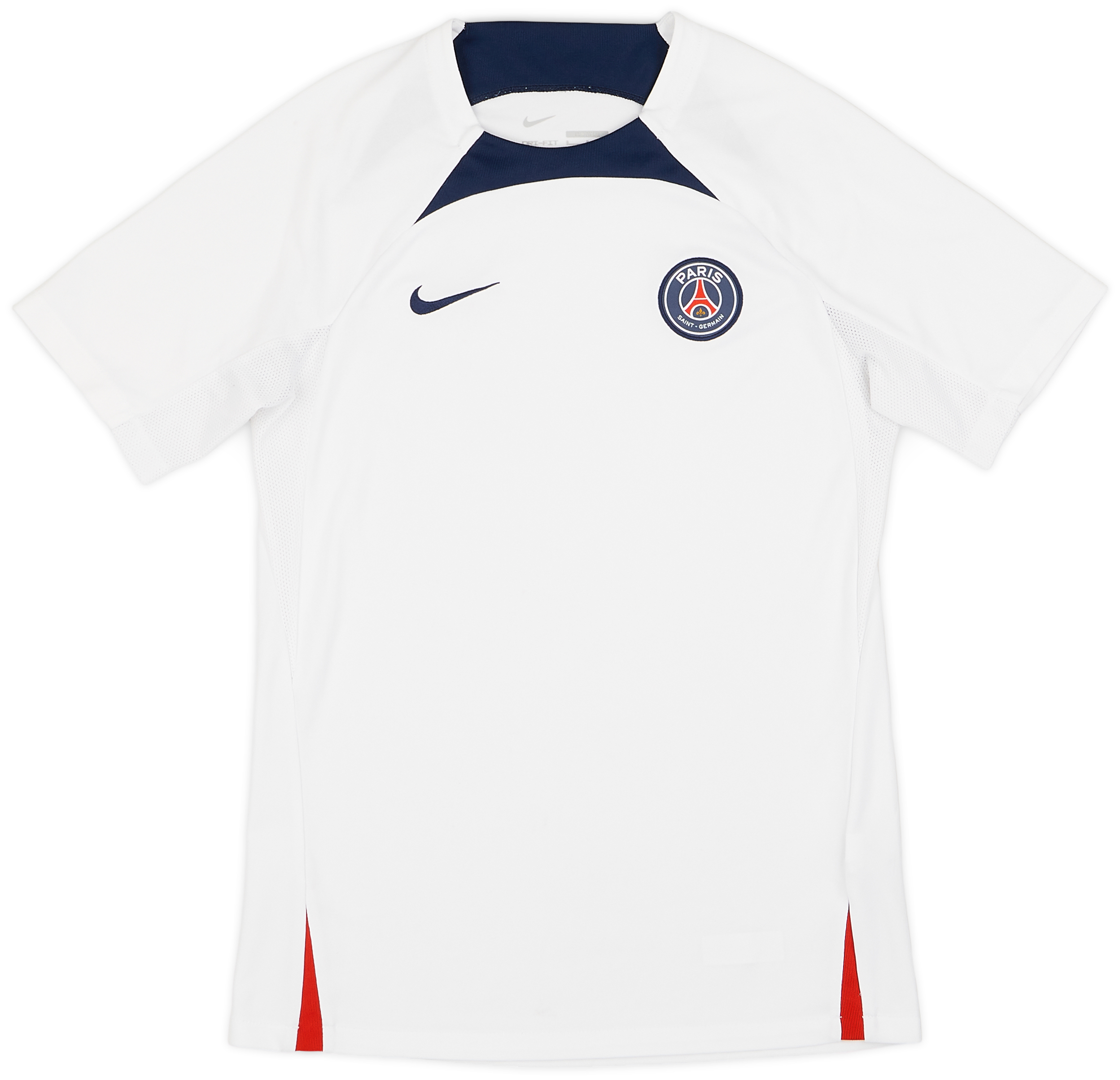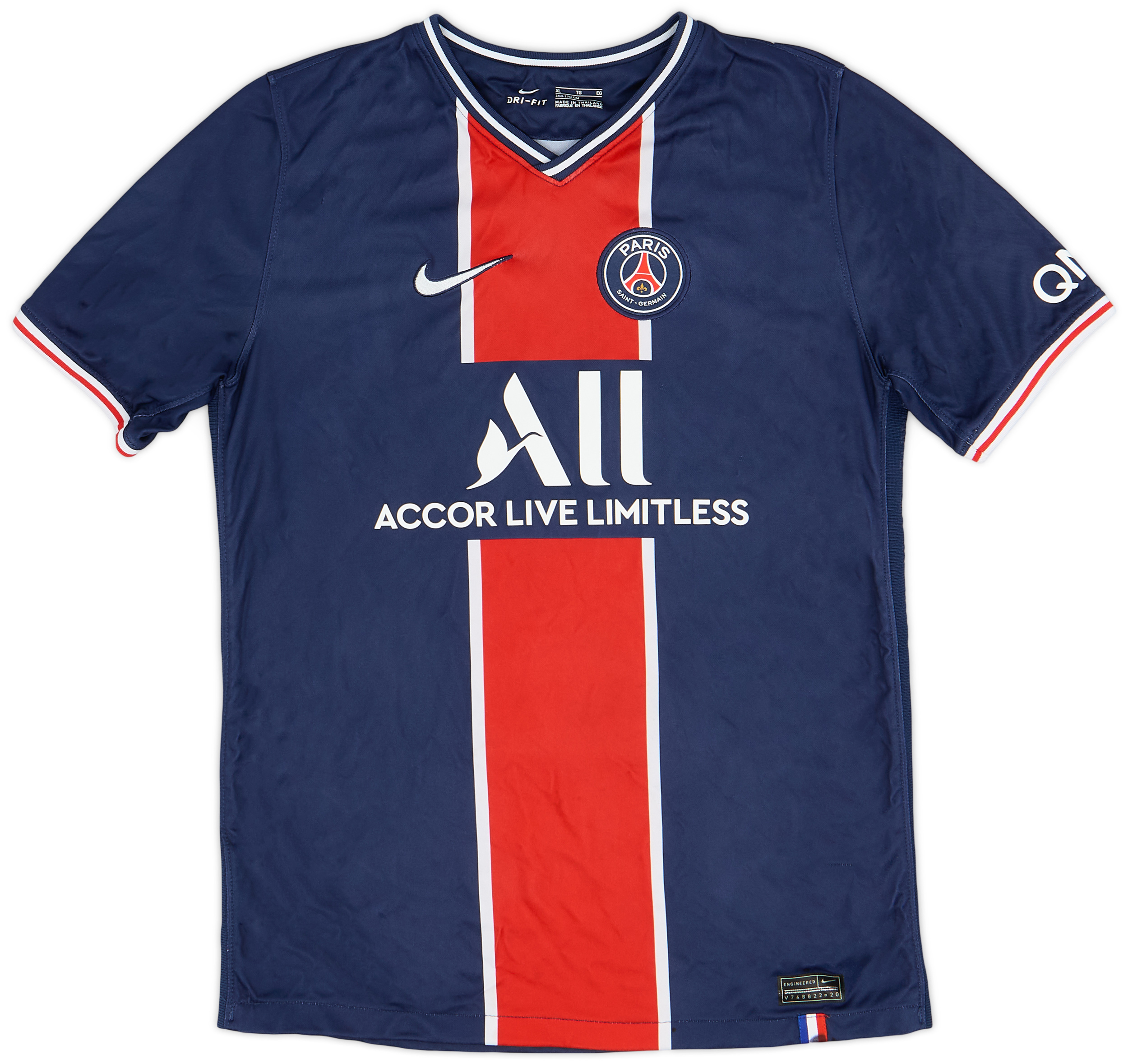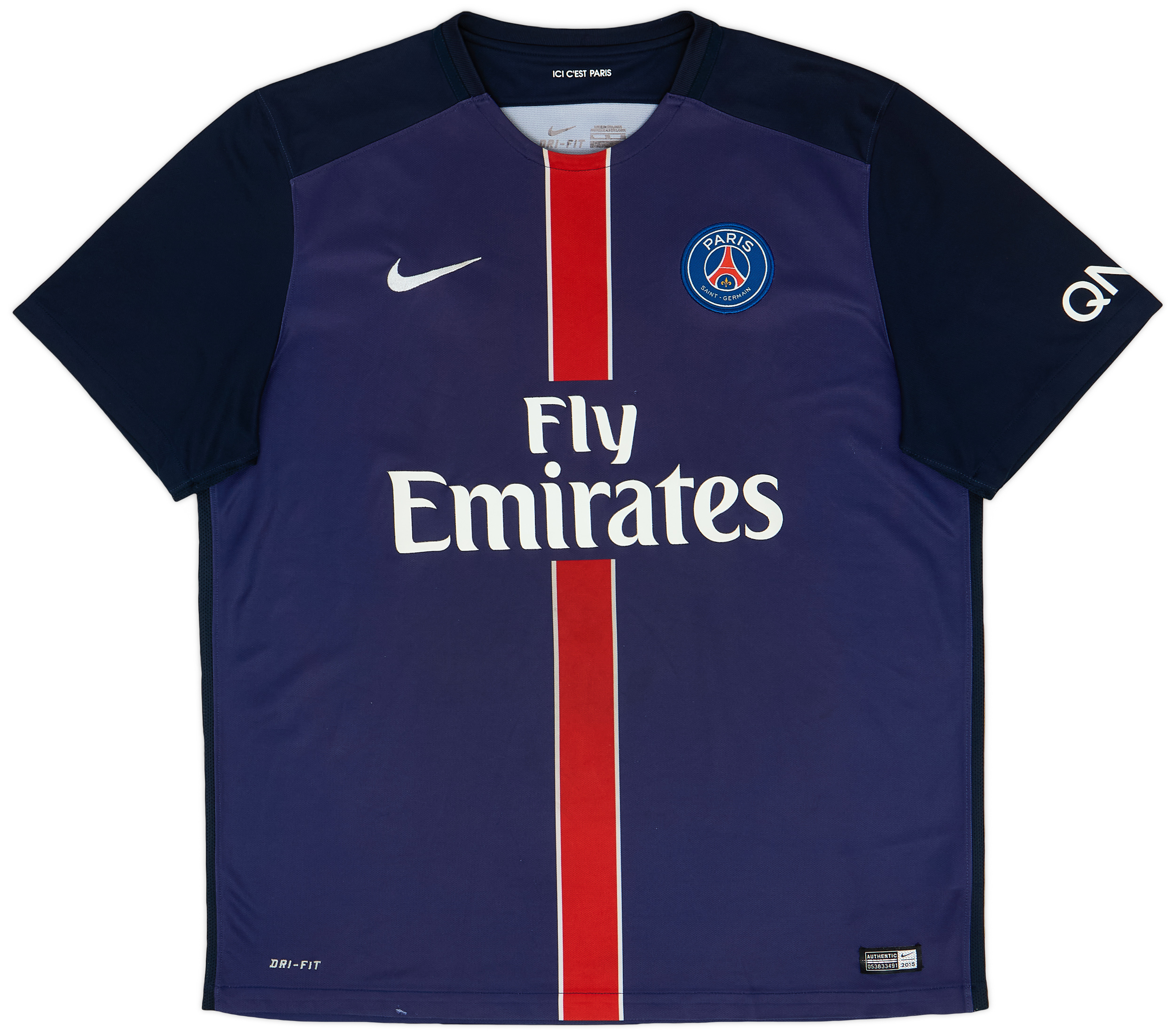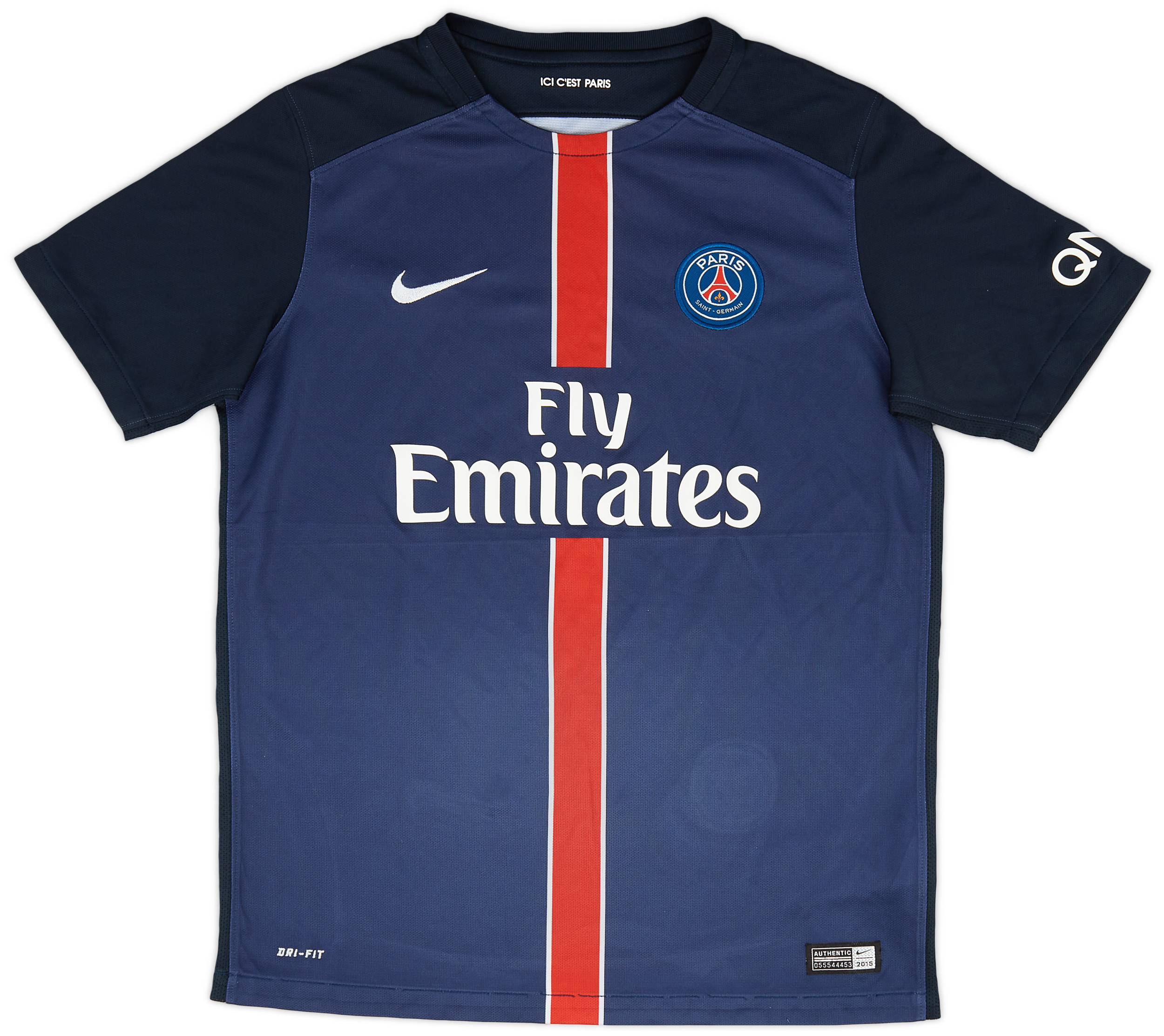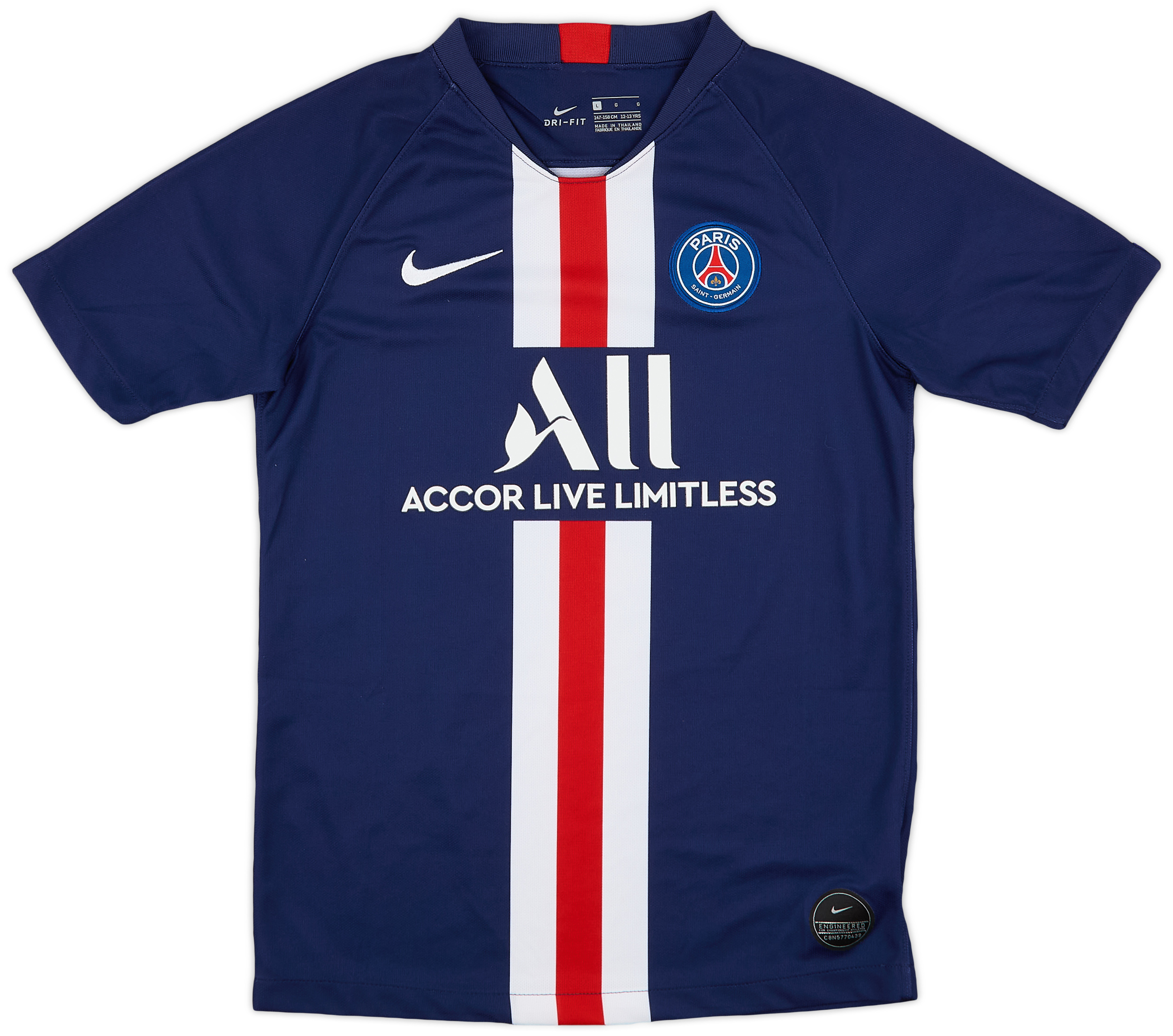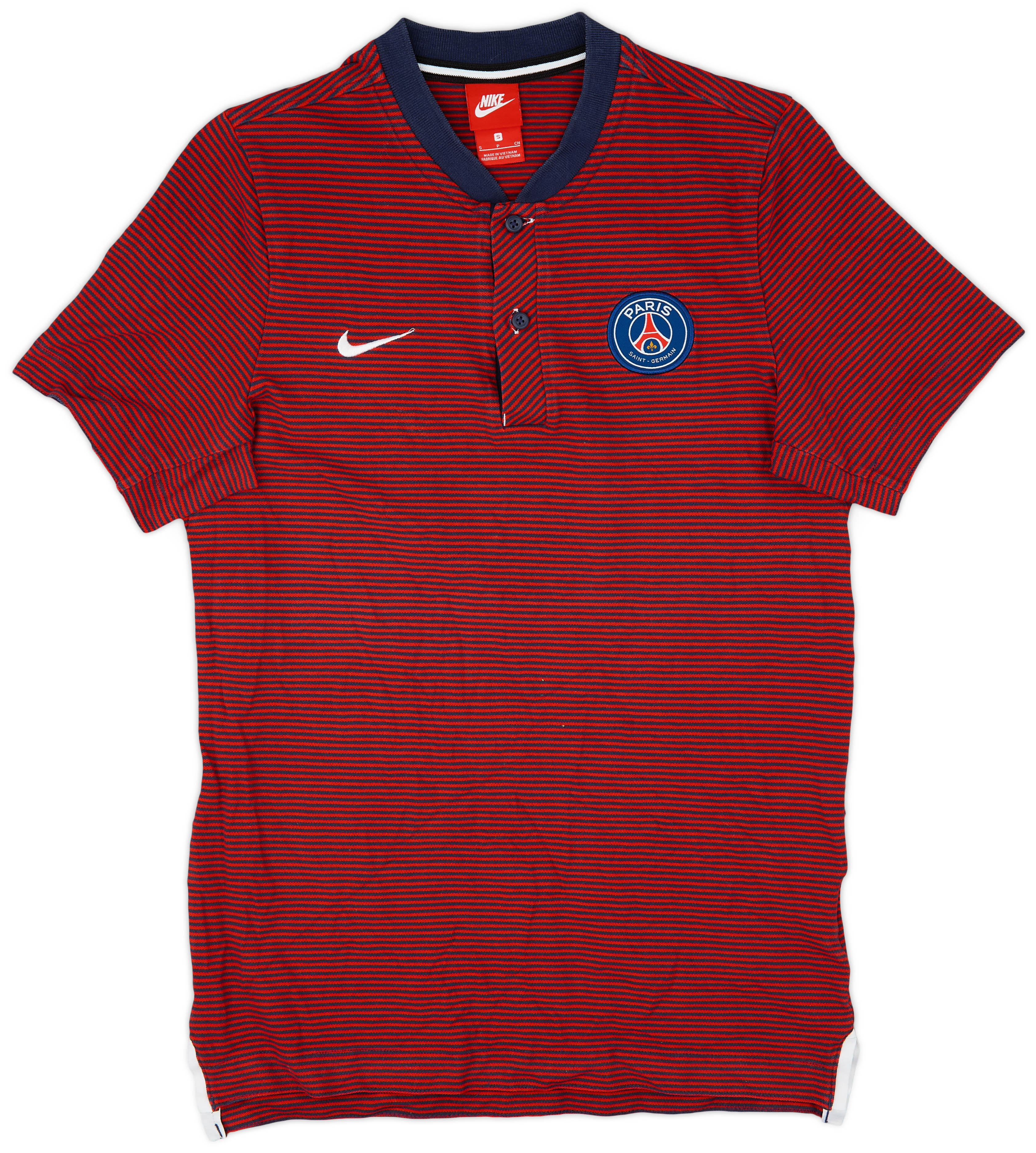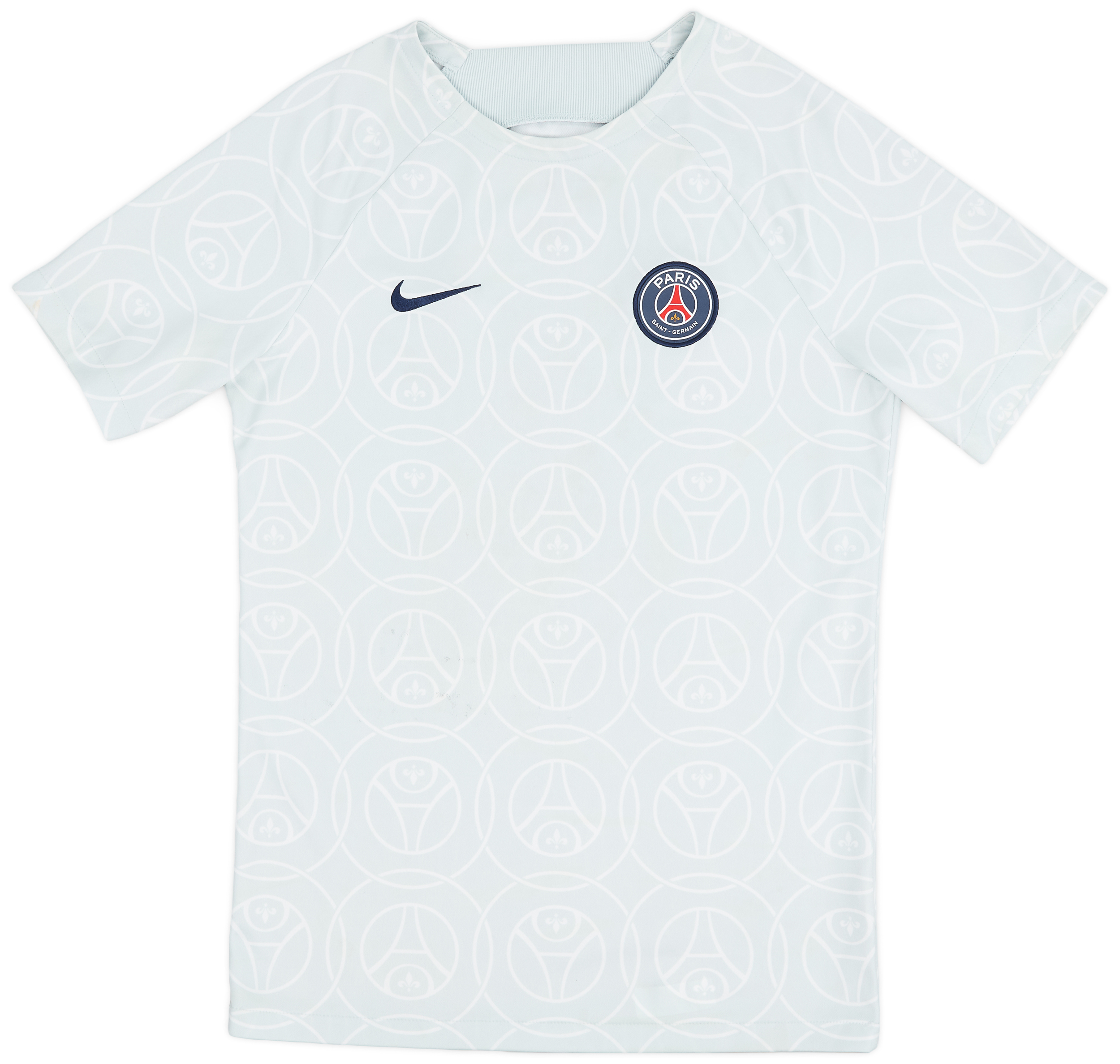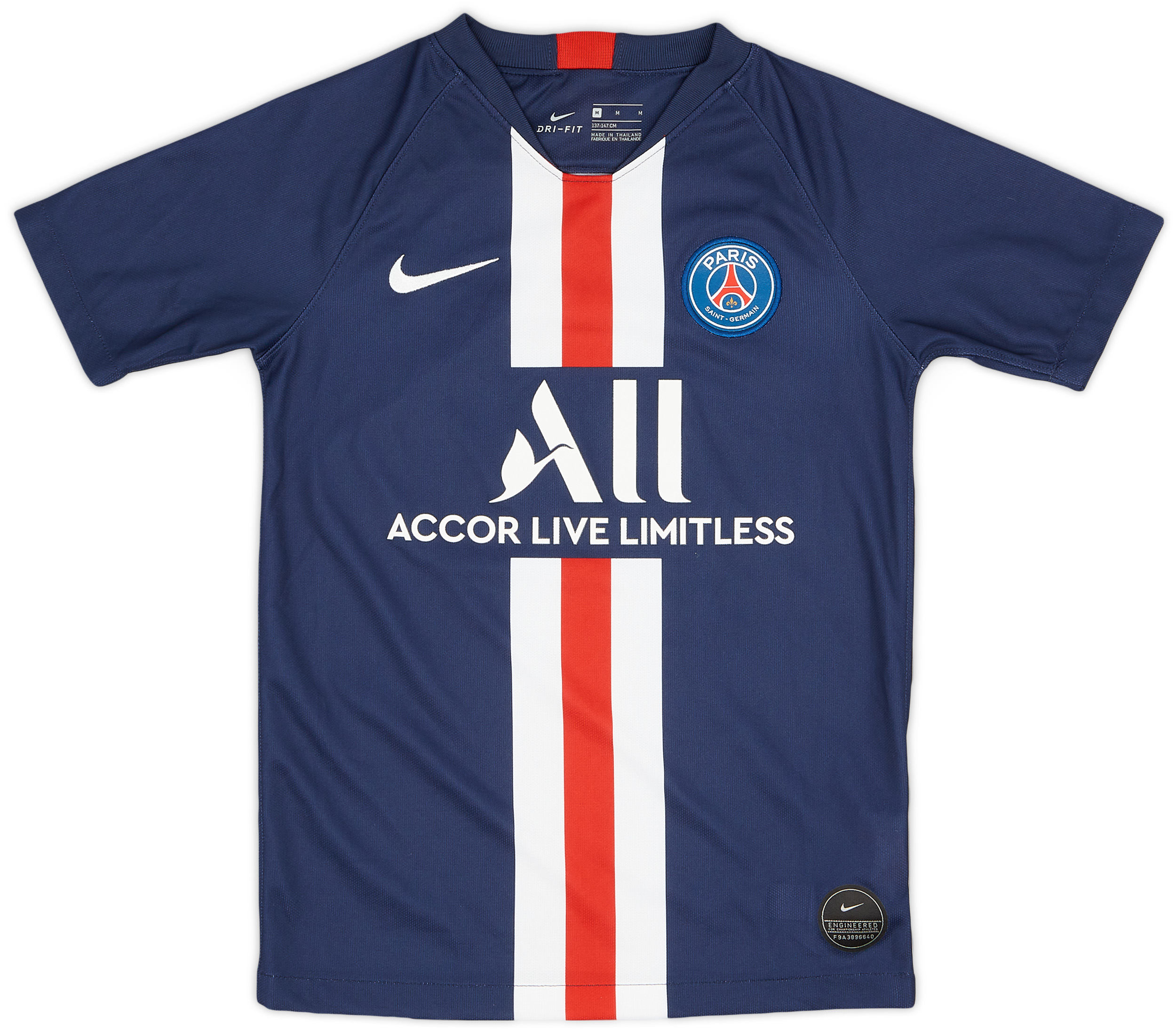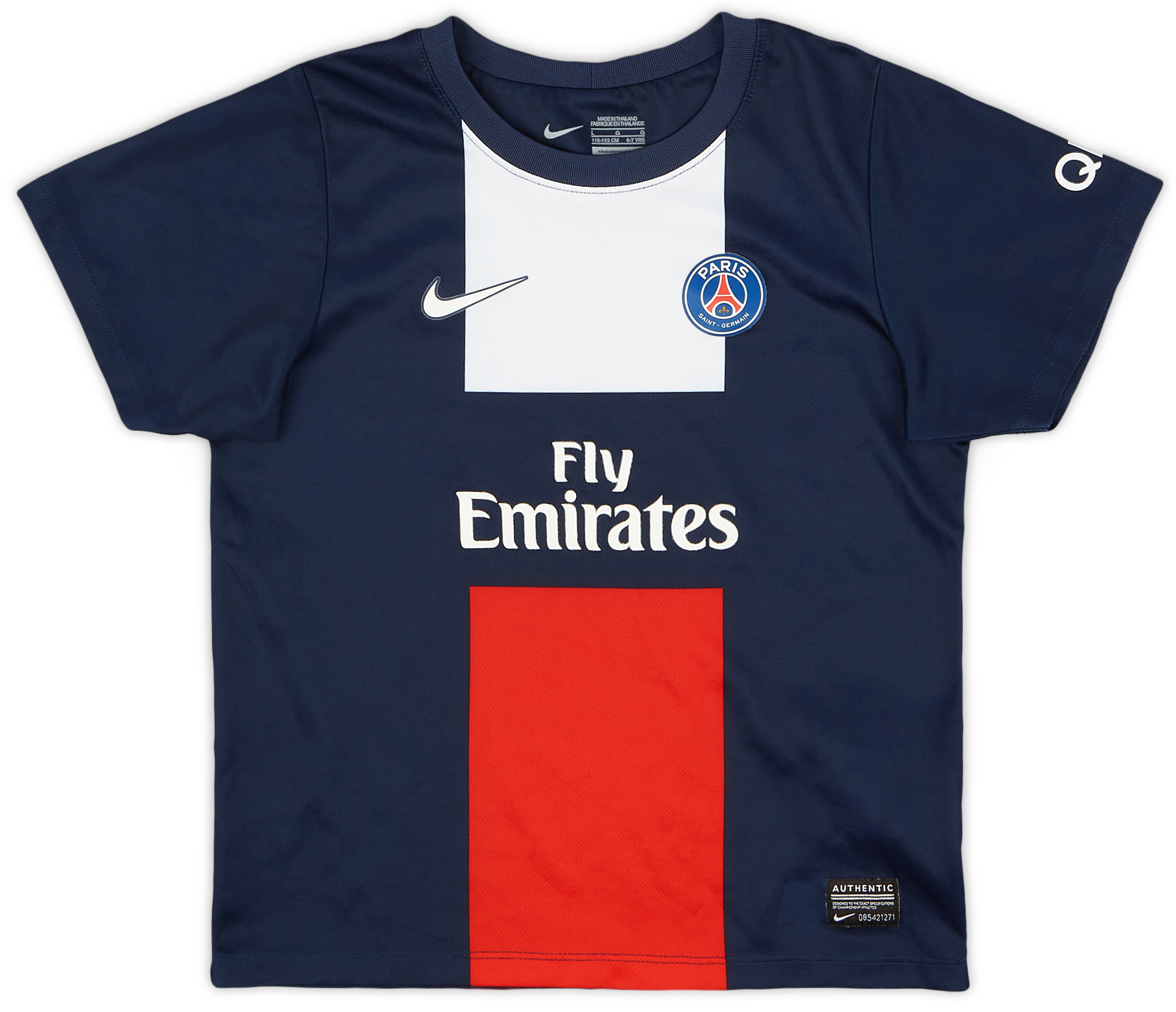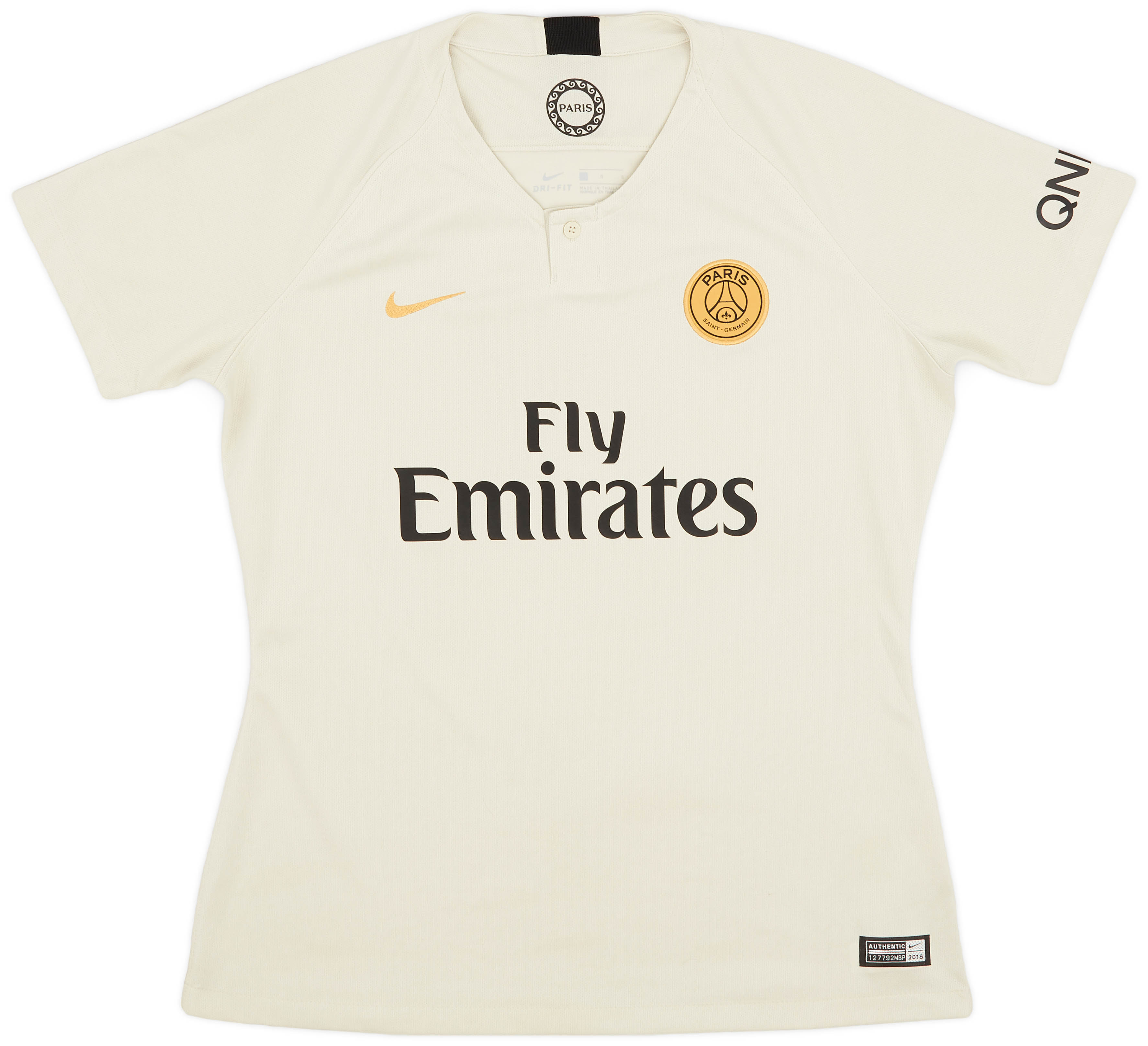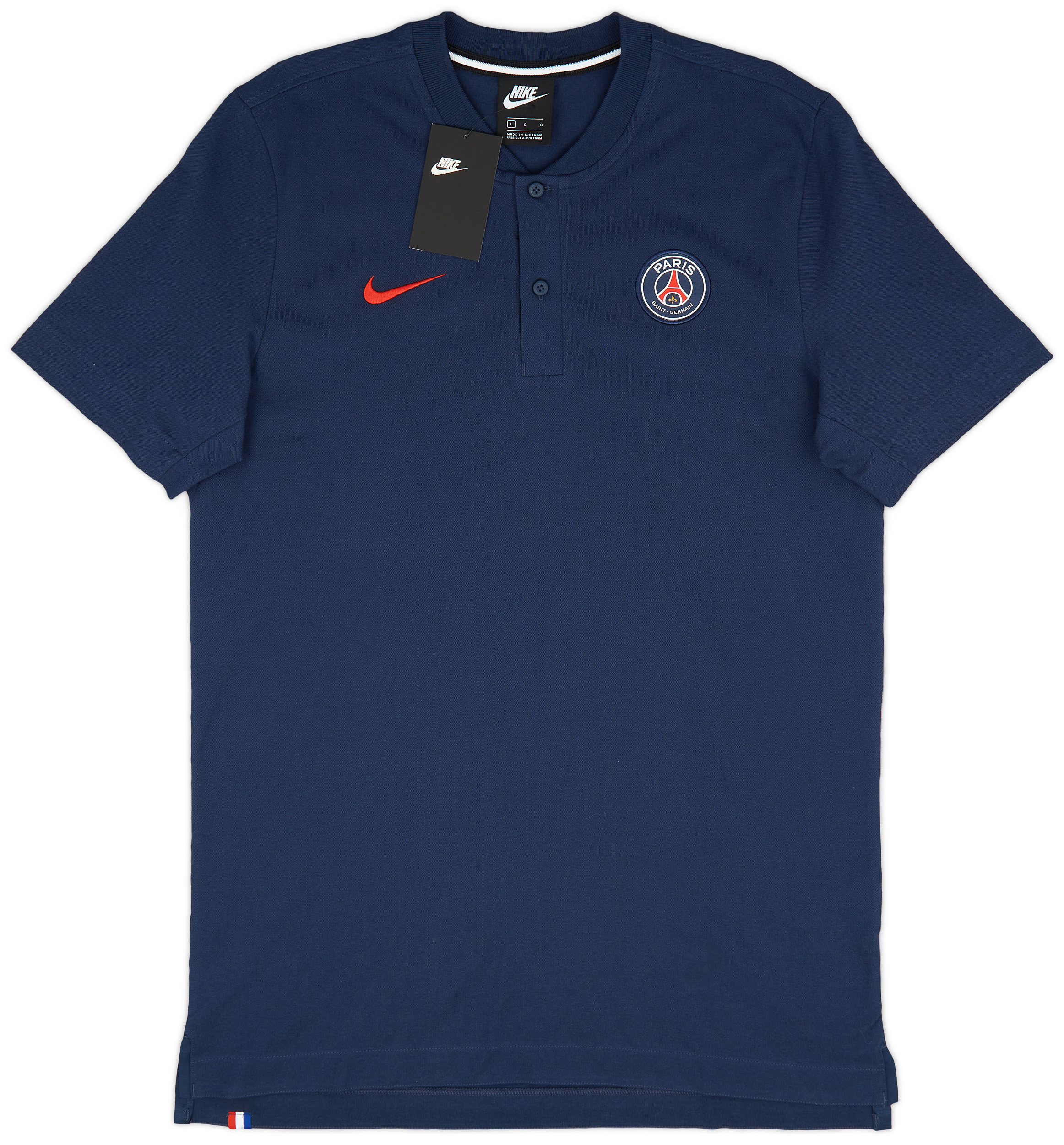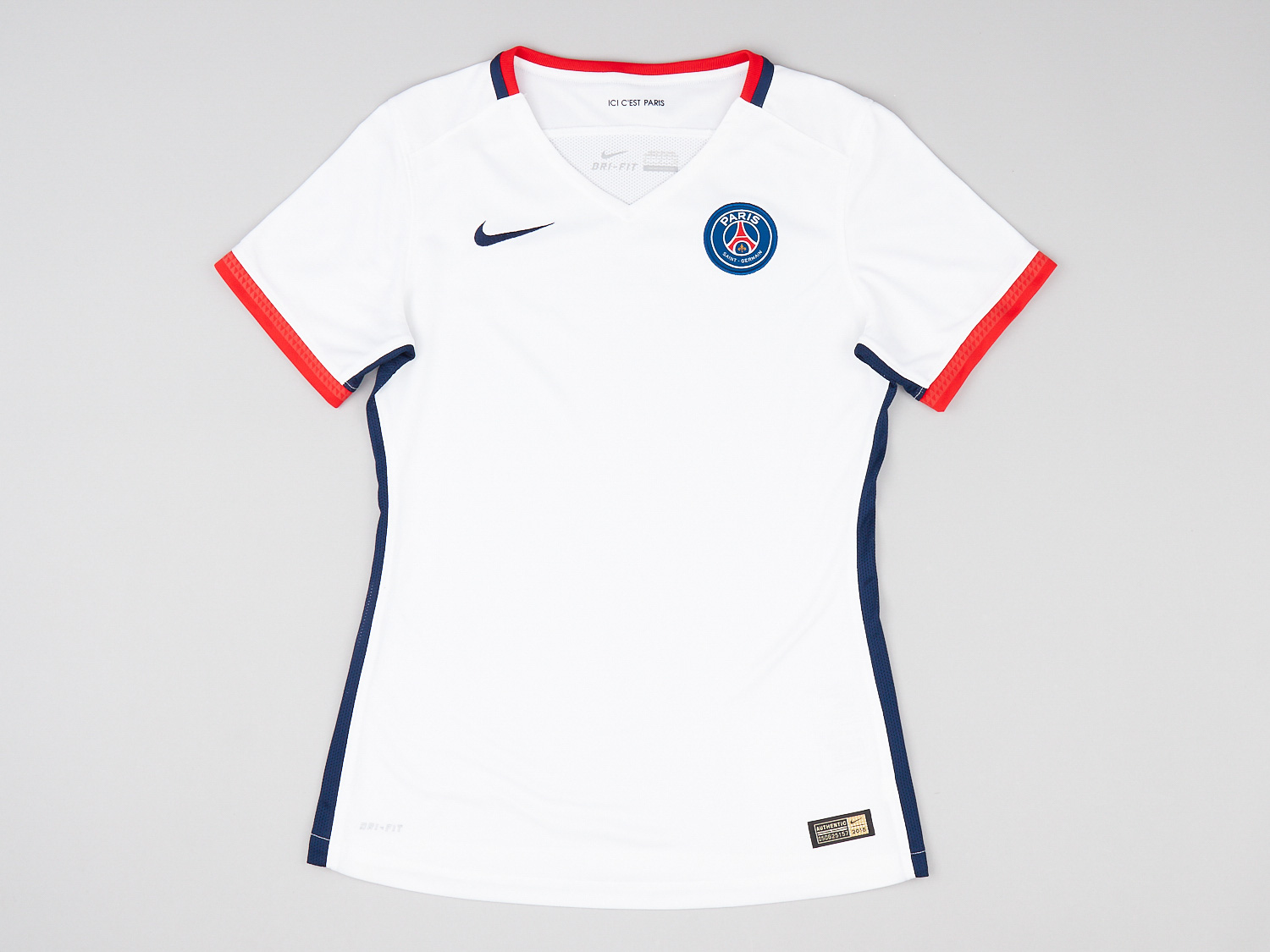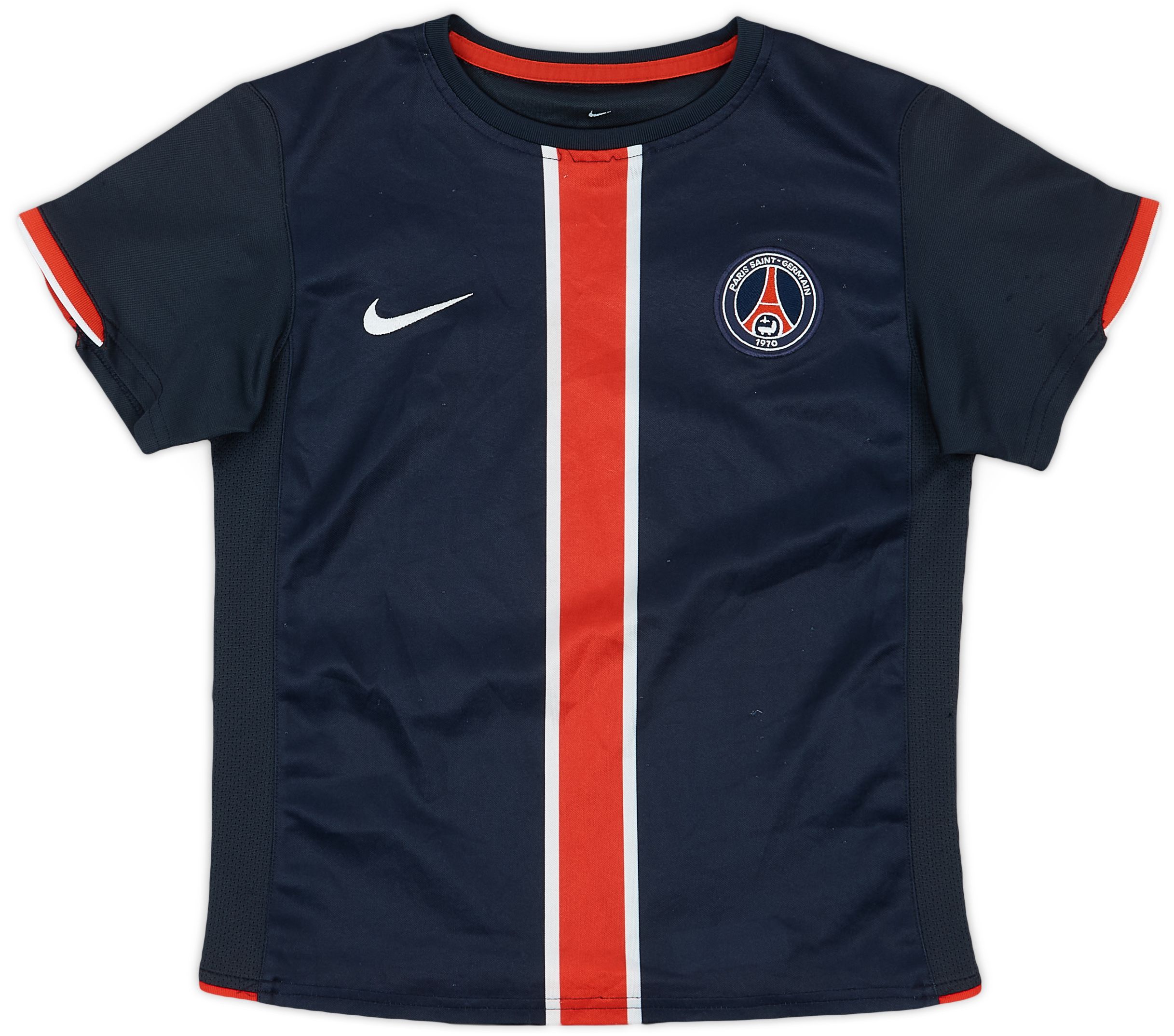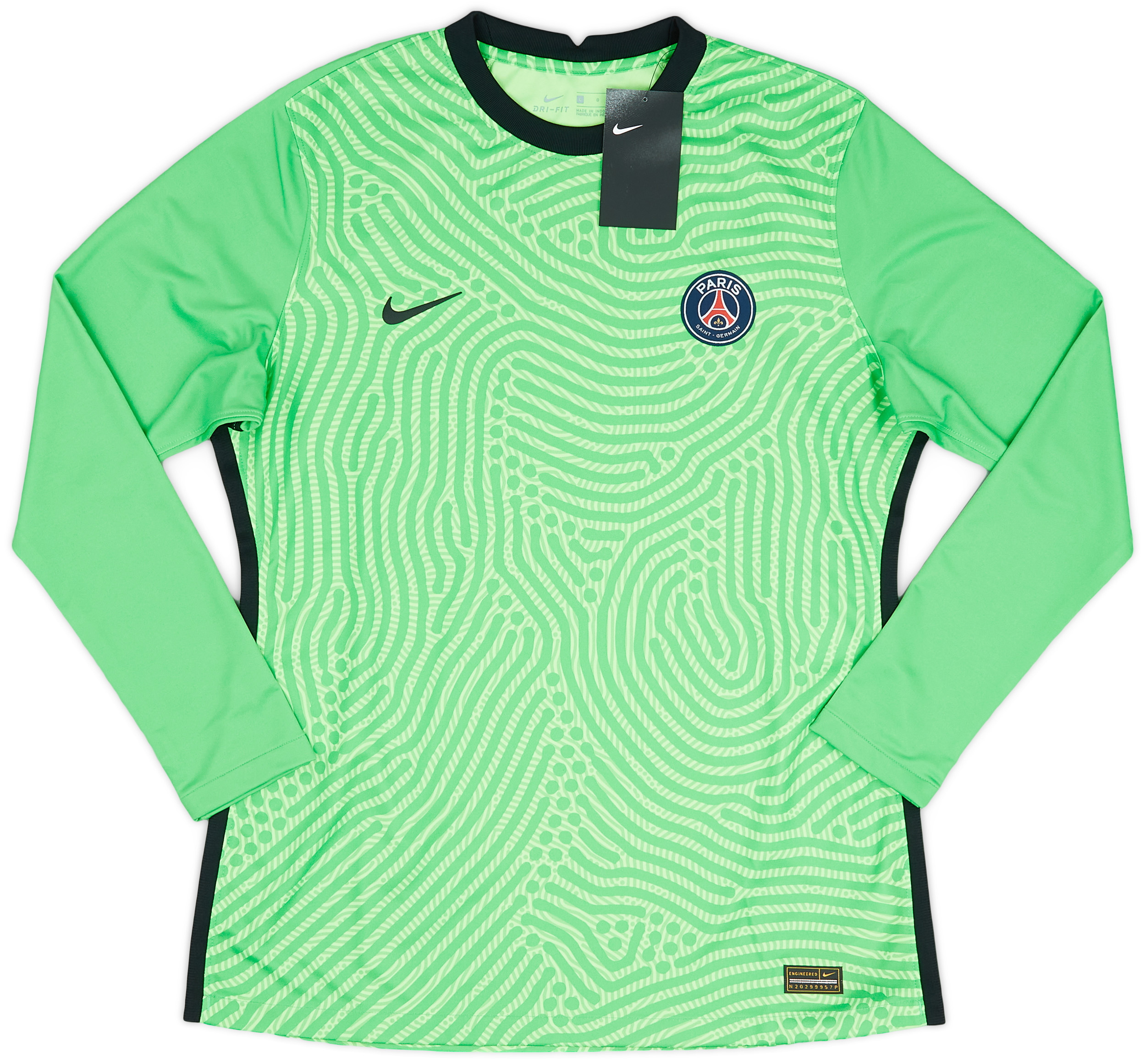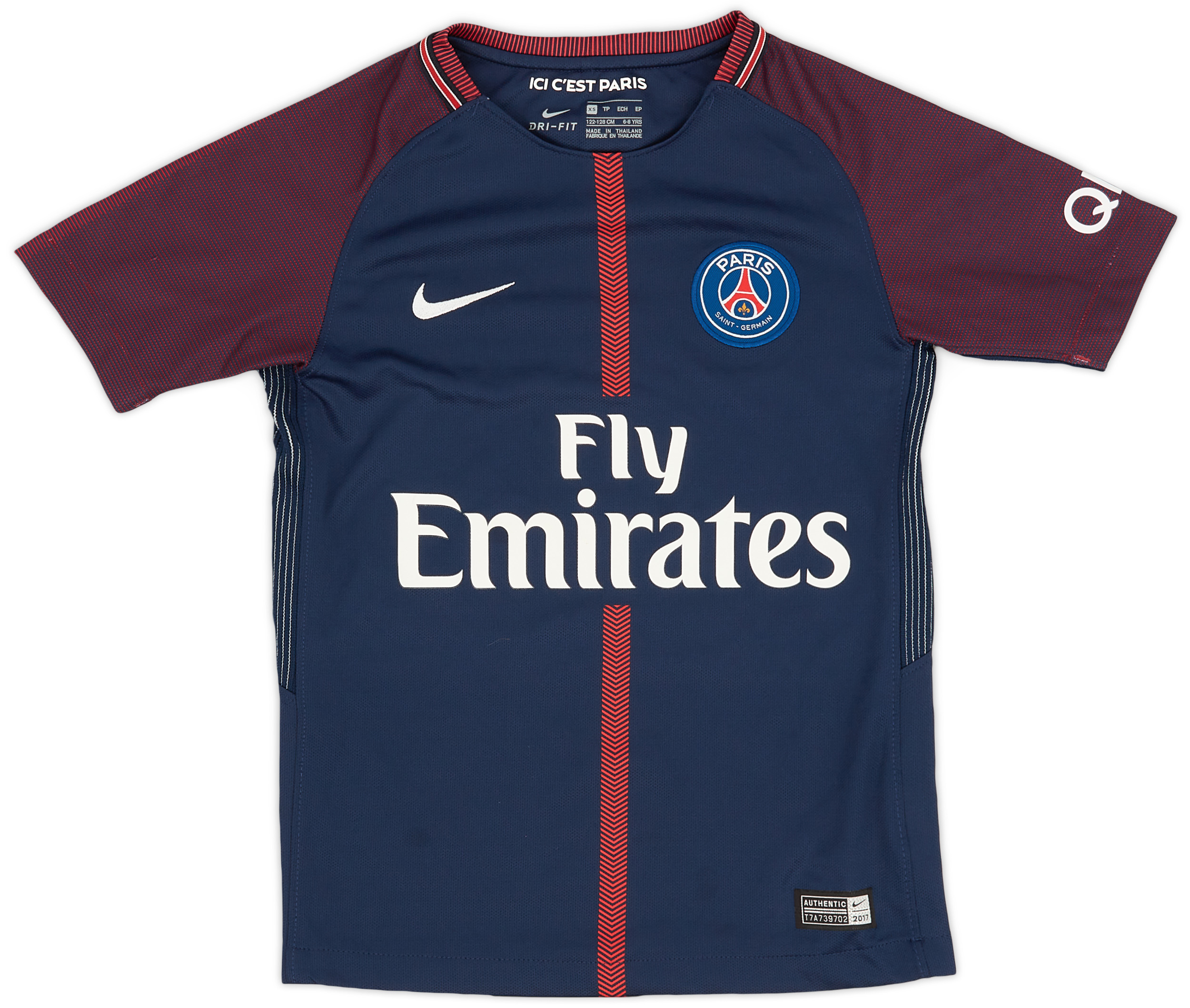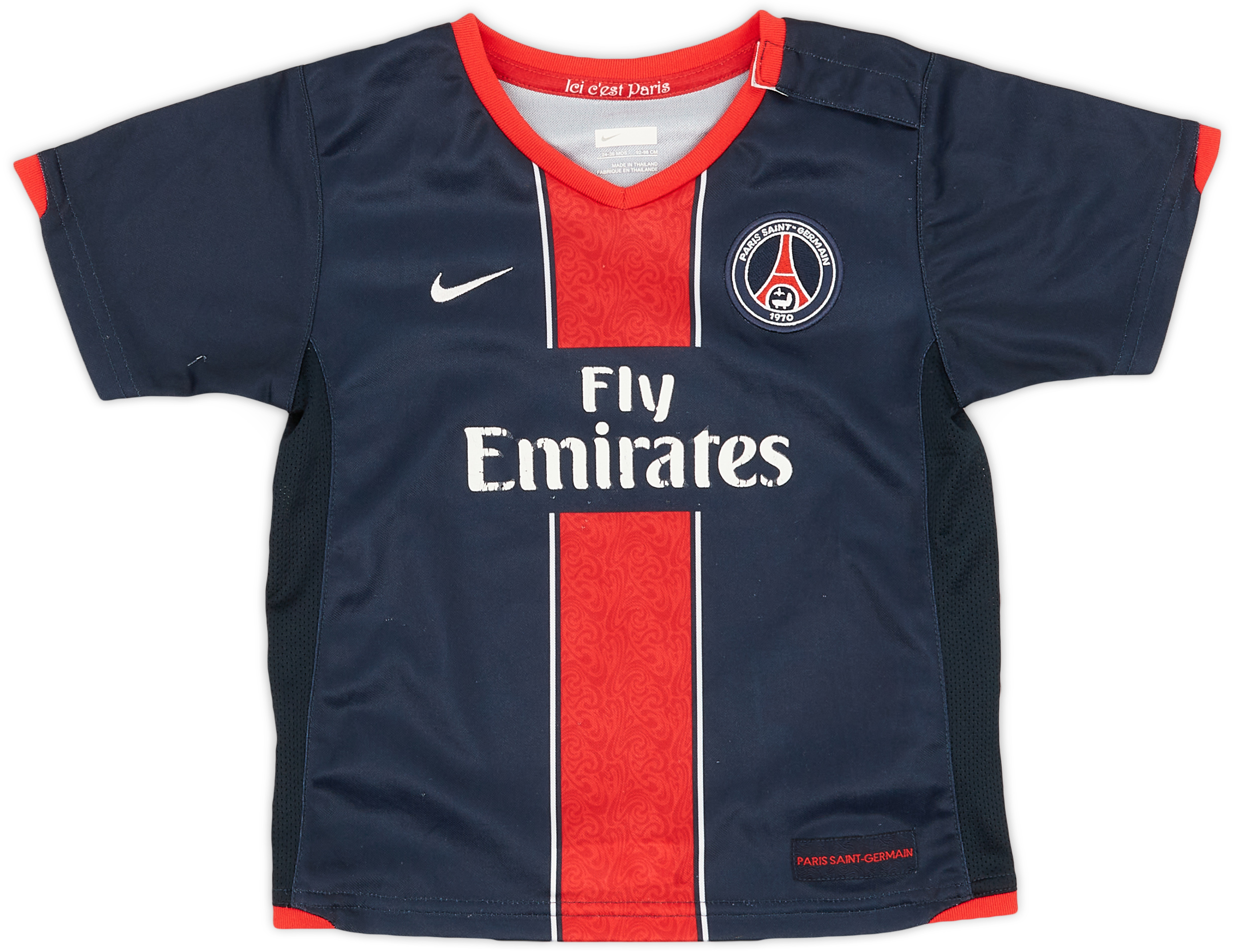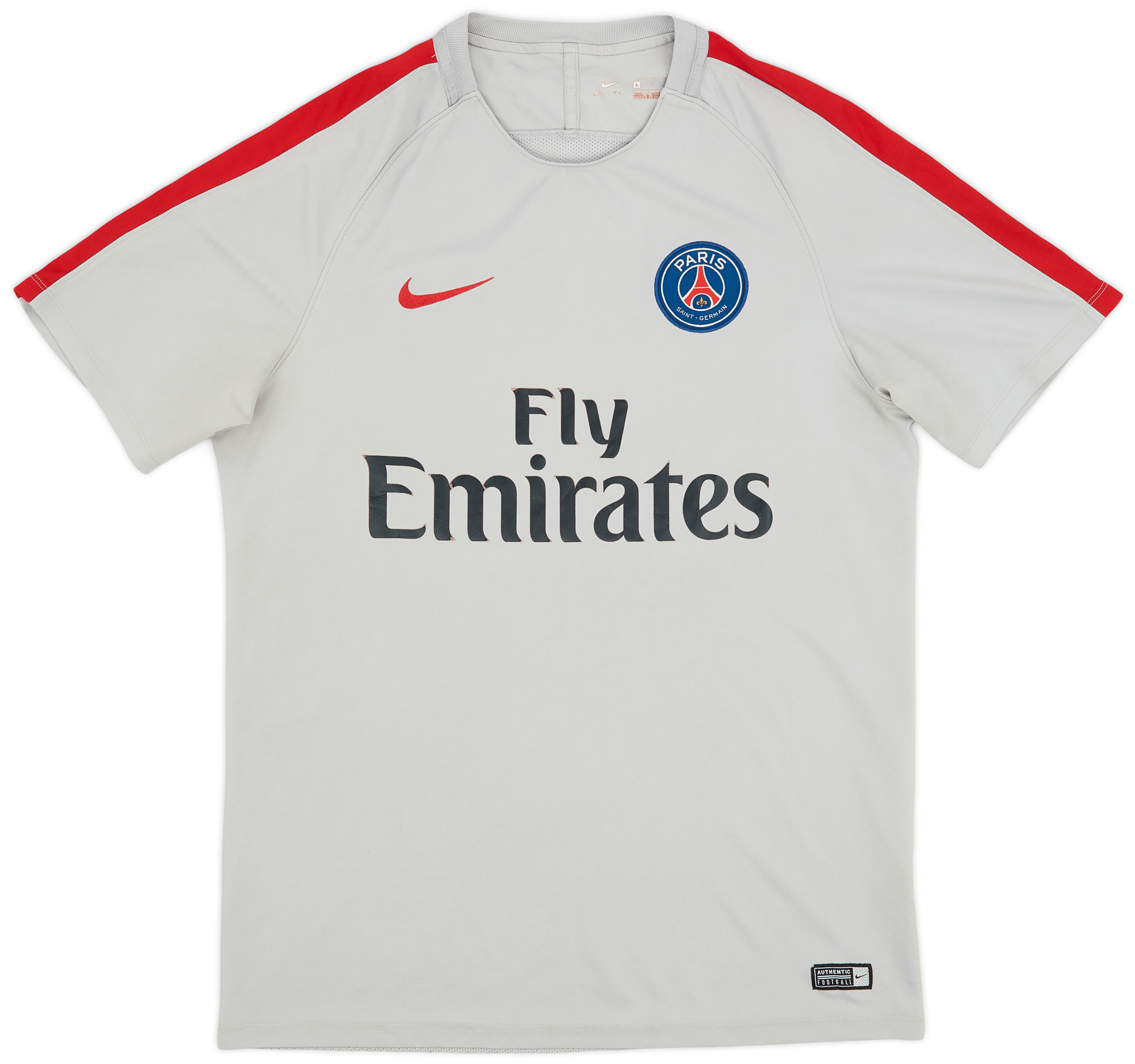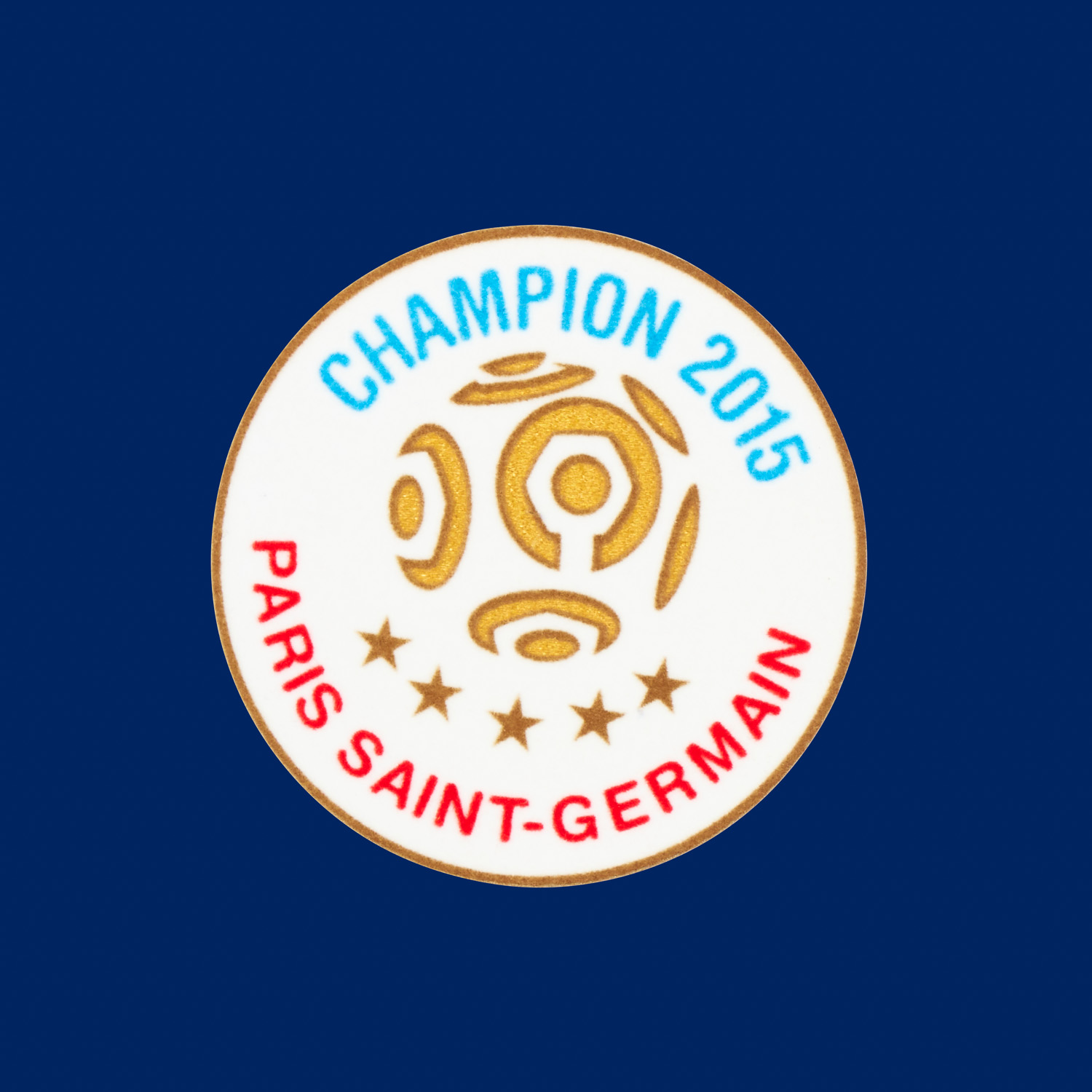Paris Saint-Germain
Introduction Paris Saint-Germain Football Club, commonly known as PSG, is a world-renowned football club based in Paris, France. Established in 1970, PSG has become synonymous with luxury and success, boasting a passionate fan base and a reputation for attracting some of the best talents in football. The club’s emblem, a representation of the Eiffel Tower, […]
2001-02 Paris Saint-Germain Away Shirt Ronaldinho #21 (XL)
475.99£ - ca: €562
1994-95 Paris Saint-Germain Home Shirt - 9/10 - (M)
415.99£ - ca: €491
1999-00 Paris Saint-Germain Player Issue Away Shirt (XL)
415.99£ - ca: €491
2006-07 Paris Saint-Germain Away Shirt Pauleta #9 - 9/10 - (XL)
356.99£ - ca: €421
2000-01 Paris Saint-Germain Home Shirt (XXL)
356.99£ - ca: €421
2006-07 Paris Saint-Germain Away Shirt Pauleta #9 - 9/10 - (L)
356.99£ - ca: €421
1994-95 Paris Saint-Germain Home Shirt - 6/10 - (M)
356.99£ - ca: €421
1995-96 Paris Saint-Germain Home Shirt - 8/10 - (XL)
356.99£ - ca: €421
2006-07 Paris Saint-Germain Away Shirt - 8/10 - (L)
296.99£ - ca: €350
2006-07 Paris Saint-Germain Away Shirt - 8/10 - (S)
296.99£ - ca: €350
2006-07 Paris Saint-Germain Away Shirt Pauleta #9 - 6/10 - (XL)
296.99£ - ca: €350
2001-02 Paris Saint-Germain Player Issue Third Shirt (XL)
296.99£ - ca: €350
2006-07 Paris Saint-Germain Away Shirt - 8/10 - (XXL)
296.99£ - ca: €350
2006-07 Paris Saint-Germain Away Shirt - 8/10 - (XL)
296.99£ - ca: €350
2006-07 Paris Saint-Germain Away Shirt Pauleta #9 - 7/10 - (L)
296.99£ - ca: €350
1995-96 Paris Saint-Germain Home Shirt - 7/10 - (XXL)
296.99£ - ca: €350
1997-98 Paris Saint-Germain Away Shirt - 8/10 - (L)
296.99£ - ca: €350
1997-98 Paris Saint-Germain Home Shirt - 10/10 - (S)
249.99£ - ca: €295
2019-20 Paris Saint-Germain Third Shirt Cavani #9 (XXL)
237.99£ - ca: €281
2005-06 Paris Saint-Germain Home Shirt (L)
237.99£ - ca: €281
2006-07 Paris Saint-Germain Away Shirt Pauleta #9 - 6/10 - (XL)
237.99£ - ca: €281
2008-09 Paris Saint-Germain Player Issue Away L/S Shirt (XL)
237.99£ - ca: €281
2013-14 Paris Saint-Germain Player Issue Home Shirt Beckham #23 - 6/10 - (S)
237.99£ - ca: €281
2005-06 Paris Saint-Germain Home Shirt (L)
237.99£ - ca: €281
1994-95 Paris Saint-Germain Nike Sweat Top - 9/10 - (M)
237.99£ - ca: €281
1998-99 Paris Saint-Germain Home Shirt - 8/10 - (XL)
237.99£ - ca: €281
2013-14 Paris Saint-Germain Home Shirt Beckham #23 - 8/10 - (L)
237.99£ - ca: €281
2003-04 Paris Saint-Germain Home Shirt (L)
237.99£ - ca: €281
2019-20 Paris Saint-Germain Third Shirt Cavani #9 (L)
237.99£ - ca: €281
2008-09 Paris Saint-Germain Player Issue Away L/S Shirt (XL)
237.99£ - ca: €281
2015-16 Paris Saint-Germain Third Shirt (S)
237.99£ - ca: €281
2017-18 Paris Saint-Germain Authentic Home Shirt Neymar Jr #10 - 9/10 - (XL)
226.99£ - ca: €268
2018-19 Paris Saint-Germain Authentic Home Shirt Verratti #6 (S)
226.99£ - ca: €268
2014-15 Paris Saint-Germain Away Shirt T.Silva #2 (L)
226.99£ - ca: €268
2017-18 Paris Saint-Germain Home Shirt Di Maria #11 (S)
207.99£ - ca: €245
1995-96 Paris Saint-Germain Home Shirt - 6/10 - (XS)
207.99£ - ca: €245
2019-20 Paris Saint-Germain Player Issue Home Shirt T.Silva #2 (L)
207.99£ - ca: €245
2001-02 Paris Saint-Germain Player Issue Third Shirt - 8/10 - XL
207.99£ - ca: €245
2019-20 Paris Saint-Germain Third Shirt (S)
207.99£ - ca: €245
2013-14 Paris Saint-Germain Home Shirt Beckham #32 - 8/10 - (S)
207.99£ - ca: €245
2002-03 Paris Saint-Germain Away Shirt - 6/10 - (M)
207.99£ - ca: €245
1995-96 Paris Saint-Germain Nike Padded Bench Coat - 7/10 - (L)
207.99£ - ca: €245
2013-14 Paris Saint-Germain Home Shirt Beckham #32 - 8/10 - (M)
207.99£ - ca: €245
2002-03 Paris Saint-Germain Away Shirt - 7/10 - (XL)
207.99£ - ca: €245
1998-99 Paris Saint-Germain Nike Rain Jacket - 9/10 - (S)
207.99£ - ca: €245
2011-12 Paris Saint-Germain Player Issue Home L/S Shirt - 9/10 - (L)
207.99£ - ca: €245
2013-14 Paris Saint-Germain Home Shirt Beckham #23 - 7/10 - (L)
207.99£ - ca: €245
2019-20 Paris Saint-Germain Player Issue Home Shirt Marquinhos #5 (L)
207.99£ - ca: €245
1998-99 Paris Saint-Germain Home Shirt - 6/10 - (XXL)
207.99£ - ca: €245
2013-14 Paris Saint-Germain Home Shirt Beckham #32 - 9/10 - (S)
207.99£ - ca: €245
2001-02 Paris Saint-Germain Third Shirt Ronaldinho #21 - 6/10 - (XXL)
207.99£ - ca: €245
2007-08 Paris Saint-Germain Home Shirt (L)
207.99£ - ca: €245
1998-99 Paris Saint-Germain Nike Padded Bench Coat - 6/10 - (S)
207.99£ - ca: €245
2015-16 Paris Saint-Germain Authentic Home Shirt (L)
207.99£ - ca: €245
2019-20 Paris Saint-Germain Away L/S Shirt NeymarJr #10 (S)
207.99£ - ca: €245
1998-99 Paris Saint-Germain Nike Track Jacket - 7/10 - (L)
177.99£ - ca: €210
2008-09 Paris Saint-Germain Player Issue Away L/S Shirt - 8/10 - (XL)
177.99£ - ca: €210
2006-07 Paris Saint-Germain Home Shirt - 9/10 - (S)
177.99£ - ca: €210
2012-13 Paris Saint-Germain Away Shirt Beckham #32 - 9/10 - (M)
177.99£ - ca: €210
2013-14 Paris Saint-Germain Home Shirt Beckham #32 - 6/10 - (XL)
177.99£ - ca: €210
2018-19 Paris Saint-Germain Authentic Home Shirt (S)
177.99£ - ca: €210
2021-22 Paris Saint-Germain Authentic Fourth Shirt (L)
177.99£ - ca: €210
2000-01 Paris Saint-Germain Home Shirt - 7/10 - (XL)
177.99£ - ca: €210
2014-15 Paris Saint-Germain Authentic Home Shirt (XL)
177.99£ - ca: €210
2000-01 Paris Saint-Germain Home Shirt - 6/10 - (M)
177.99£ - ca: €210
2008-09 Paris Saint-Germain Player Issue Away L/S Shirt - 8/10 - (XL)
177.99£ - ca: €210
2005-06 Paris Saint-Germain Player Issue GK Shirt - 9/10 - (L)
177.99£ - ca: €210
2019-20 Paris Saint-Germain Home Shirt Mbappe #7 (M)
177.99£ - ca: €210
1999-00 Paris Saint-Germain Away Shirt - 6/10 - (XXL)
177.99£ - ca: €210
2013-14 Paris Saint-Germain Home Shirt Beckham #32 - 7/10 - (M)
177.99£ - ca: €210
2011-12 Paris Saint-Germain Player Issue Home L/S Shirt - 9/10 - (L)
177.99£ - ca: €210
2019-20 Paris Saint-Germain Authentic Away Shirt Cavani #9 (M)
177.99£ - ca: €210
2004-05 Paris Saint-Germain Home Shirt - 8/10 - (M)
177.99£ - ca: €210
2003-04 Paris Saint-Germain Home Shirt (L)
177.99£ - ca: €210
2019-20 Paris Saint-Germain Home Shirt Mbappe #7 (M)
177.99£ - ca: €210
2018-19 Paris Saint-Germain Authentic Home Shirt (S)
177.99£ - ca: €210
2013-14 Paris Saint-Germain Home Shirt Beckham #32 - 6/10 - (L)
177.99£ - ca: €210
1998-99 Paris Saint-Germain Nike Track Jacket - 7/10 - (L)
177.99£ - ca: €210
2013-14 Paris Saint-Germain Home Shirt Beckham #32 - 6/10 - (S)
177.99£ - ca: €210
2019-20 Paris Saint-Germain Authentic Third Shirt - 10/10 - (M)
177.99£ - ca: €210
2003-04 Paris Saint-Germain Home Shirt - 9/10 - (XL)
177.99£ - ca: €210
2000-01 Paris Saint-Germain Home Shirt - 7/10 - (L)
177.99£ - ca: €210
2021-22 Paris Saint-Germain Authentic Fourth Shirt (L)
177.99£ - ca: €210
2012-13 Paris Saint-Germain Away Shirt Beckham #32 - 9/10 - (L)
177.99£ - ca: €210
2014-15 Paris Saint-Germain Third Shirt Ibrahimovic #10 - 8/10 - (S)
177.99£ - ca: €210
2002-03 Paris Saint-Germain Away Shirt - 6/10 - (M)
174.99£ - ca: €206
2009-10 Paris Saint-Germain Player Issue Away Shirt - 9/10 - (XL)
161.99£ - ca: €191
2004-05 Paris Saint-Germain Home Shirt - 7/10 - (S)
161.99£ - ca: €191
2013-14 Paris Saint-Germain Home Shirt Beckham #32 - 7/10 - (M)
149.99£ - ca: €177
2003-04 Paris Saint-Germain Home Shirt - 6/10 - (XL)
148.99£ - ca: €176
2015-16 Paris Saint-Germain Authentic Home Shirt - 8/10 - (L)
148.99£ - ca: €176
2012-13 Paris Saint-Germain Home Shirt Beckham #32 - 7/10 - (S)
148.99£ - ca: €176
2013-14 Paris Saint-Germain Away Shirt - 8/10 - (M)
148.99£ - ca: €176
2019-20 Paris Saint-Germain Away Shirt Icardi #18 - 10/10 - (L)
148.99£ - ca: €176
2019-20 Paris Saint-Germain Home Shirt Mbappe #7 (L)
148.99£ - ca: €176
2019-20 Paris Saint-Germain Away Shirt Neymar Jr #10 (S)
148.99£ - ca: €176
2004-05 Paris Saint-Germain Home Shirt - 7/10 - (M)
148.99£ - ca: €176
2018-19 Paris Saint-Germain Home Shirt Verratti #6 (XXL)
148.99£ - ca: €176
2013-14 Paris Saint-Germain Authentic GK Shirt - 9/10 - (L)
148.99£ - ca: €176
2018-19 Paris Saint-Germain Home Shirt (S)
148.99£ - ca: €176
2014-15 Paris Saint-Germain Authentic GK Shirt - 10/10 - (M)
148.99£ - ca: €176
2019-20 Paris Saint-Germain Away Shirt Cavani #9 (M)
148.99£ - ca: €176
2004-05 Paris Saint-Germain Home Shirt - 6/10 - (XXL)
148.99£ - ca: €176
2003-04 Paris Saint-Germain Home Shirt - 6/10 - (L)
148.99£ - ca: €176
2013-14 Paris Saint-Germain Away Shirt - 8/10 - (S)
148.99£ - ca: €176
2019-20 Paris Saint-Germain Authentic Fourth Shirt - 9/10 - (XS)
148.99£ - ca: €176
2009-10 Paris Saint-Germain Away Shirt - 10/10 - (XL)
148.99£ - ca: €176
2013-14 Paris Saint-Germain Away Shirt - 8/10 - (XXL)
148.99£ - ca: €176
2015-16 Paris Saint-Germain Player Issue Away Shirt - 7/10 - (L)
148.99£ - ca: €176
2019-20 Paris Saint-Germain Away Shirt Icardi #18 - 10/10 - (M)
148.99£ - ca: €176
2019-20 Paris Saint-Germain Third Shirt Mbappe #7 - 8/10 - (S)
148.99£ - ca: €176
2005-06 Paris Saint-Germain Away Shirt - 9/10 - (M)
148.99£ - ca: €176
2018-19 Paris Saint-Germain Third/Home Shirt Cavani #9 - 9/10 - (S)
148.99£ - ca: €176
2019-20 Paris Saint-Germain Fourth Shirt Neymar Jr #10 - 8/10 - (S)
148.99£ - ca: €176
2014-15 Paris Saint-Germain Away Shirt Cavani #9 - 9/10 - (M)
148.99£ - ca: €176
2021-22 Paris Saint-Germain Fourth Shirt (S)
148.99£ - ca: €176
2012-13 Paris Saint-Germain Home Shirt Beckham #32 - 7/10 - (S)
148.99£ - ca: €176
2014-15 Paris Saint-Germain Player Issue Away Shirt Cavani #9 - 9/10 - (M)
148.99£ - ca: €176
2019-20 Paris Saint-Germain Away Shirt Mbappe #7 (M)
148.99£ - ca: €176
2020-21 Paris Saint-Germain Player Issue Vaporknit Away Shirt - 10/10 - (S)
148.99£ - ca: €176
2015-16 Paris Saint-Germain Authentic Home Shirt - 8/10 - (L)
148.99£ - ca: €176
2019-20 Paris Saint-Germain Fourth Shirt Mbappe #7 - 9/10 - (S)
148.99£ - ca: €176
2012-13 Paris Saint-Germain Home Shirt - 9/10 - (XL)
148.99£ - ca: €176
2003-04 Paris Saint-Germain Home Shirt - 6/10 - (S)
148.99£ - ca: €176
2019-20 Paris Saint-Germain Fourth Shirt Mbappe #7 - 8/10 - (L)
148.99£ - ca: €176
2010-11 Paris Saint-Germain Player Issue Home Shirt (M)
148.99£ - ca: €176
2019-20 Paris Saint-Germain Home Shirt Mbappe #7 - 8/10 - (M)
129.99£ - ca: €153
2018-19 Paris Saint-Germain Away Shirt Mbappe #7 - 9/10 - (L)
129.99£ - ca: €153
2012-13 Paris Saint-Germain Home Shirt Beckham #32 (S)
118.99£ - ca: €140
2019-20 Paris Saint-Germain Fourth Shirt - 8/10 - (S)
118.99£ - ca: €140
2019-20 Paris Saint-Germain Fourth Shirt - 8/10 - (S)
118.99£ - ca: €140
2014-15 Paris Saint-Germain Authentic Home Shirt - 8/10 - (M)
118.99£ - ca: €140
2019-20 Paris Saint-Germain Fourth Shirt - 9/10 - (S)
118.99£ - ca: €140
2020-21 Paris Saint-Germain Player Issue Vaporknit Home Shirt
118.99£ - ca: €140
2016-17 Paris Saint-Germain Authentic Home Shirt (S)
118.99£ - ca: €140
2008-09 Paris Saint-Germain Away Shirt - 8/10 - (S)
118.99£ - ca: €140
2018-19 Paris Saint-Germain Authentic Home Shirt - 9/10 - (S)
118.99£ - ca: €140
2012-13 Paris Saint-Germain Home Shirt - 7/10 - (S)
118.99£ - ca: €140
2007-08 Paris Saint-Germain Away Shirt - 8/10 - (S)
118.99£ - ca: €140
2019-20 Paris Saint-Germain Away Shirt Mbappe #7 - 9/10 - (XXL)
118.99£ - ca: €140
2008-09 Paris Saint-Germain Home Shirt - 9/10 - (S)
118.99£ - ca: €140
2007-08 Paris Saint-Germain Away Shirt - 9/10 - (L)
118.99£ - ca: €140
2013-14 Paris Saint-Germain Away Shirt - 7/10 - (XXL)
118.99£ - ca: €140
2005-06 Paris Saint-Germain GK Shirt Alonzo #16 - 6/10 - (L)
118.99£ - ca: €140
2016-17 Paris Saint-Germain Authentic Home Shirt (XL)
118.99£ - ca: €140
2015-16 Paris Saint-Germain Away Shirt Verratti #6 - 9/10 - (M)
118.99£ - ca: €140
2019-20 Paris Saint-Germain Away Shirt Mbappe #7 - 9/10 - (S)
118.99£ - ca: €140
2019-20 Paris Saint-Germain Away Shirt Mbappe #7 - 9/10 - (S)
118.99£ - ca: €140
2018-19 Paris Saint-Germain Away Shirt Mbappe #7 - 8/10 - (XXL)
118.99£ - ca: €140
2010-12 Paris Saint-Germain '40 ANS' Home/Third Shirt - 8/10 - (XL)
118.99£ - ca: €140
2019-20 Paris Saint-Germain Authentic Home Shirt - 8/10 - (M)
118.99£ - ca: €140
2019-20 Paris Saint-Germain Authentic Fourth Shirt - 6/10 - (M)
118.99£ - ca: €140
2019-20 Paris Saint-Germain Home Shirt Mbappe #7 - 8/10 - (XXL)
118.99£ - ca: €140
2020-21 Paris Saint-Germain Player Issue Vaporknit Home Shirt (XL)
118.99£ - ca: €140
2019-20 Paris Saint-Germain Away Shirt Mbappe #7 - 9/10 - (S)
118.99£ - ca: €140
2019-20 Paris Saint-Germain Fourth Shirt - 9/10 - (S)
118.99£ - ca: €140
2007-08 Paris Saint-Germain Home Shirt - 8/10 - (M)
118.99£ - ca: €140
2019-20 Paris Saint-Germain Away Shirt Mbappe #7 - 9/10 - (L)
118.99£ - ca: €140
2020-21 Paris Saint-Germain x Air Jordan Player Issue Vaporknit Third Shirt
118.99£ - ca: €140
2019-20 Paris Saint-Germain Fourth Shirt - 8/10 - (S)
118.99£ - ca: €140
2016-17 Paris Saint-Germain Authentic Home Shirt (S)
118.99£ - ca: €140
2019-20 Paris Saint-Germain Fourth Shirt - 8/10 - (S)
118.99£ - ca: €140
2019-20 Paris Saint-Germain Away Shirt Mbappe #7 - 9/10 - (L)
118.99£ - ca: €140
2020-21 Paris Saint-Germain Away Shirt (M)
118.99£ - ca: €140
2019-20 Paris Saint-Germain Authentic Third Shirt - 6/10 - (S)
118.99£ - ca: €140
2019-20 Paris Saint-Germain Authentic Fourth Shirt - 9/10 - (XS)
118.99£ - ca: €140
2019-20 Paris Saint-Germain Away Shirt Mbappe #7 - 8/10 - (M)
118.99£ - ca: €140
2019-20 Paris Saint-Germain Away Shirt Mbappe #7 - 9/10 - (S)
118.99£ - ca: €140
1997-98 Paris Saint-Germain Nike Training Shirt - 8/10 - (L)
118.99£ - ca: €140
2019-20 Paris Saint-Germain Fourth Shirt - 9/10 - (XS)
118.99£ - ca: €140
2018-19 Paris Saint-Germain Away Shirt Mbappe #7 - 8/10 - (L)
118.99£ - ca: €140
2007-08 Paris Saint-Germain Away Shirt - 8/10 - (XL)
118.99£ - ca: €140
2010-11 Paris Saint-Germain GK Shirt - 9/10 - (M)
118.99£ - ca: €140
2014-15 Paris Saint-Germain Authentic GK Shirt (M)
118.99£ - ca: €140
2005-06 Paris Saint-Germain Home Shirt - 9/10 - (S)
118.99£ - ca: €140
2019-20 Paris Saint-Germain Away L/S Shirt Mbappe #7 - 7/10 - (M)
118.99£ - ca: €140
2000-01 Paris Saint-Germain Player Issue European GK Shirt (XL)
118.99£ - ca: €140
2014-15 Paris Saint-Germain Away Shirt T.Silva #2 - 6/10 - (XXL)
118.99£ - ca: €140
2015-16 Paris Saint-Germain Away Shirt Verratti #6 - 8/10 - (S)
118.99£ - ca: €140
2018-19 Paris Saint-Germain Home Shirt - 10/10 - (L)
118.99£ - ca: €140
2008-09 Paris Saint-Germain Away Shirt - 9/10 - (M)
118.99£ - ca: €140
2016-17 Paris Saint-Germain Authentic Home Shirt (S)
118.99£ - ca: €140
2023-24 Paris Saint-Germain Authentic Home Shirt Barcola #29 (M)
118.99£ - ca: €140
2019-20 Paris Saint-Germain Fourth Shirt - 9/10 - (S)
118.99£ - ca: €140
2007-08 Paris Saint-Germain Away Shirt - 9/10 - (XXL)
118.99£ - ca: €140
2019-20 Paris Saint-Germain x Air Jordan Player Issue Vaporknit Away Shirt
118.99£ - ca: €140
2019-20 Paris Saint-Germain Away L/S Shirt - 9/10 - (S)
118.99£ - ca: €140
2009-10 Paris Saint-Germain Away Shirt - 8/10 - (XXL)
118.99£ - ca: €140
2019-20 Paris Saint-Germain Fourth Shirt - 9/10 - (S)
118.99£ - ca: €140
2019-20 Paris Saint-Germain Fourth Shirt Mbappe #7 - 6/10 - (M)
118.99£ - ca: €140
2009-10 Paris Saint-Germain Away Shirt - 8/10 - (M)
118.99£ - ca: €140
2013-14 Paris Saint-Germain Away Shirt - 6/10 - (S)
118.99£ - ca: €140
2019-20 Paris Saint-Germain Away Shirt Mbappe #7 - 8/10 - (M)
118.99£ - ca: €140
2008-09 Paris Saint-Germain Away Shirt - 9/10 - (M)
118.99£ - ca: €140
2018-19 Paris Saint-Germain Authentic Home Shirt - 9/10 - (S)
118.99£ - ca: €140
2019-20 Paris Saint-Germain Player Issue Vaporknit Third Shirt (M)
118.99£ - ca: €140
2015-16 Paris Saint-Germain Authentic Home Shirt - 9/10 - (M)
118.99£ - ca: €140
2013-14 Paris Saint-Germain Away Shirt - 7/10 - (S)
118.99£ - ca: €140
2007-08 Paris Saint-Germain Away Shirt - 7/10 - (XL)
106.99£ - ca: €126
2004-05 Paris Saint-Germain Away Shirt - 7/10 - (S)
106.99£ - ca: €126
2007-08 Paris Saint-Germain Home Shirt - 7/10 - (XXL)
106.99£ - ca: €126
2003-04 Paris Saint-Germain Away Shirt - 7/10 - (XL)
106.99£ - ca: €126
2008-09 Paris Saint-Germain Home Shirt - 6/10 - (S)
106.99£ - ca: €126
2011-12 Paris Saint-Germain Home Shirt - 8/10 - (XL)
106.99£ - ca: €126
2009-10 Paris Saint-Germain Nike Woven Track Jacket - 9/10 - (XL)
106.99£ - ca: €126
2019-20 Paris Saint-Germain x Air Jordan Authentic Away Shirt Mbappe #7
106.99£ - ca: €126
2018-19 Paris Saint-Germain Player Issue Vaporknit Home CL Shirt (S)
106.99£ - ca: €126
2019-20 Paris Saint-Germain Third Shirt - 8/10 - (M)
106.99£ - ca: €126
2005-06 Paris Saint-Germain Away Shirt - 7/10 - (S)
106.99£ - ca: €126
2004-05 Paris Saint-Germain Away Shirt - 7/10 - (S)
106.99£ - ca: €126
2011-12 Paris Saint-Germain Home Shirt - 8/10 - (M)
106.99£ - ca: €126
2019-20 Paris Saint-Germain Fourth Shirt - 9/10 - (XS)
106.99£ - ca: €126
2018-19 Paris Saint-Germain Authentic Home Shirt - 7/10 - (S)
106.99£ - ca: €126
2019-20 Paris Saint-Germain Fourth Shirt - 7/10 - (M)
106.99£ - ca: €126
2007-08 Paris Saint-Germain Nike Track Jacket - 9/10 - (L)
106.99£ - ca: €126
2019-20 Paris Saint-Germain Fourth Shirt - 8/10 - (XS)
106.99£ - ca: €126
2016-17 Paris Saint-Germain Authentic Home Shirt - 8/10 - (S)
106.99£ - ca: €126
2016-17 Paris Saint-Germain Authentic Away Shirt - 10/10 - (S)
106.99£ - ca: €126
2008-09 Paris Saint-Germain Nike Sweat Top - 9/10 - (XL)
106.99£ - ca: €126
2010-12 Paris Saint-Germain '40 ANS' Home/Third Shirt - 7/10 - (S)
106.99£ - ca: €126
2021-22 Paris Saint-Germain Fourth Shirt - 9/10 - (S)
106.99£ - ca: €126
2000-01 Paris Saint-Germain Home Shirt - 7/10 - (XL.Boys)
106.99£ - ca: €126
2004-05 Paris Saint-Germain Away Shirt - 6/10 - (L)
106.99£ - ca: €126
2019-20 Paris Saint-Germain Fourth Shirt - 9/10 - (XS)
106.99£ - ca: €126
2015-16 Paris Saint-Germain Away Shirt Verratti #6 - 6/10 - (XL)
106.99£ - ca: €126
2019-20 Paris Saint-Germain Home Shirt Mbappe #7 - 7/10 - (M)
106.99£ - ca: €126
2006-07 Paris Saint-Germain '1996' Heritage Jacket - 7/10 - (M)
106.99£ - ca: €126
2023-24 Paris Saint-Germain Authentic Home Shirt (M)
106.99£ - ca: €126
2020-21 Paris Saint-Germain Fourth Shirt - 10/10 - (M)
106.99£ - ca: €126
2007-08 Paris Saint-Germain Home Shirt - 6/10 - (M)
106.99£ - ca: €126
2011-12 Paris Saint-Germain Home Shirt - 8/10 - (S)
106.99£ - ca: €126
2016-17 Paris Saint-Germain Authentic Home Shirt - 9/10 - (M)
106.99£ - ca: €126
2019-20 Paris Saint-Germain Vaporknit Fourth Shirt - 7/10 - (XS)
106.99£ - ca: €126
2018-19 Paris Saint-Germain Home Shirt - 10/10 - (M)
106.99£ - ca: €126
2019-20 Paris Saint-Germain Authentic Away Shirt - 6/10 - (S)
106.99£ - ca: €126
2006-07 Paris Saint-Germain Home Shirt - 7/10 - (XS)
106.99£ - ca: €126
2013-14 Paris Saint-Germain Away Shirt - 7/10 - (S)
106.99£ - ca: €126
2018-19 Paris Saint-Germain Home Shirt - 10/10 - (S)
106.99£ - ca: €126
2023-24 Paris Saint-Germain Authentic Home Shirt (L)
106.99£ - ca: €126
2019-20 Paris Saint-Germain Fourth Shirt - 8/10 - (M)
106.99£ - ca: €126
2009-10 Paris Saint-Germain Away Shirt - 7/10 - (M)
106.99£ - ca: €126
2012-13 Paris Saint-Germain Third Shirt - 7/10 - (M)
106.99£ - ca: €126
2020-21 Paris Saint-Germain Authentic Home Shirt - 10/10 - (M)
106.99£ - ca: €126
2008-09 Paris Saint-Germain Home Shirt - 7/10 - (M)
106.99£ - ca: €126
2004-05 Paris Saint-Germain Away Shirt - 6/10 - (XL)
106.99£ - ca: €126
2019-20 Paris Saint-Germain Fourth Shirt - 9/10 - (XS)
106.99£ - ca: €126
2020-21 Paris Saint-Germain Player Issue Vaporknit Home Shirt (S)
106.99£ - ca: €126
2007-08 Paris Saint-Germain Home Shirt - 6/10 - (L)
106.99£ - ca: €126
2005-06 Paris Saint-Germain Home Shirt - 7/10 - (XL)
106.99£ - ca: €126
2016-17 Paris Saint-Germain Authentic Home Shirt - 9/10 - (M)
106.99£ - ca: €126
2019-20 Paris Saint-Germain Fourth Shirt - 7/10 - (M)
106.99£ - ca: €126
2018-19 Paris Saint-Germain Home Shirt - 8/10 - (XL)
103.99£ - ca: €123
2018-19 Paris Saint-Germain Home Shirt - 8/10 - (M)
103.99£ - ca: €123
2020-21 Paris Saint-Germain Player Issue Vaporknit Home Shirt
100.99£ - ca: €119
2020-21 Paris Saint-Germain Player Issue Vaporknit 1/4 Zip Training Top
100.99£ - ca: €119
1994-95 Paris Saint-Germain Home Shirt - 8/10 - (M.Boys)
99.99£ - ca: €118
2019-20 Paris Saint-Germain Home Shirt - 8/10 - (S)
94.99£ - ca: €112
2019-20 Paris Saint-Germain Home Shirt - 9/10 - (M)
94.99£ - ca: €112
2010-11 Paris Saint-Germain Away Shirt - 9/10 - (L)
94.99£ - ca: €112
2009-10 Paris Saint-Germain Home Shirt - 6/10 - (L)
94.99£ - ca: €112
2010-11 Paris Saint-Germain Away Shirt - 9/10 - (M)
94.99£ - ca: €112
2008-09 Paris Saint-Germain Nike Track Jacket - 6/10 - (M)
94.99£ - ca: €112
2019-20 Paris Saint-Germain Fourth Shirt - 9/10 - (XS)
94.99£ - ca: €112
2014-15 Paris Saint-Germain Home Shirt - 9/10 - (M)
94.99£ - ca: €112
2018-19 Paris Saint-Germain Home Shirt - 9/10 - (S)
94.99£ - ca: €112
2019-20 Paris Saint-Germain Home Shirt - 9/10 - (M)
94.99£ - ca: €112
2018-19 Paris Saint-Germain Home Shirt - 9/10 - (M)
94.99£ - ca: €112
2020-21 Paris Saint-Germain Away Shirt - 8/10 - (M)
94.99£ - ca: €112
2018-19 Paris Saint-Germain Home Shirt - 9/10 - (M)
94.99£ - ca: €112
2010-11 Paris Saint-Germain Away Shirt - 9/10 - (L)
94.99£ - ca: €112
2019-20 Paris Saint-Germain Fourth Shirt (Women's L)
94.99£ - ca: €112
2018-19 Paris Saint-Germain Home Shirt - 9/10 - (M)
94.99£ - ca: €112
2019-20 Paris Saint-Germain GK Shirt - 9/10 - (M)
94.99£ - ca: €112
2022-23 Paris Saint-Germain Authentic Home Shirt
94.99£ - ca: €112
2010-11 Paris Saint-Germain Away Shirt - 9/10 - (M)
94.99£ - ca: €112
2019-20 Paris Saint-Germain Third Shirt - 7/10 - (M)
94.99£ - ca: €112
2010-11 Paris Saint-Germain Away Shirt - 9/10 - (M)
94.99£ - ca: €112
2010-11 Paris Saint-Germain Away Shirt - 9/10 - (S)
94.99£ - ca: €112
2013-14 Paris Saint-Germain Home Shirt T. Silva #2 - 5/10 - (M)
94.99£ - ca: €112
2014-15 Paris Saint-Germain Home Shirt - 8/10 - (L)
94.99£ - ca: €112
2018-19 Paris Saint-Germain Home Shirt - 8/10 - (M)
94.99£ - ca: €112
2018-19 Paris Saint-Germain Home Shirt - 8/10 - (M)
94.99£ - ca: €112
2018-19 Paris Saint-Germain Player Issue Vaporknit Away Shirt (XXL)
94.99£ - ca: €112
2015-16 Paris Saint-Germain GK Shirt - 10/10 - (XL)
94.99£ - ca: €112
2009-10 Paris Saint-Germain Home Shirt - 7/10 - (M)
94.99£ - ca: €112
2019-20 Paris Saint-Germain Player Issue Vaporknit Home Shirt (XXL)
94.99£ - ca: €112
2022-23 Paris Saint-Germain Fourth Shirt (M)
94.99£ - ca: €112
2018-19 Paris Saint-Germain Home Shirt - 9/10 - (L)
94.99£ - ca: €112
2018-19 Paris Saint-Germain Home Shirt - 9/10 - (M)
94.99£ - ca: €112
2010-11 Paris Saint-Germain Away Shirt - 9/10 - (XL)
94.99£ - ca: €112
2010-11 Paris Saint-Germain Away Shirt - 9/10 - (M)
94.99£ - ca: €112
2020-21 Paris Saint-Germain Authentic Away Shirt - 8/10 - (M)
94.99£ - ca: €112
2010-11 Paris Saint-Germain Away Shirt - 8/10 - (XXL)
94.99£ - ca: €112
2014-15 Paris Saint-Germain Home Shirt - 9/10 - (XL)
94.99£ - ca: €112
2018-19 Paris Saint-Germain Home Shirt - 8/10 - (L)
94.99£ - ca: €112
2020-21 Paris Saint-Germain Authentic Home Shirt - 9/10 - (XL)
94.99£ - ca: €112
2019-20 Paris Saint-Germain Home Shirt - 9/10 - (M)
94.99£ - ca: €112
2019-20 Paris Saint-Germain Home Shirt - 9/10 - (L)
94.99£ - ca: €112
2010-11 Paris Saint-Germain Away Shirt - 9/10 - (L)
94.99£ - ca: €112
2010-11 Paris Saint-Germain Away Shirt - 9/10 - (M)
94.99£ - ca: €112
2019-20 Paris Saint-Germain Third Shirt - 7/10 - (S)
94.99£ - ca: €112
2019-20 Paris Saint-Germain Home Shirt - 9/10 - (S)
94.99£ - ca: €112
2019-20 Paris Saint-Germain x Air Jordan Authentic Vaporknit Away Shirt
94.99£ - ca: €112
2016-17 Paris Saint-Germain Player Issue Home Shirt - 7/10 - (L)
94.99£ - ca: €112
2004-05 Paris Saint-Germain Home Shirt - 5/10 - (L)
94.99£ - ca: €112
2019-20 Paris Saint-Germain GK Shirt - 9/10 - (L)
94.99£ - ca: €112
2010-11 Paris Saint-Germain Away Shirt - 8/10 - (XL)
94.99£ - ca: €112
2018-19 Paris Saint-Germain Home Shirt - 9/10 - (L)
94.99£ - ca: €112
2022-23 Paris Saint-Germain Away Shirt Messi #30 - 8/10 - (M)
94.99£ - ca: €112
2020-21 Paris Saint-Germain Away Shirt - 8/10 - (S)
94.99£ - ca: €112
2018-19 Paris Saint-Germain Home Shirt - 9/10 - (M)
94.99£ - ca: €112
2020-21 Paris Saint-Germain Authentic Home Shirt - 6/10 - (S)
94.99£ - ca: €112
2020-21 Paris Saint-Germain Player Issue Track Jacket
94.99£ - ca: €112
2013-14 Paris Saint-Germain Nike Track Jacket - 8/10 - (S)
94.99£ - ca: €112
2018-19 Paris Saint-Germain Home Shirt - 9/10 - (M)
94.99£ - ca: €112
2019-20 Paris Saint-Germain GK Shirt - 8/10 - (S)
94.99£ - ca: €112
2020-21 Paris Saint-Germain Fourth Shirt - 9/10 - (M)
94.99£ - ca: €112
2014-15 Paris Saint-Germain Home Shirt - 8/10 - (S)
94.99£ - ca: €112
2019-20 Paris Saint-Germain Home Shirt - 9/10 - (XL)
94.99£ - ca: €112
2009-10 Paris Saint-Germain Home Shirt - 7/10 - (L)
94.99£ - ca: €112
2020-21 Paris Saint-Germain Player Issue Vaporknit 1/4 Zip Training Top
88.99£ - ca: €105
2015-16 Paris Saint-Germain Home Shirt - 8/10 - (M)
82.99£ - ca: €98
2016-17 Paris Saint-Germain Away Shirt - 8/10 - (M)
82.99£ - ca: €98
2018-19 Paris Saint-Germain Nike Track Jacket - 8/10 - (M)
82.99£ - ca: €98
2015-16 Paris Saint-Germain Home Shirt - 9/10 - (XXL)
82.99£ - ca: €98
2020-21 Paris Saint-Germain Third Shirt - 8/10 - (S)
82.99£ - ca: €98
2001-02 Paris Saint-Germain Away Shirt - 5/10 - (XL)
82.99£ - ca: €98
2014-15 Paris Saint-Germain Home Shirt - 7/10 - (M)
82.99£ - ca: €98
2021-22 Paris Saint-Germain GK Shirt (M)
82.99£ - ca: €98
2014-15 Paris Saint-Germain Home Shirt - 7/10 - (M)
82.99£ - ca: €98
2021-22 Paris Saint-Germain Home Shirt - 8/10 - (XS)
82.99£ - ca: €98
2015-16 Paris Saint-Germain Home Shirt - 9/10 - (M)
82.99£ - ca: €98
2010-11 Paris Saint-Germain Away Shirt - 7/10 - (S)
82.99£ - ca: €98
2017-18 Paris Saint-Germain Nike Track Jacket - 9/10 - (M)
82.99£ - ca: €98
2019-20 Paris Saint-Germain Home Shirt - 7/10 - (XL)
82.99£ - ca: €98
2017-18 Paris Saint-Germain Nike Track Jacket - 8/10 - (S)
82.99£ - ca: €98
2022-23 Paris Saint-Germain GK Shirt (L)
82.99£ - ca: €98
2015-16 Paris Saint-Germain Nike Track Jacket - 10/10 - (XXL)
82.99£ - ca: €98
2020-21 Paris Saint-Germain Authentic Home Shirt - 9/10 - (XS)
82.99£ - ca: €98
2013-14 Paris Saint-Germain Home Shirt - 8/10 - (XL.Boys)
82.99£ - ca: €98
2018-19 Paris Saint-Germain Home Shirt - 6/10 - (XL)
82.99£ - ca: €98
2020-21 Paris Saint-Germain Authentic Home Shirt - 7/10 - (M)
82.99£ - ca: €98
2015-16 Paris Saint-Germain Away Shirt Verratti #6 - 5/10 - (M)
82.99£ - ca: €98
2020-21 Paris Saint-Germain Away Shirt - 7/10 - (S)
82.99£ - ca: €98
2016-17 Paris Saint-Germain Away Shirt - 9/10 - (L)
82.99£ - ca: €98
2020-21 Paris Saint-Germain Home Shirt - 8/10 - (L)
82.99£ - ca: €98
2020-21 Paris Saint-Germain Home Shirt - 8/10 - (XXL)
82.99£ - ca: €98
2019-20 Paris Saint-Germain Home Shirt - 7/10 - (L)
82.99£ - ca: €98
2020-21 Paris Saint-Germain Away Shirt - 6/10 - (XL)
82.99£ - ca: €98
2020-21 Paris Saint-Germain Away Shirt - 6/10 - (M)
82.99£ - ca: €98
2010-11 Paris Saint-Germain Away Shirt - 6/10 - (L)
82.99£ - ca: €98
2015-16 Paris Saint-Germain Home Shirt - 6/10 - (XL)
82.99£ - ca: €98
2019-20 Paris Saint-Germain Fourth Shirt - 5/10 - (S)
82.99£ - ca: €98
2018-19 Paris Saint-Germain Nike Track Jacket - 8/10 - (XL)
82.99£ - ca: €98
2015-16 Paris Saint-Germain Home Shirt - 9/10 - (S)
82.99£ - ca: €98
2015-16 Paris Saint-Germain Home Shirt - 9/10 - (S)
82.99£ - ca: €98
2022-23 Paris Saint-Germain GK Shirt (M)
82.99£ - ca: €98
2015-16 Paris Saint-Germain Home Shirt - 8/10 - (L)
82.99£ - ca: €98
2019-20 Paris Saint-Germain Home Shirt - 7/10 - (XL)
82.99£ - ca: €98
2018-19 Paris Saint-Germain Home Shirt - 7/10 - (L)
82.99£ - ca: €98
2015-16 Paris Saint-Germain Home Shirt - 9/10 - (M)
82.99£ - ca: €98
2006-07 Paris Saint-Germain Away Shirt - 7/10 - (M.Boys)
82.99£ - ca: €98
2010-11 Paris Saint-Germain Away Shirt - 7/10 - (S)
82.99£ - ca: €98
2015-16 Paris Saint-Germain Player Issue Training Jacket (M)
82.99£ - ca: €98
2015-16 Paris Saint-Germain Home Shirt - 9/10 - (XL)
82.99£ - ca: €98
2016-17 Paris Saint-Germain Away Shirt - 9/10 - (S)
82.99£ - ca: €98
2015-16 Paris Saint-Germain Home Shirt - 9/10 - (S)
82.99£ - ca: €98
2022-23 Paris Saint-Germain Home Shirt Messi #30
79.99£ - ca: €94
2018-19 Paris Saint-Germain Player Issue GK Shirt (L)
76.99£ - ca: €91
2020-21 Paris Saint-Germain Player Issue GK S/S Shirt (XXL)
76.99£ - ca: €91
2020-21 Paris Saint-Germain Player Issue GK S/S Shirt (XL)
76.99£ - ca: €91
2021-22 Paris Saint-Germain x Prince Sweat Pants/Bottoms
76.99£ - ca: €91
2019-20 Paris Saint-Germain x Air Jordan Away L/S Shirt (XXL)
76.99£ - ca: €91
2019-20 Paris Saint-Germain x Air Jordan Player Issue GK Shirt
76.99£ - ca: €91
2019-20 Paris Saint-Germain Player Issue GK Shirt (XXL)
76.99£ - ca: €91
2017-18 Paris Saint-Germain Player Issue Away Shirt (XXL)
76.99£ - ca: €91
2020-21 Paris Saint-Germain Player Issue Track Jacket
76.99£ - ca: €91
2019-20 Paris Saint-Germain Player Issue Vaporknit GK Shirt (XL)
76.99£ - ca: €91
2020-21 Paris Saint-Germain Player Issue Vaporknit Away Shirt
74.99£ - ca: €88
2003-04 Paris Saint-Germain Nike Training Shirt - 8/10 - (XL)
70.99£ - ca: €84
2020-21 Paris Saint-Germain Home Shirt - 6/10 - (L)
70.99£ - ca: €84
2016-17 Paris Saint-Germain Home Shirt - 8/10 - (L)
70.99£ - ca: €84
2022-23 Paris Saint-Germain Nike Training Shirt (L)
70.99£ - ca: €84
2016-17 Paris Saint-Germain Home Shirt - 9/10 - (S)
70.99£ - ca: €84
2020-21 Paris Saint-Germain Player Issue 1/4 Zip Training Top
70.99£ - ca: €84
2016-17 Paris Saint-Germain Home Shirt - 8/10 - (L)
70.99£ - ca: €84
2016-17 Paris Saint-Germain Home Shirt - 8/10 - (S)
70.99£ - ca: €84
2015-16 Paris Saint-Germain Home Shirt - 6/10 - (M)
70.99£ - ca: €84
2016-17 Paris Saint-Germain Nike 1/4 Zip Drill Top - 8/10 - (S)
70.99£ - ca: €84
2019-20 Paris Saint-Germain Player Issue GK S/S Shirt (XL)
70.99£ - ca: €84
2004-05 Paris Saint-Germain Home Shirt - 5/10 - (M)
70.99£ - ca: €84
2016-17 Paris Saint-Germain Home Shirt - 8/10 - (M)
70.99£ - ca: €84
1994-96 Paris Saint-Germain Cotton Tee - 9/10 - (XL)
70.99£ - ca: €84
2016-17 Paris Saint-Germain Home Shirt Cavani #9 - 6/10 - (M)
70.99£ - ca: €84
2013-14 Paris Saint-Germain Away Shirt - 5/10 - (M)
70.99£ - ca: €84
2016-17 Paris Saint-Germain Home Shirt - 9/10 - (XL)
70.99£ - ca: €84
2014-15 Paris Saint-Germain Away Shirt - 8/10 - (XL.Boys)
70.99£ - ca: €84
2020-21 Paris Saint-Germain Home Shirt - 7/10 - (L)
70.99£ - ca: €84
2017-18 Paris Saint-Germain Nike Track Jacket - 9/10 - (L)
70.99£ - ca: €84
2018-19 Paris Saint-Germain x Air Jordan Player Issue GK Shirt (XL)
70.99£ - ca: €84
2020-21 Paris Saint-Germain Third Shirt - 7/10 - (S)
70.99£ - ca: €84
2016-17 Paris Saint-Germain Away Shirt - 7/10 - (M)
70.99£ - ca: €84
2014-15 Paris Saint-Germain Nike Sweat Top - 9/10 - (S)
70.99£ - ca: €84
2019-20 Paris Saint-Germain Player Issue GK Shirt (XXL)
70.99£ - ca: €84
2016-17 Paris Saint-Germain Home Shirt - 9/10 - (S)
70.99£ - ca: €84
2020-21 Paris Saint-Germain Third Shirt - 6/10 - (S)
70.99£ - ca: €84
2019-20 Paris Saint-Germain Player Issue GK Shirt (XL)
70.99£ - ca: €84
2015-16 Paris Saint-Germain Home Shirt - 7/10 - (XL)
70.99£ - ca: €84
2016-17 Paris Saint-Germain Nike 1/4 Zip Drill Top - 8/10 - (S)
70.99£ - ca: €84
2004-05 Paris Saint-Germain Home Shirt - 5/10 - (L)
70.99£ - ca: €84
2016-17 Paris Saint-Germain Home Shirt - 8/10 - (XL)
70.99£ - ca: €84
2015-16 Paris Saint-Germain Home Shirt - 7/10 - (XL)
70.99£ - ca: €84
2017-18 Paris Saint-Germain Nike 1/4 Zip Training Top - 9/10 - (S)
70.99£ - ca: €84
2013-14 Paris Saint-Germain Home Shirt Beckham #32 - 4/10 - (M)
70.99£ - ca: €84
2016-17 Paris Saint-Germain Home Shirt - 8/10 - (S)
70.99£ - ca: €84
2020-21 Paris Saint-Germain Third Shirt - 7/10 - (L)
70.99£ - ca: €84
2016-17 Paris Saint-Germain Home Shirt - 9/10 - (L)
70.99£ - ca: €84
2020-21 Paris Saint-Germain Home Shirt - 7/10 - (XS)
70.99£ - ca: €84
2016-17 Paris Saint-Germain Home Shirt - 9/10 - (XL)
70.99£ - ca: €84
1994-96 Paris Saint-Germain Nike Track Bottoms - 5/10 - (M)
70.99£ - ca: €84
2018-19 Paris Saint-Germain Player Issue GK Shirt (XL)
70.99£ - ca: €84
2014-15 Paris Saint-Germain Away Shirt - 8/10 - (XL.Boys)
70.99£ - ca: €84
2019-20 Paris Saint-Germain Player Issue GK Shirt
70.99£ - ca: €84
2016-17 Paris Saint-Germain Home Shirt - 8/10 - (L)
70.99£ - ca: €84
2021-22 Paris Saint-Germain Nike Track Jacket - 9/10 - (S)
70.99£ - ca: €84
2016-17 Paris Saint-Germain Home Shirt - 9/10 - (L)
70.99£ - ca: €84
2018-19 Paris Saint-Germain Nike 1/4 Zip Drill Top - 6/10 - (L)
70.99£ - ca: €84
2023-24 Paris Saint-Germain Nike 1/4 Zip Training Top - 9/10 - (XL)
58.99£ - ca: €70
2017-18 Paris Saint-Germain Home Shirt #5 - 7/10 - (S)
58.99£ - ca: €70
1996-98 Paris Saint-Germain Graphic Tee - 8/10 - (XL)
58.99£ - ca: €70
2020-21 Paris Saint-Germain Third Shirt - 6/10 - (S)
58.99£ - ca: €70
2007-08 Paris Saint-Germain Away Shirt - 5/10 - (M)
58.99£ - ca: €70
2019-20 Paris Saint-Germain Third Shirt - 9/10 - (Women's M)
58.99£ - ca: €70
2014-15 Paris Saint-Germain Third Shirt - 7/10 - (XL.Boys)
58.99£ - ca: €70
2003-04 Paris Saint-Germain Home Shirt - 6/10 - (XL.Boys)
58.99£ - ca: €70
2017-18 Paris Saint-Germain Nike Hooded Sweat Top - 8/10 - (S)
58.99£ - ca: €70
2018-19 Paris Saint-Germain x Air Jordan 1/4 Zip Training Top (L)
58.99£ - ca: €70
2006-07 Paris Saint-Germain Home Shirt - 4/10 - (XXL)
58.99£ - ca: €70
2016-17 Paris Saint-Germain Home Shirt - 7/10 - (L)
58.99£ - ca: €70
2019-20 Paris Saint-Germain Away Shirt (Women's M)
58.99£ - ca: €70
2005-06 Paris Saint-Germain Home Shirt - 7/10 - (XL.Boys)
58.99£ - ca: €70
2016-17 Paris Saint-Germain Home Shirt - 6/10 - (M)
58.99£ - ca: €70
2016-17 Paris Saint-Germain Home Shirt - 6/10 - (L)
58.99£ - ca: €70
2019-20 Paris Saint-Germain Player Issue GK Shirt (XL)
58.99£ - ca: €70
2016-17 Paris Saint-Germain Home Shirt - 7/10 - (M)
58.99£ - ca: €70
2015-16 Paris Saint-Germain Nike 1/4 Zip Drill Top - 6/10 - (M)
58.99£ - ca: €70
2002-03 Paris Saint-Germain Nike Polo Shirt - 7/10 - (L)
58.99£ - ca: €70
2016-17 Paris Saint-Germain Home Shirt - 6/10 - (L)
58.99£ - ca: €70
2021-22 Paris Saint-Germain Third Shirt Messi #30 (Women's XS)
58.99£ - ca: €70
2022-23 Paris Saint-Germain Home Shirt
58.99£ - ca: €70
2007-08 Paris Saint-Germain Home Shirt - 7/10 - (XL.Boys)
58.99£ - ca: €70
2020-21 Paris Saint-Germain x Air Jordan Player Issue Warm-Up Shirt
58.99£ - ca: €70
2013-14 Paris Saint-Germain Authentic GK Shirt - 4/10 - (M)
58.99£ - ca: €70
2019-20 Paris Saint-Germain Home L/S Shirt (XXL)
58.99£ - ca: €70
2020-21 Paris Saint-Germain Away Shirt - 5/10 - (L)
58.99£ - ca: €70
2019-20 Paris Saint-Germain Third Shirt - 6/10 - (XL.Boys)
58.99£ - ca: €70
2021-22 Paris Saint-Germain Nike 1/4 Zip Drill Top (XL)
58.99£ - ca: €70
2023-24 Paris Saint-Germain Nike Training Shirt - 8/10 - (L)
58.99£ - ca: €70
2007-08 Paris Saint-Germain Away Shirt - 5/10 - (M)
58.99£ - ca: €70
2016-17 Paris Saint-Germain Home Shirt - 7/10 - (S)
58.99£ - ca: €70
2019-20 Paris Saint-Germain Third Shirt - 8/10 - (Women's S)
58.99£ - ca: €70
2018-19 Paris Saint-Germain Third/Home Shirt - 8/10 - (Women's S)
58.99£ - ca: €70
2016-17 Paris Saint-Germain Home Shirt - 7/10 - (XL)
58.99£ - ca: €70
2014-15 Paris Saint-Germain Home Shirt - 9/10 - (XL.Boys)
58.99£ - ca: €70
2017-18 Paris Saint-Germain Nike 1/4 Zip Training Top - 7/10 - (L)
58.99£ - ca: €70
2015-16 Paris Saint-Germain GK Shirt (XL)
53.99£ - ca: €64
2014-15 Paris Saint-Germain Away Shirt - 7/10 - (XL.Boys)
53.99£ - ca: €64
2016-17 Paris Saint-Germain Player Issue 1/4 Zip Training Top
53.99£ - ca: €64
2019-20 Paris Saint-Germain Third Shirt - 5/10 - (XXL)
53.99£ - ca: €64
2019-20 Paris Saint-Germain Nike Leisure L/S Shirt - 9/10 - (S)
53.99£ - ca: €64
2019-20 Paris Saint-Germain Away Shirt - 5/10 - (S)
53.99£ - ca: €64
2019-20 Paris Saint-Germain Fourth Shirt - 7/10 - (Women's L)
53.99£ - ca: €64
2014-15 Paris Saint-Germain Away Shirt - 5/10 - (M)
53.99£ - ca: €64
2019-20 Paris Saint-Germain Authentic Third Shirt - 4/10 - (S)
53.99£ - ca: €64
2003-04 Paris Saint-Germain Away Shorts - 6/10 - (XL)
53.99£ - ca: €64
2016-17 Paris Saint-Germain Nike Training Shirt - 10/10 - (XL)
53.99£ - ca: €64
2009-10 Paris Saint-Germain Home Shirt - 5/10 - (L)
53.99£ - ca: €64
2015-16 Paris Saint-Germain Nike Polo Shirt - 8/10 - (L)
51.99£ - ca: €61
2021-22 Paris Saint-Germain Authentic Home Shirt Messi #30 (M)
49.99£ - ca: €59
2016-17 Paris Saint-Germain Nike Training Shirt - 9/10 - (XL)
47.99£ - ca: €57
2015-16 Paris Saint-Germain Nike Training Shirt - 9/10 - (L)
47.99£ - ca: €57
2017-18 Paris Saint-Germain Nike Training Shirt - 8/10 - (M)
47.99£ - ca: €57
2018-19 Paris Saint-Germain Away Shirt - 6/10 - (XL.Boys)
47.99£ - ca: €57
2002-2003 Paris Saint-Germain Away Shorts - 5/10 - (XL)
47.99£ - ca: €57
2014-15 Paris Saint-Germain Nike Training Shirt - 8/10 - (XL)
47.99£ - ca: €57
2019-20 Paris Saint-Germain Nike Jordan Training Shirt - 9/10 - (L)
47.99£ - ca: €57
2016-17 Paris Saint-Germain Nike Training Shirt - 8/10 - (L)
47.99£ - ca: €57
2011-12 Paris Saint-Germain Home Shirt - 4/10 - (S)
47.99£ - ca: €57
2018-19 Paris Saint-Germain Home Shirt
47.99£ - ca: €57
2015-16 Paris Saint-Germain Nike Training Shirt - 9/10 - (L)
47.99£ - ca: €57
2015-16 Paris Saint-Germain Nike Training Shirt - 8/10 - (M)
47.99£ - ca: €57
2015-16 Paris saint-Germain Nike Training Shirt - 9/10 - (S)
47.99£ - ca: €57
2010-11 Paris Saint-Germain Away Shirt - 9/10 - (XL.Boys)
47.99£ - ca: €57
2019-20 Paris Saint-Germain Nike Training Shirt - 9/10 - (S)
47.99£ - ca: €57
2021-22 Paris Saint-Germain Fourth Shirt - 5/10 - (S)
47.99£ - ca: €57
2019-20 Paris Saint-Germain Nike Training Shirt - 9/10 - (S)
47.99£ - ca: €57
2019-20 Paris Saint-Germain Nike Training Shirt - 8/10 - (L)
47.99£ - ca: €57
2017-18 Paris Saint-Germain Nike Training Shirt - 8/10 - (S)
47.99£ - ca: €57
2019-20 Paris Saint-Germain Player Issue Vaporknit Training Shirt
47.99£ - ca: €57
2016-17 Paris Saint-Germain Nike Training Shirt - 9/10 - (L)
47.99£ - ca: €57
2019-20 Paris Saint-Germain Jordan Mesh Training Shirt - 9/10 - (S)
47.99£ - ca: €57
2014-15 Paris Saint-Germain Home Shirt - 5/10 - (XL)
47.99£ - ca: €57
2010-12 Paris Saint-Germain '40 ANS' Home/Third Shirt - 4/10 - (XL)
47.99£ - ca: €57
2013-14 Paris Saint-Germain Nike Training Shirt - 9/10 - (S)
47.99£ - ca: €57
2017-18 Paris Saint-Germain Nike Training Shirt - 9/10 - (S)
47.99£ - ca: €57
2021-22 Paris Saint-Germain Nike Training Shirt - 9/10 - (XXL)
47.99£ - ca: €57
2014-15 Paris Saint-Germain Home Shirt - 5/10 - (XL)
47.99£ - ca: €57
2021-22 Paris Saint-Germain Nike Training Shirt - 9/10 - (XXL)
47.99£ - ca: €57
2019-20 Paris Saint-Germain x Air Jordan Track Pants/Bottoms (XL)
47.99£ - ca: €57
2021-22 Paris Saint-Germain Nike Training Shirt - 9/10 - (XL)
47.99£ - ca: €57
2014-15 Paris Saint-Germain Home Shirt - 5/10 - (M)
47.99£ - ca: €57
2017-18 Paris Saint-Germain Nike Training Shirt - 8/10 - (XL)
47.99£ - ca: €57
2017-18 Paris Saint-Germain Nike Training Shirt - 9/10 - (M)
47.99£ - ca: €57
2021-22 Paris Saint-Germain Fourth Shirt - 5/10 - (S)
47.99£ - ca: €57
2017-18 Paris Saint-Germain Away Shirt - 7/10 - (XL.Boys)
47.99£ - ca: €57
2011-12 Paris Saint-Germain Home Shirt - 4/10 - (XXL)
47.99£ - ca: €57
2019-20 Paris Saint-Germain Nike Training Shirt - 9/10 - (L)
47.99£ - ca: €57
2003-04 Paris Saint-Germain Away Shirt Fanfan #24 - 5/10 - (XL)
47.99£ - ca: €57
2020-21 Paris Saint-Germain Jordan Training Shirt - 9/10 - (S)
47.99£ - ca: €57
2015-16 Paris Saint-Germain Nike Polo Shirt - 9/10 - (XL)
47.99£ - ca: €57
2003-04 Paris Saint-Germain Nike Polo Shirt - 6/10 - (XL)
47.99£ - ca: €57
2022-23 Paris Saint-Germain Home L/S Shirt
44.99£ - ca: €53
2017-18 Paris Saint-Germain Nike Track Jacket - 7/10 - (XL.Boys)
44.99£ - ca: €53
2016-17 Paris Saint-Germain Nike Training Shirt - 7/10 - (XL)
41.99£ - ca: €50
2016-17 Paris Saint-Germain Authentic Away Shirt - 4/10 - (S)
41.99£ - ca: €50
2020-21 Paris Saint-Germain Home Shirt - 8/10 - (XL.Boys)
41.99£ - ca: €50
2022-23 Paris Saint-Germain Third Shirt
41.99£ - ca: €50
2019-20 Paris Saint-Germain Home Shirt - 10/10 - (L.Boys)
41.99£ - ca: €50
2016-17 Paris Saint-Germain Nike Training Shirt - 6/10 - (M)
41.99£ - ca: €50
2021-22 Paris Saint-Germain Nike Training Shirt - 6/10 - (S)
41.99£ - ca: €50
2020-21 Paris Saint-Germain Home Shirt - 8/10 - (XL.Boys)
41.99£ - ca: €50
2015-16 Paris Saint-Germain Home Shirt - 5/10 - (XL)
41.99£ - ca: €50
2015-16 Paris Saint-Germain Home Shirt - 5/10 - (XL)
41.99£ - ca: €50
2019-20 Paris Saint-Germain Staff Hooded Top
41.99£ - ca: €50
2020-21 Paris Saint-Germain Away Shirt - 9/10 - (XS)
41.99£ - ca: €50
2015-16 Paris Saint-Germain Home Shirt - 8/10 - (XL.Boys)
41.99£ - ca: €50
2019-20 Paris Saint-Germain Away Shirt - 4/10 - (L)
41.99£ - ca: €50
2019-20 Paris Saint-Germain Home Shirt - 10/10 - (L.Boys)
41.99£ - ca: €50
2020-21 Paris Saint-Germain Home Shirt - 8/10 - (XL.Boys)
41.99£ - ca: €50
2014-15 Paris Saint-Germain Nike Training Shirt - 8/10 - (S)
41.99£ - ca: €50
2015-16 Paris Saint-Germain Home Shirt - 9/10 - (XL.Boys)
41.99£ - ca: €50
2021-22 Paris Saint-Germain Fourth Shirt - 5/10 - (XS)
41.99£ - ca: €50
2013-14 Paris Saint-Germain Home Shirt Lucas #29 - 5/10 - (XL.Boys)
41.99£ - ca: €50
2015-16 Paris Saint-Germain Nike Training Shirt - 8/10 - (S)
41.99£ - ca: €50
2017-18 Paris Saint-Germain Nike Polo Shirt - 9/10 - (S)
41.99£ - ca: €50
2017-18 Paris Saint-Germain Home Shorts - 9/10 - (S)
41.99£ - ca: €50
2016-17 Paris Saint-Germain Nike Track Jacket - 5/10 - (M)
35.99£ - ca: €42
2022-23 Paris Saint-Germain Nike Training Shirt - 8/10 - (S)
35.99£ - ca: €42
2019-20 Paris Saint-Germain Home Shirt - 9/10 - (M.Boys)
35.99£ - ca: €42
2013-14 Paris Saint-Germain Home Shirt - 8/10 - (XS.Boys)
35.99£ - ca: €42
2013-14 Paris Saint-Germain Nike Cotton Tee - 7/10 - (XXL)
35.99£ - ca: €42
2019-20 Paris Saint-Germain Fourth Shirt - 6/10 - (L.Boys)
35.99£ - ca: €42
2013-14 Paris Saint-Germain Home Shirt - 6/10 - (L.Boys)
35.99£ - ca: €42
2016-17 Paris Saint-Germain Away Shirt - 6/10 - (XL.Boys)
35.99£ - ca: €42
2018-19 Paris Saint-Germain Away Shirt - 8/10 - (L.Boys)
35.99£ - ca: €42
2017-18 Paris Saint-Germain Third Shirt - 9/10 - (M.Boys)
34.99£ - ca: €41
2007-08 Paris Saint-Germain Nike Fan T-Shirt - 9/10 - (S)
29.99£ - ca: €35
2019-20 Paris Saint-Germain Nike Polo T-Shirt
29.99£ - ca: €35
2021-22 Paris Saint-Germain Home Shirt - 7/10 - (M.Boys)
29.99£ - ca: €35
2019-20 Paris Saint-Germain Home Shirt - 7/10 - (L.Boys)
29.99£ - ca: €35
2014-15 Paris Saint-Germain Away Shirt - 5/10 - (XL.Boys)
29.99£ - ca: €35
2015-16 Paris Saint-Germain Player Issue Away Shirt - 6/10 - S
29.99£ - ca: €35
2015-16 Paris Saint-Germain Away Shirt - 4/10 - (L)
29.99£ - ca: €35
2020-21 Paris Saint-Germain Sweat Top (XXL)
29.99£ - ca: €35
2014-15 Paris Saint-Germain Away Shirt - 4/10 - (M)
29.99£ - ca: €35
2012-13 Paris Saint-Germain Away Shirt - 8/10 - (L.Boys)
29.99£ - ca: €35
2014-15 Paris Saint-Germain Home Shirt - 9/10 - (3-4 Years)
29.99£ - ca: €35
2020-21 Paris Saint-Germain Hooded Jacket
29.99£ - ca: €35
2021-22 Paris Saint-Germain x Prince L/S Tee
29.99£ - ca: €35
2019-20 Paris Saint-Germain Home Shirt - 6/10 - (L.Boys)
29.99£ - ca: €35
2006-07 Paris Saint-Germain Home Shirt - 5/10 - (XS.Boys)
29.99£ - ca: €35
2020-21 Paris Saint-Germain Player Issue GK Shirt (Women's)
26.99£ - ca: €32
2017-18 Paris Saint-Germain Home Shirt - 9/10 - (XS.Boys)
23.99£ - ca: €28
2007-08 Paris Saint-Germain Home Shirt - 6/10 - (2-3 Years)
23.99£ - ca: €28
2016-17 Paris Saint-Germain Nike Training Shirt - 5/10 - (M)
23.99£ - ca: €28
1998-99 Paris Saint-Germain Nike Polo Shirt - 4/10 - (XL)
23.99£ - ca: €28
2020-21 Paris Saint-Germain Nike Training Shirt - 6/10 - (S)
23.99£ - ca: €28
2009-10 Paris Saint-Germain Home Shirt Thibaut #11 - 7/10 - (XL)
23.99£ - ca: €28
2017-18 Paris Saint-Germain Nike Training Shirt - 5/10 - (L)
23.99£ - ca: €28
2020-21 Paris Saint-Germain Sweat Top (S)
23.99£ - ca: €28
2010-11 Paris Saint-Germain Nike Training Shirt - 5/10 - (L)
23.99£ - ca: €28
2016-17 Paris Saint-Germain Home Shirt - 7/10 - (XL.Boys)
23.99£ - ca: €28
2022-23 Paris Saint-Germain Third Shirt - 6/10 - (M.Boys)
23.99£ - ca: €28
2016-17 Paris Saint-Germain Nike Training Shirt - 6/10 - (L.Boys)
18.99£ - ca: €22
2020-21 Paris Saint-Germain Jordan Training Shirt - 6/10 - (M.Boys)
17.99£ - ca: €21
2018-19 Paris Saint-Germain Nike Training Shirt - 5/10 - (L)
17.99£ - ca: €21
2018-19 Paris Saint-Germain Nike Training Shirt - 5/10 - (S)
17.99£ - ca: €21
2020-21 Paris Saint-Germain Third Shirt - 4/10 - (XS)
17.99£ - ca: €21
2020-21 Paris Saint-Germain Tee (S)
14.99£ - ca: €18
2014-15 Paris Saint-Germain Nike Training Shirt - 3/10 - (XL)
11.99£ - ca: €14
2014-15 Paris Saint-Germain Third Shirt - 3/10 - (XL.Boys)
11.99£ - ca: €14
2014-15 Paris Saint-Germain Home Shirt - 5/10 - (S.Boys)
11.99£ - ca: €14
2021-22 Paris Saint-Germain Nike Messi #30 Tee
9.99£ - ca: €12
2019-20 Paris Saint-Germain Third Name Set
6.99£ - ca: €8
2019-21 Paris Saint-Germain Black 'QNB' Patch
6.99£ - ca: €8
2019-20 Paris Saint-Germain Away Name Set
6.99£ - ca: €8
2019-20 Paris Saint-Germain European Third Name Set
6.99£ - ca: €8
2019-20 Paris Saint-Germain Home Name Set
6.99£ - ca: €8
2019-20 Paris Saint-Germain European Home Name Set
6.99£ - ca: €8
2019-21 Paris Saint-Germain Navy 'QNB' Patch
6.99£ - ca: €8
2018-19 Paris Saint-Germain Player Issue Home Socks
4.99£ - ca: €6
2019-20 Paris Saint-Germain Away Socks
3.99£ - ca: €5
Warning: A non-numeric value encountered in /var/www/netskribent.dk/retro-football-shirt.com/wp-content/themes/boot5/single-clubs.php on line 148
Introduction
Paris Saint-Germain Football Club, commonly known as PSG, is a world-renowned football club based in Paris, France. Established in 1970, PSG has become synonymous with luxury and success, boasting a passionate fan base and a reputation for attracting some of the best talents in football. The club’s emblem, a representation of the Eiffel Tower, illustrates its deep connection with the city of Paris. Over the years, PSG has transformed into one of the most formidable clubs in Europe, not just with its on-field performances but also through its influence on global football culture.
Club History
Paris Saint-Germain was founded on August 12, 1970, through the merger of Paris FC and Stade Saint-Germain. The club quickly made a name for itself in French football, with its first significant success coming in 1982 when they won the French Cup. The 1990s marked a pivotal era for PSG as they began to establish themselves as a dominant force in French football. The club enjoyed great success, winning the French league championship in 1986, followed by European recognition when they lifted the UEFA Cup Winners’ Cup in 1996. This victory marked PSG’s first major international trophy and established them on the European stage.
Achievements
PSG has an impressive trophy cabinet filled with both domestic and international honors. The club has clinched the Ligue 1 title more than 9 times, with its most dominant period occurring after the Qatari takeover in 2011. In addition to Ligue 1 successes, PSG has claimed the Coupe de France 14 times, highlighting its prowess in domestic cup competitions. The club’s insistence on building a competitive squad led to a historic treble in the 2014-2015 season, where they won the Ligue 1, Coupe de France, and Coupe de la Ligue. Internationally, PSG’s journey has seen them reach the UEFA Champions League final, notably in 2020, where they fell short against Bayern Munich. Nonetheless, their consistent appearance in the latter stages of the tournament has signified PSG’s emergence as a serious contender in European football.
Significant Players and Matches
Throughout its history, Paris Saint-Germain has been home to a multitude of legendary players. Notable figures include George Weah, who won the Ballon d’Or in 1995 while playing for the club, and Zlatan Ibrahimović, whose time at PSG from 2012 to 2016 saw him become the club’s all-time leading scorer at the time, netting 156 goals. Other significant players include Neymar Jr. and Kylian Mbappé, both of whom have heightened the club’s global profile. Iconic matches, such as the dramatic 6-1 comeback against Barcelona in the Round of 16 of the 2016-2017 UEFA Champions League (despite eventually losing 6-5 on aggregate), have solidified PSG’s reputation for thrilling football. The club’s performance in the final of the 2019-2020 UEFA Champions League against Bayern Munich further highlights the high-stakes matches that have characterized PSG’s recent history.
Cultural Impact
Paris Saint-Germain’s influence extends far beyond the football pitch. The club has become a cultural phenomenon, not just in France but globally. PSG is known for its fashionable appeal, evident in its collaborations with major brands like Jordan and its stylish team merchandise. The club has helped redefine the image of football in Paris, drawing in a diverse and international fan base. This fan engagement is exemplified by the fervent atmosphere in their home ground, Parc des Princes, which often echoes with chants and displays of passion, demonstrating the unique connection between the city and its club. Furthermore, PSG’s commitment to social responsibility and community engagement initiatives has solidified its standing as a beacon of community support in the region.
Conclusion
Paris Saint-Germain has cemented its place in football history as one of the most successful and culturally significant clubs. From its early days to its current status as a powerhouse in both French and European football, PSG’s journey is a testament to its resilience and ambition. The club’s dedication to excellence, combined with its charismatic players and significant achievements, continues to inspire future generations of footballers and fans alike. As PSG moves forward, it holds the potential not only to enhance its legacy but also to influence the future of football on a global scale.
